|

HOME |
ABOUT | INDEX |
NEWS |
FACEBOOK |
CONTACT
COMMENTARY
Comments | Opinions | Essays | Editorial | Perspectives



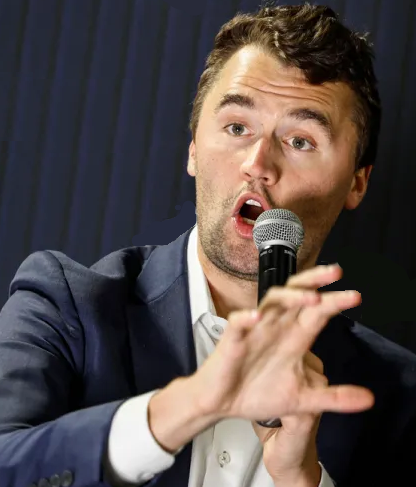


I Hope it Isn’t Too Late: Queer Folks
Cling to Hope for a Brighter Future
On the Right Side of History
Current Situation is Scary
James Talarico:
Religious Right Gets It Wrong
What it Means to Love Your Country
Warning From Gov Pritzker
Danielle Kramer: Stochastic Terrorism
Facts vs Fantasy
James Talarico: Ten
Commandments Bill in Texas
Bad Bunny
Controversy
Together
we are America... The only thing more powerful than hate
is love...
This year, there was an enormous amount of controversy
surrounding the halftime show at the Superbowl.
Apparently, the choice of Bad Bunny as the headliner had
some folks in a frenzy. Too un-American, too liberal,
too woke. So, an alternate halftime show was created to
give the bigots another option. The folks over at
Charlie Kirk's Turning Point organization decided to
host an All-American show, starring Kid Rock. Something
for the MAGA crowd, something more patriotic, something
in English afterall.
I watched the Super Bowl game and the amazingly talented
musicians on my big screen TV. I was treated to a joyful
display of musical acts that included Bad Bunny, Brandi
Carlile, Lady Gaga, Ricki Martin, Green Day, and Coco
Jones. Lots of drama and dancing! It was a party, a
celebration! Outstanding show! Very exciting! And
very inspiring!
Meanwhile, out of pure curiosity, I simultaneously
monitored the Turning Point/Charlie Kirk/Kid Rock
halftime show on my cellphone. It was vomitous. Lots of
AI, fake production enhancements, canned applause, and
subdued lighting. Lots of partisan rhetoric. The event
was religiously charged with lots of patriotic cringe
and jingoism. A lineup of b-list country music artists.
Kid Rock lip-synced (badly) one of his head-banger
songs, “Bawitdaba.” And then he sang a cover of “Til You
Can’t” and added a verse about religion.
Besides
being Puerto Rican, gay-friendly, and gender-fluid, Bad
Bunny is huge pop star (Certainly bigger than Kid Rock
ever was). More than anything else, the fact that he is
a Grammy-award winning artist who has sold over 125
million albums, making him one of the best-selling music
acts globally, is one of the best reasons to choose him
to headline the Superbowl halftime show.

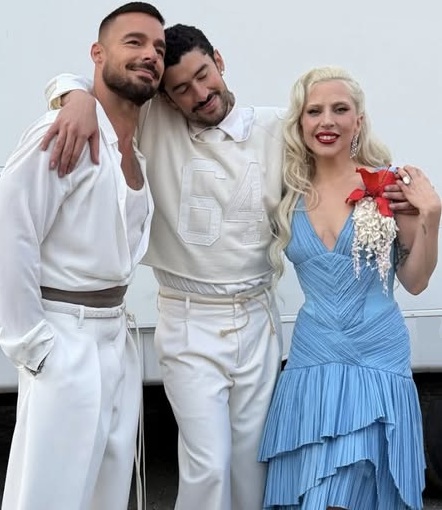
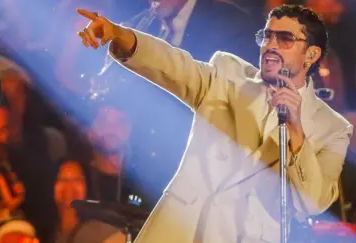
LGBTQ Performers at 2026 Super Bowl: Bad Bunny, Green
Day, Brandi Carlile
Bad Bunny Takes the World’s Biggest Stage
Editorial: Turning Point Halftime Show
Brandi Carlile: What It Means to Sing America the
Beautiful at the Super Bowl
High Energy After Superbowl Halftime Show
After Superbowl Show: Critics Say Deport Bad Bunny
Megyn Kelly Roasted for Bizzare and Overtly Racist
Tantrum
Folks on
both sides of the debate disagreed about the meaning of
patriotism...
"It was
absolutely terrible, one of the worst ever... nobody
understands a word this guy is saying... an
affront to the greatness of America... a slap in the
face of America."
-Donald Trump
"One of
the disappointments that came from this national debate
was the realization that something as simple as a
football halftime show could so easily bring out the
prejudice and dishonesty of some of our fellow citizens.
It is disheartening that so much division and disharmony
exists in our country. It is unsettling to know how many
folks harbor racist and xenophobic attitudes. And it is
upsetting to see the hatred of top government officials
who not only disparaged Bad Bunny but also lied about
him."
-QC
Commentary
“Bad
Bunny's show made me feel more proudly American than
anything Kid Rock has ever done.”
-Kacey
Musgraves


Bad Bunny: God Bless America
Great Night to Be an American
Guide to Super Bowl 2026 for Gay People
Bad Bunny's Super Bowl 2026
Couldn't Be Gayer
Bad Bunny And The Politics Of The Super Bowl Halftime
Show
Jesse Stewart: Comment on Super Bowl, Bad Bunny, and
Masculinity
TN Republican Demands Official Probe of Bad Bunny's Gay
Porn Super Bowl Halftime Show
"Bad
Bunny’s halftime show was a beautiful demonstration of
everything that makes America great, a celebration of
one of our most important communities and of the melting
pot that makes America such a wonderfully diverse and
culturally rich place. The idea that you would need your
own special safe space with a washed-up drunk rockabilly
pervert because you’re too racist to enjoy the literal
most popular artist on the entire planet is deeply
embarrassing…not that MAGAs are capable of feeling
shame, embarrassment, or cringe. Only blinding,
white-hot rage."
-ExpressUS
"What the
hell is this illegal alien farmer worker,
non-English-speaking shit on my TV. Someone Call ICE."
-Laura Loomer
"Superbowl
halftime entertainers of the past have featured what one
might consider to be the music of other cultures...
Rap and hip-hop acts (Dr Dre, Snoop Dog, Eminem,
Kendrick Lamar, Mary J Blige) might strike some folks as
foreign... Country music stars who performed
represent another American sub-culture... And the
many shows by European artists (Paul McCartney, U2,
Sting, Rolling Stones, The Who) offered the audience the
opportunity to enjoy the talents of top rock icons who
were not US citizens."
-QC
Commentary
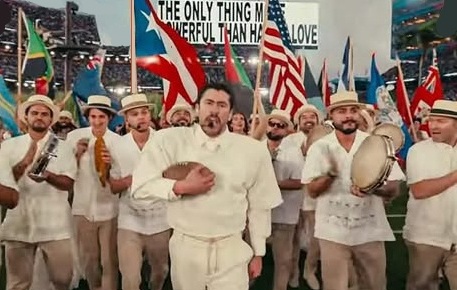

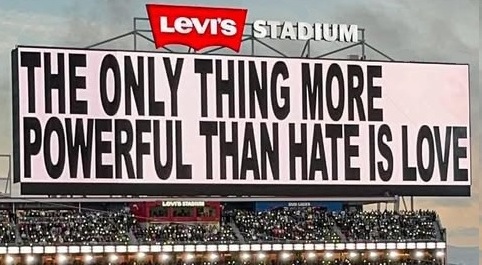
LGBTQ Performers at 2026 Super Bowl: Bad Bunny, Green
Day, Brandi Carlile
Bad Bunny Takes the World’s Biggest Stage
Editorial: Turning Point Halftime Show
Brandi Carlile: What It Means to Sing America the
Beautiful at the Super Bowl
High Energy After Superbowl Halftime Show
After Superbowl Show: Critics Say Deport Bad Bunny
Megyn Kelly Roasted for Bizzare and Overtly Racist
Tantrum
Joyous
feedback from Bad Bunny's fans... Hateful
invective from right-wing critics...
"Having
watched both shows... I found the Bad Bunny event
(including the pre-show) to be more uplifting, positive,
and celebratory. It was a party that expressed love and
unity."
-QC
Commentary
"Not a single white person or English translation at the
Super Bowl. This isn't white enough for me."
-Laura Loomer
"To get up
there and perform the whole show in Spanish is a middle
finger to the rest of America. Who gives a damn that we
have 40 million Spanish speakers in the United States?
We have 310 million who don't speak a lick of Spanish.
This is supposed to be a unifying event for the country,
not for the the Latinos, not for one small group. But
for the country. We don't need a black national anthem.
We don't need a Spanish speaking non English performing
performer. We have to keep the Super Bowl, which is a
quintessential American event."
-Megyn
Kelly
"I don’t
care what side you’re on, a bunch of adults throwing
temper tantrums and their own halftime show is
embarrassing as hell and the most cringe shit on the
planet.”
-Zach
Bryan


Bad Bunny: God Bless America
Great Night to Be an American
Guide to Super Bowl 2026 for Gay People
Bad Bunny's Super Bowl 2026
Couldn't Be Gayer
Bad Bunny And The Politics Of The Super Bowl Halftime
Show
Jesse Stewart: Comment on Super Bowl, Bad Bunny, and
Masculinity
TN Republican Demands Official Probe of Bad Bunny's Gay
Porn Super Bowl Halftime Show
"The debate is more than just a question of musical
taste. It has been used as a political soapbox and an
occasion to spew racist diatribes. The bigoted tantrums
by right-wing celebrities, the calls for deportation by
government officials, and the overall hateful rhetoric
are profoundly disconcerting. It is truly embarrassing
that this is what our country has become."
-QC
Commentary
"Bad
Bunny's performance is the worst halftime show ever.
It’s 250 years that we’re celebrating right now in the
United States, and I just don’t think it was appropriate
to have it in Spanish... It looked like a political
statement, because there were literally no white people
in the entire thing."
-Jill Zarin
"Today would be a great day to round up and deport
illegals, especially Bad Bunny, his filth, and his fans!
All of them. No exceptions."
-Rep Randy Fine
“Deport Bad Bunny immediately.”
-Anthony Sabatini (Fla County Commissioner)
"I heard
someone say: The same people who demanded a separate
halftime show are the same folks who demanded separate
water fountains. Unfortunately, I think there may be
some truth in that comment. One aspect of the protest
from the right-wingers was the idea that a show that
highlighted the Latin culture would be offensive to
everyone who was not Latine. The fallacy of that notion
lies in the assumption that Americans are not interested
in learning about and celebrating other cultures. In
reality, I suspect most Americans are open-minded about
other cultures and appreciate the diversity in our
country. Smart, decent, good-hearted Americans are
willing to exist side-by-side with neighbors who might
have a different language, ethnicity, nationality, or
religion."
-QC
Commentary
On the Right Side of History
Current Situation is Scary
What it Means to Love Your Country
James Talarico:
Progressive Christian Ideas
I Hope it Isn’t Too Late: Queer Folks
Cling to Hope for a Brighter Future
Warning From Gov Pritzker
Danielle Kramer: Stochastic Terrorism
Rep Meanie Stansbury: Focus on the Real Issues
Barack Obama: Reflections
No Kings Protests Nationwide
South Park: What Would Jesus Say About
Donald Trump?
Oh America
Your Life Sucks?
What Radicalized You?
Trump's
Disparaging Rhetoric
How do we justify Trump's cruelty and ugliness?
Earlier this month, Secretary of State Marco Rubio
ordered the State Department to return to using Times
New Roman font on all documents produced by department
personnel, reversing a Biden-era directive that changed
the font to Calibri.
The change from Times New Roman to Calibri by the Biden
administration was done so at the request of the State
Department’s Office of Diversity, which noted that the
sans serif font of Calibri was notably easier to read
for persons with reading disabilities, such as dyslexia,
or those who require reading assistance devices.
Rubio, once referred to repeatedly as “Little Marco” by
Trump and now forever in a quest to win over the
president’s love and affection, said he was making the
change back to Times New Roman because the Biden
decision was the result of “radical” diversity, equity,
inclusion and accessibility. He called it “wasteful,”
and said that the return to the serif font would
“restore decorum and professionalism to the department’s
written work.”
And here I thought true professionalism would be
producing work that the intended audience could read.
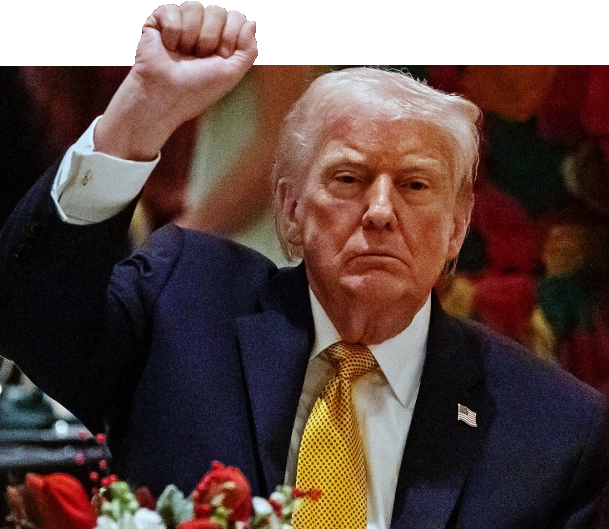
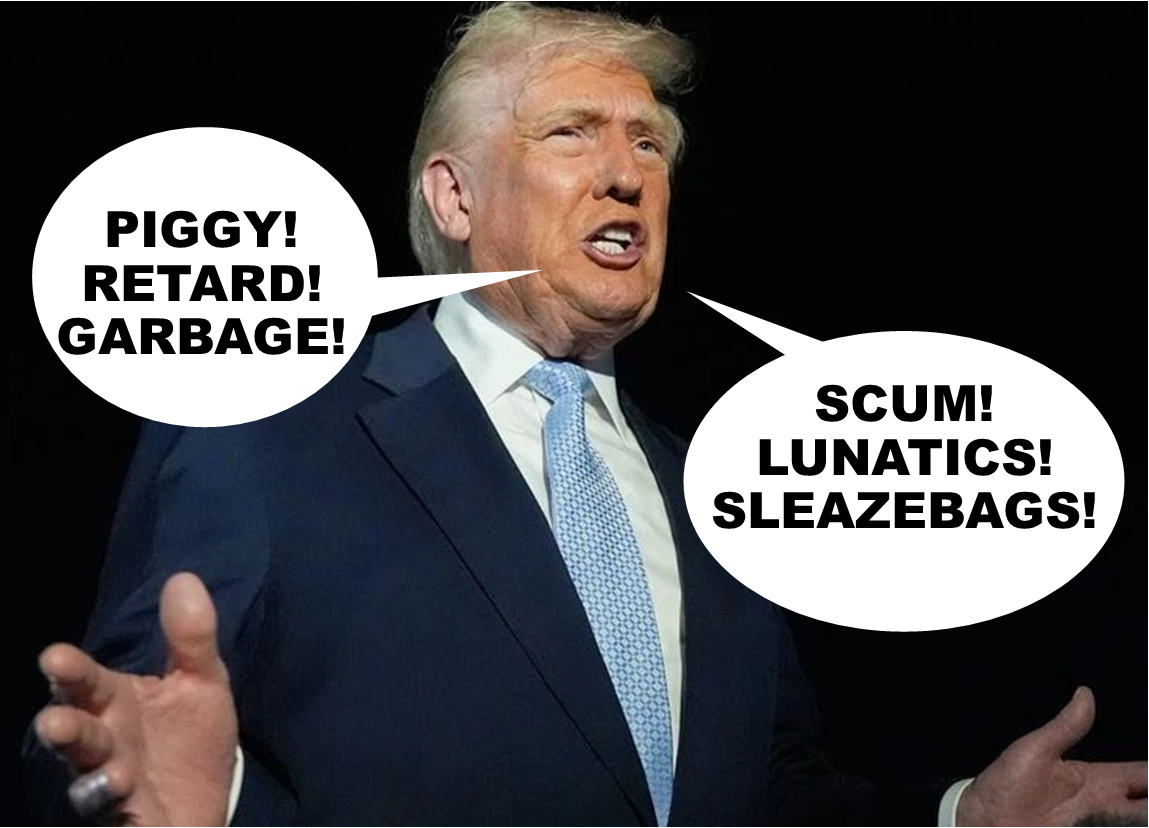

Trump's Disparaging Remarks
Trump Rings in Christmas Day with a Flurry of Angry
Posts
Trump Insults Another Female Reporter
Most of us want the same things out of life, and
expect the same treatment and behaviors from others.
A minor price to pay, I suppose, for the eradication of
anything which acknowledges that those with disabilities
exist. Or anything that might paint the MAGA-wing of the
Republican Party as compassionate or understanding. Or
anything other than cruel and spiteful.
Which makes me wonder: How do you justify the cruelty?
There are a lot of MAGAs in this part of the world. Lots
of politicians who have put Trump in their campaign ads.
Lots of people who fly flags with his name on them. Lots
of lawmakers who relay with great pride their
willingness to “uphold the Trump agenda.”
And so, I wonder … when you lay down at night, pass by
one of the mirrors you haven’t yet broken or thrown out,
have to look your children in the eyes, how do you
justify all of that cruelty and ugliness?
Because there’s a lot. A whole lot.
Also this month, Trump announced that national parks
would no longer offer free admission on Martin Luther
King Jr Day or Juneteenth, but would do so on his
birthday.
How do you justify that to your Black friends and
neighbors?
Over the last several months, various official social
media accounts tied to Trump administration departments,
particularly the Department of Homeland Security, have
posted what could be charitably called taunting, and
perhaps more accurately be deemed cruel and juvenile,
posts that make light of mass deportations. They are
particularly cruel when you consider that the Trump
administration has made a point of targeting
non-criminals, longtime residents and even those who
have completed their courses to earn US citizenship
(with arrests at the ceremony).
Did you celebrate those taunting posts when you were
putting up those nativity scenes in the front yard this
Christmas season? What about when you were eating at the
Mexican restaurants?
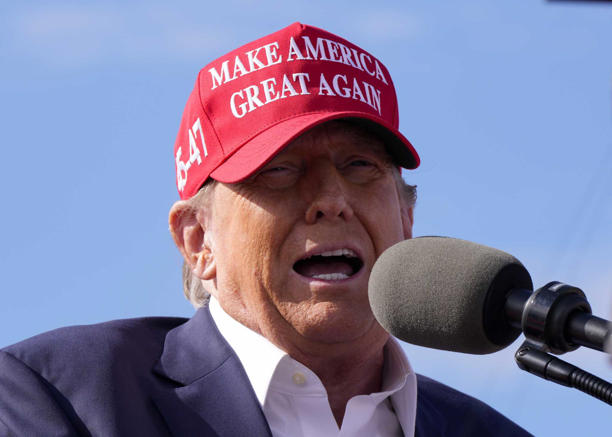
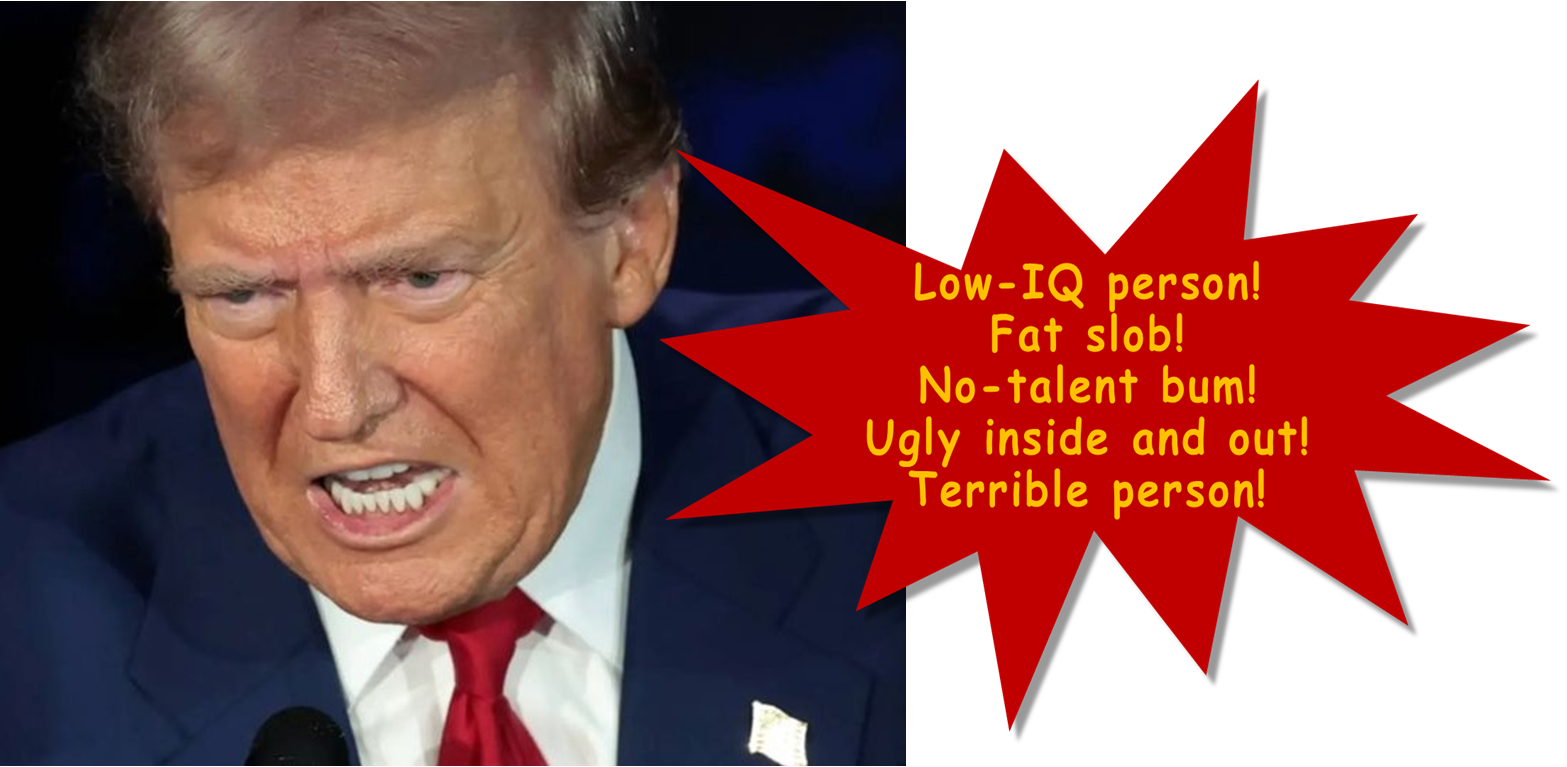
Trump's Disparaging Remarks
Trump Rings in Christmas Day with a Flurry of Angry
Posts
Trump Insults Another Female Reporter
A total lack of compassion and understanding...
When the president called a female reporter “piggy,” did
you consider what you’d say to your daughters or nieces
or granddaughters about that? Did you consider how that
might influence your sons to treat women?
When the president used the term “retarded” to insult
someone, did it even bother you? Did it cause you stop
and consider why in the world the president of the
United States (the leader of the free world) would be
publicly insulting anyone in such a crude manner? Did
you think back to president of the past (presidents you
maybe respected and found inspiring) and try to imagine
them using such language?
When the president released a Christmas message
addressed to the “radical left lunatics,” did it cause
you the slightest bit of concern that perhaps, just
maybe, somewhere along the way, you made a mistake when
backing or voting for this wretched human?
As I watched people interact this Christmas season,
whether it be at parties with friends or family
gatherings or out and about shopping and attending
various holiday events, the one thing that was so
striking (that is always so striking whenever we move
from behind a keyboard and into the real world) is how
alike we all are. Forget race. Forget income levels.
Forget whatever crap we just posted on social media.
The overwhelming majority of us want the same things out
of life. We expect the same behaviors out of our
children. We expect to be treated with the same respect
and fairness. We mostly treat each other in respectful
ways.
And yet, somehow, a whole bunch of y’all have decided
that a hate-filled, constantly whining, name-calling,
narcissistic, egotistical, lying, felonious, cruel,
adjudicated sexual abuser who is fighting tooth and nail
to cover up documents related to child rape is the best
representative of both you and your country.
How can that be? How can you support someone who both
exerts and inspires such cruelty? How can you vote for
someone who you wouldn’t allow your kids to be around?
How can you continue to support a party that refuses
endlessly to put a check on this ogre of a human?
[Source: Josh Moon, Alabama Political Reporter, Dec
2025]
Pete
Buttigieg on Trump
President's Character
Current Situation is
Scary
James Talarico: Focusing
on the Wrong 1%
The Truth About Republicans
Sen Adam Schiff:
Trump's Lies
Trump Insulting Women
Trae Crowder: Trump and
Reiner
I Blame the Republican
Congress
Rep Meanie Stansbury: Focus on the Real Issues
Trump is a Criminal
James Talarico: The Real Welfare Queens
Obama Summarizing Trump's
Agenda
Trump: Incompetent Leader
Dean Withers: Why I Dislike Trump
Joe Biden Says MAGA Republicans Want to Make LGBTQ
People Into Something Scary
The former president warned that the nation's move
toward equality must be protected in the age of Trump
Elected LGBTQ leaders and candidates from around the
world packed into the JW Marriott ballroom in Washington
DC in December 2025 to celebrate former President Joe
Biden’s decades-long commitment to LGBTQ equality, and
to confront a political landscape where that progress is
suddenly under threat.
Biden’s appearance at the LGBTQ Victory Institute’s 2025
International LGBTQ Leaders Conference, the largest
LGBTQ political gathering in the nation, was
history-making. Speaking to a crowd of more than 550
people, the first sitting or former president to address
the LGBTQ Victory Institute accepted the organization’s
Chris Abele Impact Award, the group’s highest honor,
becoming only the third recipient in the Institute’s
history. And for many in the room, it felt like more
than an award ceremony. It felt like a moment of return.
“This is no time to give up,” Biden told the crowd.
“It’s time to get up and fight back.” He framed the
moment as one of profound democratic consequence: “We
believe in the power of our democracy to pull the nation
together,” he said, warning that “everything we’re
seeing coming out of this reactionary White House” makes
it essential for LGBTQ Americans and allies to stand
firm.

Joe Biden Says MAGA Republicans Want to Make LGBTQ
People Into Something Scary
Joe Biden Receives Top Honor at LGBTQ Leadership
Conference for His Contributions to Equality
President Joe Biden Receives Chris Abele Impact Award
for Historic Leadership on LGBTQ Equality
Joe Biden Receives Award for His LGBTQ Advocacy
Joe Biden Lashes Trump For Trying To Distort Fight For
LGBTQ Equality
Since President Donald Trump retook office in January
2025, federal agencies have targeted LGBTQ people,
particularly transgender Americans, through sweeping
policy reversals across the government. Biden cast those
actions as an assault on the American idea itself: a
rejection of dignity, equality, and the constitutional
promise of opportunity.
“America is the only country founded on an idea,” he
said. “We hold these truths to be self-evident … all are
created equal, all deserve to be treated with dignity
throughout their lives.” Though the country has not
always met that ideal, he said, “we’ve never walked away
from it.”
He warned that the current administration is trying to
weaponize fear and misinformation to pit Americans
against one another. Republicans are using LGBTQ people
as a “political football,” Biden said, as a way to
divide the country.
Defiant speech in a volatile year..
Biden’s speech was part celebration, part warning...
He recalled his 2012 Meet the Press endorsement of
marriage equality and spoke about the love he’d
witnessed from LGBTQ families over the years. “I just
couldn’t remain silent anymore,” he said. “I expressed
my support for gay marriage a little earlier than some
folks had been expecting.”
He then told a story he also shared in that interview: a
night spent speaking with LGBTQ leaders at a private
home. A man asked him, “How do you feel about us?” Biden
said he replied by pointing to the couple’s two young
sons. “I wish every American could have seen the love in
the eyes of these two young boys for their dads,” he
said. “If they did, they’d never have any doubt about
what this is all about.”
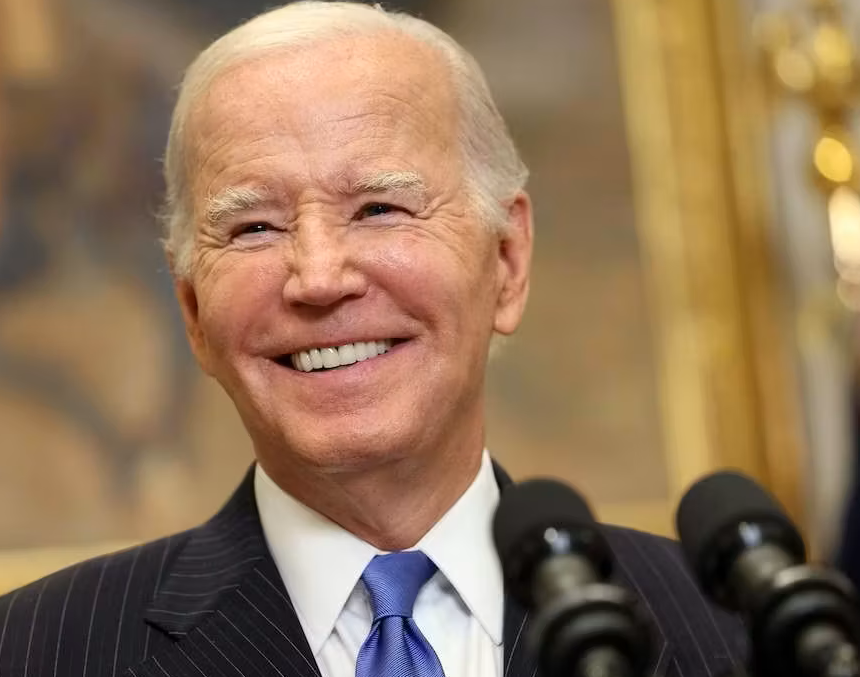
Joe Biden Says MAGA Republicans Want to Make LGBTQ
People Into Something Scary
Joe Biden Receives Top Honor at LGBTQ Leadership
Conference for His Contributions to Equality
President Joe Biden Receives Chris Abele Impact Award
for Historic Leadership on LGBTQ Equality
Joe Biden Receives Award for His LGBTQ Advocacy
Joe Biden Lashes Trump For Trying To Distort Fight For
LGBTQ Equality
“But a lot has gotten lost in all the noise,” he said.
“Basic identity is being turned into a political
football.” He warned that young LGBTQ people today sit
alone behind closed doors, staring at the ceiling,
wondering, “Will they ever be loved? Will they ever
matter? Will they ever have a family? Will they ever
truly be accepted for who they are?” His message to them
was compassionate: “Just be you. You are loved. You
belong.”
He accused Trump and “the MAGA Republicans” of trying to
“distort and derail our fight for equality,” turning
LGBTQ equality into “something scary, something
sinister.” But at its core, he said, equality is about
the simplest of things: “making every American… be
treated with basic decency, dignity, and respect.”
And he linked LGBTQ rights to broader economic fairness.
“It’s about making sure every American can come home at
the end of the day, look their kid in the eye and say,
‘Honey, it’s going to be OK.’”
Biden told the room that their willingness to run for
office — and to subject themselves and their families to
scrutiny and attacks — is “what’s going to take courage
. . . Everybody deserves a shot,” he said. “Everybody.”
[Source: Christopher Wiggins, Advocate Magazine, Dec
2025]
On the Right Side of History
Current Situation is Scary
James Talarico:
Religious Right Gets It Wrong
What it Means to Love Your Country
Warning From Gov Pritzker
Danielle Kramer: Stochastic Terrorism
Facts vs Fantasy
Rep Meanie Stansbury: Focus on the Real Issues
Trump is a Criminal
James Talarico: The Real Welfare Queens
Obama Summarizing Trump's
Agenda
Trump: Incompetent Leader
Dean Withers: Why I Dislike Trump
The LGBTQ Community Coping in
Tough Times
Remarkable
resilience and creativity in overcoming adversity...
A shift from surviving to thriving...
We are
witnessing challenging times for LGBTQ people. The
current social and political climate is not only a
source of stress, it easily causes internal anguish that
affects every aspect of life. For LGBTQ people, the
daily onslaught of verbal (and physical) attacks, the
seesawing of legal status, the negative public sentiment
and demeaning rhetoric, and the trampling of rights by
government leaders can have devastating personal
repercussions.
LGBTQ
communities have historically demonstrated remarkable
resilience and creativity in overcoming adversity, often
by relying on strong social support networks, advocacy,
and a deep-seated sense of communal identity. While
facing disproportionate challenges like discrimination,
stigma, and systemic barriers, these communities have
developed powerful, collective strategies for thriving
rather than simply surviving.
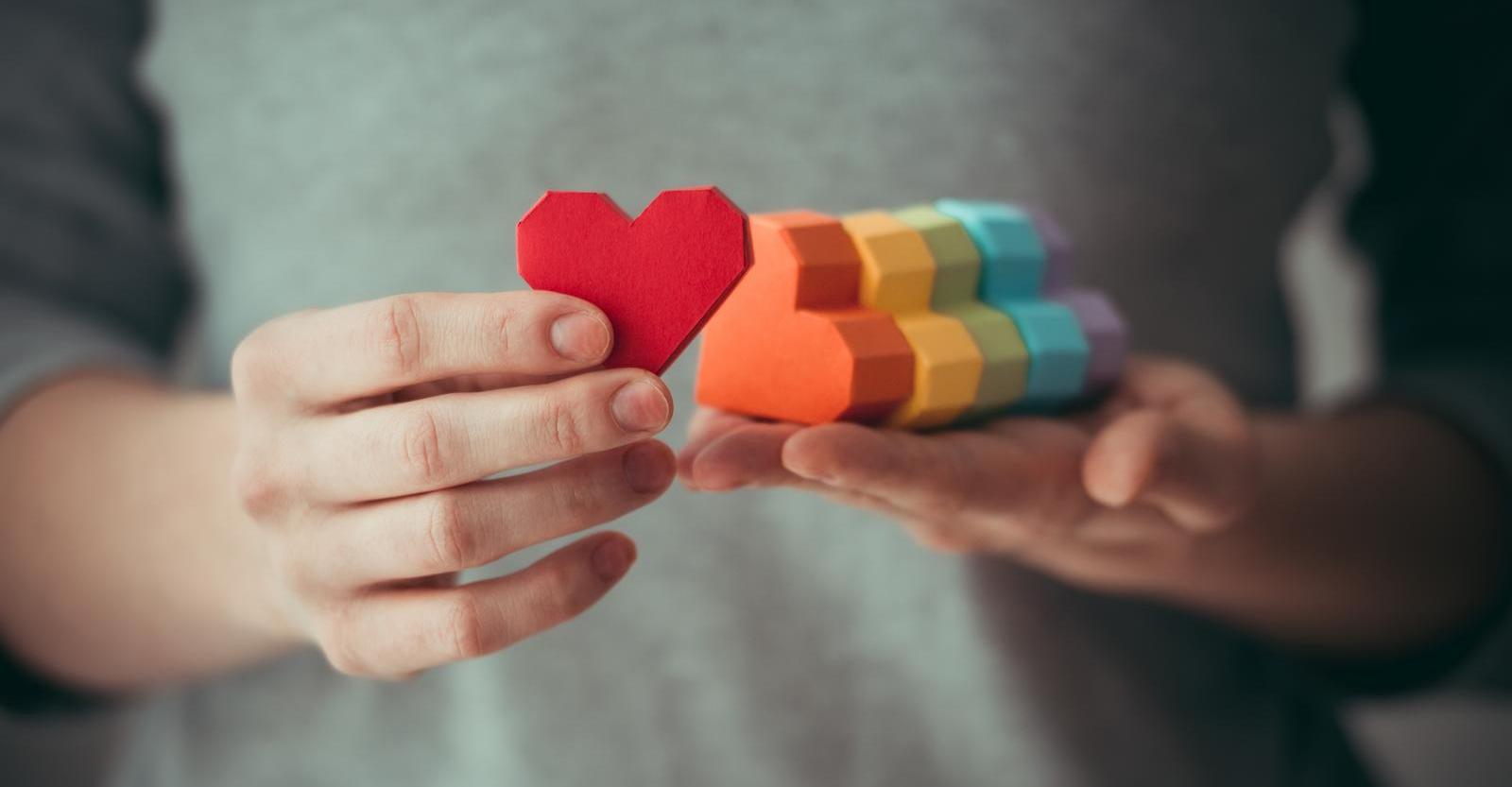
Resilient through collective action and community
Unlike the
"individual bootstrapping" narrative of mainstream
resilience culture, LGBTQ resilience is primarily a
collective achievement. This communal strength is a
historical adaptation to minority stress, allowing
individuals to endure and thrive despite societal
pressures.
Key elements of this collective coping include:
Creating
chosen families - For many who face rejection from their
families of origin, building strong, supportive "chosen
families" is a vital coping mechanism. This provides a
crucial sense of belonging and protection.
Community
centers and safe spaces - The establishment of LGBTQ
community centers has been essential. These hubs offer
safe spaces for social connection, provide critical
resources like counseling and health services, and act
as centers for activism and advocacy.
Health
advocacy - From the early days of the HIV/AIDS crisis,
the LGBTQ community has pioneered proactive,
community-driven health advocacy and activism, which
continues to be a cornerstone of its strength.

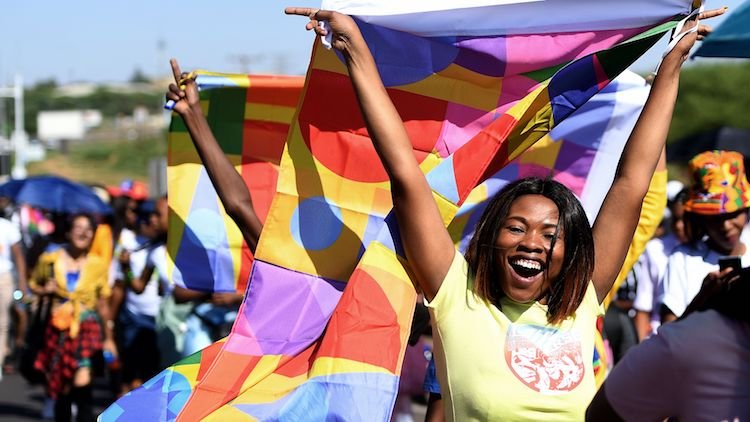

National Survey: LGBTQ Youth Mental Health
Queer People: Use Adversity to Overcome Challenges for a
Better Future
In the Voices of People Like Me: LGBTQ Coping During
Trump’s Administration
Info: Mental Health and
Wellness
Adversity
that requires unique coping
This
communal resilience is not developed in a vacuum. It is
a direct response to enduring minority stress, a chronic
source of heightened stress experienced by LGBTQ
individuals due to their marginalized status. Specific
challenges that necessitate unique coping strategies
include:
Systemic
discrimination and violence - The FBI reports that 16.7%
of hate crimes are based on sexual orientation. LGBTQ
individuals, particularly those at intersecting
marginalized identities (race, socioeconomic status),
face constant prejudice in employment, housing, and
healthcare.
Harmful policies and political climate - Anti-LGBTQ
legislation and political rhetoric can create deep
uncertainty and harm, with studies showing an increase
in depression and anxiety in states adopting
anti-equality measures.
Internalized stigma - The weight of societal prejudice
can be internalized, leading to higher rates of
depression, anxiety, and suicidal ideation within the
community. Research by The Trevor Project found that 39%
of LGBTQ young people seriously considered suicide in
the past year, with rates higher among transgender
youth.

National Survey: LGBTQ Youth Mental Health
Queer People: Use Adversity to Overcome Challenges for a
Better Future
In the Voices of People Like Me: LGBTQ Coping During
Trump’s Administration
A shift from surviving to thriving
While
coping mechanisms have historically focused on survival,
modern LGBTQ advocacy aims to move beyond simply
enduring hardship. Experts highlight the need to move
from a deficit-focused model to one that actively
promotes a sense of "queer thriving". This involves:
Developing personal strengths: The resilience learned
through adversity builds invaluable personal traits,
including optimism, self-compassion, and persistence.
Shifting societal norms - True resilience is not about
"toughening up" in an unjust system, but about
collective action to transform the systems themselves.
It means creating a world where resilience is no longer
a prerequisite for survival.
Intersectional support - Recognizing and addressing the
compounded burden faced by those with multiple
marginalized identities is critical for providing
effective and equitable support.
[Source:
QC Commentary, December 2025]
Current Situation is Scary
Jon Stewart: Violence and Republican Hypocrisy
We Still Need LGBTQ Pride
Immigrants: An Important Perspective
John Lithgow: Lessons on Tyranny
Republicans: Fools and Hypocrites
America Chose the Monster
Lynae Vanee: Unchecked
Domestic Terrorism
The GOP is the Party of Hypocrisy: How Did it Get This
Way?
Someone Stole My Pride Flag, but No One Can Ever Steal
My Pride
Stark Contrast:
Eleanor Roosevelt vs Donald Trump
In the
end, we are one world... And that which injures
any one of us, injures all of us...
Eleanor
Roosevelt wrote these powerful words in December 1945 as
she sailed to London to represent the United States at
the first United Nations meeting: "In the end, we are
one world and that which injures any one of us, injures
all of us." Her vision of interconnected humanity, where
national pride coexists with global responsibility,
stands in stark contrast to the message delivered in
Sept 2025 at the 80th session of the United Nations
General Assembly by Donald Trump, who told assembled
world leaders: "I'm really good at this stuff: Your
countries are going to hell."
Roosevelt believed deeply that "Our own land and our own
flag cannot be replaced by any other land or any other
flag. But you can join with other nations, under a joint
flag, to accomplish something good for the world that
you cannot accomplish alone." She understood that
patriotism and internationalism were not opposing forces
but complementary strengths, and that human rights
violations anywhere threatened peace everywhere.
In contrast, Trump's speech was dominated by attacks on
allies and international cooperation itself. He has
withdrawn the United States from multiple UN bodies,
including the Human Rights Council, and today spent part
of his speech complaining about not receiving a UN
renovation contract years ago, snidely remarking that
"These are the two things I got from the United Nations:
a bad escalator and a bad teleprompter." He boasted
about America being "the hottest country anywhere in the
world, and there is no other country even close."
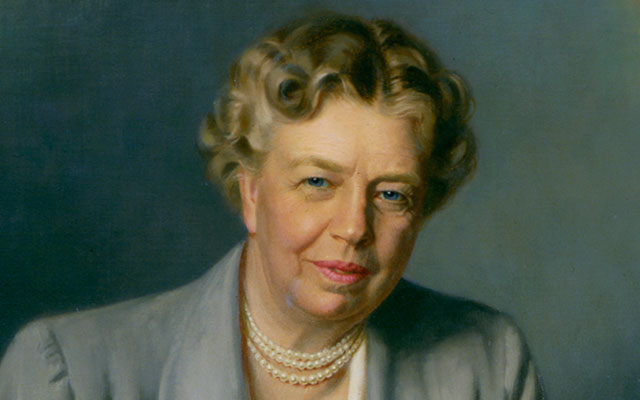
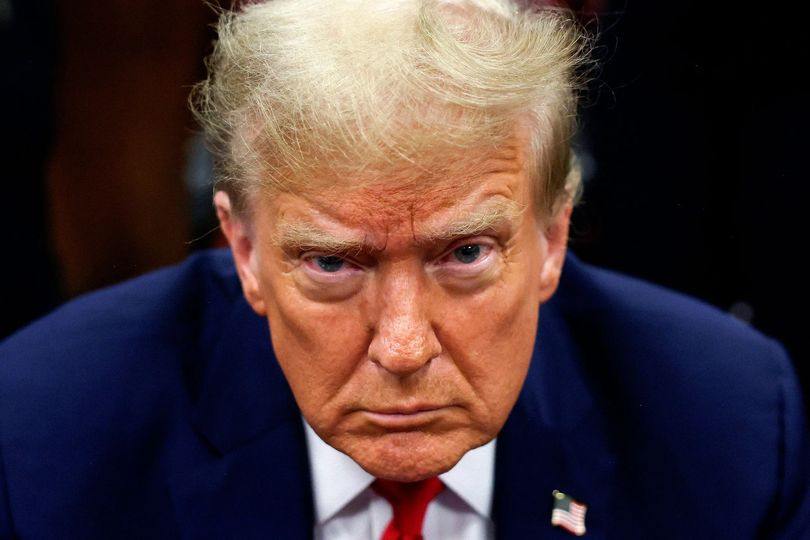
Video: Trump Addresses
United Nations
CNN: Trump Takes Shots at UN, Climate Change, and Immigration Policies in Speech
PBS: Key Moments From Trump’s UN Speech
CBS: Trump Crriticizes European Allies in UN Speech: Your Countries are Going to
Hell
Meanwhile, Eleanor Roosevelt spent her many years at the
UN working tirelessly to build bridges, chairing over
3,000 hours of contentious deliberation to create the
Universal Declaration of Human Rights. She believed, as
she said at the Sorbonne, that "the struggle for
democracy and freedom is a critical struggle, for their
preservation is essential to the great objective of the
United Nations to maintain international peace and
security."
Trump's speech represents not just a different approach,
but a fundamental rejection of the post-World War II
order that Roosevelt helped build -- one based on the
belief that we are indeed "One World" and that
international cooperation, however imperfect, remains
humanity's best hope for lasting peace. Where Roosevelt
offered the world America's outstretched hand, Trump
offered only a clenched fist and a mirror -- it was a
graceless airing of petty grievances and bullying that
sought to elevate himself by belittling others,
embarrassing the very nation he claims to make great.
Roosevelt warned us that "It isn't enough to talk about
peace. One must believe in it. And it isn't enough to
believe in it. One must work at it." Today, we witnessed
what happens when that belief is abandoned and that work
is undone.
With such shameless displays of narcissism and
vindictiveness coming from the nation's highest office,
it's more important than ever for parents and educators
to embrace Eleanor Roosevelt's wisdom that human rights
begin "in small places, close to home" -- in our
neighborhoods, schools, and communities. "Such are the
places where every man, woman, and child seeks equal
justice, equal opportunity, equal dignity without
discrimination. Unless these rights have meaning there,
they have little meaning anywhere."
When our leaders fail to model dignity, compassion, and
respect for others, the responsibility falls to us to
teach our children that true strength lies not in
belittling others, but in lifting them up; that real
patriotism means working to make our nation worthy of
respect, not demanding it while offering none in return.
The work of building "One World" must continue, even if
it must now begin in our classrooms and around our
kitchen tables.
[Source: Facing History & Ourselves, Sept 2025]
Trump is Insane
What it Means to Love Your Country
Dear Donald Trump: This is How a President Acts
South Park: What Would Jesus Say About
Donald Trump?
Pete Buttigieg Perfectly Articulates GOP Behavior
Jon Stewart: Violence and Republican Hypocrisy
GLAAD: Trump Accountability Tracker
Reaction to Trump-Vance-Zelensky Meeting
Trump Starts His Term by Declaring War on the LGBTQ
Community and Democracy
Bernie Sanders:
Divine Right of Kings
Canada's Opinion of Trump
Australian View: US Becomes a Fascist
Nation
Trump Emulates Hitler in Seeking to Erase
Transgender People
Charlie Kirk's Legacy
Not a hero... Not a martyr...
Charlie
Kirk is dead. Shot mid-speech while spewing his usual
dogwhistle fascism to a gaggle of future January 6
cosplayers at Utah Valley University. Now, I’m not
saying the world is better off without him, but the air
sure as hell feels lighter.
Tell you what: Let’s not rewrite history just because
this asshole caught a bullet. Charlie Kirk wasn’t just
some “conservative commentator.” He was a pipeline of
weaponized ignorance; anti-POC, anti-immigrant,
anti-woman, anti-LGBTQ, anti-science, anti-decency,
anti-everything-but-white-Christian-male-fragility.
He was an under educated, smirking, self-righteous
sycophant whose greatest accomplishment was turning
low-information rage into merchandise sales and tax
write-offs.
And while I’m not here to throw a party over his
assassination, because unlike him, I don’t celebrate or
fetishize violence to win arguments, I’m also not
joining the crocodile tear chorus.
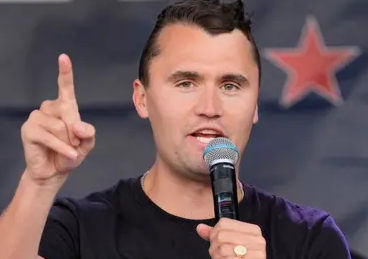
I’m not lighting a candle, I’m lighting a match under
every pedestal trying to martyr this poster boy for
8.5x11 grievance. Kirk wasn’t silenced for having
“opinions” he spent his career making life harder for
the marginalized, scapegoating the vulnerable, and
wrapping fascism in a college brochure.
The only thing tragic here is that some idiot decided to
make him a martyr. Now every grifter from Trump to
Tucker Carlson gets to wail about “free speech” while
they rewrite Kirk’s legacy from greasy opportunist to
fallen patriot.
It’s nauseating. He wasn’t a hero. He wasn’t even a
thinker. He was a human Twitter thread of bad faith and
recycled talking points.
But here’s the kicker: nobody, nobody, deserves to be
executed for being a dumbass with a microphone. That’s
not justice. That’s societal collapse in real time. You
don’t get to cosplay Rambo because you didn’t like what
some snake oil peddler said about immigrants. That’s not
how democracy works, that’s how civil wars start.
So no, I’m not mourning Charlie Kirk. And I’m not
defending the shooter either. One was a coward with a
gun, and the other was a coward with a platform, and the
only thing they had in common is that neither had the
moral spine to argue in good faith.
Rest in whatever, Charlie. You won’t be missed, but you
should have been beaten in debate, not in a parking lot
with a sniper rifle.
[Source: Posted by LA Times reporter David Freed, Sept
2025]
Charlie Kirk: The Harsh Truth of His Life
and Death
Bernie Sanders: Support Free Speech and Condemn Violence
Response to the Charlie
Kirk Shooting
Right-Wing Firebrand Charlie Kirk Dead After Shooting at University in Utah
Charlie Kirk Died in a Red State on Trump’s Watch: He Needs to Tone Down His
Violent Rhetoric
Bill Maher: Who Are These Crazed Shooters?
Who was Charlie
Kirk?
Charlie Kirk's Bigoted Words
Charlie Kirk Normalized Violence
We Must
Not Posthumously Sanitize Charlie Kirk's Hateful Life
What Charlie Kirk Believed In: Here Are Real Quotes
South Park: What Would Jesus Say About Donald Trump?
Danielle Kramer: Stochastic Terrorism
Leaning Left
Standing
up for the ones America keeps throwing away
I lean
left because I refuse to worship cruelty dressed up as
strength.
Because
I’ve watched rich men laugh while poor kids dig through
trash for food.
Because
I’ve seen people die alone in parking lots because
insulin costs more than rent.
Because
I’ve seen “heroes” sleep on sidewalks while billionaires
buy their seventh yacht.
I'm done
letting strangers tell me what I believe.
I’m not a
cartoon. I’m not a cult. I’m not here to argue with
people who think empathy is weakness.
I want a
country that protects the ones who can’t fight today.
The
disabled. The sick. The elderly. The kids forced to be
adults while Hollywood cashes the checks.
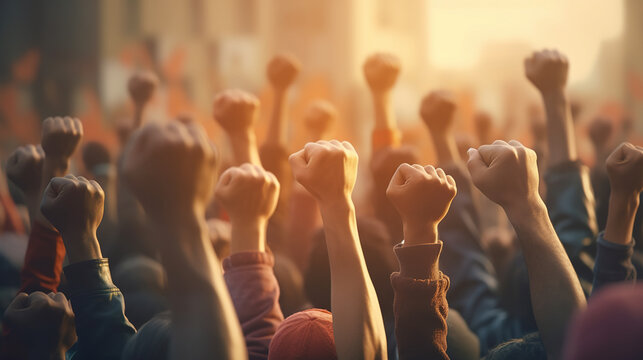
Facts vs Fantasy
Proud to Be a Liberal
Pink: Message to the President
What it Means to Love Your Country
Rev Dr Howard-John Wesley: Which Christianity?
Love Thy Neighbor
Molly: This is What I Believe
Bernie Sanders: Support Free Speech and Condemn Violence
Trump's Supporters: Never Trust Them
Again
Is America a Christian Nation?
I'm Tired of...
A nation
that leaves them behind isn’t strong. It’s rotten.
Healthcare
is not a prize for the privileged. It’s a right.
I don’t
give a damn if the system’s messy. I’ll still pay more
if it means your grandma doesn’t choke to death on a
medical bill.
Letting
people die because they’re broke isn’t capitalism. It’s
psychopathy.
I believe
education should open doors, not lock people in debt for
30 years.
You finish
school, you start life. Not a financial prison.
Don’t tell
me it’s impossible when other countries already figured
it out.
I’ve never
met these lazy welfare monsters everyone cries about.
But I’ve
met single moms working night shifts.
I’ve met
old men eating one meal a day so they can afford heart
meds.
I’ve met
billionaires who pay zero taxes while workers on food
stamps build their empires.
Therefore
yes, I believe in fair wages. I believe in taxing the
rich. I believe in homes people can afford.
If that
makes me a communist, then maybe decency is the enemy of
your America.
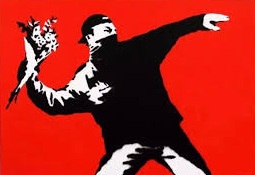
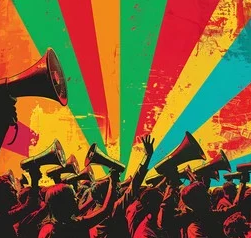
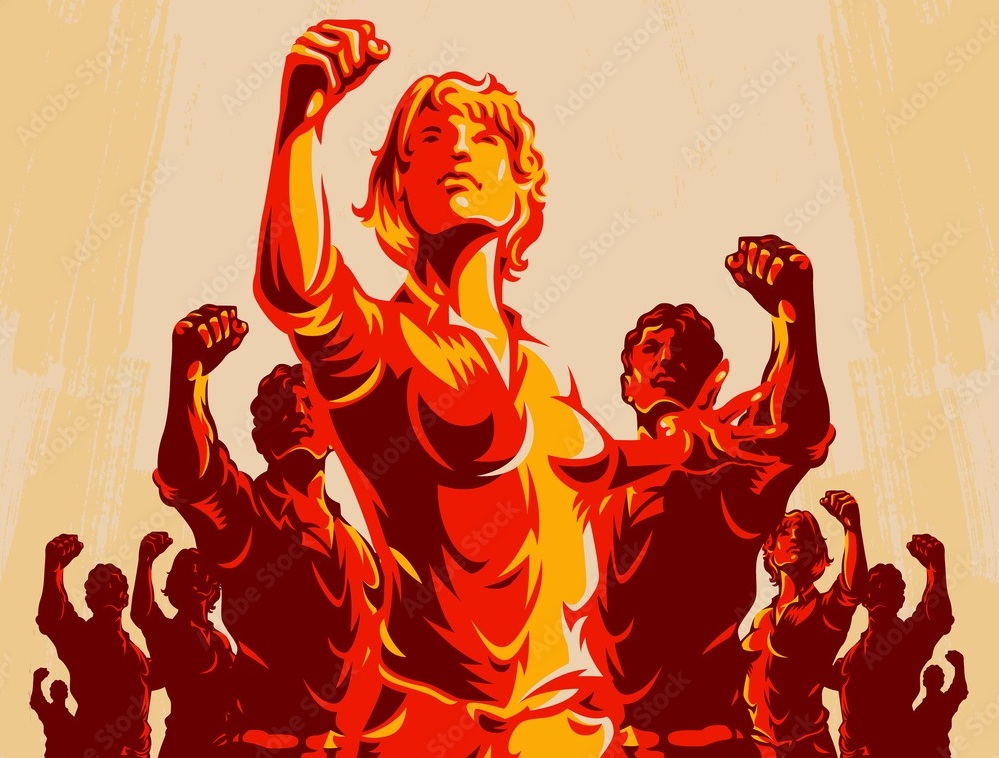
Facts vs Fantasy
Proud to Be a Liberal
On the Right Side of History
Warning From Gov Pritzker
What it Means to Love Your Country
Danielle Kramer: Stochastic Terrorism
Facts vs Fantasy
Molly: This is What I Believe
Barack Obama: Reflections
Oh America
I don’t
hate Christians.
I hate
laws trying to turn your faith into my prison.
Live your
faith. Just don’t make it mine. You don’t want Sharia
law? I don’t want Biblical law. Same fucking principle.
LGBTQ
people don’t want more rights. They just want the same
ones you already have.
If that
threatens you, maybe the problem isn’t them.
Undocumented immigrants aren’t robbing your life.
Your
employer is. The system is. The silence is.
We don’t
need more cages. We need more compassion. And fucking
honesty.
I don’t
want a government in everything.
But I’ve
seen what happens when profit runs free.
Lead in
the water. Mold in schools. Babies choking on tainted
formula.
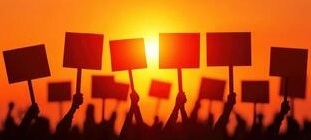
Proud to Be a Liberal
No Kings Protests Nationwide
Your Life Sucks?
What Radicalized You?
Jon Stewart: Violence and Republican Hypocrisy
We Still Need LGBTQ Pride
Immigrants: An Important Perspective
John Lithgow: Lessons on Tyranny
Someone Stole My Pride Flag, but No One Can Ever Steal
My Pride
Molly: This is What I Believe
You trust
corporations to police themselves? That’s cute.
I trust
them to lie. To slash. To hide the body.
The signs
are not vague. The playbook is not subtle.
And
history doesn't care if you're too proud to see it.
Systemic
racism and misogyny are not opinions.
They're
architecture. They built this place.
If you're
not affected, listen harder. If you're offended, look in
the mirror.
I don’t
want your guns.
I want my
nieces and nephews to live through math class.
I believe
in political correctness because I believe in basic
fucking manners.
If you
know a word hurts someone, don’t say it. Not because
you're afraid.
Because
you're human.
Sustainable energy isn’t a luxury. It’s survival.
You really
want your grandkids choking on smog while oil execs
throw parties?
Then keep
pretending we can’t evolve
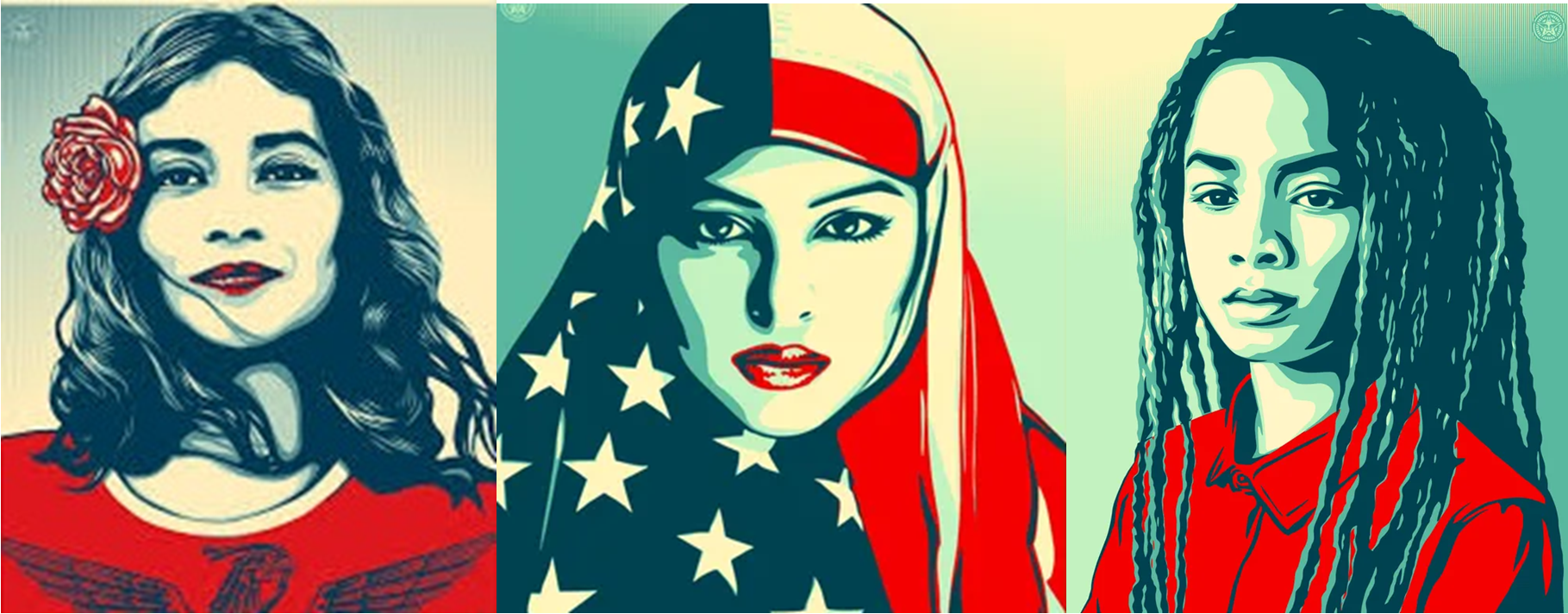
Women
aren’t a special interest group.
They’re
half the damn population.
They
deserve equal pay. Equal safety. Equal space.
And if
that still confuses you, maybe check your humanity.
Bottom
line?
I lean
left because I don’t think preventable suffering is
acceptable.
Not for
profit. Not for politics. Not for your comfort.
I’m not
here to play nice with cruelty.
Call me
soft. Call me naive. Call me whatever makes you feel
safe.
I’ll keep
standing up for the ones America keeps throwing away.
[Source:
Terri Wosley]
Facts vs Fantasy
Proud to Be a Liberal
Pink: Message to the President
What it Means to Love Your Country
South Park: What Would Jesus Say About
Donald Trump?
Rev Dr Howard-John Wesley: Which Christianity?
Love Thy Neighbor
Molly: This is What I Believe
Bernie Sanders: Support Free Speech and Condemn Violence
Trump's Supporters: Never Trust Them
Again
After Ten Years After My Supreme Court Win, Marriage
Equality is Under Attack
From Legitimacy to
Uncertainty: Reflections on 10 Years of Marriage
Equality and What Comes Next
"When activists
fought for the queer community in years past, existing
rights were not at risk. Our community had nothing to
lose. We could only gain rights that society and laws
had long denied us. In 2025, we stand to lose the rights
we have achieved."
-Jim Obergefell
We’ll get through this. We’ve been through worse. These
have been common refrains in the queer community since
the November 2024 election. They are something of a balm
for the fears we are experiencing under the current
administration. With every hateful lie, anti-LGBTQ
policy, or attack on human and civil rights, our
community finds strength in knowing we have been through
terrible times before. And every time, courageous people
stepped up to create a better world.

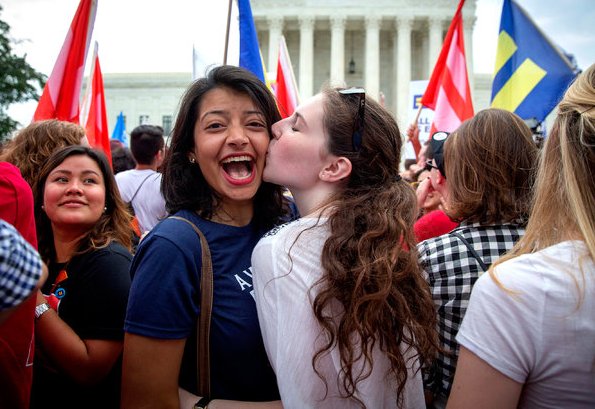
From Legitimacy to Uncertainty: Reflections on 10 Years
of Marriage Equality and What Comes Next
Jim Obergefell: 10 Years After My Supreme Court Win,
Marriage Equality is Under Attack
Trump Starts His Term by Declaring War on the LGBTQ
Community and Democracy
Scared for the Future and LGBTQ Rights
Trump Emulates Hitler in Seeking to Erase
Transgender People
Frank Kameny, Barbara Gittings, and others fought
against the Lavender Scare, a purge of queer government
employees. Marsha P. Johnson was one of many who refused
to back down in the face of police harassment at the
Stonewall Inn. In 1973, thanks in part to testimony by
Dr. John Fryer, a gay psychiatrist, the American
Psychiatric Association removed homosexuality from their
Diagnostic and Statistical Manual of Mental Disorders
(DSM). Harvey Milk inspired millions to come out and
break down harmful, untrue stereotypes of our community.
ACT UP, founded by Larry Kramer and other activists,
responded boldly to government apathy and antipathy
toward the HIV/AIDS crisis. Evan Wolfson, Edie Windsor,
more than thirty plaintiffs in Obergefell v. Hodges, and
many others demanded affirmation of our right to marry
the person we love.
Things feel different these days with the
administration’s embrace and endorsement of fascism and
Christian nationalism, implementation of Project 2025
strategies, and blatant assault on democracy. And the
truth is, things are different than they were in the
past. When activists fought for the queer community in
years past, existing rights were not at risk. Our
community had nothing to lose. We could only gain rights
that society and laws had long denied us.
With their Dobbs decision, the Supreme Court rescinded a
right that people relied on for 49 years. By turning
their back on the bedrock principle of stare decisis, or
precedent, this Court proved that they cannot be
trusted. Did the justices in the majority lie during
their confirmation hearings when they affirmed that they
considered Roe settled law? What other conclusion can we
draw from their actions?

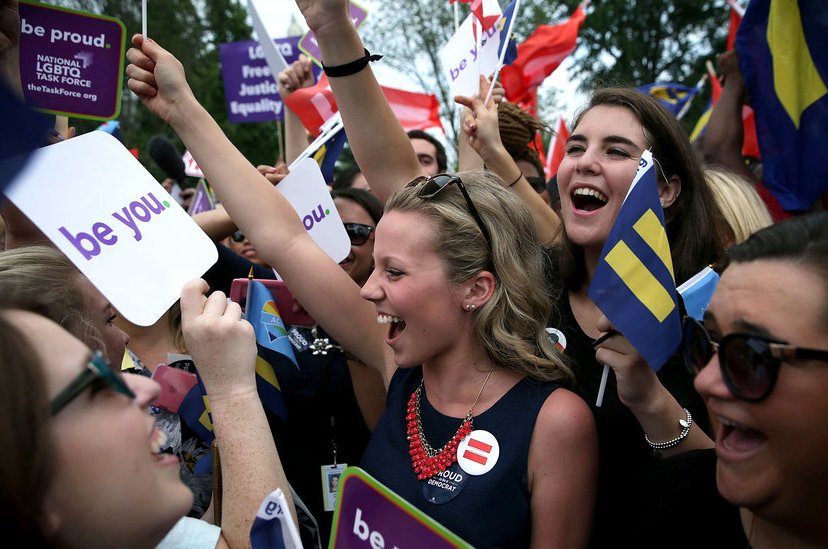
From Legitimacy to Uncertainty: Reflections on 10 Years
of Marriage Equality and What Comes Next
Jim Obergefell: 10 Years After My Supreme Court Win,
Marriage Equality is Under Attack
Trump Starts His Term by Declaring War on the LGBTQ
Community and Democracy
Scared for the Future and LGBTQ Rights
Trump Emulates Hitler in Seeking to Erase
Transgender People
When the highest court in the land takes away one right,
all other rights are at risk. We are fooling ourselves
if we think otherwise. In addition to losing rights that
we gained in the recent past, we are losing dignity and
acceptance in our society. Instead of moving forward
toward a more perfect union, our nation is reversing
course and embracing the hate and ignorance of the past.
Our nation has long failed to live up to its promises of
equality, equal justice under law, and the rights to
life, liberty, and the pursuit of happiness. Immigrants
to the New World murdered Indigenous peoples, stole
their lands, and used enslaved people to build our
nation. Although the Civil War ended 160 years ago,
people of color still experience subtle, blatant, and
systemic racism.
Voting and civil rights are continuously under attack in
our nation’s courtrooms and halls of power. The Equal
Rights Amendment, first introduced in 1923 and
reintroduced in 1973, has never been ratified and made
law. Legislation and court rulings have curtailed or
banned reproductive rights.
Throughout history, those in power have targeted,
demeaned, and demonized Indigenous people, women, people
of color, the queer community, immigrants, the disabled,
non-Christians, and anyone else the majority considers
an outsider. Those efforts continue today, led by those
who put power, ego, and money above their duty to the
public, their oath to the Constitution, and their
obligation to treat others as human beings.
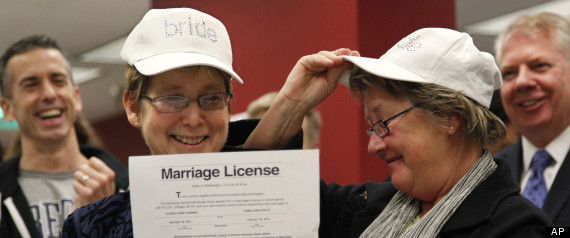
From Legitimacy to Uncertainty: Reflections on 10 Years
of Marriage Equality and What Comes Next
Jim Obergefell: 10 Years After My Supreme Court Win,
Marriage Equality is Under Attack
Trump Starts His Term by Declaring War on the LGBTQ
Community and Democracy
Scared for the Future and LGBTQ Rights
Trump Emulates Hitler in Seeking to Erase
Transgender People
Every marginalized community is part of our LGBTQ
family, and the queer community must take that to heart.
Racism, transphobia, misogyny, biphobia, anti-immigrant
bias, Islamophobia, antisemitism, and more. We must rid
our community of these cancers. When we discriminate
against others, we succeed only in helping those in
power who consider our entire community outsiders,
unworthy, less than human.
It is wrong to hate others who differ, to ignore or
discount the discrimination other members of the queer
community experience. The queer community has long
fought to be seen, to be valued, to exist on equal
footing with others, so why would we ever deny those
same things to another person? Far too many people in
our nation willingly, loudly, and proudly engage in hate
toward others. Although history repeatedly shows where
hatred leads, willful ignorance and a refusal to think
critically or independently doom humanity to repeat this
shameful past.
In 2025, MAGA extremists have chosen vindictiveness as
their playbook, as the only strategy worth pursuing.
This minority, aggrieved for no just reason, has
perverted their faith, our legislative bodies, and our
courtrooms in service to their sense of superiority, to
their need to subjugate others, to their thirst for
riches above all else. They have no empathy for other
human beings.
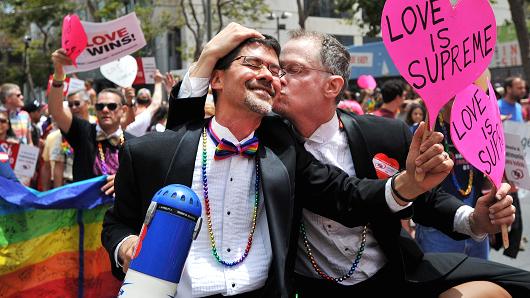
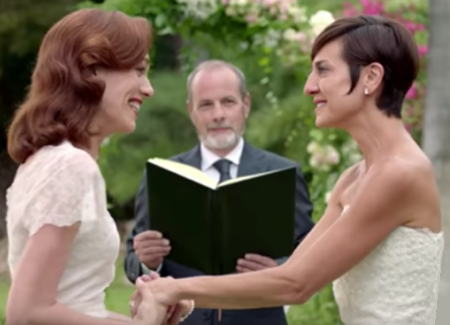
Yes, the queer community has been through this before.
But in 2025, we are losing, and will continue to lose,
the rights we fought hard to achieve. Unless we see
every marginalized community as part of our family, and
until we embrace our full community, we succeed only in
aiding those who work to erase all LGBTQ people from
society. Our community stands to lose the rights
achieved by people whose names we know and countless
people whose names we will never know. They risked
everything to boldly proclaim that we exist, that we
deserve the same rights, protections, and dignity other
people in our nation enjoy.
What does it say about members of our community who,
instead of demanding equality and equity for everyone,
stay silent because they do not see others as equals,
they feel safe where they live, or their privilege
affords them some measure of security? What does it say
about a society that is willing to sacrifice someone, or
an entire community, because they happen to be
different? We must be better than that. We owe it to
those who came before us, and those who will come after
us.
[Source: Jim Obergefell,
Advocate Magazine, June 2025]
Pete
Buttigieg on Trump
President's Character
Current Situation is
Scary
Interviewing Trump Fans
James Talarico: Focusing
on the Wrong 1%
The Truth About Republicans
Sen Adam Schiff:
Trump's Lies
Trump Insulting Women
I Blame the Republican
Congress
Rep Meanie Stansbury: Focus on the Real Issues
Is America a Christian Nation?
I'm Tired of...
Trump's Anti-LGBTQ Agenda: Straight Out of Hitler's
Playbook
Dear Trump Voters: Your Stupidity is Revolting... You
Deserve Our Anger
The
Tariff on Hatred is Here
It's time to pay
up, Trumpers...
The deferred invoice for collectively selling your souls
is here...
It's time to pay for every incendiary campaign boast you
cheered, every baseless diatribe you vigorously
applauded, every nonsensical middle-of-the-night tweet
you boosted, every dehumanizing stereotype and slur you
shared, every callous rally insult you passionately
amen-ed.
It’s time to pay for every denial of Scientific
evidence, every terminated qualified conscientious
objector, every attack on factual, responsible
journalism, every vicious assault on objective reality,
every nepotistic Cabinet appointment, every dog-and-pony
show distraction,
every lazy xenophobic caricature, every tired racist
tirade.



Trump is Insane
Dear Donald Trump: This is How a President Acts
Pete Buttigieg Perfectly Articulates GOP Behavior
Jon Stewart: Violence and Republican Hypocrisy
GLAAD: Trump Accountability Tracker
Trump Starts His Term by Declaring War on the LGBTQ
Community and Democracy
Bernie Sanders:
Divine Right of Kings
Trump Emulates Hitler in Seeking to Erase
Transgender People
Republicans: Fools and Hypocrites
This is how your beloved capitalism works, isn't it:
someone was always going to pay for services rendered?
Nothing is free, isn't that what you've been saying—no
handouts? Well, dig deep, friend, because you are on the
hook for this.
Many people have been footing the bill for a long time:
migrants and Muslims and transgender people, young black
men, refugees, the sick and the poor, already vulnerable
communities pushed to the brink—and now past it.
You were paying, too, of course, you were just too
willfully ignorant or intellectually negligent to
realize it. Over and over we tried to tell you about the
cost: the civil rights you were sacrificing too, the
environmental protections you were losing as well as we
were, the safety and security you were relinquishing
alongside us. We tried to tell you that this hardship
was not a partisan expense, that his moral bankruptcy
would eventually hit you hard too.



Interviewing Trump Fans
America Chose the Monster
Lynae Vanee: Unchecked
Domestic Terrorism
The GOP is the Party of Hypocrisy: How Did it Get This
Way?
Charlie Kirk: The Harsh Truth of His Life
and Death
Bernie Sanders: Support Free Speech and Condemn Violence
Response to the Charlie
Kirk Shooting
Right-Wing Firebrand Charlie Kirk Dead After Shooting at University in Utah
Charlie Kirk Died in a Red State on Trump’s Watch: He Needs to Tone Down His
Violent Rhetoric
But your Fox News bubble and your white Evangelical echo
chamber and your America First, Don't Tread on Me,
middle-finger affinity clubs left you certain you were
insulated from it all; that the only tears that would
fall would be liberal ones, that the only people
suffering voted for Kamala, that all of the pain would
be isolated to people who vote Blue.
You felt immune to the
spreading sickness. You felt invincible because your
messiah told you that you were winning, and that was
enough for you. He was lying to you as he always
does, but you preferred to believe the lie because it
felt warm running through your veins even as it was
poisoning you—the intoxicating, cheap high of making
America great while owning the Libs. That was a costly
drug, that arrogance—and you were slowly going broke in
your addiction.
Now, in the middle of a swiftly-arriving recession, a
precipitous market crash, and a nation in chaos, the
bill is coming due. You can't avoid paying anymore.
You're here with us. I think even you realize that now,
or you are soon about to.


The astronomical costs of everything, the evaporation of
health support services, the loss of pensions, and the
national sadness that no wasteful star-spangled vanity
parade can distract from.
This is the human cost of the MAGA cult delusion, and
we're all paying for it now equally, however we voted.
Ultimately, fascism doesn't choose sides, authoritarians
don’t spare voting blocs, and sociopaths don’t hold any
loyalties. The monster you intended to unleash on the
Woke Mob is turning on you, too.
The tax on hatred is here, Trump voters. The tariff on
your importing his sociopathy has now arrived. I hope
whatever you received was worth it. I hope you still
feel like you're winning.
[Source: John Pavlovitz, May 2025]
Bill Maher: Who Are These Crazed Shooters?
Who was Charlie
Kirk?
Charlie Kirk's Bigoted Words
Charlie Kirk Normalized Violence
We Must
Not Posthumously Sanitize Charlie Kirk's Hateful Life
What Charlie Kirk Believed In: Here Are Real Quotes
South Park: What Would Jesus Say About Donald Trump?
Danielle Kramer: Stochastic Terrorism
Conversation with a
Conservative
Queer Cafe vs. Log Cabin
Republican...
A recent social media
post asserted that Republicans had undergone a major
political change or attitudinal shift over the years.
The meme suggested that the Republicans were liberal
under Lincoln... conservative under Reagan...
and now fascist under Trump. The post inspired the
following exchange.
James Donald Hernandez:
I am a Log Cabin Republican. Republicans were considered
liberals at first because of their radical belief that
blacks should be freemen and slavery abolished; that
women should have equal rights with men. Then they were
considered conservative because of their beliefs that
government should be limited in size, scope, and power.
That the God given rights of all, enshrined in the
constitution should be protected.
Fascism is bigger
government, not smaller. It's government censorship of
speech and ideas. It's imprisonment of political
opponents. It's government control of religion and
health care. It's removing arms from the population so
that only the government has them. That doesn't describe
the Republican party. But it does describe today's left
wing agenda.
I may be gay, but I'm not stupid.
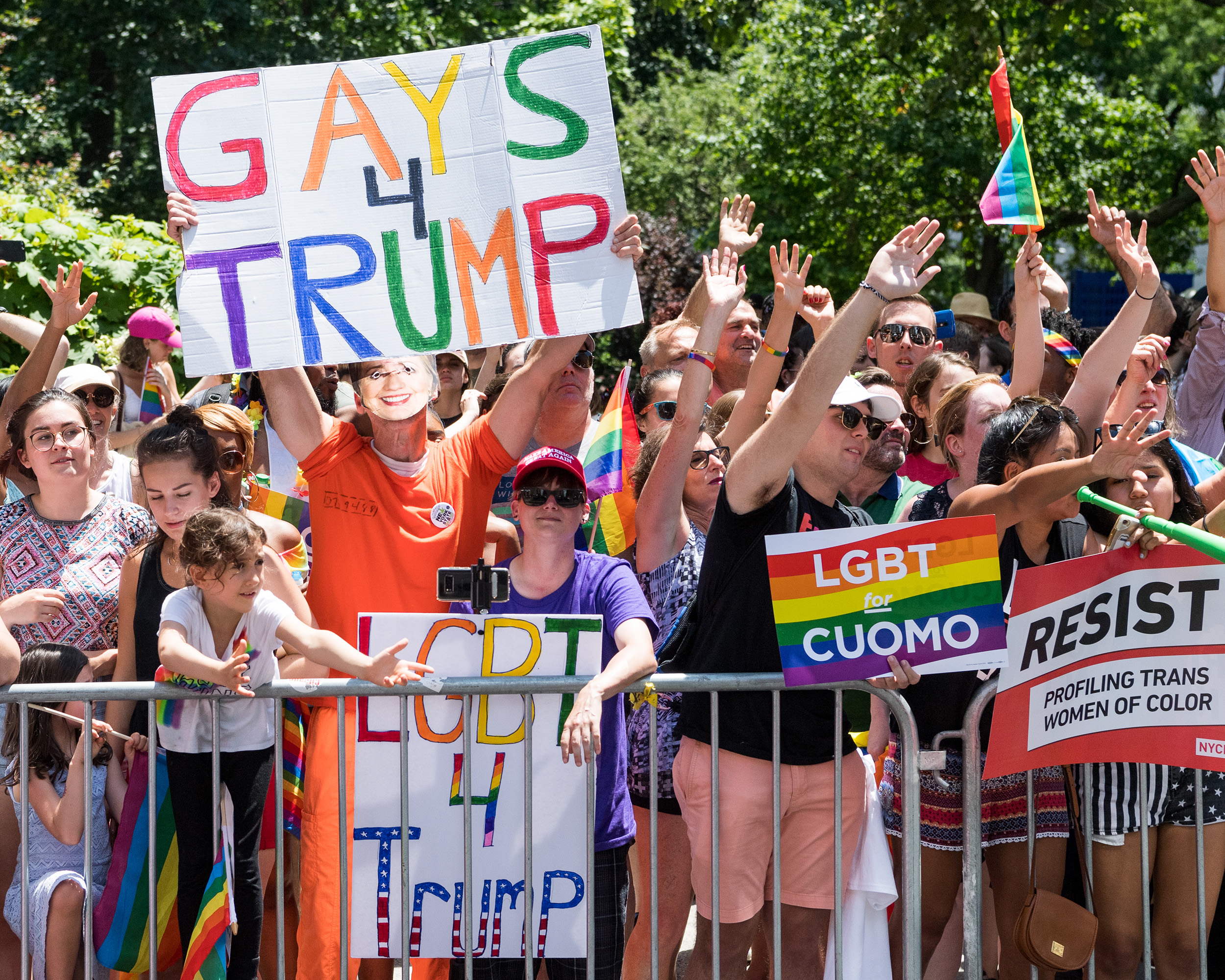
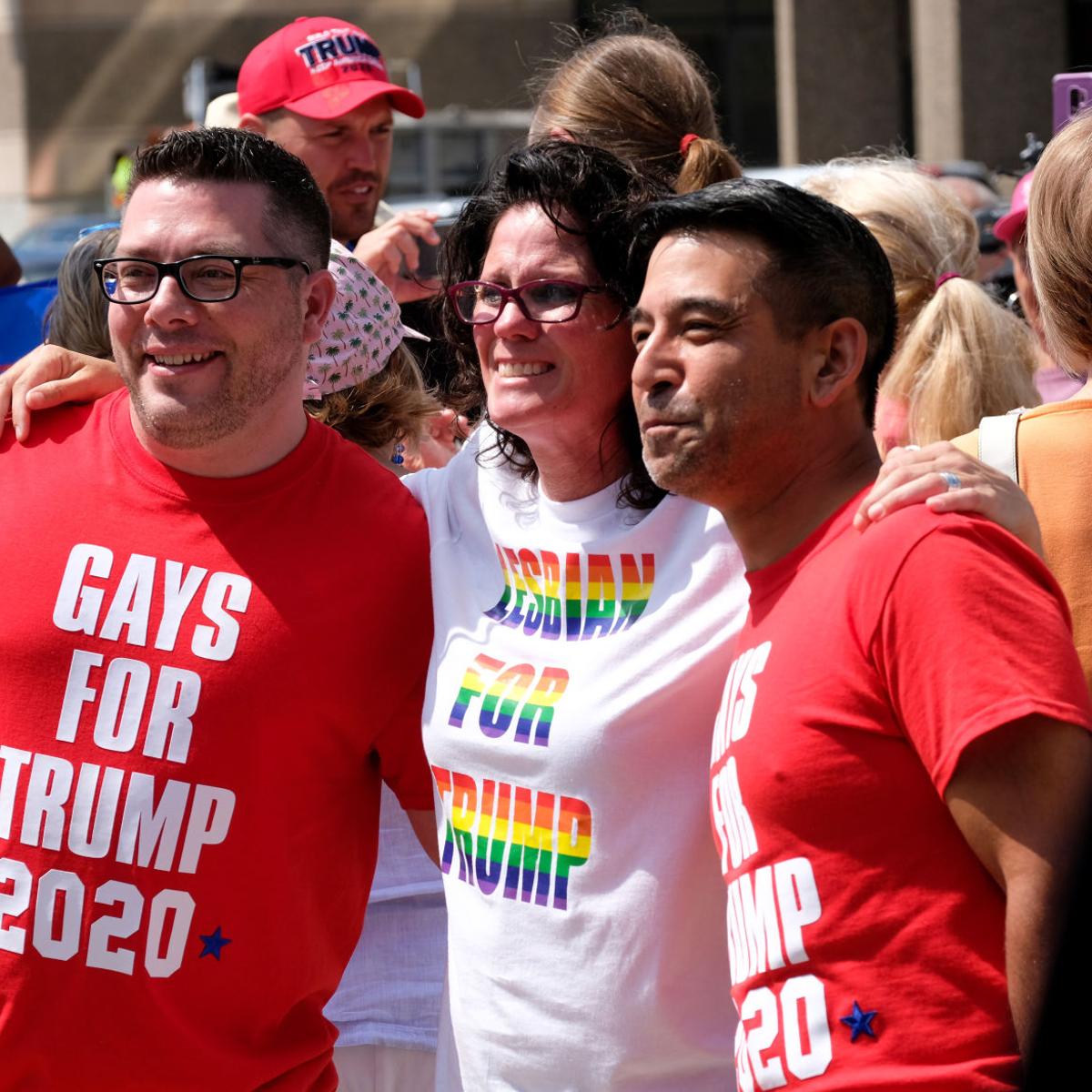
Interviewing Trump Fans
What Radicalized You?
Republicans: Fools and Hypocrites
America Chose the Monster
Things That Offend Right
Wingers
Jon Stewart: Violence
and Republican Hypocrisy
How to Love a Family That Votes Against Your Identity
Lynae Vanee: Unchecked
Domestic Terrorism
The GOP is the Party of Hypocrisy: How Did it Get This
Way?
Would Martin Luther King Jr Have Fought for LGBTQ
Rights?
Queer Cafe:
Maybe you're not stupid. But, you do not seem to be
paying close attention. And you seem a bit confused, if
not deluded.
Have you seriously not noticed how big Trump's fascist
government has gotten in terms of size, scope, and
power? And cutting government programs has very little
to do with reducing the size of government when that
same government is involved in massive over-reach.
Under Trump's regime, the sheer size of his devotion to
corporations and his wealthy friends cost the US budget
$4.5 trillion. It doesn't get bigger than that.
Trump's sweeping censorship of of DEI and LGBTQ subject
matter in schools and colleges is a massive intrusion on
free speech and academic freedom. He continues to
trample human rights, remove protections, and erase the
contributions of marginalized communities, just like a
good old dictator.
Trump's particular hatred for the queer and trans
communities doesn't seem to suggest attitudes akin to
fascism? His state-sponsored oppression and targeted
discrimination of LGBTQ people is pure fascism.
Trump's disinformation and propaganda campaign promoting
lies about the election, the insurrection, the Israeli-Hamas
war, and the Russian-Ukraine war is pure fascism.
Trump's interference with global trade and his
imposition of high tariffs is about as big an intrusion
into the free enterprise market as you can get.
I'm not sure where you got the idea that democrats
removed guns, controlled religion, and imprisoned
opponents. There's nothing factual about that. But we
are seeing Trump violating the concept of the separation
of church and state and imposing Christian beliefs into
governmental processes. And his campaign of threats,
retribution, and retaliation are emblematic of the
bullying we typically see in fascist regimes.
C'mon, man, surely
you are smart enough to see what Trump is doing to your
community and to the nation.
[Source: QC Commentary,
Facebook, April 2025]
Hope in Spite of Trump
Jon Stewart: Violence and Republican Hypocrisy
JD Vance is a Liar
Canadian Silver-Tongued Comedian
Daily Show: Post-Election Reflection
What Trump’s Victory Means
Trump's Continuous Assault on the Media
America Chose the Monster
Return of President Trump: Bleak Day for America and the
World
Trump’s Win Tells Us a Lot About Who We Are
Scared for the Future and LGBTQ Rights
Australian View: US Becomes a Fascist
Nation
Trump's Lethal
Assault on Queer Kids
Trump voters will have
blood on their hands due to the administration's lethal
assault on queer kids
There was a reason crisis calls from LGBTQ youth spiked
700 percent the night Donald Trump was elected last
November. And there was a reason they soared again
around the time of his inauguration. Those weren’t just
coincidental stress flares. They were cries for help
from young queer people who saw what was coming.
They knew instinctively, even then, what some adults
refused to admit, and that is Trump’s reemergence would
unleash an all-out assault on their rights, their
dignity, and their very existence.
Now the 988 crisis line that LGBTQ kids depend on is on
the chopping block. The Biden administration helped
build this resource, one that tens of thousands of queer
youth rely on when they’re contemplating the
unthinkable. And now, under the threat of the vindictive
Trump, that support system could be gutted, its programs
dedicated to LGBTQ youth cut with its funding drained
and reallocated.

Trump is Insane
GLAAD: Trump Accountability Tracker
Reaction to Trump-Vance-Zelensky Meeting
Trump Starts His Term by Declaring War on the LGBTQ
Community and Democracy
Bernie Sanders:
Divine Right of Kings
Canada's Opinion of Trump
Australian View: US Becomes a Fascist
Nation
Trump Emulates Hitler in Seeking to Erase
Transgender People
Republicans: Fools and Hypocrites
America Chose the Monster
Lynae Vanee: Unchecked
Domestic Terrorism
The GOP is the Party of Hypocrisy: How Did it Get This
Way?
This isn’t just policy
cruelty. This is a road map to guaranteed tragedy.
And if all this wasn’t enough, Trump’s Department of
Health and Human Services piles on. In May 2025, it
released a so-called report that revives the
discredited, debunked, and outright abusive practice of
conversion therapy. The same “report” attacks
gender-affirming care, despite overwhelming medical
consensus, from every major health organization in the
US, that such care is essential and lifesaving for
transgender youth.
In 2024, Stanford University published a landmark study
showing that LGBTQ people who are subjected to
conversion practices are more than twice as likely to
attempt suicide. Another recent analysis by the Williams
Institute at the University of California, Los Angeles,
found that denying gender-affirming care to trans youth
is directly associated with severe psychological
distress, increased rates of depression, and higher
suicide risk.
Trump voters, you don’t get to read those statistics and
shrug. You don’t get to see these lives in crisis and
say, “Well, I liked Trump’s stance on inflation.” Or
worse, “He’ll bring down egg prices.” These selfish,
shortsighted, and dangerous reasons to support a known
danger to the LGBTQ community are paramount to giving a
death sentence to queer kids.
That’s why I wrote in February, “It’s OK to Be Angry at
Trump Voters.” I meant it. And I mean it even more
today. Because Trump voters are not bystanders. They are
not innocent. They are not confused. They are
accomplices.
 
Trump Emulates Hitler in Seeking to Erase
Transgender People
Trump is Insane
Trump's Anti-LGBTQ Agenda: Straight Out of Hitler's
Playbook
Reaction to Trump-Vance-Zelensky Meeting
Trump Starts His Term by Declaring War on the LGBTQ
Community and Democracy
Bernie Sanders:
Divine Right of Kings
Australian View: US Becomes a Fascist
Nation
Randy Rainbow:
Trump Anthem
They had been told, explicitly and repeatedly, what
Trump planned to do, and they still signed up to help
him do it.
And there is proof. Look no further than Project 2025,
the far-right blueprint for Trump’s second term. It’s
not just theoretical anymore. It’s policy in action. The
plan outlines mass rollbacks of LGBTQ protections,
shutdowns of civil rights offices, the criminalization
of gender-affirming care, and the renormalization of
conversion therapy, all with the explicit goal of
“eradicating transgenderism” from public life. Does all
this sound familiar?
Trump has not distanced himself from this plan. In fact,
he’s following it to the letter, and he knew he always
would. He lied about that, too. Didn’t know about it? He
knew all about it, and apparently, he loves it.
So when Trump voters say they didn’t know, that they
didn’t think he’d go that far, they are lying to
themselves, or worse, lying to the tortured queer kids
affected. The warnings were everywhere. The reporting
was everywhere. And cruelty was always the point.

This is Why it's Okay to be Angry at Anyone Who Voted
for Trump
My Thoughts on Trump's Win
Donald Trump's Presidency Was an Unmitigated Disaster
Bill Maher: Why
the Democrats Lost
America: Not the Greatest Country in the World
Forever Never Trump
What Does Trump’s Devastating Victory Mean for the LGBTQ
Community?
You don’t get to support a candidate whose policies will
lead to dead queer kids and then cry foul when someone
holds you accountable. If you voted for Trump, you
endorsed a future where suicide hotlines are defunded,
doctors are criminalized for providing affirming care,
and LGBTQ+ kids are told by their own government that
they are broken, diseased, and unworthy of love or
protection.
No more “I didn’t realize.” No more “I just liked the
tax cuts.” No more excuses. We are not talking about
disagreements over tariffs, inflation, or immigration
(which, sadly, has its own young victims). We are
talking about children. We are talking about the most
vulnerable among us, kids who already face bullying at
school, rejection at home, and isolation online, and now
being targeted by their own country.
The next time a queer kid dies by suicide, when their
note references hopelessness, or fear of coming out or
being denied medical care, Trump voters need to sit with
that. To look in the mirror. To reckon with what they
helped enable. Because they will have blood on their
hands.
This is why I wrote that column in February, and since
then, things have gotten worse. This is why I am writing
now. The attacks on LGBTQ+ youth are accelerating. The
policies are becoming more lethal. And the people
responsible are not anonymous. They are your neighbors,
your coworkers, your relatives, and they choose cruelty.
To the queer kids reading this, know that you are loved.
You are not broken. And there are people fighting for
you.
To Trump voters: the brutality you are enabling will not
be forgotten. And history, not to mention the families
of the kids you helped harm, will judge you accordingly.
[Source: John Casey, Advocate Magazine, May 2025]
Trump is Insane
Trump Emulates Hitler in Seeking to Erase
Transgender People
Reaction to Trump-Vance-Zelensky Meeting
Trump Starts His Term by Declaring War on the LGBTQ
Community and Democracy
Bernie Sanders:
Divine Right of Kings
Australian View: US Becomes a Fascist
Nation
Trump Erases LGBTQ and HIV Content From Federal Websites
Unprecedented Policy Purge: Trump's Single Order
Attempts to Dismantle Biden's Legacy
Trump’s Orders to End DEI Programs Reflect His Push for
a Profound Cultural Shift
Judge Scraps Biden’s Title IX Rules: Reverses Expansion
of Protections for LGBTQ Students
Things to Know About How Trump’s Policies Target
Transgender People
Trump Cancels Biden’s Ethics Rules: Critics Call it the
Opposite of Drain the Swamp
Trump Wreaking Hovoc
on Day One
Eliminating Biden-era policies... Dismantling
Biden's legacy...
Immediately following
his inauguration, Trump began wreaking havoc... He
removed LGBTQ and HIV resources from government
websites... He began closing DEI offices and programs in
federal government... He reversed Biden's executive
order that would lower prescription drug costs... He
began deportation of illegal immigrants... He ended
ethics rules regarding lobbying, bribes, and conflicts
of interest... He removed expansive gender markers in
government employment and announced there will now be
only two genders... He pardoned participants in the Jan
6 insurrection... He discontinued a massive bipartisan
spending bill...
With one sweeping move on his first day, the new
president erased more than 75 of his predecessor's
directives. Trump marked his return to the White House
by signing a single executive order that eliminates
dozens of Biden-era policies. The wide-ranging directive
targets more than 75 executive orders spanning
environmental protection, immigration, police reform,
healthcare, and civil rights.


Cancels ethics rules... The opposite of draining
the swamp...
Donald Trump took
office eight years ago, pledging to “drain the swamp”
and end the domination of Washington influence peddlers.
Now, he’s opening his second term by rolling back
prohibitions on executive branch employees accepting
major gifts from lobbyists, and ditching bans on
lobbyists seeking executive branch jobs or vice versa,
for at least two years.
Trump issued a Day 1 executive order that rescinded one
on ethics that former President Joe Biden signed when he
took office in January 2021.
The new president also has been benefitting personally
in the runup to his inauguration by launching a new
cryptocurrency token that is soaring in value while his
wife, first lady Melania Trump, has inked a deal to make
a documentary with Amazon. All of that comes as
the Trump Organization has instituted a voluntary
agreement that forbids making deals with foreign
governments, but not with private companies abroad.
“Trump is opening the floodgates for conflicts of
interest and exploiting his power in office in the hopes
of making billions of dollars on the backs of
taxpayers,” Lisa Gilbert, co-president of the government
watchdog group Public Citizen, said in a statement.
“Instead of focusing on the needs of the American
people, Trump’s only interest is to secure a next deal
to line his pockets.”
That Trump and his family are looking to convert
political success into profits is no surprise. While
seeking reelection last year, Trump sold bibles, gold
sneakers, photo books and diamond-encrusted watches.
But it also marks a departure from when Trump began his
first term in 2017 and signed an ethics order banning
executive branch employees from becoming lobbyists for
five years.
GLAAD: Trump Accountability Tracker
Hope in Spite of Trump
Daily Show: Post-Election Reflection
What Trump’s Victory Means
Trump's Anti-LGBTQ Agenda: Straight Out of Hitler's
Playbook
Trump's Continuous Assault on the Media
America Chose the Monster
Return of President Trump: Bleak Day for America and the
World
Trump’s Win Tells Us a Lot About Who We Are
Scared for the Future and LGBTQ Rights
Australian View: US Becomes a Fascist
Nation
Things That Offend Right Wingers

Trump’s promise to eradicate the “swamp” of
institutional corruption in Washington was a key theme
of his 2016 presidential campaign. As a former president
seeking to reclaim the White House, it was less of a
rallying cry during last year’s campaign. But Trump
supporters often still broke into chants of “Drain the
Swamp!” when their candidate pledged to “shatter the
Deep State,” a term for entrenched government civil
servants who have frustrated Trump and his allies.
The White House press office didn’t answer questions
about whether Trump might have his own ethics rules in
the works to replace the Biden-era ones he nullified.
Trump himself has in the past criticized the “revolving
door” of people who move from government positions to
posts in government and back.
[Source: Will Weissert, Associated Press, January 2025]
Hope in Spite of Trump
Jon Stewart: Violence and Republican Hypocrisy
JD Vance is a Liar
Canadian Silver-Tongued Comedian
Daily Show: Post-Election Reflection
What Trump’s Victory Means
Trump's Continuous Assault on the Media
America Chose the Monster
Return of President Trump: Bleak Day for America and the
World
Trump’s Win Tells Us a Lot About Who We Are
Scared for the Future and LGBTQ Rights
Australian View: US Becomes a Fascist
Nation
Counterfeit of a President
Profoundly
flawed leader... Hopeless,
vicious buffoon... Cheap, soulless bully...
In my life, I have
watched John Kennedy talk on television about missiles
in Cuba. I saw Lyndon Johnson look Richard Russell
squarely in the eye and and say, "And we shall
overcome." I saw Richard Nixon resign and Gerald Ford
tell the Congress that our long national nightmare was
over. I saw Jimmy Carter talk about malaise and Ronald
Reagan talk about a shining city on a hill. I saw George
HW Bush deliver the eulogy for the Soviet bloc, and Bill
Clinton comfort the survivors of Timothy McVeigh's
madness in Oklahoma City. I saw George W Bush struggle
to make sense of it all on September 11, 2001, and I saw
Barack Obama sing 'Amazing Grace' in the wounded
sanctuary of Mother Emanuel Church in Charleston, South
Carolina.
These were the presidents
of my lifetime. These were not perfect men. They were
not perfect presidents, god knows. Not one of them was
that. But they approached the job, and they took to the
podium, with all the gravitas they could muster as
appropriate to the job. They tried, at least, to reach
for something in the presidency that was beyond their
grasp as ordinary human beings. They were not all
ennobled by the attempt, but they tried nonetheless.
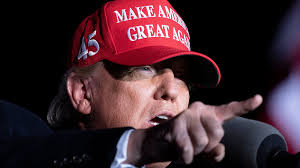
GLAAD: Trump Accountability Tracker
Rev Dr Howard-John Wesley: Which Christianity?
JD Vance is a Liar
Republicans: Fools and Hypocrites
America Chose the Monster
Trump's Anti-LGBTQ
Agenda: Straight Out of
Hitler's Playbook
Lynae Vanee: Unchecked
Domestic Terrorism
The GOP is the Party of Hypocrisy: How Did it Get This
Way?
Would Martin Luther King Jr Have Fought for LGBTQ
Rights?
Things That Offend Right Wingers
Trump is Insane
"With the new administration and Republican-controlled
Congress, we expect unprecedented attacks on our civil
rights."
-Human Rights Campaign
And comes now this
hopeless, vicious buffoon, and the audience of equally
hopeless and vicious buffoons who laughed and cheered
when he made sport of a woman whose lasting memory of
the trauma she suffered is the laughter of the
perpetrators. Now he comes, a man swathed in scandal,
with no interest beyond what he can put in his pocket
and what he can put over on a universe of suckers, and
he does something like this while occupying an office
that we gave him, and while endowed with a public trust
that he dishonors every day he wakes up in the White
House.
The scion of a multigenerational criminal enterprise,
the parameters of which we are only now beginning to
comprehend. A vessel for all the worst elements of the
American condition. And a cheap, soulless bully besides.
We never have had such a cheap counterfeit of a
president* as currently occupies the office. We never
have had a president* so completely deserving of scorn
and yet so small in the office that it almost seems a
waste of time and energy to summon up the requisite
contempt.
Watch how a republic dies
in the empty eyes of an empty man who feels nothing but
his own imaginary greatness, and who cannot find in
himself the decency simply to shut up even when it is in
his best interest to do so. Presidents don't have to be
heroes to be good presidents. They just have to realize
that their humanity is our common humanity, and that
their political commonwealth is our political
commonwealth, too.
Watch him behind the seal of the President of the United
States. Isn't he a funny man? Isn't what happened to
that lady hilarious? Watch the assembled morons cheer.
This is the only story now.
[Source: Charles Pierce, American journalist, author, political
commentator; Esquire Magazine, Dec 2024]
Hope in Spite of Trump
JD Vance is a Liar
GLAAD: Trump Accountability Tracker
Daily Show: Post-Election Reflection
What Trump’s Victory Means
Trump's Continuous Assault on the Media
America Chose the Monster
Trump's Anti-LGBTQ
Agenda: Straight Out of
Hitler's Playbook
Return of President Trump: Bleak Day for America and the
World
Trump’s Win Tells Us a Lot About Who We Are
Scared for the Future and LGBTQ Rights
Australian View: US Becomes a Fascist
Nation
Sarah McBride on Hope
Hope is not
always an organic emotion
You cannot tell me that
the reasons for hopelessness now are greater than the
reasons for hopelessness of an enslaved person. You
cannot tell me that the reasons for hopelessness now are
greater than the insecurity and the fear of workers in
the midst of the Great Depression, and a country that
very easily could have fallen into totalitarianism and
fascism, as many liberal democracies around the world
were falling into that, in the early thirties.

Sarah McBride
Becomes First
Out Transgender
Person Elected
to Congress
Sarah McBride
Makes History as
First Openly
Trans Person in
US Congress
Sarah McBride is
First Openly
Transgender
Candidate
Elected to
Congress
Sarah McBride Says Democrats Should be
More Open to Opponents of Trans Rights
Hope is not always an organic emotion. Sometimes we have
to consciously find it and consciously summon it. And,
yes, there are big challenges right now. Maybe those
challenges are insurmountable. Maybe we will be, because
of social media, incapable of restoring our capacity to
have a national dialogue. Maybe because of the culture
that we live in right now, we will no longer be able to
have conversations across disagreement. Maybe because of
unchecked wealth and corporate power, we won’t be able
to conquer climate change. The list goes on. Maybe.
But we would be the first
generation of Americans to give up on this country, and
we would be the first generation of Americans who were
unable to find the path forward. And I just don’t
believe that we are. And I certainly believe that we
don’t have to be.
[Source: New Yorker Magazine, Interview, Sarah McBride,
US Congress Representative, Delaware, Democrat]
Trump is Insane
Trump Emulates Hitler in Seeking to Erase
Transgender People
Trump Starts His Term by Declaring War on the LGBTQ
Community and Democracy
Bernie Sanders:
Divine Right of Kings
Trump Erases LGBTQ and HIV Content From Federal Websites
Unprecedented Policy Purge: Trump's Single Order
Attempts to Dismantle Biden's Legacy
Trump’s Orders to End DEI Programs Reflect His Push for
a Profound Cultural Shift
Judge Scraps Biden’s Title IX Rules: Reverses Expansion
of Protections for LGBTQ Students
Things to Know About How Trump’s Policies Target
Transgender People
Trump Cancels Biden’s Ethics Rules: Critics Call it the
Opposite of Drain the Swamp
Trump Wins... America Loses
The
Anti-LGBTQ Candidate is Elected
This is a sad day for
America.
Voters came out in
strong support of a candidate who promises to make life
miserable for gay and transgender people and millions of
others. Half of our citizens voted for a man whose
rhetoric and actions represent hate, dishonesty,
corruption, injustice, incivility, immorality, and
ignorance. And a genuinely competent and honorable
candidate with integrity and noble intentions lost the
race to a despicable, lying, despotic madman.

Hope in Spite of Trump
My Thoughts on Trump's Win
Bill Maher: Why
the Democrats Lost
Donald Trump's Presidency Was an Unmitigated Disaster
America: Not the Greatest Country in the World
Forever Never Trump
Trump Emulates Hitler in Seeking to Erase
Transgender People
What Does Trump’s Devastating Victory Mean for the LGBTQ
Community?
Daily Show: Post-Election Reflection
Trump's Anti-LGBTQ Agenda: Straight Out of Hitler's
Playbook
Things That Offend Right Wingers
It is
difficult to believe that our fellow Americans voted in
great numbers for a candidate who indicated he would act
like a dictator, pardon violent criminals, deport
millions of immigrants, and stomp on the rights of women
and LGBTQ people. It is hard to accept the fact that
voters knowingly elected a profoundly flawed and
unstable man who incessantly lied
about everything, promoted conspiracy theories, and
spread rumors, disinformation, and falsehoods at every
turn. It is heartbreaking to realize that half of
our nation thought it was okay to elect a convicted
felon to office, a man who was twice impeached, and who
also disrespected women, botched a national healthcare
crisis, insulted veterans and the military community,
colluded with foreign dictators, sold government
secrets, and incited a violent insurrection on the US
Capitol.
Today we mourn the
loss of integrity and the apparent disregard for what is
fair, just, and right. We are saddened by an emerging
atmosphere that fosters bigotry, stokes the flames of
white supremacy and male dominance, and emboldens those
who seek to harass and assault people who are different
or marginalized. We are dismayed by the greed and
self-interest being displayed by our fellow citizens.
It is unsettling to witness the crass, profane behavior
of witless, cowardly bullies who care nothing about
their fellow Americans.
I have never had any
respect for donald trump. That same disrespect now
extends to those who voted for him.
Today, I am fearful
and anxious. I am unsure about about the future of
democracy. I am worried about what might happen to
my friends and neighbors who are members of
disenfranchised groups. I am nervous about the
rise of hatred and violence. Today, I am
disappointed in America.
[QC
Commentary, November 2024]
What Trump’s Victory Means
Trump's Continuous Assault on the Media
America Chose the Monster
Things That Offend Right
Wingers
Trump's Anti-LGBTQ
Agenda: Straight Out of
Hitler's Playbook
Trump
Emulates Hitler in
Seeking to Erase
Transgender People
Return of President Trump: Bleak Day for America and the
World
Trump’s Win Tells Us a Lot About Who We Are
Scared for the Future and LGBTQ Rights
Bathroom Ban on Capitol Hill
Reminiscent of totalitarian regimes, not a free and
democratic society...
On the occasion of
the Transgender Day of Remembrance (TDOR), it is deeply
troubling to see Congresswoman Nancy Mace proposing a
discriminatory ban targeting transgender women from
using women's restrooms on Capitol Hill. Such proposals
serve as stark reminders of why Pride Month and TDOR are
necessary: to combat bigotry and honor the resilience of
transgender individuals who continue to face systemic
oppression.
This policy is not only unnecessary but also an affront
to the very principles of equality and human dignity
that our nation purports to uphold. Historical parallels
are striking. Segregationists of the past sought to
relegate Black Americans to "separate but equal"
facilities, a practice universally condemned as
unconstitutional in Brown v. Board of Education. The
suggestion that transgender women should use separate or
designated restrooms echoes this xenophobic logic and
undermines the progress we have made as a society.
Let us not forget the words of Justice Anthony Kennedy
in the landmark Supreme Court case Obergefell v. Hodges:
"The Constitution promises liberty to all within its
reach, a liberty that includes certain specific rights
that allow persons, within a lawful realm, to define and
express their identity."

Rep. Mace's proposal is a direct violation of these
constitutional promises. It attempts to strip
transgender women of their dignity, casting them as
"other" and perpetuating harmful stereotypes. The 14th
Amendment guarantees all Americans equal protection
under the law. Policies like this one run afoul of that
guarantee by singling out transgender individuals for
unequal treatment.
Furthermore, how does Rep. Mace propose to enforce such
a draconian policy? The notion of policing bathrooms
raises chilling questions about privacy and autonomy.
Are Capitol Hill staff and visitors to be subjected to
invasive questioning or humiliating searches? Such
measures are reminiscent of totalitarian regimes, not a
free and democratic society.
As a former Republican, I have watched with dismay as
the GOP has descended into a party where bullies like
Mace thrive. Her office's 100% turnover rate speaks
volumes about her leadership—or lack thereof. Bullies
like her feel emboldened in an environment where figures
like Donald Trump, who has been credibly accused of
sexual misconduct and sexual assault, face little
accountability.
As a former candidate for Governor of Maine and a proud
member of the Democratic Party, I firmly believe in
defending the rights of all individuals, especially
those most vulnerable to systemic discrimination. On the
occasion of TDOR, we must reject this hate-filled
rhetoric and stand firm in support of our transgender
siblings. Transgender people deserve to live their lives
without fear, harassment, or dehumanization. The United
States was founded on the ideals of liberty and justice
for all—not just for some.
[Source: Danielle
Stubenrod, Former Candidate for Governor of Maine,
Member of Democratic Party, Nov 2024]
Republican Nancy
Mace Introduces
Transgender
Bathroom Ban US
Capitol
Speaker Mike
Johnson Bans
Trans Folks From
Single-Sex
Bathrooms at US
House of Reps
House Republican
Introduces
Measure to Ban
Transgender
Women From
Female Bathrooms
in Capitol
Republicans
Trying to Ban
Transgender
Congresswoman-Elect
Sarah McBride
From Using
Women's Bathroom
Nancy Mace Seeks
to Bar Trans
Women From Using
Female Bathrooms
on Capitol Hill
First Trans
Member of
Congress
Expected
Pushback From
Republicans
House GOP
Introduces Bill
to Ban Newly
Elected Trans
Democrat from
Using Women’s
Room at Capitol
Get Out The Vote
LGBTQ
Citizens Must Vote Like it Matters
In the last decade,
the LGBTQ community made tremendous advances toward the
goal of true legal and social equality in the United
States. Unfortunately, we are now seeing how quickly
some of those advances can be reversed, whether by
elected officials or by the courts. The rise of
anti-LGBTQ (and particularly transphobic) laws and
rhetoric have left many in our community wondering how
to make a difference. One critical way to ensure that
the LGBTQ community’s voice is always heard in the
political process is to get out and vote. National,
state, and local elections give us an opportunity to
support the issues we believe in and the candidates who
will be our best advocates and defenders of LGBTQ
rights.
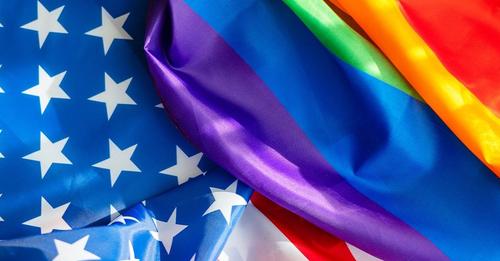


The National LGBTQ Bar encourages all who are eligible
to vote to take several steps:
--Ensure that you are registered to vote in the
jurisdiction where you claim legal residency
--Do your research into the issues and candidates that
will be on your ballot in each electio
--Vote! In every election, no matter how small
--Put volunteer time into helping others to exercise
their right to vote
Volunteering for a voting campaign can take several
forms: You may want to work to ensure that eligible
voters are registered; you might want to put time into
volunteering for pro-LGBTQ candidates or educating
voters on issues of importance to the LGBTQ community;
you might also or alternatively want to put your time
into getting out the vote on and around Election Day.
It’s important to keep an eye on initiatives that will
be on ballots which particularly affect the LGBTQ
community. Reminding your colleagues who are from those
jurisdictions of these important issues up for a vote
may encourage participation in elections and also
provide a way to personalize the voting experience.
Remember, life is busy: people can easily get distracted
and forget about elections, particularly the state and
local ones that aren’t covered as heavily as federal
elections are in the media. You can have a solid impact
by encouraging LGBTQ people and other allies in your
community to show up at the polls (or to mail in their
vote-by-mail ballots).
[Source: National LGBTQ Bar Association, Sept 2024]
GLAAD:
Elections 2024
Trump's Supporters: Never Trust Them
Again
ABC News: Presidential Candidates' Stand on LGBTQ Issues
National LGBTQ Bar Association: Get Out The Vote
Trevor Project: How to Support LGBTQ Young People Ahead
of the 2024 Election
HRC: LGBTQ Youth Wield Significant Power in Upcoming
Elections
National LGBGTQ Task Force: Queer the Vote
USA Today: LGBTQ Voters See Hope in Harris Campaign Amid
Attacks from Right
NBC News: Anti-LGBTQ Rhetoric From the GOP
How to Support LGBTQ Young
People Ahead of the 2024 Election
We must
stop Anti-LGBTQ Rhetoric and Legislation
Young people are listening. I’ve heard many people
underplay the dangers of anti-LGBTQ rhetoric, citing
that “it’s just politics” or “these candidates are just
trying to fire up the base.” They say that the Supreme
Court will never overturn Obergefell vs. Hodges (the
landmark Supreme Court cases which solidified marriage
equality in all 50 states), even when at least one
Justice has explicitly named Obergefell as a decision
that should be revisited.
This year we’ve seen a record number of anti-LGBTQ laws
that are targeting young people. Even though The Trevor
community has been instrumental in stopping the vast
majority of harmful bills, just their introduction and
the toxic discourse that follows can cause harm to LGBTQ
youth mental health.
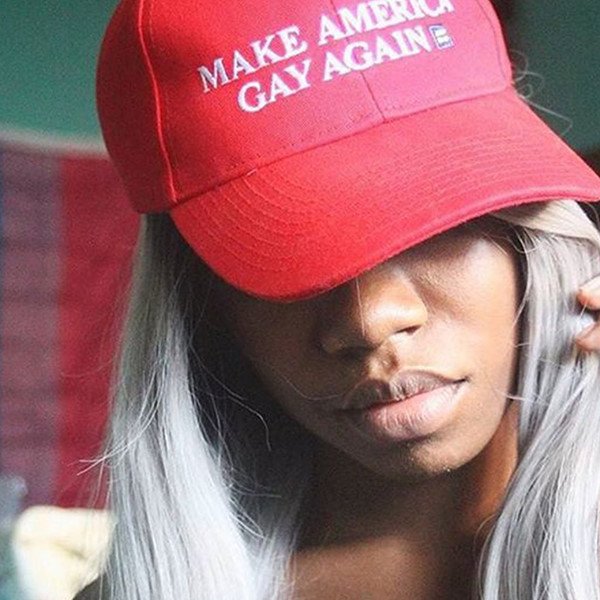
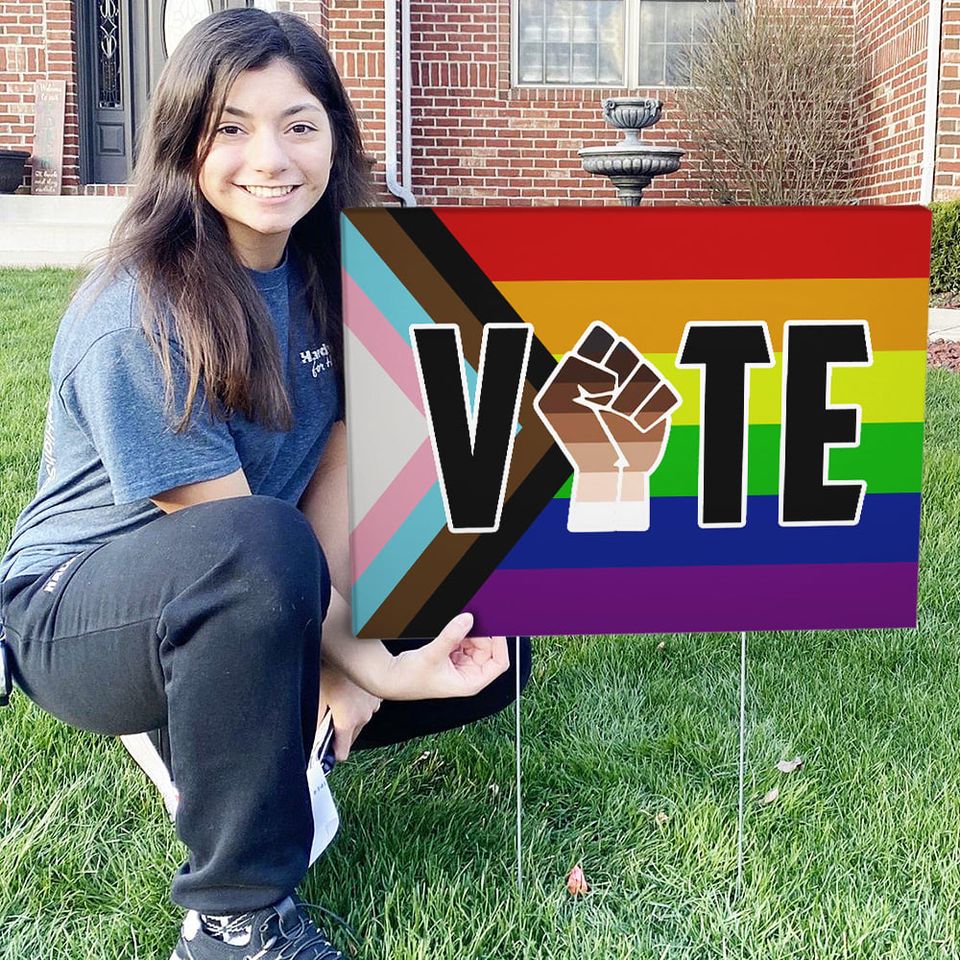

Anti-LGBTQ rhetoric and legislative action have a
profound impact on the mental health of LGBTQ young
people. Nearly 2 in 3 LGBTQ young people said that
hearing about potential state or local laws banning
people from discussing LGBTQ people at school made their
mental health a lot worse. When 41% of LGBTQ youth have
seriously considered attempting suicide in the past year
and young people who are transgender, nonbinary, and/or
people of color reported higher rates than their peers,
people with a public platform have a responsibility.
This is an uphill battle, but The Trevor Project’s team
of advocates work hard to protect LGBTQ young people
every day. In the meantime, what can we do as allies to
support LGBTQ young people during election season?
The best way to support these youth is to ensure that
these politicians don’t get into positions of authority.
In 2024, 617 anti-LGBTQ laws were introduced, with 38
passed into law. With the election coming up, it’s more
important than ever to elect candidates who won’t play
politics with young lives. Do your research about the
people on your ballots. When anti-LGBTQ+ candidates are
defeated in elections, it shows young people that they
have allies who will advocate for them — let them know
they matter with your vote and your voice.
If you can’t vote or if you’re a young person who wants
to advocate for yourself, there’s still a lot you can
do. Talk to your parents. Call your aunt. Call your
neighbor. Tell them that when anti-LGBTQ politicians get
into power, they make life harder for you and the people
you love.
Making young people feel safe during an election in
which they have been targeted by candidates also means
ensuring they feel loved no matter the outcome. When
there are negative comments about the LGBTQ+ community,
it’s important to remind young people in your life that
they deserve to be loved for who they are. Continue to
affirm them and let them know these harmful words aren’t
true and aren’t how you feel.
GLAAD:
Elections 2024
Trump's Supporters: Never Trust Them
Again
ABC News: Presidential Candidates' Stand on LGBTQ Issues
National LGBTQ Bar Association: Get Out The Vote
Trevor Project: How to Support LGBTQ Young People Ahead
of the 2024 Election
HRC: LGBTQ Youth Wield Significant Power in Upcoming
Elections
National LGBGTQ Task Force: Queer the Vote
USA Today: LGBTQ Voters See Hope in Harris Campaign Amid
Attacks from Right
NBC News: Anti-LGBTQ Rhetoric From the GOP



People often feel pressure to have a perfect affirming
conversation. But it can be as simple as letting them
know you are a safe person who sees them and holds space
for them. As always, let them know that resources like
the Trevor Project exist to support all LGBTQ young
people day and night, not just for when they’re in
crisis, but to talk through all sorts of things, even
the impact of political discourse during the election
season.
It’s also important to educate yourself about LGBTQ
issues. Start by reading our Trevor Project guides to
familiarize yourself with how to approach LGBTQ mental
health or sexual orientation; knowing how to have
affirming conversations can help combat a political
climate that can be dangerous for LGBTQ young people.
Remember that affirmation from people closest to them is
extremely impactful: LGBTQ young people who reported
feeling accepted by the adults in their lives typically
had more than 40% lower odds of attempting suicide in
the past year.
Elections have consequences, and when anti-LGBTQ
politicians get into power, they debate or pass laws
that tell our kids that their existence isn’t valid.
Young LGBTQ people just want to be known and loved, and
growing up is hard enough. As we vote, we have the power
to show that harmful words (and laws) have consequences.
In the meantime, we need to do everything we can to
support the mental health of LGBTQ young people through
affirmation, resources, and advocacy.
[The Trevor Project, Sept 2024]
GLAAD:
Elections 2024
Trump's Supporters: Never Trust Them
Again
ABC News: Presidential Candidates' Stand on LGBTQ Issues
National LGBTQ Bar Association: Get Out The Vote
Trevor Project: How to Support LGBTQ Young People Ahead
of the 2024 Election
HRC: LGBTQ Youth Wield Significant Power in Upcoming
Elections
National LGBGTQ Task Force: Queer the Vote
USA Today: LGBTQ Voters See Hope in Harris Campaign Amid
Attacks from Right
NBC News: Anti-LGBTQ Rhetoric From the GOP
Finding Fault
Haters
actively seeking a problem where none exists
As people throughout
the world (especially Americans) become less tolerant,
less informed, and less educated, the kind of anger and
hate we are seeing at the Paris Olympics will continue.
Despite the outrage, there was actually no hidden
political agenda or religious ridicule taking place in
the Opening Ceremony. But weaker minds will find those
elements none the less.
The lack of multicultural awareness is shocking and
shameful, and casts an unfortunate shadow on an otherwise
beautiful (albeit campy) event.
Conservative
US and world leaders denounced the Paris Olympics
opening ceremony and what they perceived to be a mocking
of the Last Supper painting.
House Speaker Mike Johnson says it was "shocking and
insulting" to Christians around the world. Rep. Marjorie
Taylor Greene also voiced her opposition to the opening
ceremony, saying that it had "gone completely woke."
Others called it "blasphemous." Some called it
"demonic and deranged."
Anybody
with a decent education would have caught the literary
and historical references and would have had no reason
to be offended. There were no Christian symbols included
in the show, because the show was about Greek mythology
and French history. Ignorant people, it would seem, tend
to find fault where none exists.


What can
we conclude about an event that has no political or
religious agenda, but somehow still drew scorn from
people outraged by its political and religious content?
It can be embarrassing and appalling what unenlightened
people read into things. It can be disturbing how they
misinterpret things.
Many
spectators said that they enjoyed the show and its
over-the-top flamboyant portrayal of French culture and
Greek mythology. Many spectators appreciated the
artistry of the show, including the drag queens and
other avant-garde elements. These spectators observe
that some folks are just prone to politicize everything
and wish that they would just calm down and quit
over-reacting.
Religious
politicians, like Mike Johnson and Marjorie Greene, are
not reliable sources of informed opinion. It is on
occasions such as this that their ignorance and shallow
education are on full display. When Marjorie says
the event is too "woke," she means that she is too
unenlightened and ill-informed to understand or
appreciate it. Instead, she sees images and
symbols she does not recognize from the history classes
she did not attend. She misinterprets the meaning of the
creative expression that she failed to grasp from the
art and culture classes she never showed up for.


Scholars of art,
history, literature, and culture quickly offered an
explanation...
--The headless woman was Marie Antoinette. She ruled over
France and was found guilty of treason, conspiracy, and
stealing from her own country.
--The
offending scene was not the Last Supper. It was,
instead, a depiction of an ancient Greek Bacchanal,
which is a promiscuous, extravagant, and loud party.
The parties often spanned several days and honored the
god of wine and pleasure, Bacchus (the blue guy covered in grape
vine).
--It was not Death on a pale horse. It was Sequana, Goddess of the Seine, the
famous French river in which the boat precession took
place. She was meant to be the representation of the
Olympic spirit.
--Even the ménage a
trois scene had symbolic meaning beyond the sexual
threesome. The phrase is, of course, an iconic French
expression. But, in the context of this event, it
is meant to represent the three times Paris has hosted
the Olympic Games.
There were
goofy sketches of the French Revolution, French culture,
Greek mythology, and, don't forget, talented musical
performances by Lady Gaga and Celine Dion. But not one
mention of Christianity.

Mistaking a
Bacchanalia for the Last Supper is the least of our
troubles. But the mindset that makes those kinds of
errors of judgement regarding trivial matters can easily
commit atrocities in an assortment of matters that are
highly consequential. And they often do.
What we are seeing are the usual suspects, the ones who
criticize things they don’t understand. They hastily
reject things that are unfamiliar and foreign, and
possess no level of sophistication and tolerance for
anything divergent or different. They are the ones who
are judgemental and self-righteous about a range of
issues for which they have limited education and
exposure, and impose their absurd version of morality on
innocent people.
These are the same folks who reject the legitimacy of
LGBTQ concepts, who do not even consult the biological,
physiological, medical, psychological, and sociological
research regarding such topics. It is these
unenlightened members of society who advance lies,
falsehoods, and misconceptions about LGBTQ people. Their
rhetoric is reckless and irresponsible and causes great
harm to the LGBTQ community.
There are a shameful number of Americans who form their
opinions about LGBTQ issues and arrive at disturbing
conclusions about concepts of sexuality and gender,
based on very little, if any, actual knowledge. They
lack historical, scientific, and cultural perspectives.
They ignore the research and dismiss the science
associated with such topics, and rely, instead, on
superstition and outmoded ways of thinking. They rest on
arbitrary and subjective sources and are comfortable
basing their ethics and wisdom on concepts that are
technically imprecise, academically inaccurate, and
intellectually unreasonable.
The dangerous result of such willful ignorance is an
entrenched attitude of fear and hate for anything or
anyone who is different. Consequently, these folks lack
compassion and empathy. Their ability to be kind and
accepting is sadly compromised. And the impact on real
live people is devastating.
[Source:
QC Commentary, July 2024]
Olympic Opening Ceremony Explained
Paris Olympics: Already Super Gay on Day One
Celine Dion at the Paris
Olympics
Paris Olympics: Overwhelmed by an Outpouring of Anger
Wacky, Wonderful, and Upsetting
NPR Olympic Report: Major Moments During Opening
Ceremony in Paris
Blasphemous
Olympics Opening Was Actually An Ode To Greek Mythology
Lady Gaga at Paris Olympics
How the Olympics Became the Queerest Sporting Event in
the World
Pride Spoilers
Homophobes
and religious zealots can be a real pain in the ass
Detractors will often
often bring up the tired old notion that "pride" is one
of the seven deadly sins, right alongside lust,
gluttony, greed, sloth, wrath, and envy. They like to
quote the bible, "Pride goes before destruction and a
haughty spirit before a fall (Proverbs 16:18)."
The insinuation is that LGBTQ Pride events and their
attendees are somehow sinful.
Of course,
it is a very childish, mean-spirited, and uninformed
perspective.
We see lots of homophobes preaching the sin of "pride"
without any regard for its original meaning as
translated from ancient bible text and without any
reverence for the people who have no ill-intent in its
expression.
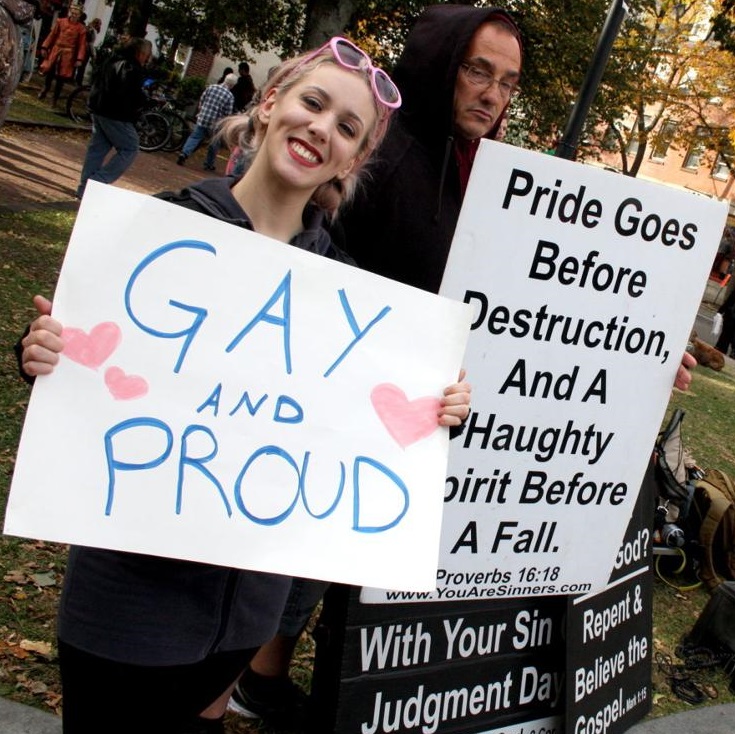
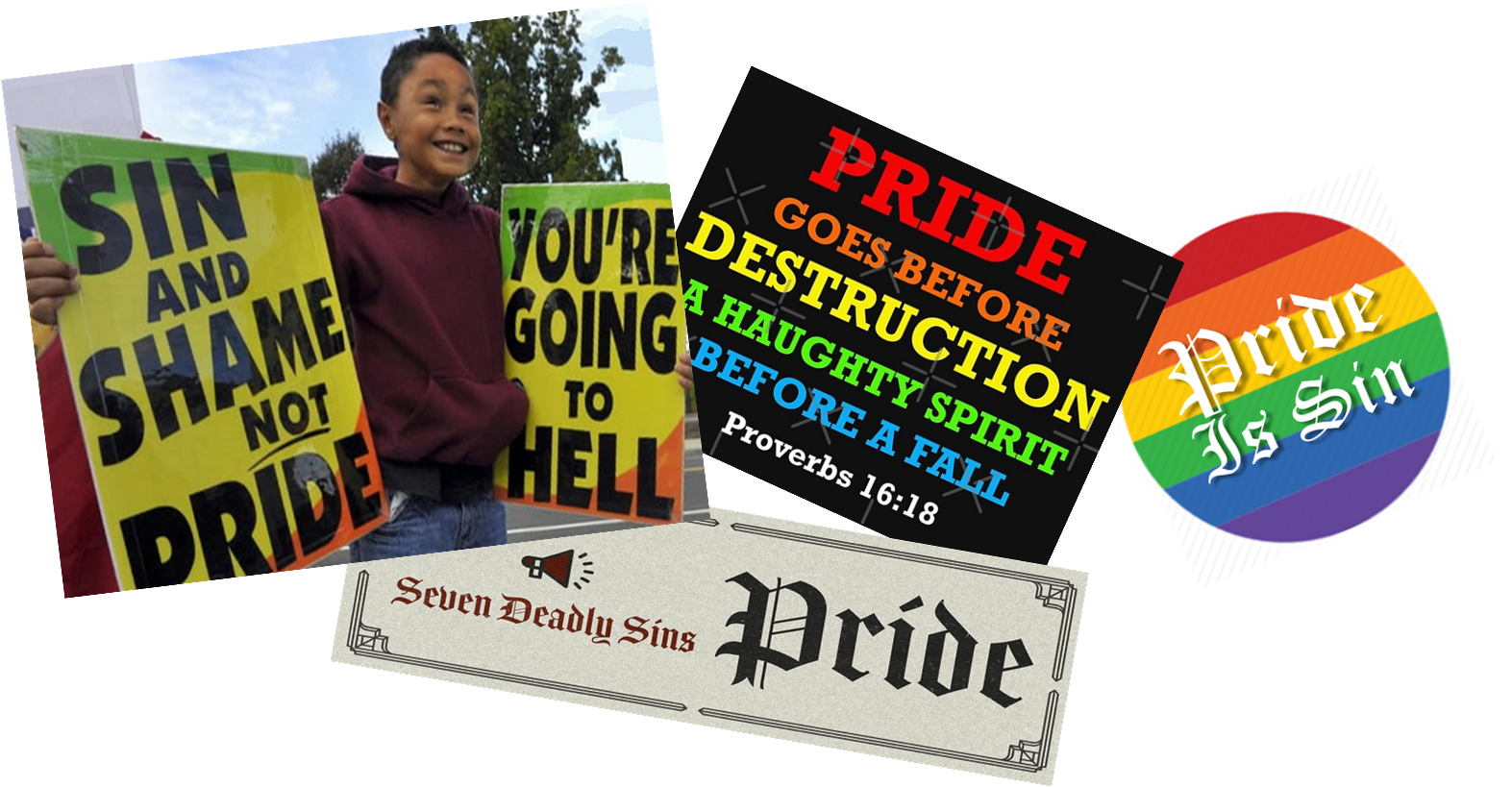
What the old testament talks about is "hubris," which is
an exaggerated sense of self-importance, arrogance,
haughtiness, egotism, boastfulness, and vanity. It's
about bragging and self-aggrandizement. Being smug,
conceited, and pompous.
The "pride" associated with LGBTQ celebrations is not
the same thing. It is about affirmation, honor, dignity,
and self-worth. It is related to satisfaction and
self-esteem, and a feeling of success and achievement.
It is similar to being proud of a noble accomplishment
or being a proud parent or the pride you feel in being
an American. It is not a nefarious trait.
There is no reason for these hateful religious zealots
to denigrate a group of people who are simply expressing
the joy and delight in living their lives.
[Source:
QC Commentary, June 2024]
LGBTQ Pride is More Than a Parade
LGBTQ Pride: It All Started With Protest
Remembering Stonewall: LGBTQ Pride Started With a Riot
Joy
is Protest, Celebration is Dissent
Happy Pride: What Do We
Have to Be Proud Of?
Why is it Important to Celebrate LGBTQ Pride?
Info: Celebrating
the LGBTQ Community
LGBTQ
Pride: Definition and History
Celebrating LGBTQ
Trailblazers
The Power of Pride
LGBTQ Pride Explained
What Was
Harrison Butker Thinking?
Full house of offenses against women in the
workforce, the LGBTQ community, abortions, IVF and Joe
Biden...
The Kansas
City Chiefs kicker recently spoke to the Benedictine
College graduating class — which must have been hard,
since his foot was firmly in his mouth the whole time.
The evolution of man — you know, the chart that shows an
apelike character evolving over time into an
opposable-thumb-having, upright-walking man — is
supposed to be 6 million years of progress. But
even after 6 million years of coaching, encouraging and
coddling them, trying to undo some of the ancient
philosophies that propagated the caveman era, there are
still men like Kansas City Chiefs kicker Harrison Butker,
who hasn’t progressed past homo habilis.
In case you have blocked all the “Make America great
again” propaganda from your social media, you might’ve
missed that last weekend (May 2024) Butker spoke at the
commencement at Benedictine College, a Catholic private
liberal arts school in Atchison, Kansas. Butker didn’t
just offend the left — he offended everyone who is not a
white cisgender male. He completed the full house
of offenses by railing against women in the workforce,
the LGBTQ community, abortions, IVF and President Joe
Biden’s handling of the COVID-19 pandemic, to name a
few.
Butker didn’t just go after women, he told women who
were graduating from college that wanting to have a life
beyond serving their husband is evil. “I think it is
you, the women, who have had the most diabolic lies told
to you,” Butker said during his dumb-ass speech. “Some
of you may go on to lead successful careers in the
world, but I would venture to guess that the majority of
you are most excited about your marriage and the
children you will bring into this world.”
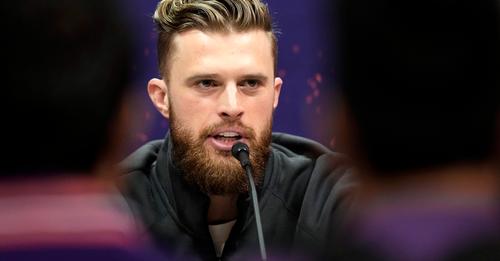
What Was Harrison Butker Thinking?
Full Text: Harrison Butker's Graduation Speech
This is Why the Kansas City Chiefs Need
to do Something About Harrison Butker
Students Speak Out on Harrison Butker's Uncomfortable
Commencement Address
Benedictine College Nuns Denounce Harrison Butker's
Speech at Their School
Thousands Sign Petition Condemning Harrison Butker's
Remarks
Benedictine Sisters Say Harrison Butker's Speech Doesn't
Represent College
“I can tell you that my beautiful wife, Isabelle, would
be the first to say that her life truly started when she
began living her vocation as a wife and a mother,”
Butker added. “I’m on this stage and able to be the man
I am because I have a wife who leans into her vocation
as a wife and a mother.”
Mothering and homemaking is serious work. But it
shouldn’t be thrust upon a woman as if that is her
life’s purpose — it should be her decision. I’m
assuming that Butker’s antiquated thinking is informed
by his upbringing; with a mom who stayed home and tended
to the family, and as such he understands the importance
of…
But, wait, his mother was a physicist. She holds two
degrees — chemistry and medical physics. WTF is
wrong with this guy? No, seriously, WTF is wrong with
him? I can’t say that he’s been knocked around too many
times, as he’s a kicker (which is Latin for definitely
not getting knocked around). But how can a man raised in
a house with a mom who works as a medical physicist hold
beliefs that are so archaic?
When you’ve not evolved as a man, you do things like
binge-watch episodes of “Naked and Afraid,” kill
unsuspecting animals in your spare time — and give
commencement speeches that discourage the female
graduating class from aspiring for more, because men
need to be propped up. Butker could’ve ended his speech
by smashing a beer can on his forehead and that would’ve
probably been the eighth most obnoxious thing he did
that day.
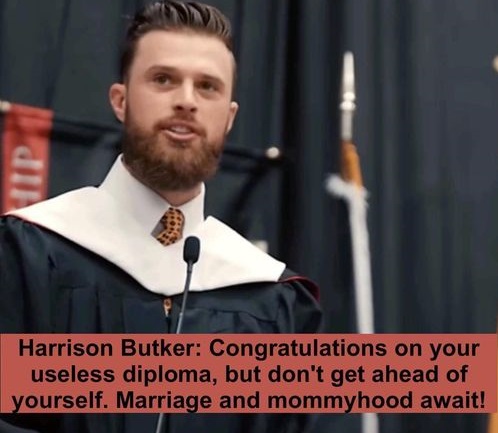
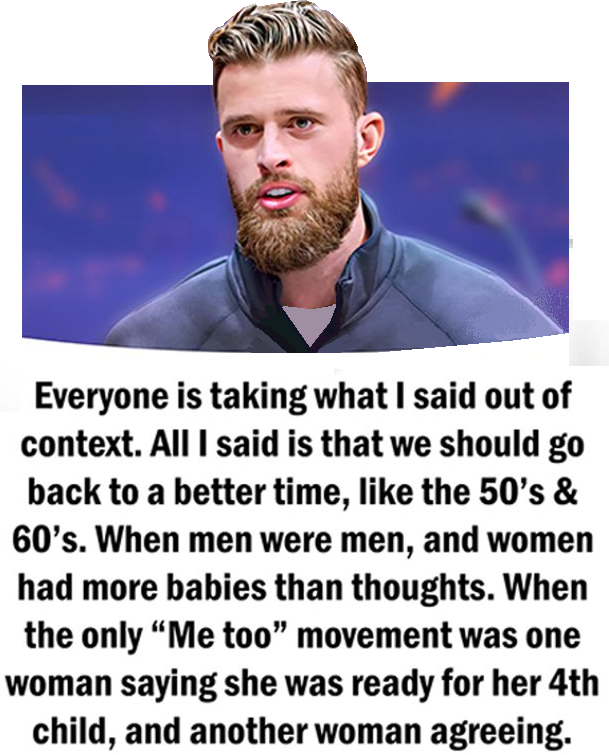
What Was Harrison Butker Thinking?
Full Text: Harrison Butker's Graduation Speech
NFL Star Harrison Butker is Standing Behind His
Homophobic and Misogynistic Remarks
This is Why the Kansas City Chiefs Need
to do Something About Harrison Butker
Students Speak Out on Harrison Butker's Uncomfortable
Commencement Address
Benedictine College Nuns Denounce Harrison Butker's
Speech at Their School
Thousands Sign Petition Condemning Harrison Butker's
Remarks
Benedictine Sisters Say Harrison Butker's Speech Doesn't
Represent College
But before we keep going, I have so many questions.
First, who the hell wants to hear from an NFL kicker?
Even the most exciting kicker is still the 100th-most
exciting football player on any game day. An NFL kicker
can play a full NFL game and wear his game uniform to a
nightclub that evening without even taking a shower
because he doesn';t break a sweat and everything on him
is still fresh. Let's be honest, NFL kickers are
inconsequential in the American zeitgeist, even when
they are amazing.
Secondly, where are all of his teammates? Do they
support Butker’s All-American pickup-truck brand of
thinking? Since word broke that Butker is a throwback
from the 1950s, not one player has come out to show
their love for him. The Chiefs’ quarterback doesn’t even
talk to him. “Honestly, I don’t talk to Harrison all
year long, man. I just let him do his thing,” Patrick
Mahomes said during an appearance on “The Pat McAfee
Show” earlier this year. By “do his thing,” I’m sure
Mahomes means he just lets him keep being his
misogynistic, homophobic, pro-white-male self.
In his speech, Butker also encouraged men to lean into
their masculinity — which, as a man, let me tell you
what manly men never have to say to other men: “Hey, why
don’t you lean into your masculinity?”
Butker’s entire dreadful speech could be summed up in a
few words: He’s a white man who is afraid of losing.
What he’s actually afraid of losing, no one knows. But
someone, some mythical someone, is always working to
take something away from white men.
This fear is what pushed the Supreme Court to gut
affirmative action and kneecap women’s rights. It’s this
fear that’s behind the inhumane treatment of
undocumented citizens. It was the basis of Donald
Trump’s presidency. For centuries, white men have been
afraid of losing something, and so they’ve always fought
against this fear. This fear is what prevents
commonsense gun laws and reparations.
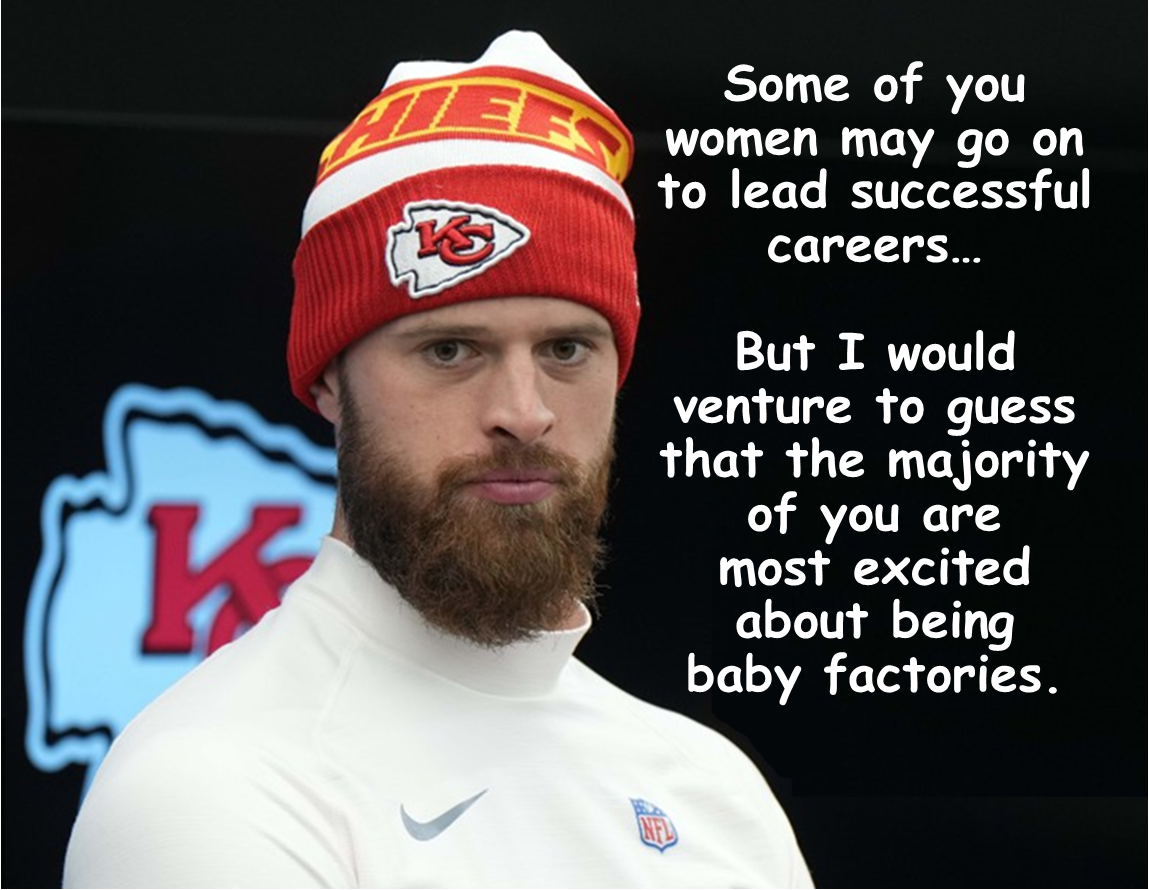
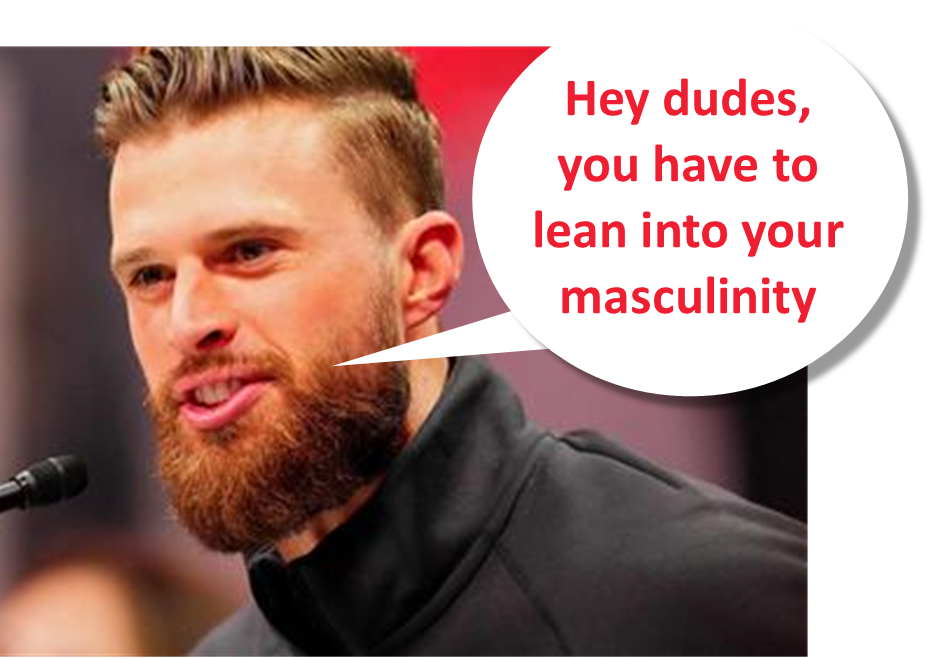
Butker’s speech wasn’t about uplifting the graduates or
the endless possibilities that await them, which is what
most commencement speeches are about. It was
mansplaining couched in biblical text, the way that most
MAGA Christians use the Bible: by taking the pieces that
substantiate racism, sexism and transphobia at face
value and ignoring the bits about being a kind, decent
person. It was Butker’s chance to rain down on the
hopefuls before the rest of the world does. It was a
sadistic opportunity to dash the hopes of women who have
often had to deal with limitations put on their dreams.
It was cruel and uncalled for.
And though the Chiefs have declined to comment on
Butker’s address, there will be no repercussions for his
actions. The NFL only punishes nonviolent protests like
kneeling on the sideline during the national anthem as a
show of solidarity for equal rights for people of color
— as the league is done even pretending that it cares
about anything else.
Butker merely proves that there is an audience for hate
speech of his kind, and, as such, he will always be
employed, never be forced to evolve and will be pristine
even on Sundays. It takes a special kind of person to be
a kicker — which is another way of saying, when it comes
to masculinity, Butker only looks the part.
[Source: Stephen A Crockett Jr, Huffington Post, May
2024]
Lynae Vanee: Unchecked
Domestic Terrorism
The GOP is the Party of Hypocrisy: How Did it Get This
Way?
Would Martin Luther King Jr Have Fought for LGBTQ
Rights?
What Was Harrison Butker Thinking?
LGBTQ 2023: The Rising Tide
Why LGBTQ Stories Matter in 2023
Trump Emulates Hitler in Seeking to Erase
Transgender People
Today’s White Christian Nationalists are Looking More
and More like Nazis
With Anti-LGBTQ Hate From The Right On The Rise,
Violence Was Sure To Follow
To Overcome the Dangers Facing our Community, LGBTQ
Leaders Must First Look Inward
Ana Kasparian: I Don't Care About Your Religion
Trump Doesn't
Care About the LGBTQ Community
The
truth is he doesn't care about anybody but himself.
If it was
possible to seriously examine the platform of the Donald
Trump campaign... or, better yet, to look inside
the head of Donald Trump and determine his
motivations... we would find that his sole
interest is in himself. He is actively and tirelessly
looking out for number one.
At this point in his life and career, that means he is
looking out for his survival, his ability to avoid
litigation, his efforts to delay punishment, and his
desire to escape any kind of accountability for his
criminal actions. He is entirely self-centered and
razor-focused on his ability to prevail for his own
sake.
Instead of
talking about critical issues that effect the lives of
hardworking, average Americans, his campaign stops are
filled with rants about how everyone is treating him so
badly. Instead of talking about social and economic
concerns, Trump is spewing tirades of vengence, threats,
lies, and hate speech. Instead of behaving like a
responsible leader and selfless servant of the people,
he is seen preening and posturing as an arrogant bully
and narcissistic moron, full of boasting and fiery
vitriol.



National
Crisis: Dictator Trump
Lynae Vanee: Unchecked
Domestic Terrorism
The GOP is the Party of Hypocrisy: How Did it Get This
Way?
Would Martin Luther King Jr Have Fought for LGBTQ
Rights?
Today’s White Christian Nationalists are Looking More
and More like Nazis
With Anti-LGBTQ Hate From The Right On The Rise,
Violence Was Sure To Follow
To Overcome the Dangers Facing our Community, LGBTQ
Leaders Must First Look Inward
Make no
mistake, Donald Trump is not seeking the presidency as a
kind of noble way to serve humanity, to improve the
lives of Americans, and to truly make a positive
difference. He is not trying to "make America
great." He is trying to make himself great.
He is totally in it for himself.
As far as
the American people are concerned, they should not
imagine for a moment that he has their best interests in
mind. He absolutely does not care about anything
but himself. And the American people? What
about them? They serve a purpose in his mind.
They have a certain utility. He can and will "use"
them to gain his objective.
While he
has no love or loyalty to any segment of the electorate,
he finds them useful if he can convince them to vote for
him. Whether you are a woman, an immigrant, a
queer, or a christian, he will find a way to use you,
while at the same time plotting to eradicate your
rights. He will say whatever he has to say to
acquire your vote but will do nothing to deliver on his
promises.
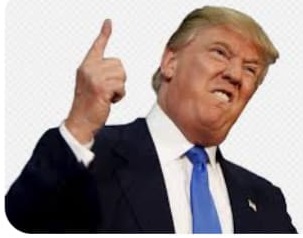

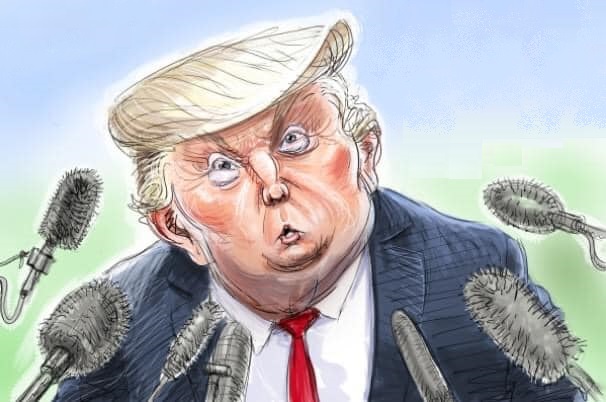
LGBTQ Americans: History Is on Our Side
There's Never Been a Better Time for the
LGBTQ Rights Movement
LGBTQ 2023: The Rising Tide
Why LGBTQ Stories Matter in 2023
LGBTQ Americans: History Is on Our Side
There's Never Been a Better Time for the
LGBTQ Rights Movement
He is not
to be trusted. There is no sincerity, no genuine
honesty, or integrity in any remark he makes about his
affection for a certain slice of the population. Any
kind comment he might utter, you can be assured he does
not mean it.
Your value
to Trump is as a resource or tool by which he can feed
his ego, prop up his fundraising, and ultimately gain
power for himself. With that power he intends to
do as much damage as he can to anyone in need. He
will cut funding and cut rights with the fury of a
haybailer and without so much as a blush. He will
enact laws to restrict and deny protections from those
who need it most. He will deliberately
disenfranchise the poor and working class, immigrants
and minorities, women and queers.
He has no
regard for justice or fairness. He has no respect
for democracy, the Constitution, or the rule of law.
He will use the presidency as a means to enrich himself.
He will abuse his office every bit as much as he did
last time, even worse. He will increasingly fan
the flames of bigotry, misogyny, sexism, and homophobia.
He will continue to obstruct justice, deny rights, and
break laws. He will persist in his corruption and
seek to install a form of government that is all about
his central control over all aspects of daily life.
He plans to be a dictator, and unless more Americans
stand up, speak out, and resist, he will achieve that
despicable goal.
[Source:
QC Commentary, April 2024]
National
Crisis: Dictator Trump
Lynae Vanee: Unchecked
Domestic Terrorism
The GOP is the Party of Hypocrisy: How Did it Get This
Way?
Would Martin Luther King Jr Have Fought for LGBTQ
Rights?
Today’s White Christian Nationalists are Looking More
and More like Nazis
With Anti-LGBTQ Hate From The Right On The Rise,
Violence Was Sure To Follow
To Overcome the Dangers Facing our Community, LGBTQ
Leaders Must First Look Inward
LGBTQ Americans: History Is on Our Side
There's Never Been a Better Time for the
LGBTQ Rights Movement
LGBTQ 2023: The Rising Tide
Why LGBTQ Stories Matter in 2023
LGBTQ Americans: History Is on Our Side
There's Never Been a Better Time for the
LGBTQ Rights Movement
Evolving
Viewpoints:
Israeli and
Palestinian Conflict
Can
There Be Real Peace Between the Israelis and
Palestinians?
"Peace
will come when the Arabs and Jews will love their
children more than they hate each other."
-Golda
Meir, Fourth Israeli Prime Minister, Founder of Israeli
State
"To end
the cycle of violence between Israel and Palestine, we
must impose a ceasefire on blame. We must not use the
past to justify surrendering to the supposed
impossibilities posed by seemingly irreconcilable and
intractable differences."
-Dr.
Warren J. Blumenfeld
“We’re
seeing that this is incredibly controversial because of
the history of the conflict and the passions that
history sparks on both sides of the issue. I think we’re
seeing how when you have such deeply entrenched feelings
and opinions, it becomes difficult to engage without
creating pressure for anyone who disagrees with a
particular side.”
-Michelle
Deutchman, Executive Director, Univ of California Natl
Center for Free Speech & Civic Engagement
"The
Israeli-Palestinian conflict garners intense feelings,
and the debate can and has spilled over into incivility
and unreasonableness."
-Jon
Fansmith, American Council on Education
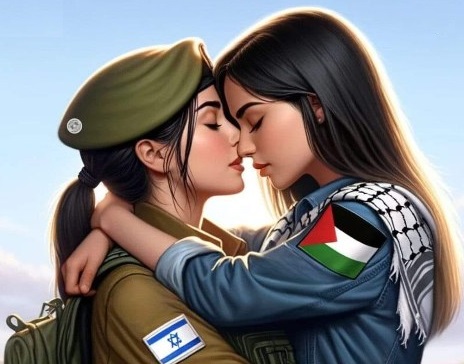

LGBTQ Nation: Let’s Break the Palestinian-Israeli
Impasse
BBC: Israel and Palestinians: Gulf Between Hope and
Reality of Peace
US News & World Report: America’s Evolving Views of the
Israeli-Palestinian Conflict
NBC News: Israeli-Palestinian Conflict Tears into LGBTQ
Jewish Community
LGBTQ Nation: End the Cycle of Violence, Stop the Blame
Chicago Council on Global Affairs: Pathways to Peace:
Reflections on the Israeli-Palestinian Conflict
CNN : Debate Over the Israel-Gaza War has Raised
Tensions
US public
opinion has become more sympathetic toward Palestinians
in recent years, but experts say attitudes could shift
again amid the reignited conflict. Since the attacks on
Oct 7, Rabbi Hyim Shafner (Kesher Israel Synagogue) says
there’s still a feeling of “helplessness” among the
congregants of his Washington, DC synagogue. He speaks
of “a certain inner anxiety” and says he feels less
comfortable. He worries about his 21-year-old daughter,
who lives in Israel and recently finished her commitment
to the Israeli armed services. Everything’s been “thrown
into question” overnight, after what he describes as a
promising stretch of time for his people. “It’s a
turning point,” Shafner says. The newly launched war
between Hamas and the Israeli government, which is now
bombarding the Gaza Strip, could also mark a turning
point for US public opinion. Recent polling suggests
that Americans’ perceptions of Israelis and Palestinians
had been evolving and turning less one-sided, but
analysts say more change is likely on the way in the
wake of the recent bloodshed. Historically, support for
Israel has remained strong, but more Americans
(especially young people and Democrats) have become
sympathetic to Palestinians in recent years.
-Elliott Davis Jr, US News & World Report, Oct 2023
Open Letter to Secretary General Guterres on the
Protection of Children in Israel and the Occupied
Palestinian Territory: We are alarmed by the escalation
of hostilities in Israel and Gaza, and its
unconscionable toll on Israeli and Palestinian children.
As you noted on November 6, Gaza is becoming a
“graveyard for children.” We are writing to urge you to
add the Israel Defense Forces, the Qassam Brigades (Hamas),
and Islamic Jihad to your list of perpetrators of grave
violations against children in armed conflict (the
so-called “list of shame”) with immediate effect and to
prioritize the protection of children in your response
to the conflict.
-Human Rights Watch, November 16,
2023

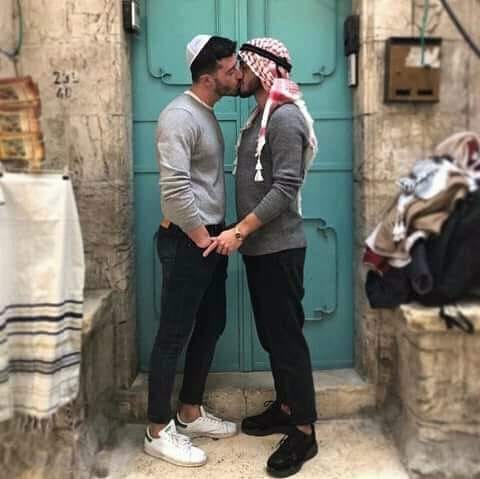
Chatham House: Ignoring the Roots of Violence in the
Israel–Palestine Conflict Challenges Any Future Peace
NPR: Biden Wants a Two-State Solution for
Israeli-Palestinian Peace
Anti-Defamation League: Conscientious Conversations on
the Israeli-Palestinian Conflict
National Public Radio: US College Students Clashing Over
the Israel-Hamas War
The Conversation: Making Peace Between Israelis and
Palestinians
New Yorker: Commentary on the Israeli-Palestinian
Conflict
Sojourners: Prayer for Peace in Israel and Palestine
"The seemingly intransigent and tragic conflict between
Palestinians and Israelis has lasted many generations,
resulting in perpetual war, death of innocents and
combatants alike, pain, grief, suffering, terrorism,
hopelessness, denial, separation of families, loss of
property and material possessions, and a numbing of the
senses. The entire planet and all its inhabitants have
been negatively affected by every detail, small and
great, of this perennial impasse. Is there any way out
of the morass, or will this current reality never
change?
People on the political left and the right can stay
entrenched in their binary ideologies and policy
positions. They can continue to pursue the present
course of (non) action and perpetual antagonism by
marginalizing and demonizing anyone who in any way
supports the establishment and/or maintenance of the
state of Israel as a nation for the Jewish people.
They can also persist in uttering the word Zionist
with disgust and scorn as justification for
automatically dismissing others’ views and stances while
telling themselves they are remaining true to their
principles, maintaining their integrity, and most of
all, acting intersectionally.
Groups like Hamas and Hezbollah can perpetually refuse
Israel’s right to exist and repeatedly launch
missiles on territories populated by Jewish civilians
while using their own civilians as fodder for incoming
bombs. Palestinian and Jewish parents can continue to
put their youth in harm’s way in defense of sacred soil
promised by God to three varied peoples: Jews,
Christians, and Muslims.
The Israeli government and leaders of the Palestinian
Authority and Hamas can remain intransigent on several
critical issues while failing to move forward on
good-faith peace efforts and agreements. They might feel
concerned that if peace were to break out in the region,
then current and future levels of foreign aid from
outside nations and individuals might dry up with these
sources no longer seeing further need for aid. They may
also use the Machiavellian tactic of divide and
conquer to better ensure their chances of retaining
and enhancing power.
I hope we
as all the people will finally have a voice, a seat at
the figurative and literal table."
[Source:
LGBTQ Nation, BBC, US News & World Report, CNN, ADL,
NBC, NPR, New Yorker, November 2023]
Queer: A New Narrative
Why We Need To Say Gay
We're Here, We're Queer, We're Getting
Married in Florida
It Still Matters to Be Openly LGBTQ
Esquire Essay: The Euphoria of Elliot
Page
LGBTQ People, We Will Have Our Freedom
Anti-LGBTQ Hysteria Is Showing America’s True Identity
The Cowardice, Selfishness And Ignorance
Of The Easily Offended
Anderson Cooper: Being Gay is One of the Greatest
Blessings of My Life
How to Be More Out and
Proud in Your Everyday Life
For a More Perfect Union:
We Need Education and Understanding
It Still Matters
to Be Openly LGBTQ
Just
Witness Current Events...
“Why do you have to bring up the LGBTQ thing?” ...
“Marriage equality is the law of the land; now what else
do you want?” ... These kinds of comments,
which I had heard often when I first entered the race
for San Diego County sheriff, come from non-LGBTQ and
LGBTQ individuals.
Mayor Pete Buttigieg’s presidential run as an openly
LGBTQ candidate and his sudden rise in some polls led to
a Time magazine cover with his husband titled “First
Family,” basically asking: Is America ready to elect an
openly gay man as US president?
In light of the social and legal progress that
transgender, lesbians, gays and bisexuals have achieved
in recent years, many tend to think that a person’s
sexual orientation no longer matters (our society is
still grappling with the gender identity movement). I
can see why some people question the necessity for
public officials, professional athletes entertainers,
etc., to say that they are LGBTQ. Aren’t we, after all,
living in a post-LGBTQ world? Except for Qatar. Does it
really matter? I think it still does.
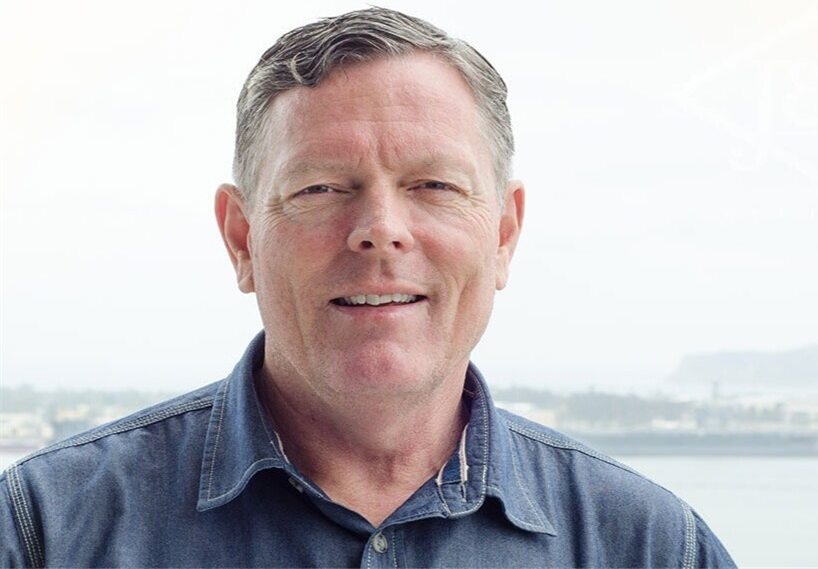
Queer Majority: Essays, Articles, Issues
John Pavlovitz: I'm Really Tired of
Hatred
Pete Buttigieg: Sharp Comebacks to Critics
Evangelicals Made a Bad
Bargain With Trump
CNN: Why Evangelicals
Should Care About Trump's Lies (And Other Sins)
In Gay We Trust: What Do I
Do With This Hate?
All LGBTQ People Should Stand in Solidarity with Black
Athletes
Commencement Address for All Queer College Graduates
Advocate Magazine: Women of the Year
Advocate: Ice Age for
Bigots
That’s why when I am asked about my sexual orientation
or comments are made regarding LGBTQ issues, I
unhesitatingly say that I am gay. I think that it still
matters because in addition to the questioning comments
that I have received, I’ve gotten many more emails,
phone calls and remarks from individuals, young and old,
who said that my letting them know that I am an openly
gay male gave them some inspiration for their own
personal struggle with sexual or gender identity.
I’ve had conversations with individuals who say that my
public acknowledgment of being gay in a very
conservative profession has helped them on their journey
of coming out. I’ve had several parents of gay and
transgender kids ask me how to deal with their child’s
situation. I’d like to think that my openness will
influence LGBTQ teenagers, especially those
contemplating suicide, to see that that our society is
progressing toward greater acceptance and equality, even
with today’s turbulent politics. I want to remind them
that things will get better because we and our allies
won’t forget the battles, the lives lost and the pain
suffered that has resulted in a more inclusive society.
As for my own profession, I would have to say that law
enforcement still has a way to go with its homophobia
and transphobia. I know that there are closeted law
enforcement officials today uncomfortable with coming
out at work because they believe that doing so would be
detrimental to their career. There is hope, however.
During my public service, I encountered several LGBTQ
youths who’ve told me that they’ve never considered a
career in law enforcement because they didn’t think that
they could be gay or transgender and be a police
officer. They now think differently. I hope that they
will join the ranks of law enforcement so they can help
change the culture from within.

Electing qualified, principled members of our community
to public office is important because homophobia and
transphobia continue to exist in the United States.
Right here in San Diego County, we have a congressman,
Darrell Issa, who has consistently gotten an “F” rating
from the Human Rights Campaign for opposing both
marriage equality and laws that protect the LGBTQ
community from discrimination in employment and housing.
Issa has even supported constitutional amendments
banning same-sex marriage and defining marriage as
between one man and one woman. On the national front, we
had a president who had banned transgender people from
serving in the military, essentially saying that they
are divisive and a financial drain on the country.
In the 35 years that I served in law enforcement, being
gay has informed both the way in which I’ve treated my
co-workers and the way in which I have approached the
general public. Being gay has made me more resilient,
more accepting, more compassionate, more cognizant of
the worth that can be found in everyone I come across.
So yes, while being gay is not a qualification for
public office, it matters because it is a part of my
character. It matters because I want LGBTQ people to be
seen for more than just a caricature of who we are, that
we are seen as real people: mothers, fathers, sons and
daughters, students, military veterans, athletes,
workers in all fields and professions.
[Source: Dave Myers, 33-year veteran of the San Diego
County Sheriff’s Department, Times of San Diego, Nov
2022]
2021 Was Supposed to Be the Worst Year
for LGBTQ Rights... Then Came 2022
LGBTQ Pop Culture Moments And Newsworthy
Events That Happened In 2022
After the Colorado Springs Attack, LGBTQ
People are Furious at the Rhetoric Targeting Them
How Leslie Jordan Made Being a Sissy OK
for Gay Men Like Me
Jonathan Capehart's
Commentary: Media's Post Trump Future
The Love: Black Eyed Peas,
Jennifer Hudson, Joe Biden
Queer Voices Podcasts
To Overcome the Dangers Facing our Community, LGBTQ
Leaders Must First Look Inward
We're Here, We're Queer, We're Getting
Married in Florida

Ruminations on
the Death of Pat Robertson
Legacy of Hate
The legacy
of televangelist Pat Robertson may be somewhat different
than he imagined when he responded to a call to the
ministry back in 1960 and began the Christian
Broadcasting Network. Things may have gone in another direction if
Pat had used his energies to actually preach the gospel
and spread the love of Jesus. Instead he devoted
much of his life disseminating disinformation and
hatred. His depth of righteous indignation, social
intolerance, and dogmatic judgement are unmatched.
He ranted
about many subjects for which he had little knowledge or
training and spread lies and conspiracy theories like so
much manure on a freshly plowed field. He made endless
racist, sexist, misogynist, xenophobic, and homophobic
remarks. His words were hateful and damaging. Many
of his dimwitted followers embraced his harsh rhetoric
and used it to oppress women, minorities, immigrants,
and gays.
The LGBTQ
population was one of his favorite targets. His
mean-spirited attitude and dehumanizing language towards
the queer community was unrelenting. There was no
tolerance, no respect, no acceptance, no search for
understanding, no compassion, no love... only
hate. And that is what the reverend Robertson will
be remembered for.
I don’t
like to think about Pat Robertson going to hell. That
lets him off too easy. But.... in a humorous
vein... I like to think about Pat
Robertson finding himself in a heaven he never believed
would exist. Where
Divine is reading in drag to the children murdered at
Sandy Hook and Ulvalde. While Edie Windsor and Gertrude
Stein drink coffee in the breakfast nook, talking
politics with Harvey Milk. Where
Matthew Shepard relaxes by a stream, reading poetry to a
nameless young man whose family never claimed his body
when he died of AIDS. Where the
music plays loudly, welcoming dancers from the Pulse and
Club Q to the floor where they twirl and vogue with all
the murdered trans women of color whose names we never
knew. And where
Jesus puts his arm around Pat Robertson’s shoulders and
drapes him with a rainbow feather boa.
[Source:
QC Commentary, June 2023]
Pat Robertson, Conservative Anti-LGBTQ Televangelist,
Dies at 93
Pat Robertson, Preacher Who Dedicated His Life to
Promoting Anti-LGBTQ Hate, Dies During Pride Month
Televangelist Pat Robertson Has Died But His Anti-LGBTQ
Legacy Will Live On
Pat Robertson's Lies About the LGBTQ Community Helped
Shape Today's Republican Party
Leading US Christian Homophobe Pat Robertson is Dead
Pat Robertson's History of Terrible Vile Anti-LGBTQ
Statements
Pat Robertson's Unintentionally Memorable Moments
Ron
DeSantis is a Fascist
The would-be dictator of Florida
Ron DeSantis, Republican governor of his self-proclaimed
“free state of Florida,” has banned books and taken over
a formerly progressive and successful college and
university system and turned it a deep crimson blood
red. He has eliminated advanced placement courses on
African American history and criminalized
gender-affirming care and the use of public facilities
that align with trans people’s gender identities.
He has banned people’s use of gender pronouns that may
vary from their sex assigned at birth, eliminated
discussions of race, sexuality, and gender in schools,
revoked reproductive freedoms from Florida residents,
shipped undocumented immigrants hundreds and even
thousands miles away, and in his Goofy war with Mickey
Mouse, has eliminated thousands of well-paying jobs and
physical infrastructure for Florida residents.
He even called Jordan Neely – the man who has been
charged with the unprovoked choking death of an unarmed
homeless street artist with mental health issues on a
Manhattan subway car – “a good Samaritan.”
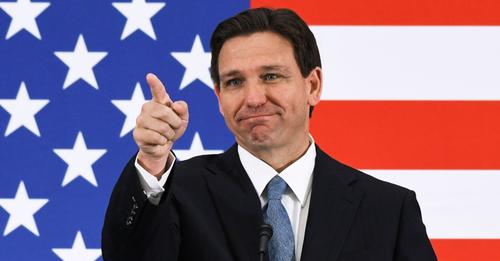
DeSantis Signs Bills Targeting Drag Shows,
Pronouns, Bathroom Use, and Trans Children
In One Day, Ron DeSantis Signs Five Bills Severely
Restricting Trans Rights in Florida
Florida's LGBTQ Activists Plan to Fight Back Against
DeSantis's Slate of Hate
Ron DeSantis Signs Law Giving Doctors Right to
Discriminate Against LGBTQ Patients
DeSantis Signs Bill Defunding Diversity Programs at
Florida Colleges
In his campaign to turn Florida into the place “where
WOKE goes to die,” he is killing his state’s economy and
imposing fear and hatred of “the other,” of anyone who
does not march to a patriarchal Christian white
supremacist drum.
He certainly has disdain for the “Four Freedoms”
outlined by President Franklin D. Roosevelt (ironically
on January 6) in his 1941 State of the Union Address:
Freedom of Speech, Freedom of Worship, Freedom from
Want, and Freedom from Fear.
However original DeSantis may think his platform is, he
is merely following the authoritarian fascist playbook
of earlier times.
On the right-wing side of the dictatorial strongman’s
political spectrum, we find the political practice of
“fascism.” While also deployed as an epithet by some,
fascism developed as a form of radical authoritarian
nationalism in early-20th-century Europe in response to
liberalism and Marxism on the left.
Historian Umberto Eco, who grew up under the fascist
Mussolini regime, enumerates the characteristics of what
he calls “Ur-Fascism” or “Eternal Fascism” with 14
“typical” features.
He stressed, “These features cannot be organized into a
system; many of them contradict each other and are also
typical of other kinds of despotism or fanaticism. But
it is enough that one of them be present to allow
fascism to coagulate around it.”


DeSantis Signs 'Don't Say Gay' Expansion and
Gender-Affirming Care Ban Bills
So-Called Don't-Say-Gay Rules Expanded Through 12th
Grade in Florida
Florida Governor Ron DeSantis Attacks the LGBTQ Community
Welcome to DeSantis: Randy Rainbow Song Parody
Ron DeSantis Signs Largest Slate of
Anti-LGBTQ Bills in Florida History
Broadcaster Chris Hayes Obliterates
‘Authoritarian’ Ron DeSantis Over Gender-Affirming Care
Florida Governor Ron DeSantis Signs Horrific Healthcare
Bill Allowing Anti-LGBTQ Discrimination
Here they
are:
--The cult of tradition. “One has only to look at the
syllabus of every fascist movement to find the major
traditionalist thinkers. The Nazi gnosis was
nourished by traditionalist, syncretistic, occult
elements.”
--The
rejection of modernism. “The Enlightenment, the Age of
Reason, is seen as the beginning of modern depravity. In
this sense Ur-Fascism can be defined as irrationalism.”
--The cult
of action for action’s sake. “Action being beautiful in
itself, it must be taken before, or without, any
previous reflection. Thinking is a form of
emasculation.”
--Disagreement is treason. “The critical spirit makes
distinctions, and to distinguish is a sign of modernism.
In modern culture the scientific community praises
disagreement as a way to improve knowledge.”
--Fear of
difference. “The first appeal of a fascist or
prematurely fascist movement is an appeal against the
intruders. Thus Ur-Fascism is racist by definition.”
--Appeal
to social frustration. “One of the most typical features
of the historical fascism was the appeal to a frustrated
middle class, a class suffering from an economic crisis
or feelings of political humiliation and frightened by
the pressure of lower social groups.”
--The
obsession with a plot. “Thus at the root of the
Ur-Fascist psychology there is the obsession with a
plot, possibly an international one. The followers must
feel besieged.”
--The
enemy is both strong and weak. “By a continuous shifting
of rhetorical focus, the enemies are at the same time
too strong and too weak.”
--Pacifism
is trafficking with the enemy. “For Ur-Fascism there is
no struggle for life but, rather, life is lived for
struggle.”
--Contempt
for the weak. “Elitism is a typical aspect of any
reactionary ideology.”
--Everybody is educated to become a hero. “In Ur-Fascist
ideology, heroism is the norm. This cult of heroism is
strictly linked with the cult of death.”
--Machismo
and weaponry. “Machismo implies both disdain for women
and intolerance and condemnation of nonstandard sexual
habits, from chastity to homosexuality.”
--Selective populism. “There is in our future a TV or
Internet populism, in which the emotional response of a
selected group of citizens can be presented and accepted
as the Voice of the People.”
--Ur-Fascism speaks Newspeak. “All the Nazi or Fascist
schoolbooks made use of an impoverished vocabulary, and
an elementary syntax, in order to limit the instruments
for complex and critical reasoning.”
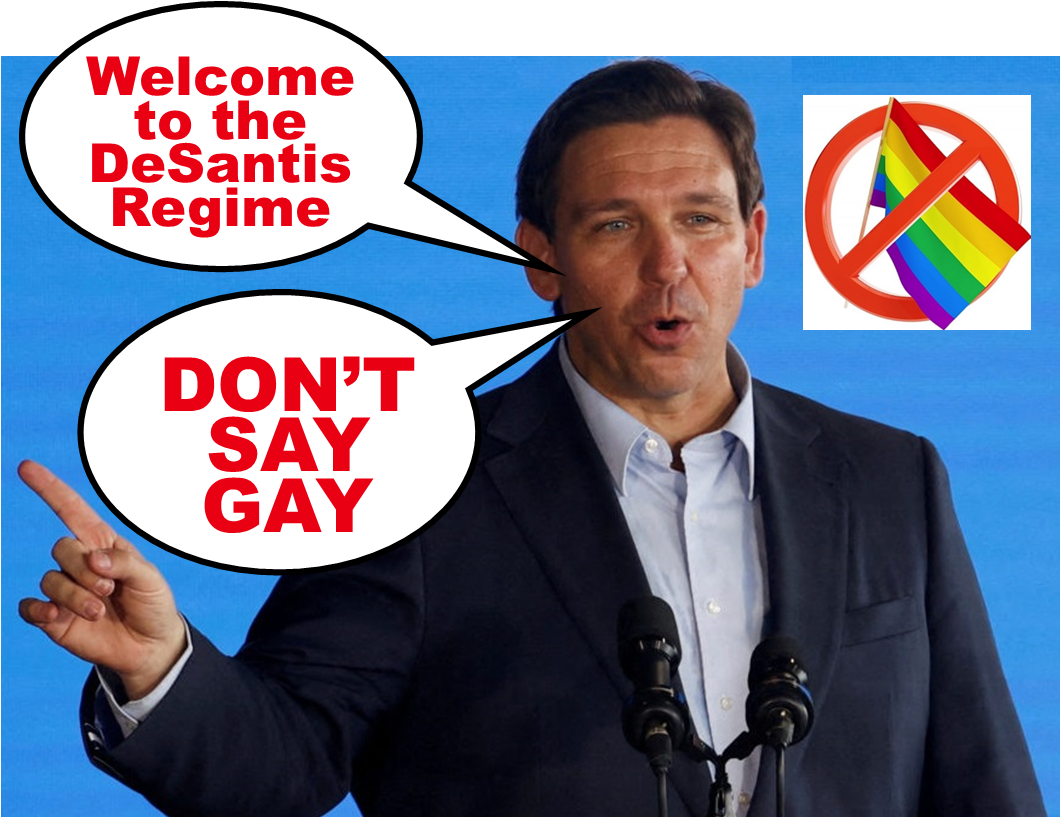

Queer Majority: Essays, Articles, Issues
John Pavlovitz: I'm Really Tired of
Hatred
Pete Buttigieg: Sharp Comebacks to Critics
Evangelicals Made a Bad
Bargain With Trump
CNN: Why Evangelicals
Should Care About Trump's Lies (And Other Sins)
In Gay We Trust: What Do I
Do With This Hate?
All LGBTQ People Should Stand in Solidarity with Black
Athletes
Commencement Address for All Queer College Graduates
Advocate Magazine: Women of the Year
Advocate: Ice Age for
Bigots
DeSantis,
in his words, actions, and policy declarations fully
embraces most of Eco’s characteristics of fascism.
For example, “the cult of tradition” (his distorted
interpretation of “family values,” sex, and gender);
“the rejection of modernism” (globalism); “disagreement
is treason” (hence his feud with Disney); “fear of
difference” (people of color, immigrants, LGBTQ people,
etc); “obsession with a plot” (“WOKEism,” “Democrat
election fraud”); “machismo” and others.
I don’t believe it mere coincidence that as I’m writing
these words, on my radio comes the sounds of Jean
Sibelius’s Symphony #3, final movement subtitled: “The
Crystallization of Chaos.”
In his run for the Oval Office, DeSantis promises to
crystallize this chaos, this hatred and reversal of
rights, to every village, town, and city across this
nation.
While he may have found a limited degree of short-term
success in the once-great state of Florida, he will
ultimately fail – bigly. For in the inimitable wisdom of
Caesar Chavez, civil rights advocate and co-founder of
the National Farm Workers Association: “Once social
change begins, it cannot be reversed. You cannot
un-educate the person who has learned to read. You
cannot humiliate the person who feels pride. You cannot
oppress the people who are not afraid anymore.”
[Source: Dr. Warren J. Blumenfeld | LGBTQ Nation | May 2023]
2021 Was Supposed to Be the Worst Year
for LGBTQ Rights... Then Came 2022
LGBTQ Pop Culture Moments And Newsworthy
Events That Happened In 2022
With Anti-LGBTQ Hate From The Right On The Rise,
Violence Was Sure To Follow
After the Colorado Springs Attack, LGBTQ
People are Furious at the Rhetoric Targeting Them
How Leslie Jordan Made Being a Sissy OK
for Gay Men Like Me
LGBTQ Americans: History Is on Our Side
There's Never Been a Better Time for the
LGBTQ Rights Movement
Will Pride Pageantry Perk Up a Pensive Nation?
Amanda Gorman: Reasons to Stand Up for Roe v Wade
Through Line of Critical Race, Don’t Say
Gay, and Great Replacement
What We
Learned at Walkouts and Rallies in Florida
Queerness is power
We know that so many of you are exhausted, demoralized,
and angry about the record number of anti-LGBTQ bills
being introduced in state houses across the nation.
Every time we hear fresh news of another one of over 500
harmful bills this year, we at Trevor feel despondent.
The common sense idea of freedom – the freedom to
parent, treat patients, express oneself, talk about
one’s life at school – is under attack by politicians
more focused on optics than standing up for their
constituents. It’s easy to feel hopeless, and I was
starting to feel that way.
We knew we needed to take action, and the best way for
The Trevor Project to support LGBTQ young people is to
be there with them on the ground, lifting up their
stories and voices. The Trevor Project has been
testifying against these bills in legislatures across
America, but when we heard about the new policies that
expanded the “Don’t Say Gay” law to cover all students
K-12, it was another blow in a series of hard news.
Rather than sink into that defeat, we booked flights to
Orlando. On the ground, we found fresh reasons for hope
in the voices of inspiring young people across the
country.

What It's Like to Be an LGBTQ High
Schooler in DeSantis's Florida
Queer Youth Negatively Affected by Anti-LGBTQ Laws and
Debates
Democrats Link Surging Violence Toward LGBTQ Community
with GOP Rhetoric
Advocates Warn Legislation Could Harm LGBTQ Youth Mental
Health
With Over 100 Anti-LGBTQ Bills Before
State Legislatures, Activists Say They're Fired Up
Daily Show: Biden Slams Florida
Anti-LGBTQ Legislation
Sad Day for Education: Miami Teachers React to Passing
of Don’t-Say-Gay Bill
Our first stop was at the University of Central Florida,
where college students had organized a walkout (one of
300 that had been organized at high schools and colleges
across the state). There, we talked to students who were
understandably afraid. “I’m walking out today because
every aspect of my identity is under attack. I’m a
Black, queer woman.”” said Lena, the daughter of an
educator. The Florida state government has also made
moves to ban AP African American history from school
curriculums. Another student, A.J., described the impact
on her mental health even more bluntly, “I’m scared to
hold hands with my girlfriend in public.”
But Lena pointed to the presence of student activists
and allies as a reason for hope. “Seeing other people,
allies, people that aren’t directly affected by this
legislation come out and show their support gives me
hope,” said Lena about students at the Walk Out to
Learn.
We then drove to downtown Orlando, where a rally was
happening in front of City Hall. The grand marble tower
served as a backdrop for nearly a dozen speakers who
spoke to a crowd of parents, students, and allies, many
of whom were draped in trans pride flags. These
speakers, many of them high school activists themselves,
told the crowd what was at stake in the fight and
reminded elected leaders that students don’t need them,
they need students’ votes. Our experience at the Rally
to Learn also allowed us to hear from Florida lawmakers
such as Rep. Anna Eskamani who pledged support to LGBTQ
Floridians and parents.

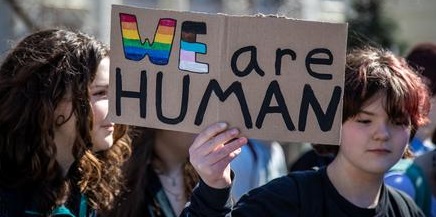
The biggest takeaway from each of the students was a
message of optimism. Cameron (he/him), a high school
senior from an area of Florida with elected officials
who are hostile to LGBTQ young people, told us that
“it’s important to have hope because you often do win,”
Cameron grew up in a red area of Florida, and when his
local school board tried to enforce limitations on his
expression at school, he organized students to unseat
her in an upcoming election. “That victory comes when
you use the power that you have.”
“We want queer and trans youth to be able to see their
identities in books and newspapers and movies and
shows,” said Esme (she/her).
“Queerness is power, because queerness has the ability
to build communities,” said Javier (he/him) after
speaking at the rally. After our time meeting LGBTQ
young people in Florida, we are more hopeful than ever
in the power of LGBTQ young people to leverage their
community to build the accepting world that Floridians
and young people everywhere deserve.
[Source: Ryan Bernsten | Senior Managing Editor | The Trevor
Project | April 2023]
Queer Majority: Essays, Articles, Issues
John Pavlovitz: I'm Really Tired of
Hatred
Pete Buttigieg: Sharp Comebacks to Critics
Evangelicals Made a Bad
Bargain With Trump
CNN: Why Evangelicals
Should Care About Trump's Lies (And Other Sins)
In Gay We Trust: What Do I
Do With This Hate?
All LGBTQ People Should Stand in Solidarity with Black
Athletes
Commencement Address for All Queer College Graduates
Advocate Magazine: Women of the Year
Advocate: Ice Age for
Bigots
What It's Like
to Be an LGBTQ High Schooler in DeSantis's Florida
Don't say
gay
I’m directly affected by the authoritarian policies of
our ambitious and ruthless governor. Florida
Governor Ron DeSantis’s war against “woke-ism” (or
equality and visibility of the LGBTQ community and
people of color) finds its battlefield in public
schools. I should know, since it’s impacting me directly
as a high school student in Flager Beach, Florida.
In our libraries and classrooms, we are seeing the
erasure of queer and BIPOC voices that mirror the
actions taken by fascist and authoritarian regimes
throughout history. In Florida, and other parts of
the country, library shelves are being emptied. Teachers
are threatened with felony charges for carrying books
that Florida’s extremist right-wing government finds
“offensive.” Some staff members are fired for daring to
show the world what is happening in schools.

How Will Florida’s Don’t-Say-Gay Bill Play Out in
Classrooms?
Teachers Fear Chilling Effect of Florida's Don't-Say-Gay
Law
Memo Circulated To Florida Teachers Lays Out Clever
Sabotage Of Don't-Say-Gay Law
Florida Governor Signs Controversial Don't-Say-Gay Bill
Into Law
Enabling Hate: Fla. Gov. DeSantis Signs
Historic Don't-Say-Gay Bill
ABC News: What is the Don't-Say-Gay Law?
Now, the governor is claiming the ongoing book banning
is a hoax. As a Florida high school student, I can tell
you that it’s real, and it’s happening in schools across
our state. At just 17 years old, I’m too young to
vote. But, like many in my generation, I’ve been the
target of extremist actions by our Governor.
Beginning with DeSantis’s reign of terror over LGBTQ
students with the “don’t say gay" law, his weaponizing
of school boards to censor queer-centered literature
outraged students of all backgrounds. Then came the
“Stop WOKE Act,” aimed at preventing the fictional
instruction of critical race theory that, in effect,
censors discussions of slavery and the civil rights
movement. He’s even ridiculed the LGBTQ community in
campaign mailers.
Rather than solving some of the issues that directly
affect Floridians, like rising housing costs or
increasing gun violence, our governor has turned his
attention to bullying the most vulnerable communities.
It is painfully clear that DeSantis’s goal is not to
govern, but rather to create a moral panic among
conservative voters, while stripping marginalized people
of the little representation they fought so long to
receive.
As part of the LGBTQ community myself, it was terrifying
to see members of my own school board proposing banning
books, simply because they were written by authors who
speak to my very existence. But the thing about Gen Z is
that we are passionate about the injustices we witness
and vocal against its perpetrators. As such, my friends
and I formed a political advocacy group, “Recall FCSB” (Flager
County School Board), to channel the anger of our peers
into political influence.
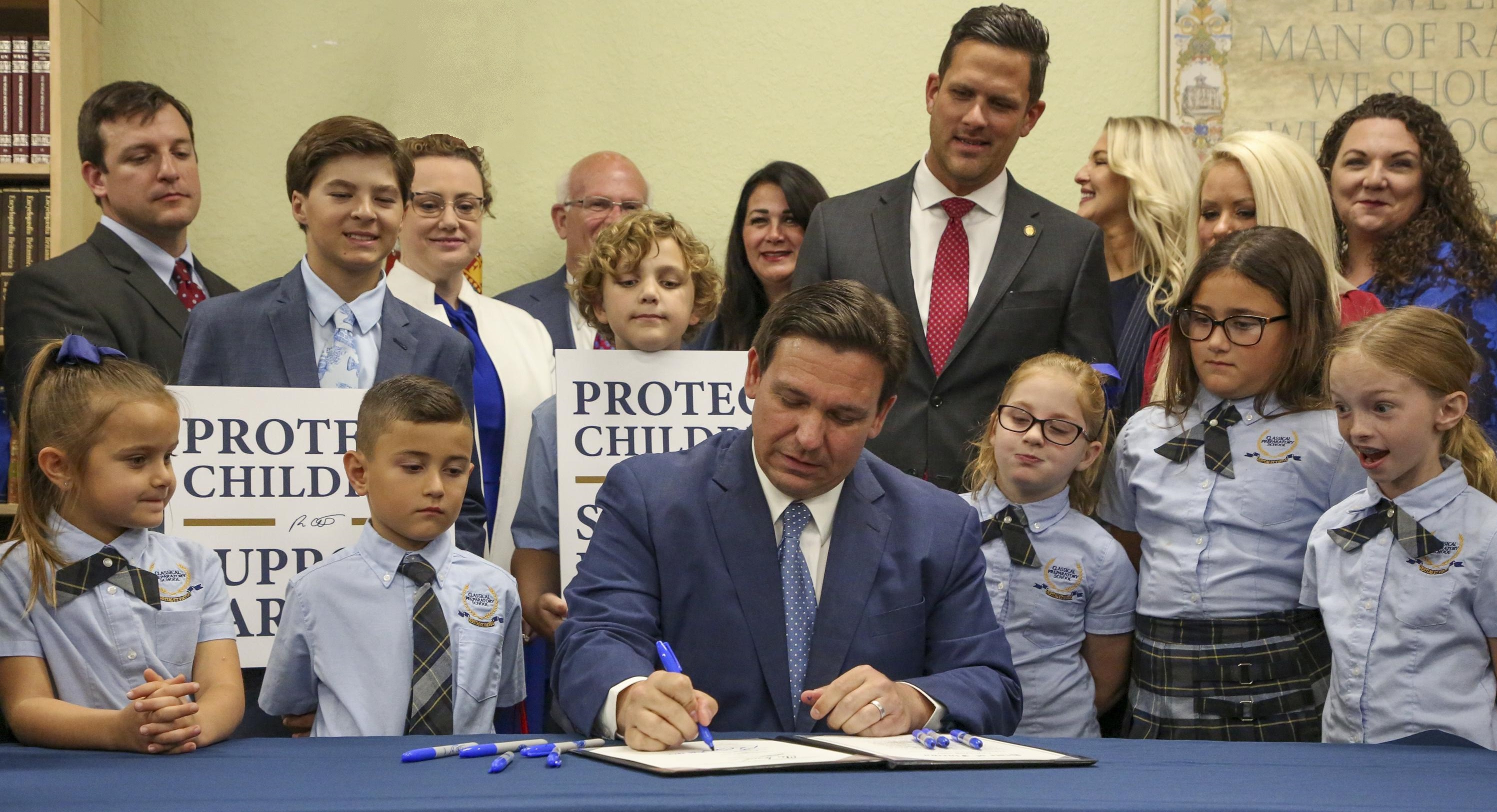
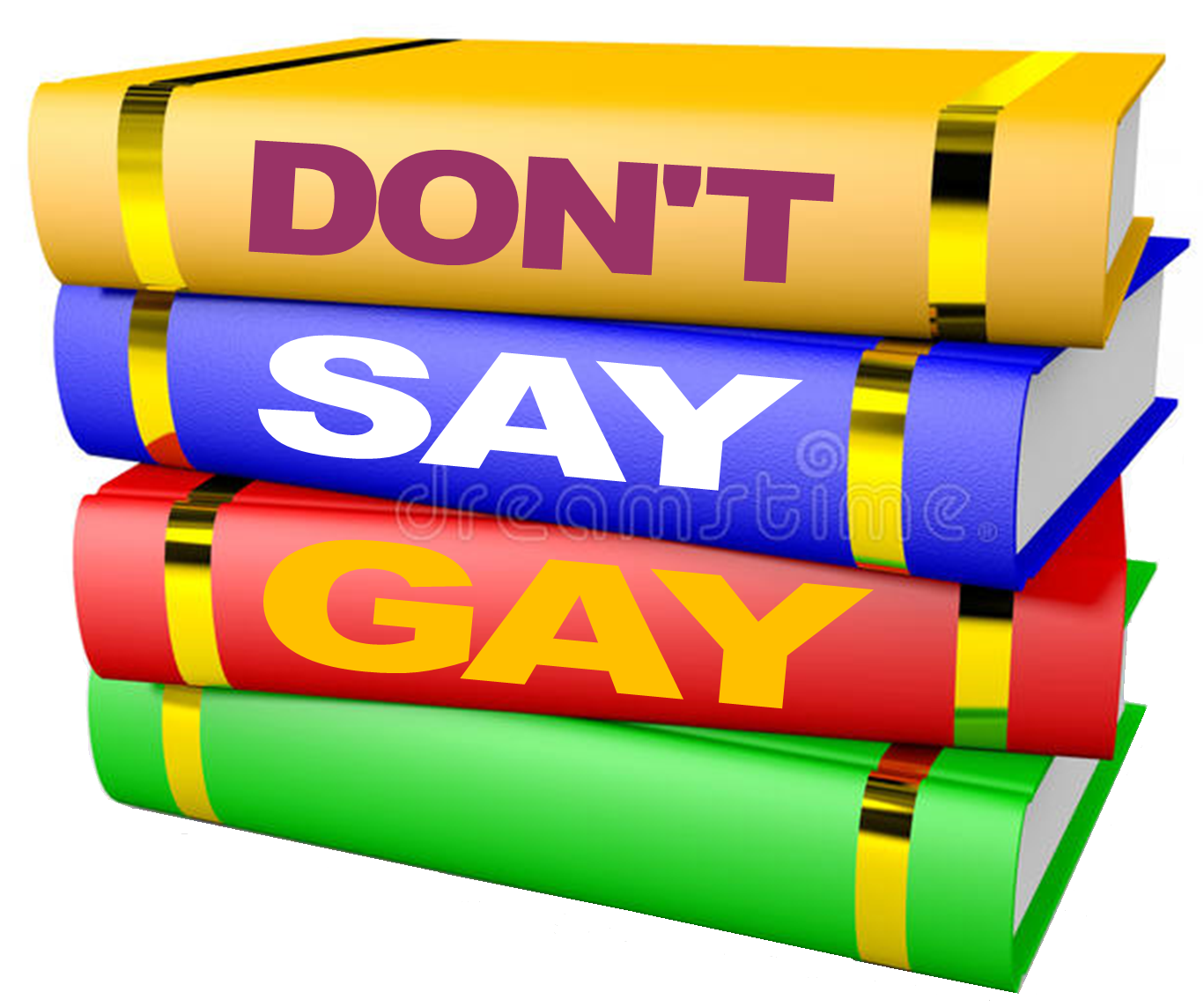
We protested school board meetings that became a
battleground on LGBTQ rights, attracting the attention
of a far-right registered hate group, The Three
Percenters — equipped with tactical armor and weapons.
They appeared, clad in black with their faces disguised
by masks; these men hurled slurs, threatened us as well
as our families, and even tried to follow us home. Even
in the face of aggressive, abusive instigators aiming to
intimidate us, our resolve only strengthened. This
is the reality that DeSantis created in Florida, and one
that he threatens to implement nationwide. As we
approach the 2024 presidential campaign season, it is
all but inevitable our governor will soon announce his
bid for the highest office.
Today, Florida students like me are feeling the impact
of his hateful agenda. But should he take up the highest
office in our nation, there’s no telling just how
outrageous things could get. School board meetings where
extremist groups threaten the safety of the students
standing up for themselves may be just the tip of the
iceberg.
Now, Republicans rally behind DeSantis as the leader who
will return their party to normalcy in its post-Trump
era. The only difference between Trump and DeSantis is
the latter’s improved politicking. In conversations with
his supporters, I have often heard DeSantis be
characterized as essentially “Trump with better
political skills and without the drama.” In other words,
he is a man with Trump’s extremist agenda, but equipped
with the ability to successfully act on it. That is
truly a terrifying combination.
We will never forget the images of violence and
destruction levied against our nation’s Capitol, all
instigated by Trump. I cannot even begin to fathom the
destruction a DeSantis presidency will bring to American
democracy, given his history of anti-democratic actions
to tighten his grip on power. Ron DeSantis
does not represent a tamer GOP that we should welcome or
embrace. He is a relentless tyrant who cares more about
his political ambitions than serving his constituents —
nothing is more MAGA than that.
[Source: Cameron Diggers | High School Student, Flagler Beach,
Florida | March 2023]
What It's Like to Be an LGBTQ High
Schooler in DeSantis's Florida
Queer Youth Negatively Affected by Anti-LGBTQ Laws and
Debates
Democrats Link Surging Violence Toward LGBTQ Community
with GOP Rhetoric
Advocates Warn Legislation Could Harm LGBTQ Youth Mental
Health
With Over 100 Anti-LGBTQ Bills Before
State Legislatures, Activists Say They're Fired Up
Daily Show: Biden Slams Florida
Anti-LGBTQ Legislation
Sad Day for Education: Miami Teachers React to Passing
of Don’t-Say-Gay Bill
How Will Florida’s Don’t-Say-Gay Bill Play Out in
Classrooms?
Teachers Fear Chilling Effect of Florida's Don't-Say-Gay
Law
Memo Circulated To Florida Teachers Lays Out Clever
Sabotage Of Don't-Say-Gay Law
Florida Governor Signs Controversial Don't-Say-Gay Bill
Into Law
Enabling Hate: Fla. Gov. DeSantis Signs
Historic Don't-Say-Gay Bill
ABC News: What is the Don't-Say-Gay Law?
This Holiday,
I’m Going to a Gay Bar
As
beautiful as it is tragic
They tell
us not to flaunt it. They tell us to not shove it in
their faces. They tell us not to talk about it. They
tell us everything would be fine if we’d just keep it
behind closed doors. They tell us these things during
Thanksgiving dinner, at Christmas after the kids have
opened their gifts, while the game is on and we wanted
to try to talk, to explain, to give them a chance to see
us, to love us. We don’t want to give up just yet.
When I heard the news about the shooting at Club Q, an
LGBTQ nightclub in Colorado Springs, I couldn’t help but
think of the rhetoric spewed by those like James Dobson.
We know what we’re up against. We heard it growing up,
in church and at home. We heard the words they use in
polite company — about loving the sinner and hating the
sin. We heard the words they used when they’d been
listening to Christian radio or their actual minister or
Rush Limbaugh or Fox News, about abominations and
predators in bathrooms and groomers on the internet, and
the words they use when they’ve had one too many, the
names they call those who could be our friends, who
could be us.

With Anti-LGBTQ Hate From The Right On The Rise,
Violence Was Sure To Follow
After the Colorado Springs Attack, LGBTQ
People are Furious at the Rhetoric Targeting Them
When Republicans Lament the Hate Crimes They Help Create
Two Millennia of
Discrimination Against LGBTQ Community
is Enough
5 Killed in Mass Shooting At Colorado
LGBTQ Nightclub Club Q
Colorado Club Shooting: Suspect Named
After 5 dead, Dozens Injured at LGBTQ
Nightclub
Those words we heard and were taught and were forced to
read, a whole lot of those words came out of Colorado
Springs, the headquarters of Focus on the Family, an
evangelical organization whose founder, Mr. Dobson,
wrote books exhorting our evangelical parents on how to
deal with strong-willed children — corporal punishment,
“a little pain goes a long way” — and on how to raise
boys to be suitably masculine, who compared
homosexuality to pedophilia and who once appeared to
offer a solution to fathers whose young daughters had to
share a restroom with trans women: “If this had happened
100 years ago, someone might have been shot. Where is
today’s manhood? God help us!”
Some of us grew up and escaped to cities where we could
feel, if not safe exactly, at least a little less alone.
We could find jobs where we didn’t have to hide who we
were and tell lies about our “roommate.” We could find
friends like us, a new family, to replace one we lost.
Some of us stayed home or moved home when things didn’t
work out in the city. But that story’s heartwarming only
when the main character is a straight executive in a
Hallmark movie.
Some of us go home for the holidays, where we are told
to keep it behind closed doors. We step outside to walk
the dog so they don’t see our tears. We call our friends
back in the city. Our brother steps out onto the porch
to tell us, when we ask why our family can’t just love
us, “It’s all about the baby Jesus,” because he’s the
only one who knows how much it hurts. And he’s the only
one who can still make us laugh about it.
Later on, when the kids are sleeping, when Mom wants to
watch “It’s a Wonderful Life,” some of us head to the
bar. We don’t need to know anyone there. We don’t need
anyone to tag along. We don’t need to know if it’s a
dance night or a drag show. We’ll be all right.

Colorado Springs Nightclub Shooting:
'Our Community is Shattered'
Suspect in Colorado Springs LGBTQ Club
Shooting Charged with 5 Counts of
First-Degree Murder
At Least 5 Killed in Shooting at LGBTQ
Club in Colorado
Club Q Patrons Pistol Whipped and Pinned
Gunman in Colorado Shooting
Gunman Kills 5 at Gay Nightclub, Subdued
by Patrons
At Least 5 Killed After Gunman Opens
Fire at LGBTQ Nightclub in Colorado
Springs
Just as soon as we walk through those doors, past the
bouncer checking IDs, up to the bar, where the
impossibly cute bartender nods to let us know he’s seen
us. He did see us. Someone finally did. It’s been a
while. This is where we’re safe. For many of us, it’s
the only place. They told us it would be OK, behind
those closed doors. They’d leave us alone.
Often there’s a drag show, a fund-raiser for a homeless
shelter for the queer kids whose parents listened to
their evangelical leader and threw their children out
onto the streets. We’ve heard the panic about drag
queens, and it’d be hard to not laugh if we didn’t know
the intent behind the manufactured panic. Drag queens
talk about sex the way politicians talk about thoughts
and prayers and Christians talk about love. Everyone
knows they’re full of it. Drag queens are in on the
joke.
If you’ve ever been to a gay bar on a holiday or ever
worked at a gay bar during a holiday, and I have, you
get to watch the transformation of every person who
walks through those doors: the unwinding of jaw muscles
and shoulders, hips that start to roll about halfway
across the room, the tone of voice that changes between
the front door and the bar. You watch people become
themselves as they throw back that first shot, the
medicinal shot, then find immediate friends down the bar
or out on the patio. It’s as beautiful as it is tragic.
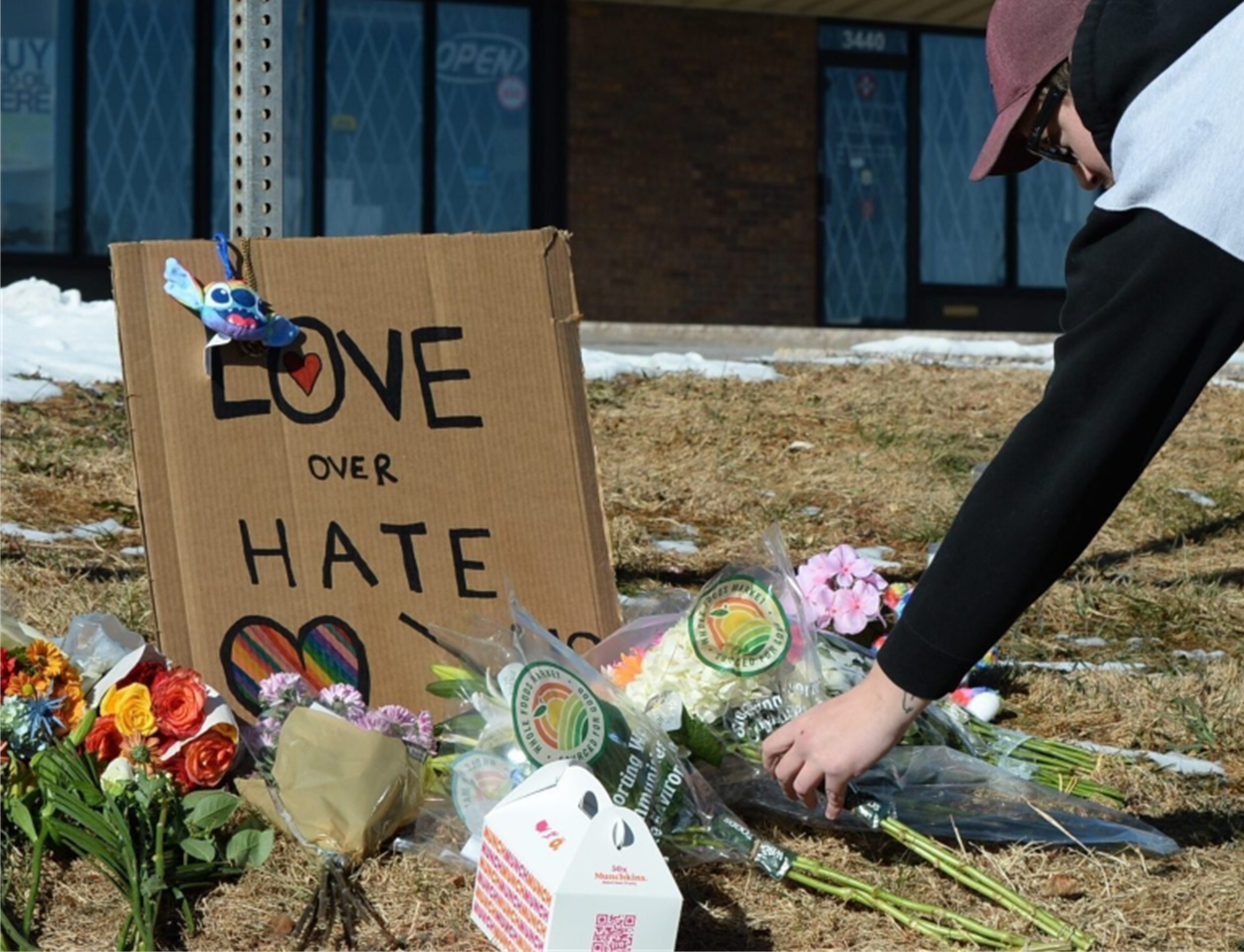
It’s tragic because they were never going to leave us
alone. No matter how quiet we kept it, no matter how
much we hid it in front of them. The police came into
our houses and dragged us out in handcuffs, printed the
mug shots in the paper so our bosses and families and
neighbors would know what they had told us to keep
secret. The military harassed us and threatened us and
threw us out, even though it said it wouldn’t ask if we
didn’t tell.
They don’t want us to feel safe. They don’t want us to
be safe.
Joshua Thurman, in a tearful interview shortly after he
survived the shooting last weekend, asked, “Where are we
supposed to go?”
The Stonewall riots began because they were lying then,
too, when they told us to keep it behind closed doors.
So we came out into the streets. We fought back. We
fought back Saturday night, too. It was club patrons who
stopped the gunman, who threw him to the ground and
subdued him until the police arrived, and when they
arrived, they placed handcuffs on one of those patrons,
who said later that the police locked him in a police
car, briefly preventing him from tending to his family
members.
The police, as an institution, were not built to protect
queer people, not when politicians fearmonger about drag
queens and bathrooms to rally an evangelical base.
We protect ourselves. We’ll fight for our own. We always
have. We’ll mourn. We’ll raise money. We’ll organize.
And we’ll keep fighting, until all of us are safe,
everywhere.
But tonight, I’m going to a gay bar. Maybe there’ll be a
drag show.
[Source: Lauren Hough | Guest Essayist | New York Times | Nov
2022]
With Anti-LGBTQ Hate From The Right On The Rise,
Violence Was Sure To Follow
After the Colorado Springs Attack, LGBTQ
People are Furious at the Rhetoric Targeting Them
When Republicans Lament the Hate Crimes They Help Create
Two Millennia of
Discrimination Against LGBTQ Community
is Enough
5 Killed in Mass Shooting At Colorado
LGBTQ Nightclub Club Q
Colorado Club Shooting: Suspect Named
After 5 dead, Dozens Injured at LGBTQ
Nightclub
Colorado Springs Nightclub Shooting:
'Our Community is Shattered'
Suspect in Colorado Springs LGBTQ Club
Shooting Charged with 5 Counts of
First-Degree Murder
At Least 5 Killed in Shooting at LGBTQ
Club in Colorado
Club Q Patrons Pistol Whipped and Pinned
Gunman in Colorado Shooting
Gunman Kills 5 at Gay Nightclub, Subdued
by Patrons
At Least 5 Killed After Gunman Opens
Fire at LGBTQ Nightclub in Colorado
Springs
When Republicans
Lament the Hate Crimes They Help Create
Irresponsible rhetoric and its consequences
The mass shooting at a Colorado Springs nightclub on the
eve of Transgender Day of Remembrance that killed five
people and left dozens clinging to life or permanently
disfigured and traumatized, is not a surprise.
Worse, it is entirely predictable. It is the rotten,
putrid fruit of MAGA America and all it stands for and
aspires to. And yet its rank-and-file seems
accidentally or intentionally oblivious.
In the wake of the murders at Club Q, as usual
Republican politicians have lined up to once feign
disbelief and pretend to care and to dole out phony
expressions of abject shock and solidarity. But
the truth is, this is what they have made with great
intention and care over time.
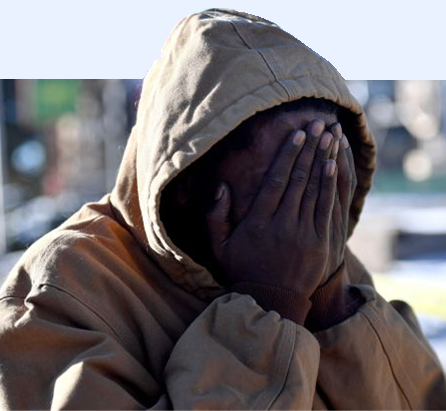
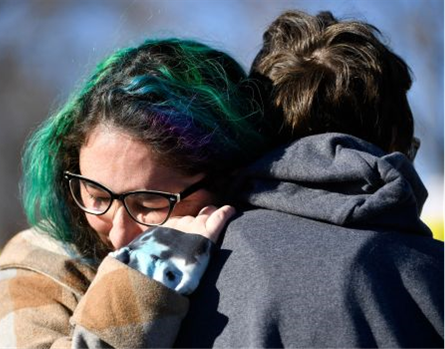
With Anti-LGBTQ Hate From The Right On The Rise,
Violence Was Sure To Follow
After the Colorado Springs Attack, LGBTQ
People are Furious at the Rhetoric Targeting Them
When Republicans Lament the Hate Crimes They Help Create
Two Millennia of
Discrimination Against LGBTQ Community
is Enough
Killed in Mass Shooting At Colorado
LGBTQ Nightclub Club Q
Colorado Club Shooting: Suspect Named
After 5 dead, Dozens Injured at LGBTQ
Nightclub
A murder
targeting the LGBTQ community is not a random aberration
they are trying to make sense of, it is more like a GOP
campaign promise fulfilled.
When you continually label queer people as predators,
when you repeatedly accuse teachers of being groomers,
when you declare drag shows and gay clubs as societal
threats,
when you intentionally target transgender children and
their parents,
when you perpetually traffic in irresponsible and
dangerous rhetoric designed to generate irrational fear
of LGBTQ people—hate crimes like the one in Colorado are
the logical progression.
The hollow culture wars that Christian Conservatives
have spent the past few decades going all-in on have
actually human costs. They are not ideological
expressions untethered from life on the ground. They are
not just tweets and slogans and disconnected pulpit
diatribes devoid of consequences. They are not merely
reckless words and irresponsible assassinations of
character against people for their gender identity and
sexual orientation.
They may begin as those things, but eventually they
become young men carrying high-powered weapons of rapid
carnage into places of refuge and joy, who
indiscriminately fire into crowds of strangers because
they have so dehumanized them as to see them as
expendable and necessary collateral damage of a
righteous holy war.


Colorado Springs Nightclub Shooting:
'Our Community is Shattered'
Suspect in Colorado Springs LGBTQ Club
Shooting Charged with 5 Counts of
First-Degree Murder
At Least 5 Killed in Shooting at LGBTQ
Club in Colorado
Club Q Patrons Pistol Whipped and Pinned
Gunman in Colorado Shooting
Gunman Kills 5 at Gay Nightclub, Subdued
by Patrons
At Least 5 Killed After Gunman Opens
Fire at LGBTQ Nightclub in Colorado
Springs
The tweets and slogans and diatribes eventually become
showers of bullets quickly tearing through the flesh of
fathers and best friends and loving spouses and favorite
aunts and college students and medical professionals.
They become gaping wounds too severe and numerous to
withstand. They become human beings terminated on dance
floors, simply for who they are and who they love.
And these living, breathing, wholly unprecedented, fully
original, never to be repeated human beings become
victims of two vicious hate crimes: of the person
pulling the trigger and of those who made doing so, so
easy for them.
There is no mystery here to be solved, no complex code
to uncover, no hidden shooter motive we need to follow
down endless rabbit trails to discern. This is simple
cause-and-affect. It is the grotesque monster
Republicans have made, because they have lacked creative
ideas or noble impulses or any desire to lead
responsible for the common good. By continually chasing
the sensational, by relentlessly ratcheting up their
rhetoric, by dragging their base to an ever-deepening
bottom, and by using LGBTQ people as faceless, nameless
political chips—they are nurturing the kind of wasteful
violence Colorado Springs is grieving.
Politicians like Lauren Boebert and Ted Cruz, their
party and their voting base will continue to pretend
they are oblivious to or even outraged by the kind of
violence visited on Club Q.
But until the Right reckons with the flesh-and-blood
cost of their continual verbal assault on a group of
already marginalized people, and until they repent and
begin to fight for the rights and humanity of the LGBTQ
community, these physical assaults will continue—and
they will have that blood on their hands.
[Source: John Pavlovitz | November 2022]
With Anti-LGBTQ Hate From The Right On The Rise,
Violence Was Sure To Follow
After the Colorado Springs Attack, LGBTQ
People are Furious at the Rhetoric Targeting Them
When Republicans Lament the Hate Crimes They Help Create
Two Millennia of
Discrimination Against LGBTQ Community
is Enough
Killed in Mass Shooting At Colorado
LGBTQ Nightclub Club Q
Colorado Club Shooting: Suspect Named
After 5 dead, Dozens Injured at LGBTQ
Nightclub
Colorado Springs Nightclub Shooting:
'Our Community is Shattered'
Suspect in Colorado Springs LGBTQ Club
Shooting Charged with 5 Counts of
First-Degree Murder
At Least 5 Killed in Shooting at LGBTQ
Club in Colorado
Club Q Patrons Pistol Whipped and Pinned
Gunman in Colorado Shooting
Gunman Kills 5 at Gay Nightclub, Subdued
by Patrons
At Least 5 Killed After Gunman Opens
Fire at LGBTQ Nightclub in Colorado
Springs
How Leslie
Jordan Made Being a Sissy OK for Gay Men Like Me
In a
fabulous, flamboyant, feather boa kinda way
Leslie Jordan was effeminate and flamboyant — an
unapologetic sissy, in the best way. His shocking death
in Oct. 2022 at the age of 67 left myself — a fellow
sissy — and many others in the LGBTQ community
heartbroken and stunned. This one hurt — really,
really hurt.
In March 2020, Jordan became the internet's sassy
sweetheart, going viral for his sofa cushion
confessionals amid the early days of an unknown
pandemic. In the short videos, he nagged his family
off-camera, twirled a baton for his “daddy,” or shared
hilarious reminiscings from his storied career.

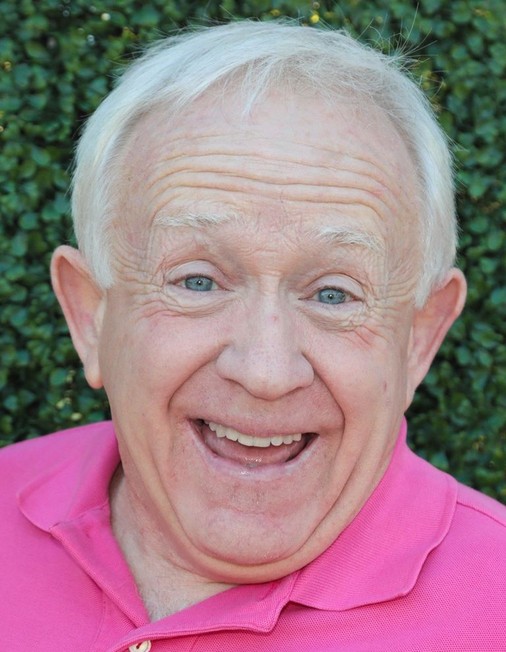
NBC Today: How Leslie Jordan Made Being a
Sissy OK for Gay Men Like Me
Advocate: Leslie Jordan,
Iconic Gay Comedian, Dead at 67
LA Times: Comedian and Actor Leslie
Jordan: Queer Icon Dies After Car Crash
USA Today: Leslie Jordan, Beloved Will &
Grace Actor and Social Media Sensation,
Dies at 67
Queerty: Leslie Jordan, Beloved Actor
and Gay Icon, Dies at 67
Variety: Leslie Jordan, Will & Grace and
American Horror Story Star, Dies in Car
Accident
CNN: Leslie Jordan, Beloved Actor and
Social Media Star, Dead at 67
NPR: Actor and Comedian Leslie Jordan
Dead at 67
I had the opportunity to be one of the first reporters
to interview him on his secret to going viral and there
wasn’t much to it: Just be yourself. This was something
Jordan himself struggled to figure out for most of his
career in Hollywood, discovering later in life that what
makes people love you most is when they see someone who
loves themself first. Simple, yes, but still a surprise.
Jordan, who became sober in the late '90s, told me that
his journey into sobriety was a cornerstone of his own
acceptance of his sexuality. Alcohol and drugs had
become a buffer to help him cope with his insecurities,
causing him to get three DUIs over a short time
“All my life I’ve always been so ashamed of being
feminine,” he told me in 2020. “You know, you learned
that very young in American culture that the feminine
boys don’t do well. And yet, I had a dad who was a
lieutenant colonel in the army. My dad was a man’s man,
but he still adored me. And somehow in the midst of
that, I still grew up hating the sissy in me.”
But after becoming sober at 42, he started finally
loving himself. His lisp got louder. His walk got even
hippy-er. These latest chapters may have been his
loudest. He showed us all that you could be
unapologetically gay and southern at the same time. That
one doesn’t automatically cancel the other out and
actually, southern decadence compliments homosexual
fabulousness rather well.


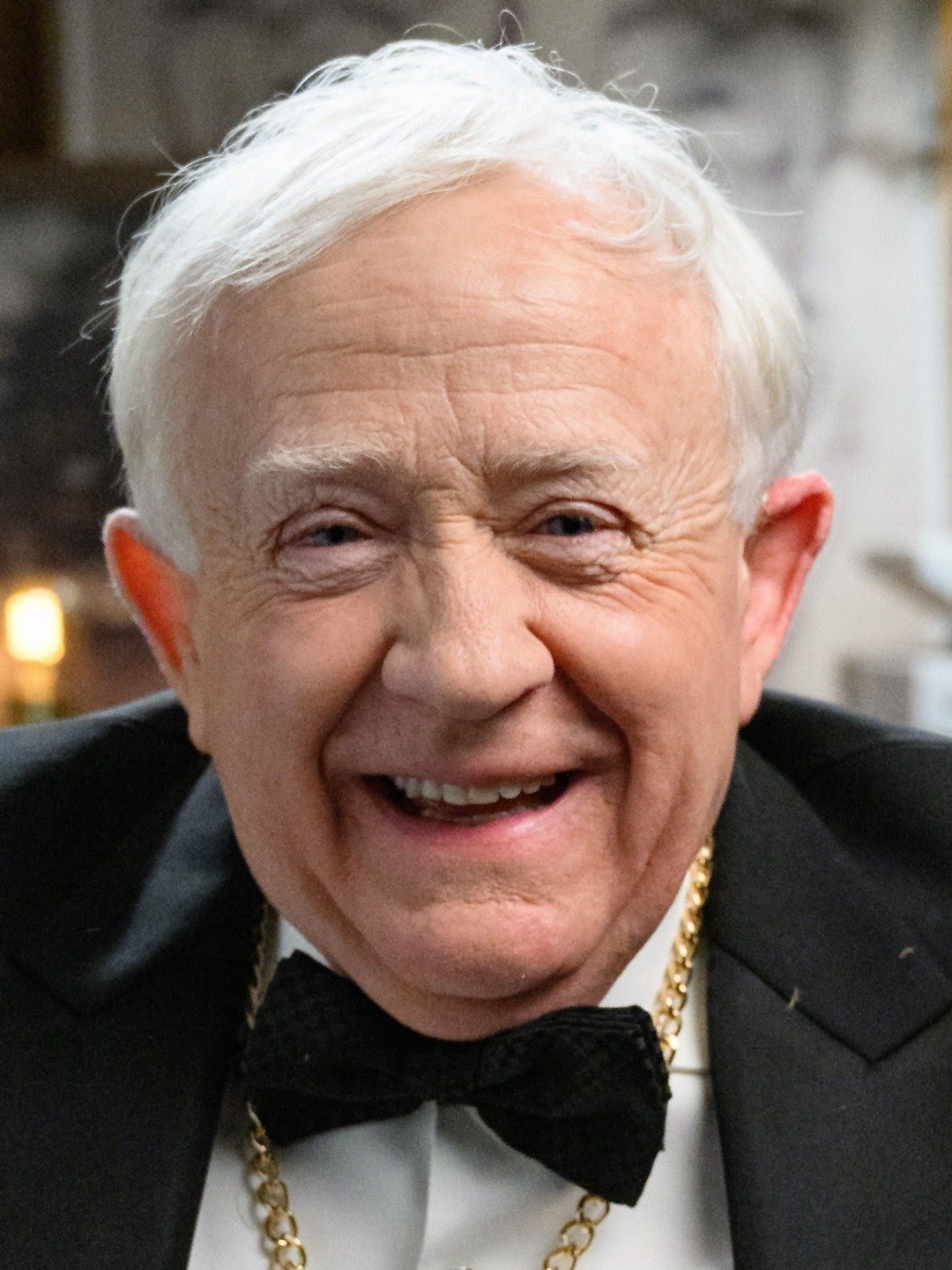
NBC Today: How Leslie Jordan Made Being a
Sissy OK for Gay Men Like Me
Advocate: Leslie Jordan,
Iconic Gay Comedian, Dead at 67
LA Times: Comedian and Actor Leslie
Jordan: Queer Icon Dies After Car Crash
USA Today: Leslie Jordan, Beloved Will &
Grace Actor and Social Media Sensation,
Dies at 67
Queerty: Leslie Jordan, Beloved Actor
and Gay Icon, Dies at 67
Variety: Leslie Jordan, Will & Grace and
American Horror Story Star, Dies in Car
Accident
CNN: Leslie Jordan, Beloved Actor and
Social Media Star, Dead at 67
NPR: Actor and Comedian Leslie Jordan
Dead at 67
“Many gay rites-of-passage stories are echoed here:
hostile small-town environment (Chattanooga, Tenn);
rigidly masculine father; humor as armor against
bullies; unrequited loves; drug and alcohol dependency;
internal homophobia; weakness for rough trade,” theater
critic David Rooney wrote for the New York Times back in
2010. “But Mr. Jordan’s candor gives them a fresh spin.”
His fresh sageness on stage and off made him the gay
elder many of us didn't have at a time when queer
representation was just taking off in pop culture. This
could be because so many of Jordan's generation was lost
to AIDS. We may have had more grandfather figures like
him to inspire us, and provide a blueprint on how to age
when you love to twirl. But everyone — sissy,
not-a-sissy, gay, straight, old, young, white or Black —
can learn something from him. That stepping into
whatever makes you unique no matter what it is isn’t
weakness, it’s your power.
Maybe because he already had lived through one, Jordan
helped us all find the silver lining in those early,
dark days of the pandemic when there was nowhere to find
one. Now it’s our turn to pay back the favor and find
the silver lining in his tragic passing.
He did it his way. Yes, a very gay way. OK, a very,
very, very, very fabulous, flamboyant and feather-boa
kind of way, but it was always honest and it was always
true.
So thank you, Leslie, for teaching me and so many others
the power of individuality. You were there for your
fellow hunker-downers when we needed you most. You made
us feel seen and because of this, we will never forget
you.
[Source: Alexander Kacala | Reporter and Editor | NBC Today |
October 2022]
Lea DeLaria and Zakiya Thomas: Life After Roe vs. Wade
Supreme Court Decision on Roe Sets Off
Alarm Bells in the LGBTQ Community
How will Roe v. Wade Reversal Affect LGBTQ Rights?
LGBTQ Groups Voice Outrage Over Dobbs Ruling Overturning
Roe
Roe v Wade is Dead: Ending Marriage Equality is Next
Biden on SCOTUS Decision: This is Not Over
After Roe v. Wade Reversal: Pride Parades May Resemble
Protest Marches of Decades Past
Pelosi on SCOTUS, GOP Overturning Roe and What’s Next
Life After Roe
vs. Wade
Victories
can be fleeting
In March of 1972, the Equal Rights Amendment (ERA) — a
proposed amendment to the US Constitution aimed at
preventing discrimination on the basis of sex — passed
the US Senate after already clearing the House months
earlier. It had even earned the backing of
then-President Richard Nixon along the way. All that
remained was for a minimum of 38 states to ratify the
legislation for it to become a constitutional amendment.
To date, the ERA has not been published into the
Constitution, despite the ability of Congress to act.

Beyond a
powerful cabal of faceless operatives pulling the
strings in Washington to block the ERA, it was a
nationwide network of anti-feminist activists that
successfully condemned the amendment to legislative
purgatory to this day. They acted with both urgency and
patience to block progress with a public pressure
campaign and the cultivation of a quiet coalition behind
the scenes. It’s the exact approach that tends to work
in a democracy.
As the new Broadway play POTUS Or Behind Every Great
Dumbass Are Seven Women Trying to Keep Him Alive
closes its audience-celebrated run this month, a
production we were both a part of, we reflect on the
striking parallels between a story built around the
women working behind the scenes to keep our country from
descending into pure patriarchal anarchy, and the
harrowing everyday experience of women at work. For the
actors and everyone involved in the show audiences, it’s
been an emotional journey as we’ve watched Roe v. Wade
fall during the show’s run and felt hyper-aware of
POTUS's evolving impact on audiences as the world
beyond the stage-doors continues to shift. There were
nights when the curtain fell, and the cast simply stood
together on stage and wept together.
Even though this show is written and performed to make
people laugh, everyone associated with it understands
that audiences step out of the venue to face
unconscionable realities. Gender pay-gaps, pregnancy
discrimination, and reproductive tyranny and the
constant threat of violence. Far from laughing matters.
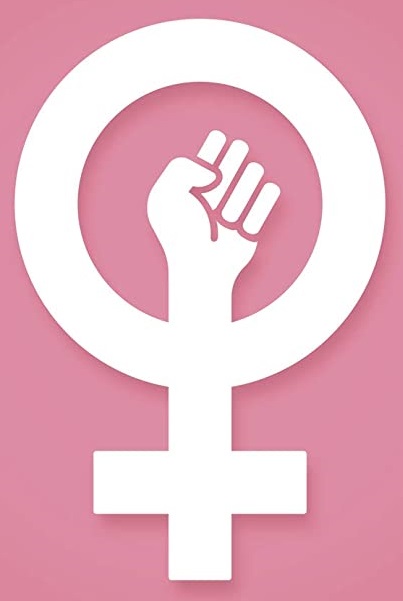
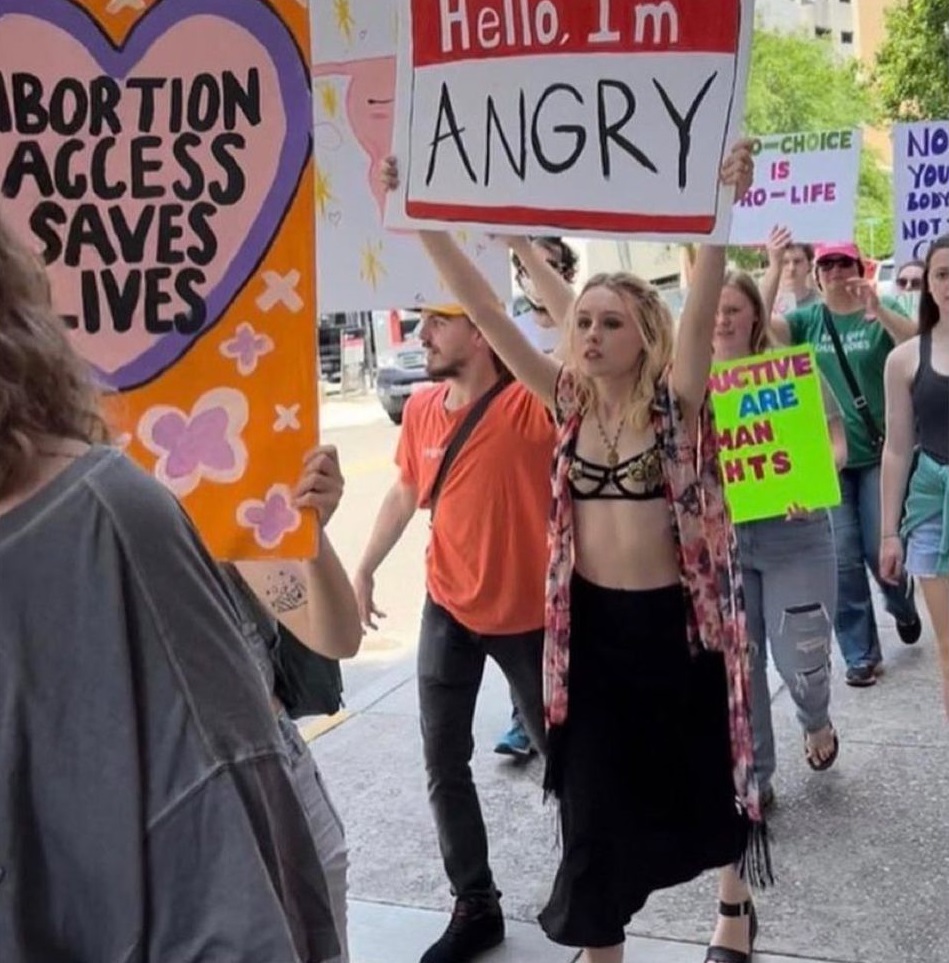
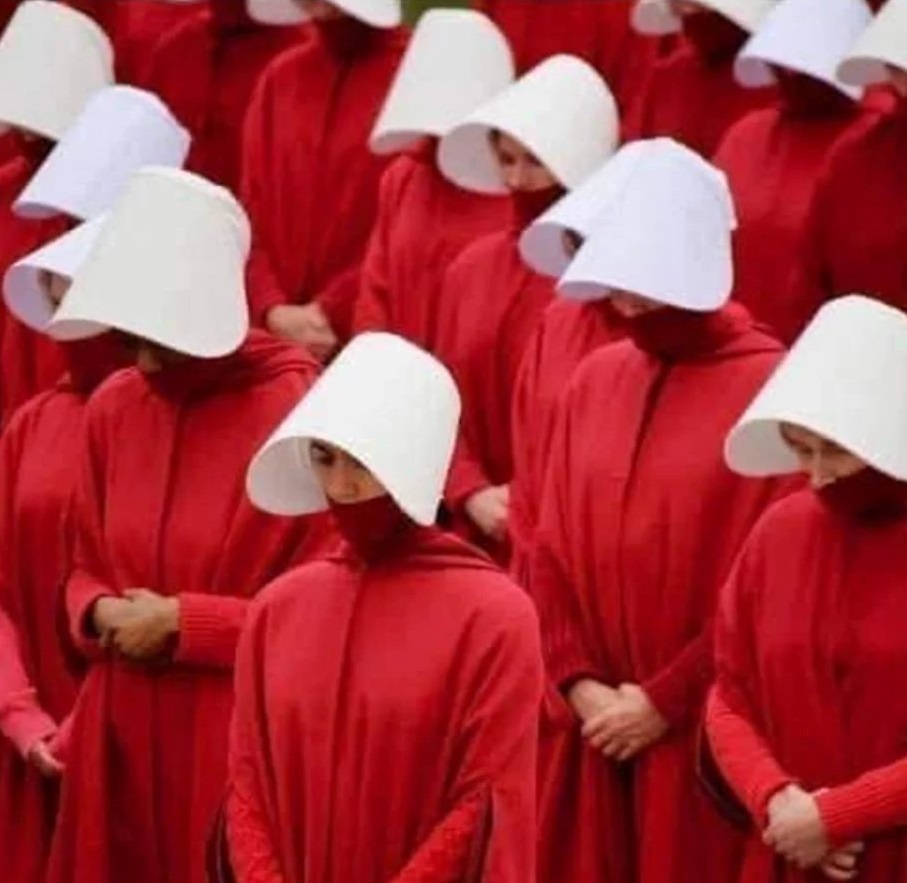
Kamala Harris Blasts SCOTUS, Says Marriage Equality Is
on the Line
Jim Obergefell Slams Supreme Court’s Threat to Overturn
Same-Sex Marriage
Olivia Rodrigo and Lily Allen: Fuck You to SCOTUS
Provincetown Reacts to SCOTUS’s Disgraceful Overturning
of Roe v. Wade
How will Roe v. Wade Reversal Affect LGBTQ Rights?
Thomas Wants Supreme Court to Overturn Rulings that
Legalized Contraception and Same-Sex Marriage
Clarence Thomas Ready to Strike Down Marriage Equality
Following Dobbs
Liberal Redneck: Not So Supreme Court
POTUS’s ability to weave together the hilariously
absurd with the terrifyingly real and poignant
experiences of women across sexuality, race, and
identity has made it a frighteningly timely piece and a
reminder of how activism can be energized by the arts.
For those of us who are active in feminist politics and
the fight for gender, LGBTQ, and identity-based
equality, there is a profound sense of demoralization
and heartbreak reverberating through the movement right
now. Meanwhile, opponents of reproductive freedom don’t
seem to be pausing to celebrate. They seem to be
redoubling their efforts to build momentum and codify
this victory in as many states as possible. The recent
ballot victory for abortions rights in conservative
Kansas is a potentially heartening sign though, for what
progressives, independents, libertarians and moderate
Republicans can accomplish if we work together.
The challenge we face now is also an opportunity if we
harness the acute frustration and passion we feel today
into tactical strategy played out over a long game. We
need to retake state legislatures with local politicians
who actually reflect the will of the people. We need to
back legal cases in key states to chip away at the
legitimacy of this abhorrent, new legal precedent. The
solutions we need won’t come quickly. The continued
fight to ratify the ERA is proof enough that victories
can be fleeting — but will almost always fall to those
acting with both urgency and patience. Passion and
meticulous planning.
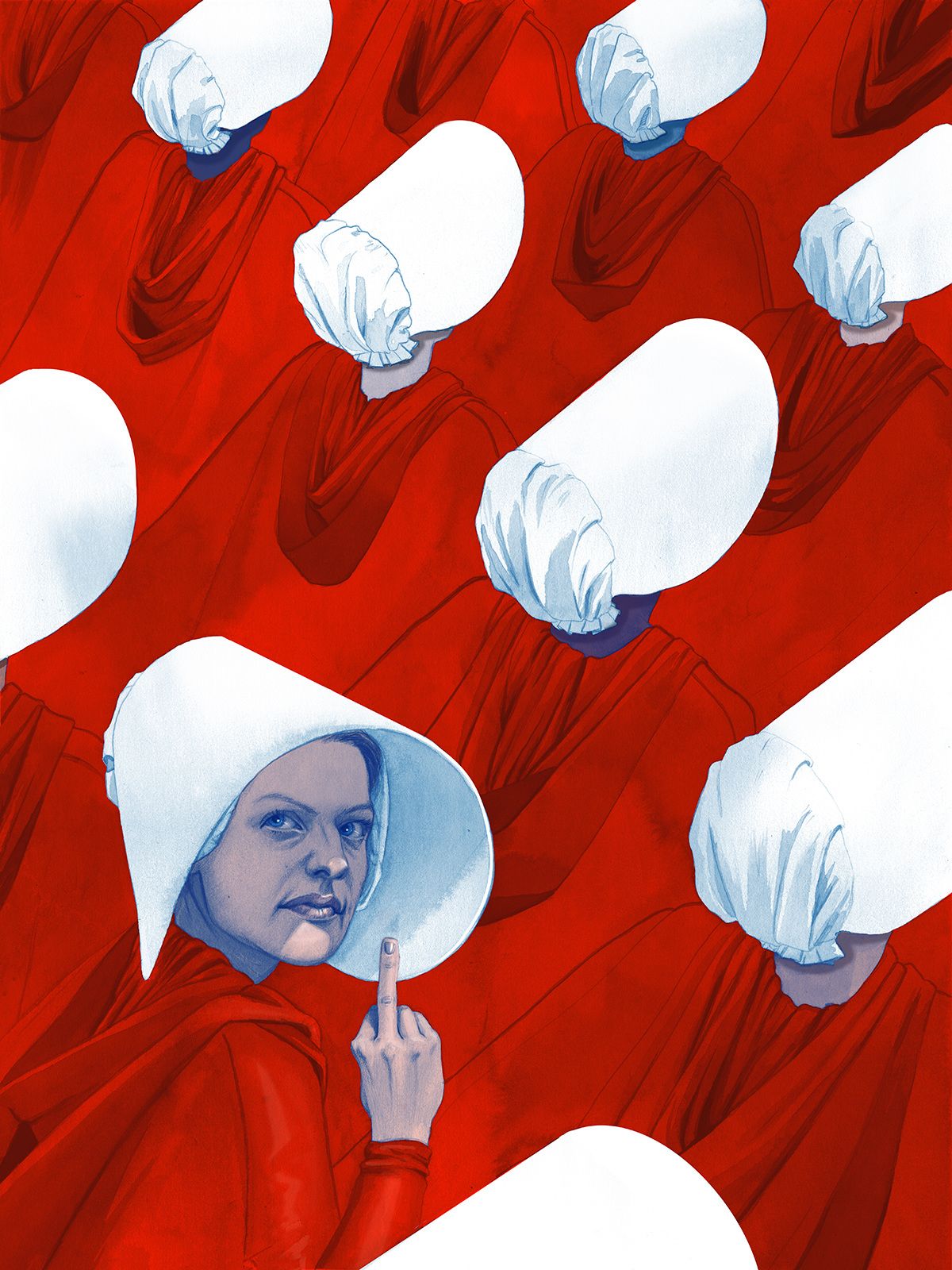


It’s painstaking, thankless work with no assurance we’ll
land exactly where we desire. But that’s exactly the
type of winding journey that has led activists to
successful outcomes time and again. Roe v. Wade wasn’t a
lightning strike. Nor was the civil rights movement, the
end of Jim Crow, the Supreme Court’s ruling on marriage
equality, or our eventual success in ratifying the ERA.
These were the results of meticulous, decades-long
efforts to change minds through culture, media, and
grassroots organizing, to mobilize voters in local
elections and focus on court appointments at every level
of government. By the time these movements reached
legislatures or the courts, the people’s perspectives
had shifted and the groundwork for change had been laid.
As unfair as it feels in this moment, that very same
work must begin anew. There is no time to pause and lick
our wounds, and all the reason in the world to get right
back to work fighting for legislation, legal challenges
and candidates who support gender equality. Whether our
place in the movement is on stage — helping audiences
explore difficult truths through dynamic storytelling,
or on the frontlines of the political fight to reclaim
and defend our rights at all costs — the curtain is
rising on a new production. And we all have roles to
play.
[Source: Lea DeLaria, Comedian, Actor (Orange is the New Black),
Jazz Singer | Zakiya Thomas, CEO of ERA Coalition/Fund
for Women’s Equality and
Professor at Georgetown Law School | August 2022]
Kamala Harris Blasts SCOTUS, Says Marriage Equality Is
on the Line
Jim Obergefell Slams Supreme Court’s Threat to Overturn
Same-Sex Marriage
Olivia Rodrigo and Lily Allen: Fuck You to SCOTUS
Provincetown Reacts to SCOTUS’s Disgraceful Overturning
of Roe v. Wade
How will Roe v. Wade Reversal Affect LGBTQ Rights?
Thomas Wants Supreme Court to Overturn Rulings that
Legalized Contraception and Same-Sex Marriage
Clarence Thomas Ready to Strike Down Marriage Equality
Following Dobbs
Liberal Redneck: Not So Supreme Court
Your Words Can
Cost the Lives of Trans Kids
A matter of life and death
Anti-transgender rhetoric leads to stigma, and stigma
leads to violence against our families, friends,
co-workers, and neighbors.
Parents always want what is best for our children, and
we can all agree that they deserve to be treated with
dignity and respect. But as the parents of an amazing
kid who happens to be transgender, we've seen firsthand
how in recent years many of our leaders (who think they
know better than parents, medical organizations, and
millions of doctors) have been treating our son, Daniel,
with anything but that dignity and respect.
They are making it impossible for kids like Daniel to be
their authentic selves. And we've seen how harmful the
attacks on my kid from power-hungry politicians and pop
culture icons going for cheap laughs can be.


Your Words Can Cost the Lives of Trans Kids
Survey: 5 Percent of Young Adults Identify as Trans or
Nonbinary
Trans Educator: Most Commonly Asked Questions I Get
About Trans Youth
Lia Thomas: First Transgender Woman to Win NCAA
Championship
Iowa Is Now 11th State to Pass Anti-Trans Sports Law
South Dakota Becomes First State in 2022 to Pass
Anti-Trans Bill
When our family watches TV or opens up social media,
we're often looking for an escape, just like everyone
else — to laugh at a favorite sitcom or share memes with
friends. But recently, it's been impossible to escape
"jokes" that come at the expense of our son and the
entire transgender community from comedians like Bill
Maher, Ricky Gervais, and Dave Chappelle. Imagine
turning on the TV and seeing a powerful person (who has
so little on the line) make fun of your child.
It's no joking matter.
Anti-transgender rhetoric leads to stigma, and stigma
leads to violence against our families, friends,
co-workers, and neighbors. From Texas Gov. Greg Abbott
threatening to take children away from their loving
parents, to the 300-plus anti-trans bills that have been
introduced across the country this year alone, to the
epidemic of violence against Black and brown transgender
women, families like our own have felt the impacts of
bias and discrimination.
Our son came out as transgender when he was 8 years old.
The coming-out experience for him and our family was
ostracizing at times and difficult; we felt very alone.
Some immediately judged Daniel and my family, and we
even struggled to understand what being transgender
meant. Over time, as people got to know us, we found a
community that accepts and loves us. But now we've got
celebrities and extremist politicians amplifying harmful
propaganda that can change how people see us.
For the first four months of this year, we gave
testimony in the Arizona state Capitol, trying to put an
end to the onslaught of 17 anti-trans bills. Imagine our
family (our teenage son) in that moment feeling the
sting of hateful testimony attacking his very existence.

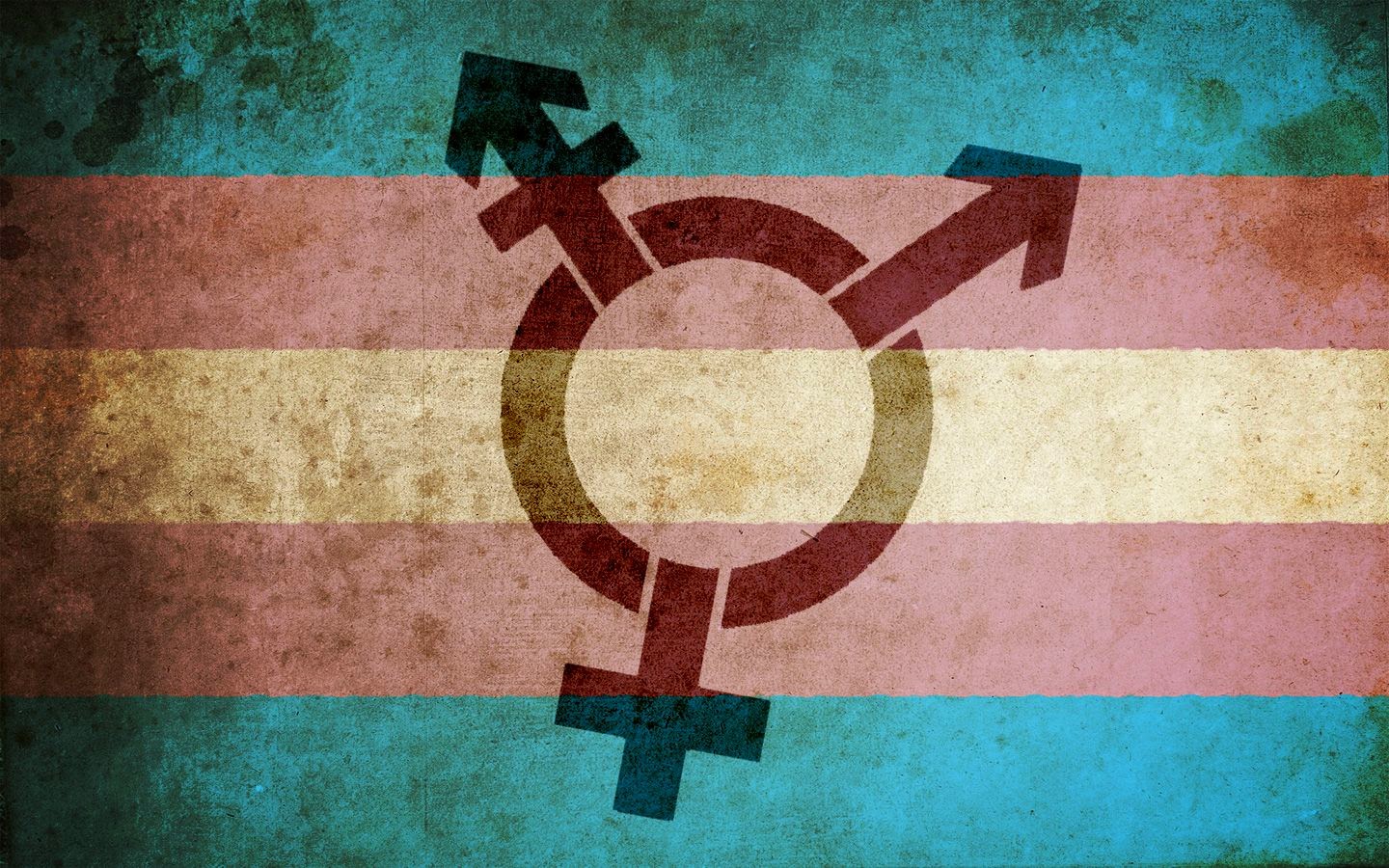
MJ Rodriguez Becomes 1st Transgender
Actor to Win a Golden Globe Award
Biden Administration Promises to Protect
Trans Kids
We Stand With You: Honoring Transgender
Day of Remembrance
Biden Marks Deadliest Year on Record for Transgender
Americans on Day of Remembrance
Trans Children Across US
Are Fighting For Their Lives (Again)
As a parent, I ask you, would you want this for your
child?
While our family and so many others keep fighting hate,
we wonder if people like Maher or Gervais really
understand the power of their platforms. It is because
of this power that far too many figures regurgitate
dangerous rhetoric that has been proven to negatively
impact the mental health of transgender youth.
According to The Trevor Project, "transgender and
nonbinary youth were 2 to 2.5 times as likely to
experience depressive symptoms, seriously consider
suicide, and attempt suicide compared to their cisgender
LGBQ peers." Among Black transgender and nonbinary
youth, 59% seriously considered suicide, and more than 1
in 4 attempted suicide in the past year.
Let's be clear: The reason we see disturbing statistics
like these is not transgender youth being who they are;
it's due to a fundamental lack of the support and
affirmation our children deserve. Transgender youth who
receive desired gender-affirming care are as much as 60%
less likely to experience depression and 73% less likely
to report suicidal thoughts than those without access to
gender-affirming care.
Transgender and non-binary people also face increased
violence just for living their lives. The Human Rights
Campaign's Transgender Justice Initiative has reported
at least 19 transgender people shot or killed by other
violent means this year. In 2021, the deadliest year on
record, at least 57 transgender people, mainly
transgender women of color, were killed.
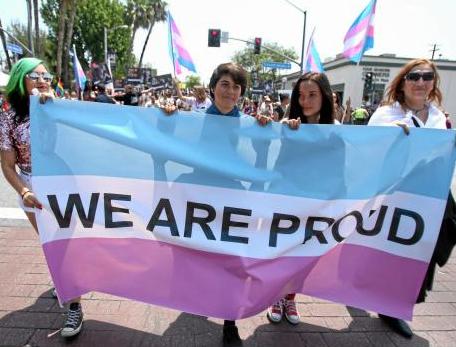
When anti-trans discrimination and violence go largely
unreported or ignored by everyone from the media to law
enforcement to popular entertainers, it means hardly
anyone in a position of influence or power is regularly
challenging biases that inevitably lead to more
violence.
All the more reason why people in power, including
influential entertainers, should be using their
platforms to spread awareness and support transgender
people. It's time to learn and speak the truth instead
of caving to insecurities and ignorance. It's a matter
of choosing to help protect fundamental civil rights.
And it can be a matter of life or death for many.
[Source: Lizette and Jose Trujillo | HRC Foundation Parents for
Transgender Equality National Council | July 2022]
Your Words Can Cost the Lives of Trans Kids
Survey: 5 Percent of Young Adults Identify as Trans or
Nonbinary
Trans Educator: Most Commonly Asked Questions I Get
About Trans Youth
Lia Thomas: First Transgender Woman to Win NCAA
Championship
Iowa Is Now 11th State to Pass Anti-Trans Sports Law
South Dakota Becomes First State in 2022 to Pass
Anti-Trans Bill
MJ Rodriguez Becomes 1st Transgender
Actor to Win a Golden Globe Award
Biden Administration Promises to Protect
Trans Kids
We Stand With You: Honoring Transgender
Day of Remembrance
Biden Marks Deadliest Year on Record for Transgender
Americans on Day of Remembrance
Trans Children Across US
Are Fighting For Their Lives (Again)
There's Never
Been a Better Time for the LGBTQ Rights Movement
We've
always found a way to prevail
If you asked us to think of a timeless sentence, an
evergreen sentiment that would be relevant no matter
what period of history it was said in, we might offer,
“It’s a really tough time to be in the LGBTQ civil
rights movement.”
It was a tough time in the ’70s, during Anita Bryant’s
antigay “Save Our Children” crusade. It was a
tough time in the ’80s, when President Reagan’s loudest
comment on the AIDS epidemic was silence. It was a tough
time in the ’90s, when media coverage of the murder of
Brandon Teena widely misgendered him and he was buried
with a headstone reading “sister, daughter, friend.”
It was tough in the 2000s, when we saw an avalanche of
constitutional and statutory bans on marriage equality.
It was tough even in the 2010s, despite what seemed like
a cascade of legal and legislative victories, including
the defeat of North Carolina’s anti-transgender
“bathroom bill” — as the murder epidemic of transgender
women, especially trans women of color, grew more and
more dire.

Janelle Monáe: The Queer Icon Has a
Warning For the Future
Essay: Night at Hamburger
Mary's
The Inauguration We Can’t
Enjoy
Rush Limbaugh: Speaking
Ill of the Dead
50 Years a Scapegoat:
LGBTQ Community Once Again in GOP Crosshairs
Lessons From
Stonewall for LGBTQ People Today
Tyler Oakley: How to Make 2020 Gayer
Larry Kramer's Loud and
Proud Activism Remains Necessary
And now, half a century out from “Save Our Children,”
here we are again. This year alone, there have been
hundreds of anti-LGBTQ bills introduced in state
legislatures, of which 117 are explicitly
anti-transgender.
It’s always been a tough time. And yet — we’ve always
found a way to prevail over attacks on our community.
And even more importantly, we’ve always found ways to
cultivate joy, to find community, and to keep our heads
held high no matter what the world threw at us. Time and
time again, through victories large and small, the
drumbeat of equality has stayed loud and steady. And
anyone in this movement would tell you that no matter
the setbacks we face, we’re still further along today
than we’ve ever been before.
Groups in the LGBTQ movement continue to not only
navigate the treacherous waters of today’s politics but
also to innovate and drive progress in unexpected ways.
This month, for example, a Georgia federal district
court issued a landmark ruling in favor of a plaintiff
represented by the Transgender Legal Defense Education
Fund that an employer cannot exclude or deny coverage
for gender-affirming care from its employee health
insurance plan. And in the state of Alabama, GLBTQ Legal
Advocates & Defenders and the National Center for
Lesbian Rights successfully challenged in court an
anti-trans health care measure. None of this would have
been possible if it weren’t for increased coordination
and collaboration among our national, state, and local
organizations.

Janelle Monáe: The Queer Icon Has a
Warning For the Future
Essay: Night at Hamburger
Mary's
The Inauguration We Can’t
Enjoy
Rush Limbaugh: Speaking
Ill of the Dead
50 Years a Scapegoat:
LGBTQ Community Once Again in GOP Crosshairs
Lessons From
Stonewall for LGBTQ People Today
Tyler Oakley: How to Make 2020 Gayer
Even as our opponents find new ways to demonize,
dehumanize, and delegitimize us, we march forward. From
where we stand, on the shoulders of Marsha P. Johnson
and her siblings at the Stonewall uprising, shoulder to
shoulder with trans youth who have stepped up to fight
for their own equality, we know that this work is a
marathon, not a sprint. Despite narratives to the
contrary, we didn’t win marriage equality overnight;
much as we want it to, victory rarely comes out of the
blue.
It always comes down to hope. As our community endures
these relentless, cruel attacks, we must remember how
we’ve always beaten back the cruelty: by helping our
fellow Americans understand we are just as deserving of
being treated with respect and guaranteed equal
protection under the law. Just like we did when we won
marriage in the first place, when we beat back those
bathroom bills in 2016, when Stella Keating became the
first transgender teen to testify in front of a Senate
committee in 2020, when TLDEF sent a delegation of trans
and nonbinary youth to the White House in 2022, we must
continue to meet them where they are and remind them of
our shared values. We love like they do. Trans kids
dream like all kids do.
“It’s a really tough time to be in the LGBTQ civil
rights movement” might be timeless — but as the attacks
grow more vicious and come from more places, and as we
fight battles we once thought long since won, we instead
say, “There’s never been a better time to be in this
fight.” Because with the attacks also comes
opportunities to build familiarity and expose the
hostility for what it is: an ultimately futile attempt
to misinform a public that has long been on our side.
It’s hard to see the light through the darkness. From
time to time, we all lose sight of it. But when we do,
we can take a deep breath, look back at our history, and
say to ourselves, “There’s never been a better time to
be in the LGBTQ civil rights movement.”
[Source: Brad
Clark (Gill Foundation) | Andrea Hong Marra (TLDEF) |
June 2022]
Amanda Gorman: Reasons to Stand Up for Roe v Wade
John Pavlovitz: I'm Really Tired of
Hatred
Pete Buttigieg: Sharp Comebacks to Critics
Anderson Cooper: Being Gay is One of the Greatest
Blessings of My Life
How to Be More Out and
Proud in Your Everyday Life
For a More Perfect Union:
We Need Education and Understanding
Jonathan Capehart's
Commentary: Media's Post Trump Future
Evangelicals Made a Bad
Bargain With Trump
In Gay We Trust: What Do I
Do With This Hate?
All LGBTQ People Should Stand in Solidarity with Black
Athletes
Advocate: Ice Age for
Bigots
Through Line of
Critical Race, Don’t Say Gay, and Great Replacement
Disciples of hate, bigotry, and carnage
First came
critical race theory in public school classrooms in
Virginia (even though there is no such thing) that
allowed Republican Glenn Youngkin to win the state’s
race for governor. The race came down to race, and
voters were hoodwinked into thinking their children were
being exposed to harsh history lessons, when instead
these lessons whitewash the United States. For
God’s sake, don’t talk about slavery or systemic racism,
lest your children think white people did something
wrong.
Not to be outdone, Florida Gov. Ron DeSantis had parents
up in arms because the word “gay” was being dropped in
the classroom like pencils on the floor. His “don’t say
gay” law was nothing new, and it was a blatant attempt
to scare voters and give him a wedge issue that he can
“own” for his presidential bid in 2024. For God’s
sake, teachers need to stop talking about gay or trans
things, all day, every day, in the classroom, lest kids
begin considering becoming queer.
The Republican contenders for local, state, and federal
offices this election year picked up the “don’t say gay”
strategy but took it a step further. They began to label
their opponents, who supported LGBTQ youth and trans
kids getting proper medical care, as pedophiles and
groomers. For God’s sake, keep the gays or even straight
sympathizers who have a modicum of empathy for queer and
trans kids away from your kids since they are a threat
to their safety.
I really didn’t think that things could get any lower
than accusing someone of being a child molester, but
silly me for being so naïve. Now Republicans, including
New York Congresswoman Elise Stefanik, she of the looney
tunes House leadership, have been exposed as purveyors
of the great “replacement” theory.

The Buffalo shooting happened, and it’s like the lid
blew off and suddenly the great “replacement” theory
replaced “don’t say gay” as the cause du jour of the
extreme right. In the rambling manifesto that the
shooter shared, he had this to say, according to Slate:
“I simply became racist after I learned the truth,” [the
gunman] wrote. and the truth as he understood it was
that “the White race is dying out” and that “We are
doomed by low birth rates and high rates of
immigration.” He said his attack was, “beyond all doubt,
anti-immigration, anti-ethnic replacement and
anti-cultural replacement.”
Politico added: The shooter in a manifesto
referenced the “great replacement theory,” which falsely
asserts that the white population’s influence is being
threatened by a flood of immigration. Republicans avowed
zero connection between that racist ideology and the
“election insurrection” of migrations that Stefanik’s ad
warned of.
Politico explained that her warning came in a series of
digital ads she approved last year, which said “radical
Democrats” were plotting a “permanent election
insurrection” by seeking to “grant amnesty” to millions
of undocumented immigrants in the U.S. Democrats were
taking that action to “overthrow our current electorate
and create a permanent liberal majority in Washington,”
the ads said. Imagine if she felt this way about
getting rid of guns instead of immigrants and people of
color?
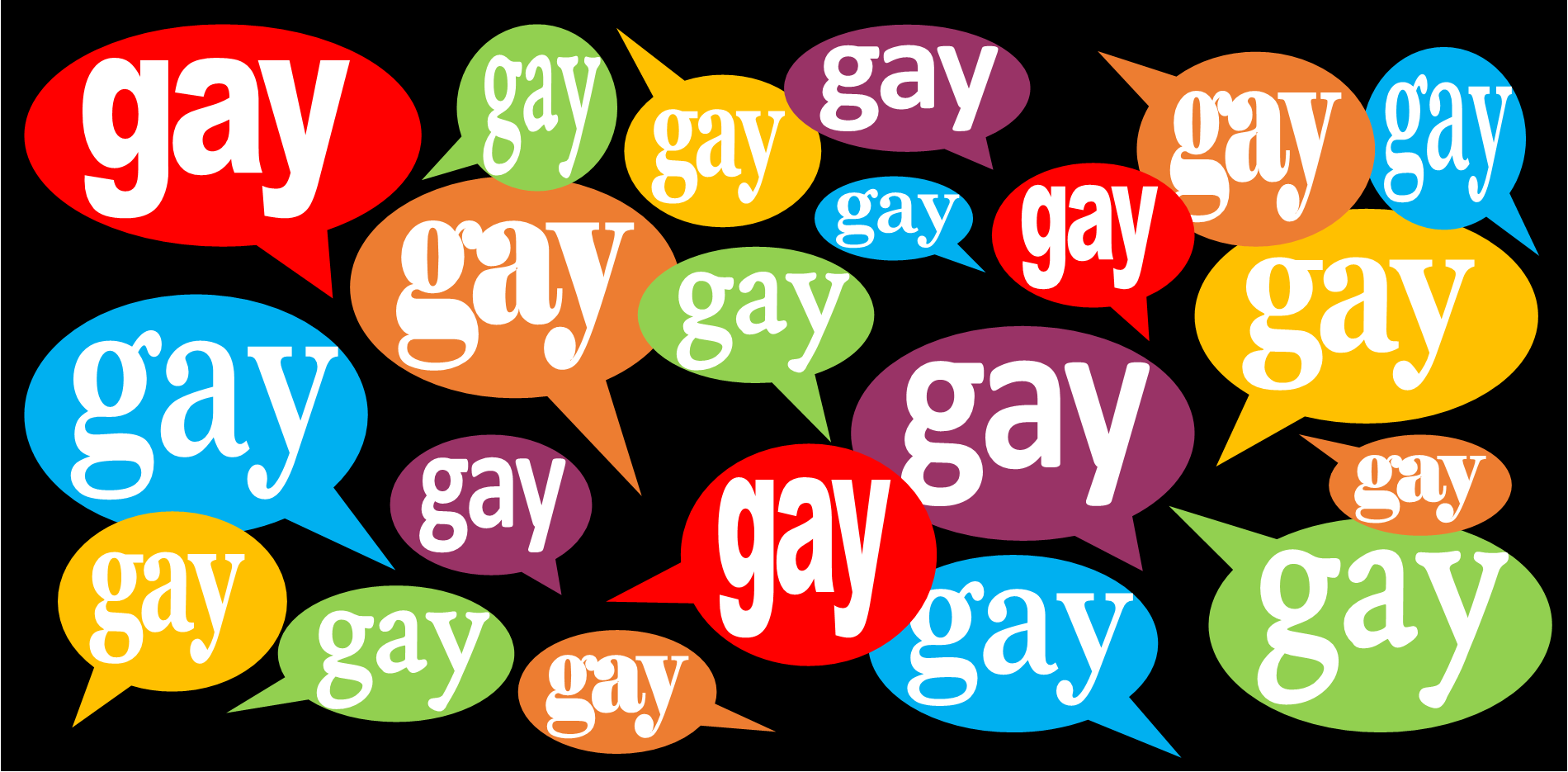
Amanda Gorman: Reasons to Stand Up for Roe v Wade
John Pavlovitz: I'm Really Tired of
Hatred
Pete Buttigieg: Sharp Comebacks to Critics
Anderson Cooper: Being Gay is One of the Greatest
Blessings of My Life
How to Be More Out and
Proud in Your Everyday Life
For a More Perfect Union:
We Need Education and Understanding
Jonathan Capehart's
Commentary: Media's Post Trump Future
Evangelicals Made a Bad
Bargain With Trump
In Gay We Trust: What Do I
Do With This Hate?
All LGBTQ People Should Stand in Solidarity with Black
Athletes
Advocate: Ice Age for
Bigots
As a result of all of this, Republicans are quietly (and
some not so quietly) putting the word out that if you
are white, straight, and Anglo-Saxon, you are about to
get swallowed up and replaced by the tidal wave of
Black, brown, and Asian people, and just about any
color, rushing to run all over lily-white people and
making them second-class citizens.
The imperial wizard of this movement is … want to take a
guess? Tucker Carlson. No surprise here. “Over the past
year, Carlson has repeatedly either alluded to or
directly mentioned a thesis known as the 'great
replacement' theory,” Slate notes. “This exercise in
toxic demography essentially argues that white people of
European origin are being usurped of their primacy in
Western society by [insert minority group here].”
And, according to a recent New York Times series,
Carlson has voiced this theory or elements of it over
400 times on Tucker Carlson Tonight. That's 400 times
his viewers have heard this. That's 400 times
politicians running in deep-red states and elsewhere (Stefanik
is from upstate New York) have heard his white
supremacist messages. And 400 times would-be mass
shooters have heard Carlson’s call to action. Like
pizza dough, the message is pounded over and over and
over and over again, then it’s spread out, layered with
toppings of minority groups, put in the oven where the
fire spreads over it, and eventually the message and all
the toppings are baked in. Thus, it’s too late to pull
back this hatred.
As an NPR headline succinctly put it, “The 'Great
Replacement' Conspiracy Theory Isn't Fringe Anymore,
It's Mainstream.” In the NPR article, Cynthia Miller-Idriss,
professor and director of the Polarization and Extremism
Research and Innovation Lab at American University said,
"It has unified and really spread [the conspiracies]
online in memes and videos and in a lot of propaganda.
It capitalized on a moment when you're not just reading
written propaganda or sharing it in a newsletter or in a
small group in a backwoods militia. But it's circulating
in these dark online spaces where this [alleged] Buffalo
shooter writes he was exposed and radicalized."
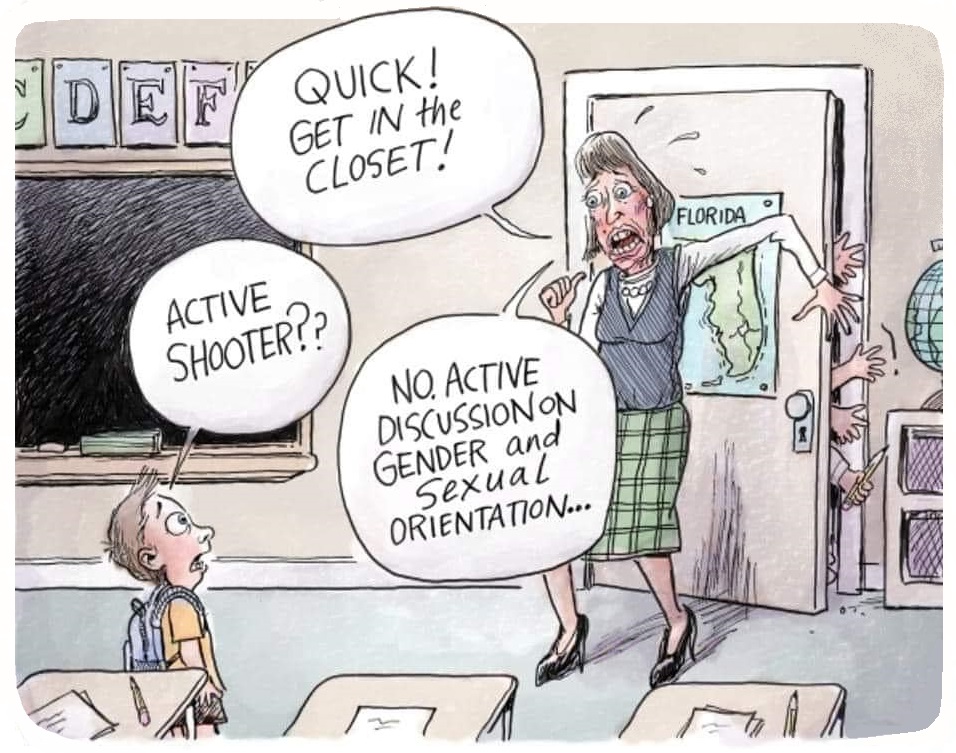
And it’s being spread in plain sight by Carlson and
Laura Ingraham, Stefanik, and US Reps Marjorie Taylor
Greene and Paul Gosar, who spoke earlier this year at a
white nationalist rally in Florida. Did they wear a
white hood? Did they do a Hitler salute? Most likely,
since cameras were banned — and there’s got to be a
reason for that.
You can draw a straight line from critical race theory,
"don’t say gay," "pedophiles" and "groomers" to great
replacement. That line goes down, bends right, bends
down again, and then the order is reversed and crosses
over the original line. It is a swastika. A 21st-century
modernization of a logo of hate, cruelty, fear, and
horror. And it’s happening here in the United States.
And it’s not lying dormant. It is spreading. A high
school lacrosse player in Ohio drew one on his leg.
That’s how far down this depravity seeps. And
what’s frightening about it is that it’s not going away.
Some feign horror at the shooting in Buffalo like
Stefanik, House Minority Leader Kevin McCarthy, and
House Republican Whip Steve Scalise. But their comments
are crocodile tears.
If they are horrified, then why wasn’t Stefanik ordered
to remove her racist ads — last year? Instead, she was
promoted to take the exiled Rep. Liz Cheney’s place as
the House Republican Conference chair. A racist sits
among the leaders of the Republican Party; however,
after the Buffalo shooting, the leadership said Stefanik
wasn’t a racist. Odd place and timing for such a
pronouncement, and oh, by the way, you can’t have it
both ways. The Republican leaders were aghast at what
happened in Buffalo, yet they defended Stefanik, and
they let Greene and Gosar attend racist events with no
repercussions.
Do you call that leadership? Hardly. They are the grand
wizards of the Republican Party, hiding under
metaphorical white hoods, and they take their cues from
Imperial Wizard Carlson who has burned crosses 400 times
on his show, stoking the flames of unabashed bigotry to
his adoring audiences, who usually fall in line with
him.
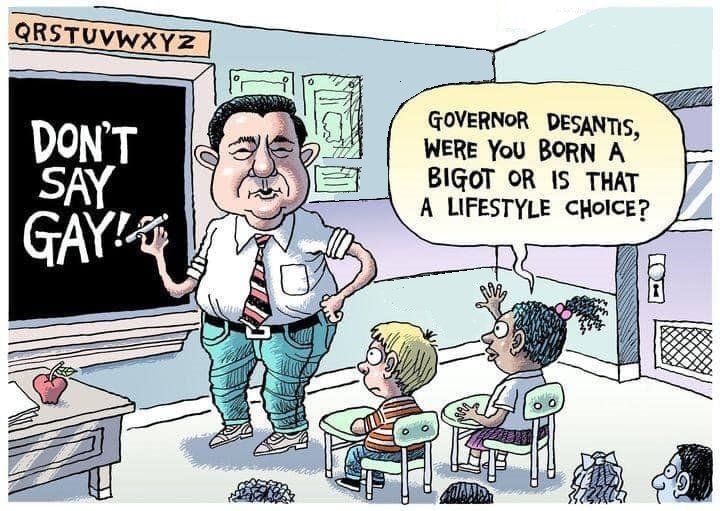
Critical race theory, "don't say gay," "pedophile" and "groomer,"
and now great replacement are the platform points in the
new and dark Republican Party. They cannot win on
results. They have none. So they want you to fear what
your children are learning. They want you scared to
death of anyone who falls under the umbrella of LGBTQ.
They want you petrified that your child will be groomed
and molested. And they want you in fear of anyone who is
not white. These suspicions and terrors are all linked.
And it's just going to get worse.
The days of critical race theory, "don't say gay," and
"pedophile" and "groomer" seem like much simpler times,
and that’s a sickening thing to say. But it’s true.
Innocent people, innocent Americans, were murdered this
past weekend in Buffalo because one, of perhaps
millions, got the message of great replacement theory
loud and clear. Will it end there? Horrifically,
probably not.
Remember, these sentiments are baked in. They are
repeated. They are amplified. They spread. They won’t be
undone. It will just get worse until there’s a tipping
point, and when that happens … it will be a bloodbath.
For God’s sake, please spare us from any more of
Youngkin, DeSantis, Stefanik, Carlson, and all the other
disciples of hate, bigotry, and carnage.
[Source: John Casey | Advocate Magazine | May 2022]
Amanda Gorman: Reasons to Stand Up for Roe v Wade
John Pavlovitz: I'm Really Tired of
Hatred
Pete Buttigieg: Sharp Comebacks to Critics
Anderson Cooper: Being Gay is One of the Greatest
Blessings of My Life
How to Be More Out and
Proud in Your Everyday Life
For a More Perfect Union:
We Need Education and Understanding
Jonathan Capehart's
Commentary: Media's Post Trump Future
Evangelicals Made a Bad
Bargain With Trump
In Gay We Trust: What Do I
Do With This Hate?
All LGBTQ People Should Stand in Solidarity with Black
Athletes
Advocate: Ice Age for
Bigots
Homophobic and
Transphobic Lies Are Now the Basis for Florida Law
Codifying bigotry and ignorance
"Gays are
recruiting kids" and "being transgender is contagious"
have become mainstream GOP talking points. Florida
Gov. Ron DeSantis signed what’s become known as the
“Don’t Say Gay” bill, thus codifying in state law a
prohibition that doesn’t promote the well-being of
Florida’s children but instead drags dangerous,
homophobic lies back into the mainstream.
DeSantis and his fellow Republicans insist that the
Parental Rights in Education bill, as it is officially
known, is all about protecting children from “age
inappropriate” material. That includes an explicit ban
on teaching about sexual orientation or gender identity
to kids in kindergarten through third grade and a softer
ban for older students on materials that are “not age
appropriate or developmentally appropriate for students
in accordance with state standards.”


Homophobic and Transphobic Lies are Now the Basis for
Florida Law
Florida Governor Signs Controversial Don't-Say-Gay Bill
Into Law
Enabling Hate: Fla. Gov. DeSantis Signs
Historic Don't-Say-Gay Bill
ABC News: What is the Don't-Say-Gay Law?
Don’t-Say-Gay Bill Signed by Florida Gov.
Ron DeSantis
Florida's Governor Signs Controversial Anti-LGBTQ Law
Florida Gov. Ron DeSantis Signs Bill Limiting LGBTQ
Classroom Instruction
Poll: Most Americans Oppose Laws Prohibiting Elementary
School LGBTQ Lessons
The legislative text doesn’t define what is appropriate
for older students. Nor does it say specifically that
kindergarten teachers can’t read books such as “And
Tango Makes Three” (which is about two male penguins who
raise a chick) to their class. But as we’ve already seen
with the vague bans on “critical race theory” that state
legislatures have been passing, the vagueness is the
point. Legislators have managed to dodge defending
strict censorship by simply steering educators and
librarians toward self-censorship instead.
In this way, the law is part of a larger crusade against
progressive ideologies gilded in the language of
“parental rights.” Supporters claim the state is merely
stepping in to correct the “indoctrination” that is
occurring in public schools against parents’ wishes.
That includes parents like January Littlejohn, who
introduced herself as a “licensed mental health
counselor and stay-at-home mom” and thanked the governor
at the signing ceremony for his focus on this issue. She
said she and her husband, Jeffrey, had been cut out of
discussions about their child’s gender at their school,
which “sent the message that she needed to be protected
from us, not by us.”
The Littlejohns sued the Leon County School Board and
system administrators in October, alleging they were cut
out of meetings with their 13-year-old about their
child's gender. But their lawsuit made clear that their
child, A.G., had tried to talk to them about being
nonbinary and was rebuffed. Littlejohn even told her
child’s teacher that “she thought A.G.’s gender
confusion was a direct result of her friend group,” in
which three other kids came out as transgender, the
lawsuit said.
When the school continued to work with A.G. and tried to
accommodate them, the Littlejohns threw a fit at being
excluded from the school’s meetings with A.G., according
to the suit. When they finally were given the chance to
attend an interaction between A.G. and school
counselors, the Littlejohns instead demanded that all
future meetings be canceled, and at a meeting with the
superintendent, they seemed to insist that their child
actually had caught “rapid onset gender dysphoria” from
their friends, the suit showed.
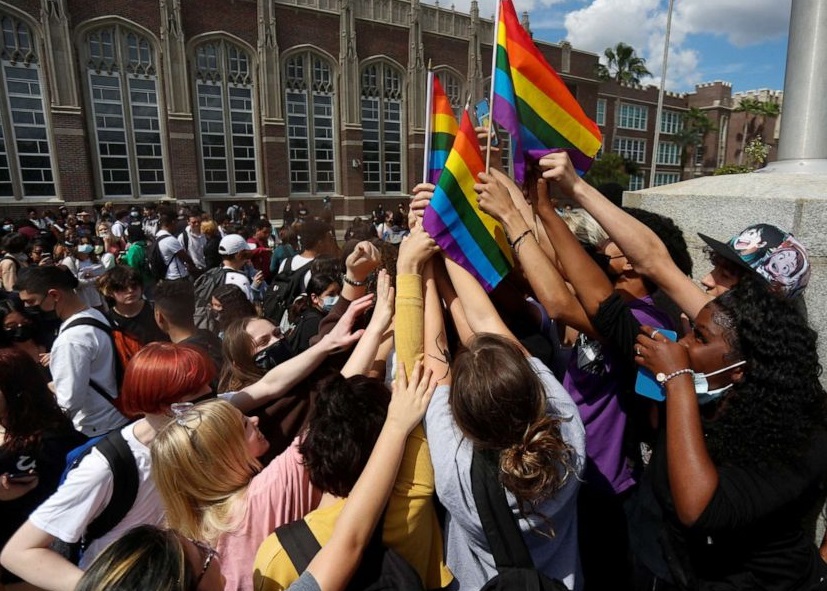
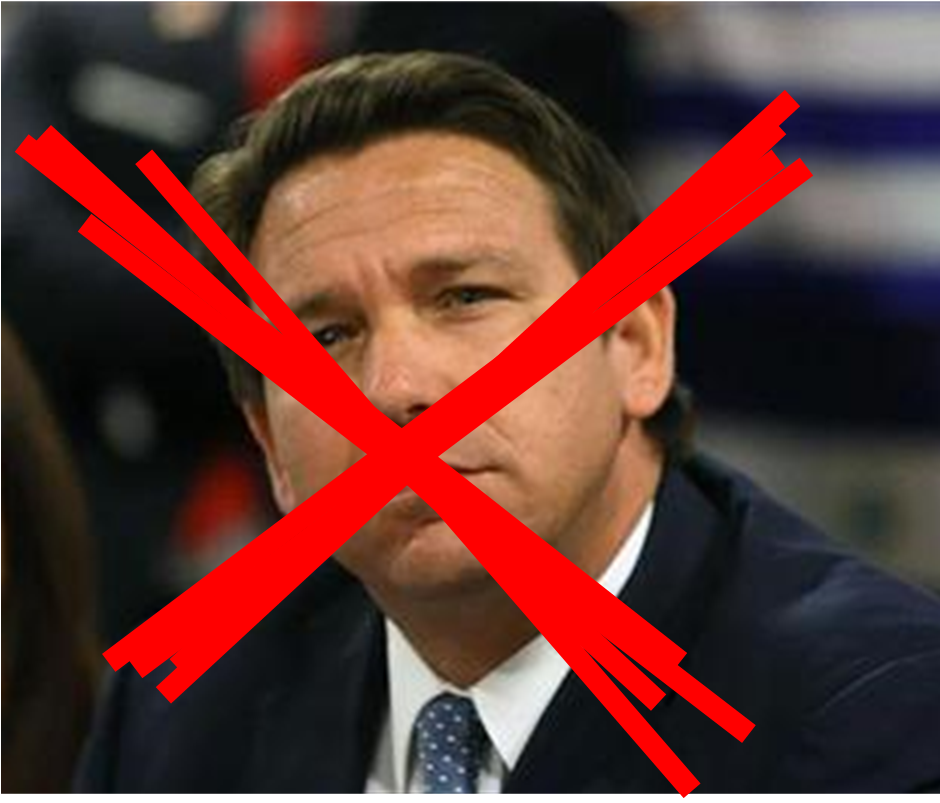
The
Littlejohns’ reaction and their rejection of what A.G.
told them is why, in similar cases, some school
districts have dealt directly with students. Littlejohn
and her husband tried to tell their kid (in so many
words), “No, you are not allowed to be nonbinary,” but
school officials chose to listen to the child. In
effect, this lawsuit is mostly about Littlejohn being
mad that her child’s feelings were considered over her
own. Similar lawsuits are now explicitly authorized
under the “Don’t Say Gay” bill’s provisions.
As that case illustrates, at the core of this new law is
the toxic belief that there is no such thing as a gay or
transgender minor, only adults who “recruit” a child to
the gay or transgender “lifestyle.” According to this
belief, the agenda behind that encouragement can be
ideological (the liberal destruction of American family
values) or personal (“grooming” the child to be sexually
violated.)
DeSantis’ press secretary, Christina Pushaw, wrote: “The
bill that liberals inaccurately call 'Don't Say Gay'
would be more accurately described as an Anti-Grooming
Bill.” Pushaw followed that mind-bendingly homophobic
statement with the claim that if you oppose the bill,
“you are probably a groomer or at least you don’t
denounce the grooming of 4–8 year old children.”
That’s the kind of hateful language that for an
all-too-brief moment seemed to have fallen out of the
mainstream of Republican politics. Despite the GOP
spending the better part of the 2000s warning that
same-sex marriage would force teachers to promote
sodomy, today a slim majority of Republicans support
same-sex marriage. Many of the party’s leaders have
given up on opposing gay rights as a wedge issue and
have at least superficially embraced LGBTQ causes.
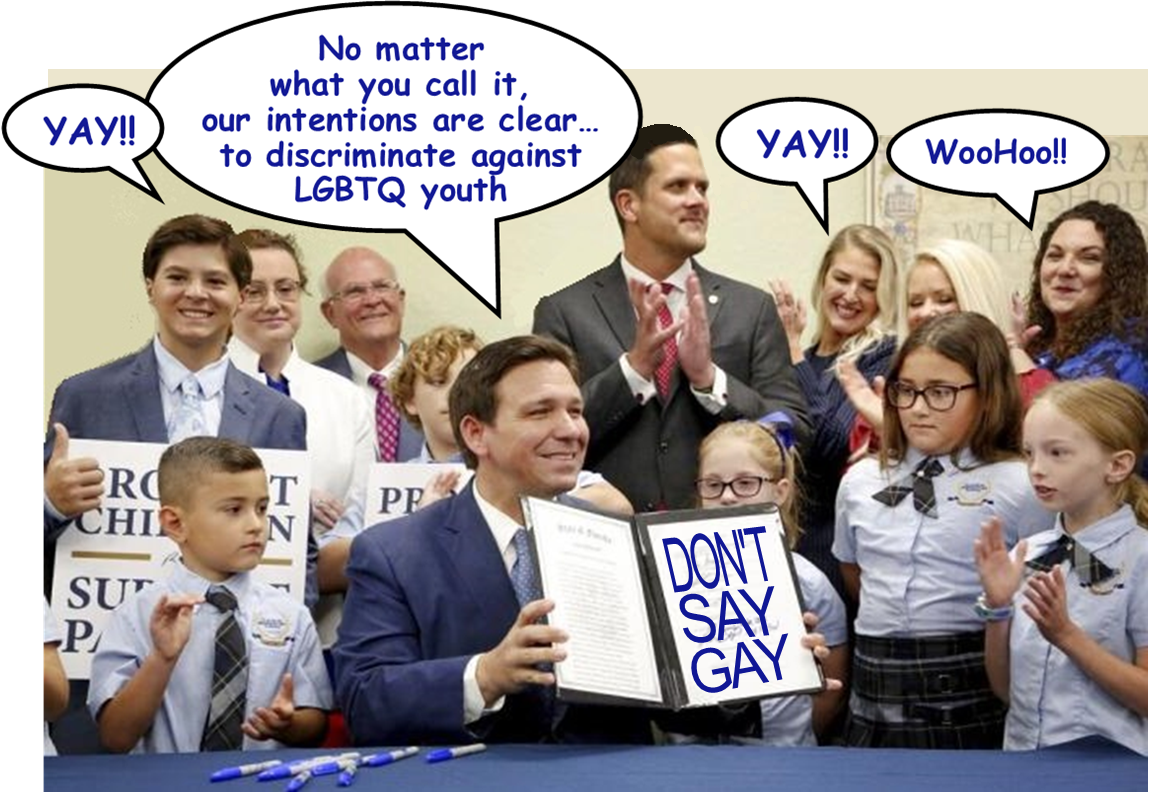
But the rise of the QAnon conspiracy theory has brought
latent fears of pedophilic pederasts back to the
forefront of the GOP base’s concerns. Teaching the very
existence of LGTBQ people to children is now being
framed as step one on the road to child abuse, assault
and molestation — and that framing is receiving either
minimum pushback from GOP leaders or its active embrace
from the party’s demagogues. We saw as much last week in
the appalling performance from GOP senators falsely
accusing Supreme Court nominee Ketanji Brown Jackson of
not being sufficiently tough in child pornography cases.
DeSantis knows that despite the backlash from LGBTQ
advocates and companies including Disney, the bill polls
well among former President Donald Trump’s voters. It
doesn’t matter to him that it spreads the dangerous idea
that being gay or being transgender is something that is
taught, and, conversely, that if it isn’t taught, it can
be stamped out. It doesn’t matter to him that it
promotes a debunked lie that gay men rely on actively
recruiting children for future predations.
What matters to him is that he gets to be the first
governor in the country to endorse this specific wave of
bigotry with his signature, hoping it will pay off for
him come 2024. He’s counting on parents like Littlejohn
to support a presidential run — even if it means more
suffering for kids like A.G.
[Source: Hayes Brown | MSNBC Opinion Columnist | March 2022]
Homophobic and Transphobic Lies are Now the Basis for
Florida Law
Florida Governor Signs Controversial Don't-Say-Gay Bill
Into Law
Enabling Hate: Fla. Gov. DeSantis Signs
Historic Don't-Say-Gay Bill
ABC News: What is the Don't-Say-Gay Law?
Don’t-Say-Gay Bill Signed by Florida Gov.
Ron DeSantis
Florida's Governor Signs Controversial Anti-LGBTQ Law
Florida Gov. Ron DeSantis Signs Bill Limiting LGBTQ
Classroom Instruction
Poll: Most Americans Oppose Laws Prohibiting Elementary
School LGBTQ Lessons
Queerness is
Universal
Queer people do not conform to arbitrary norms around
sex and relationships
“Queer,” before it was associated with the LGBTQ
community, meant simply: strange, peculiar, unusual, out
of the ordinary. Implicit in this meaning is the fact
that most people, in most respects, are not queer. Yet,
it is also simultaneously true that most—or arguably all
people—have at least one characteristic that deviates
from the norm. Being ordinary in most ways is not
synonymous with being ordinary in all ways. This means
that logically, most, or even all people are, in fact,
“queer” in some respect.
Tailors owe their livelihoods to this fact about people.
It is rare for off-the-rack clothes to fit anyone
perfectly. Most of us are either taller or shorter than
average, heavier or thinner, have broader or narrower
shoulders, a thicker or thinner neck, longer or shorter
arms or legs, etc. Even the rare person who is truly
“average” in all of these respects could be left handed
(which affects which shirt sleeve is made shorter for a
watch). A poetic sensibility might be inclined to see
these peculiarities as the stuff of which humanity is
made. How boring would life be if we were all the same?

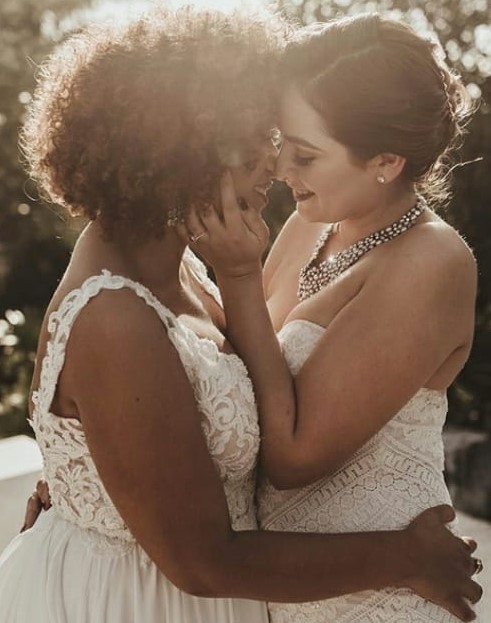
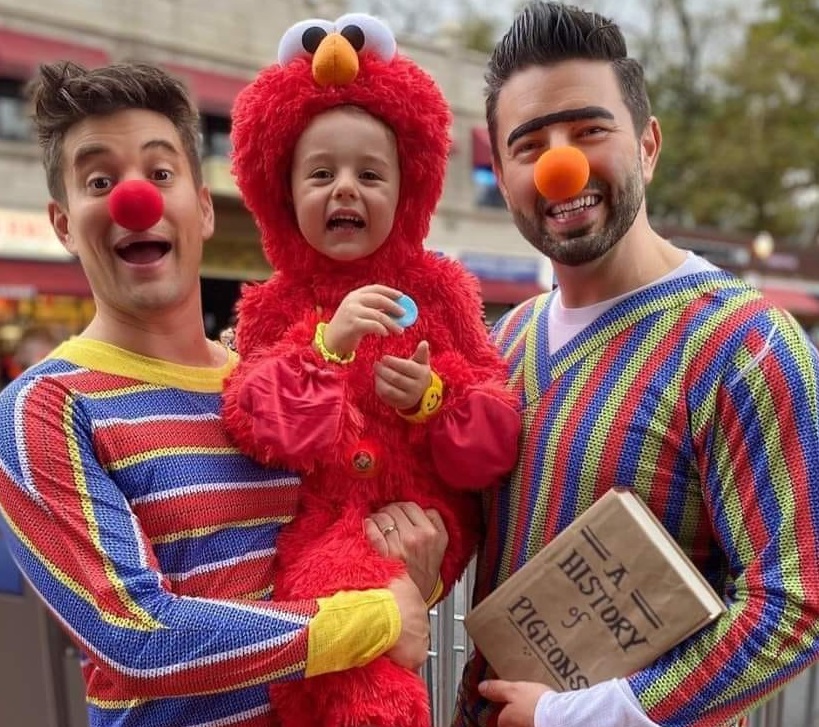
Wikipedia: Queer
Urban Dictionary: Queer
Bustle: What Does Queer Mean?
Video History of the Word "Queer"
Queer 101: Identity and Inclusion
Info: Sexual
Orientation
Queer: LGBTQ People Explain
Video:
What is Queer?
Where emotions, passions, and resulting behaviors are
involved, our peculiarities are amenable to social
pressures. We might feel pressured, for example, to hide
our love of country music in the company of urbane
critics, or to keep our appreciation for avant-garde hip
hop close to our chest in rural Louisiana. This doesn’t
mean we love those musical styles any less, only that we
might feel inclined to keep these sentiments to
ourselves. These quirks are what differentiate us from
others and make us ourselves.
This fact is equally true in the arena of sex and
relationships. Most people may be heterosexual (or at
least mainly so), but likely all differ from the norm in
other respects. For example, an individual could be a
stay-at-home dad, an enthusiast for BDSM, a polyamorous
person, a foot fetishist, part of a couple that chooses
to forgo having children, a “chubby chaser,” or even the
long-derided “old maid.”
Clearly, LGBTQ people don’t have a monopoly on
possessing proclivities outside the norm. In the past,
as a term of judgment or derision, “queer” was not
reserved exclusively for LGBTQ people. Those with
prudish attitudes used it to speak ill of women who
enjoyed sex too much, of people who openly had sex
before marriage, of married couples who didn’t at least
pretend at the practice of monogamy, of interracial
couples, of those who practiced all manner of taboo sex
acts, etc.

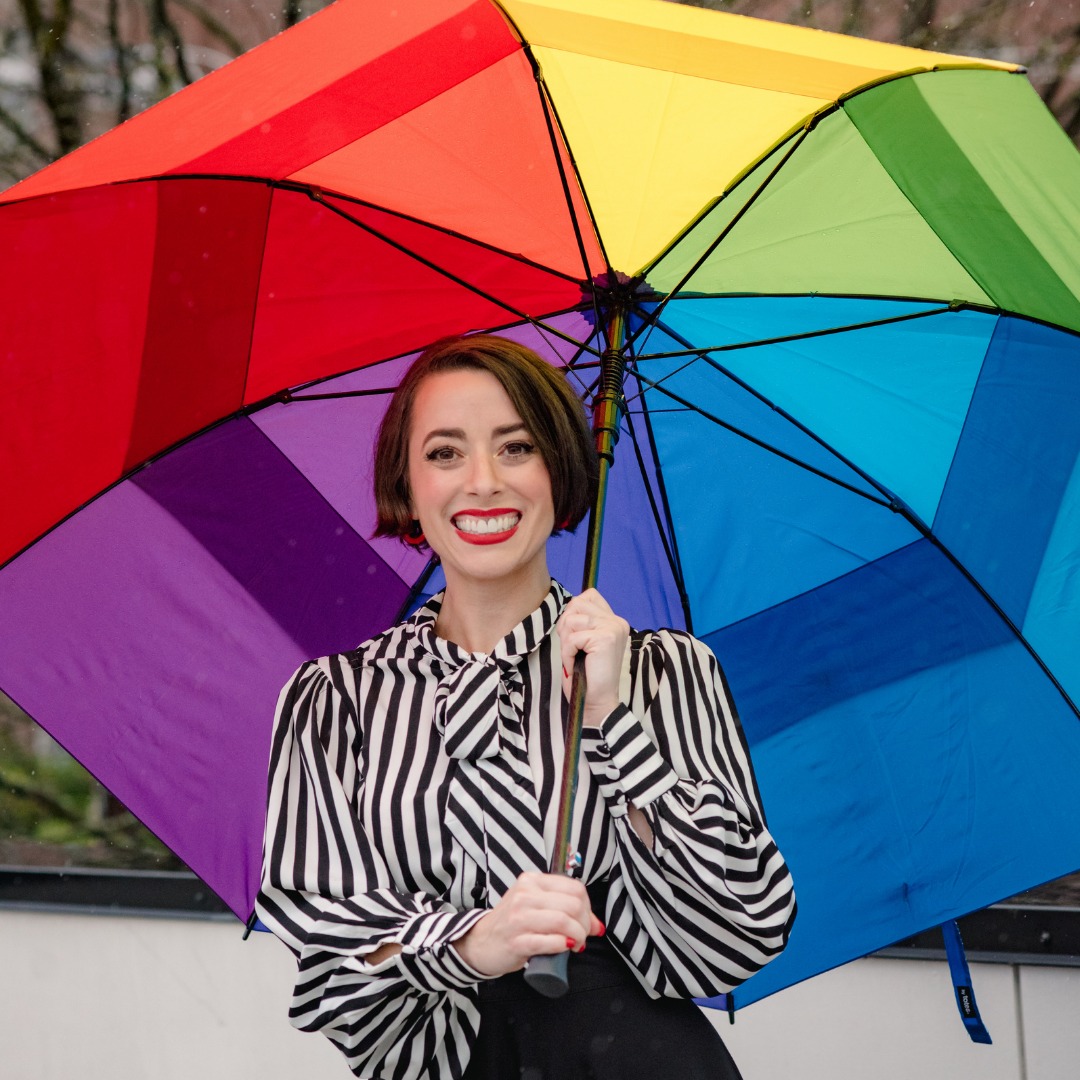
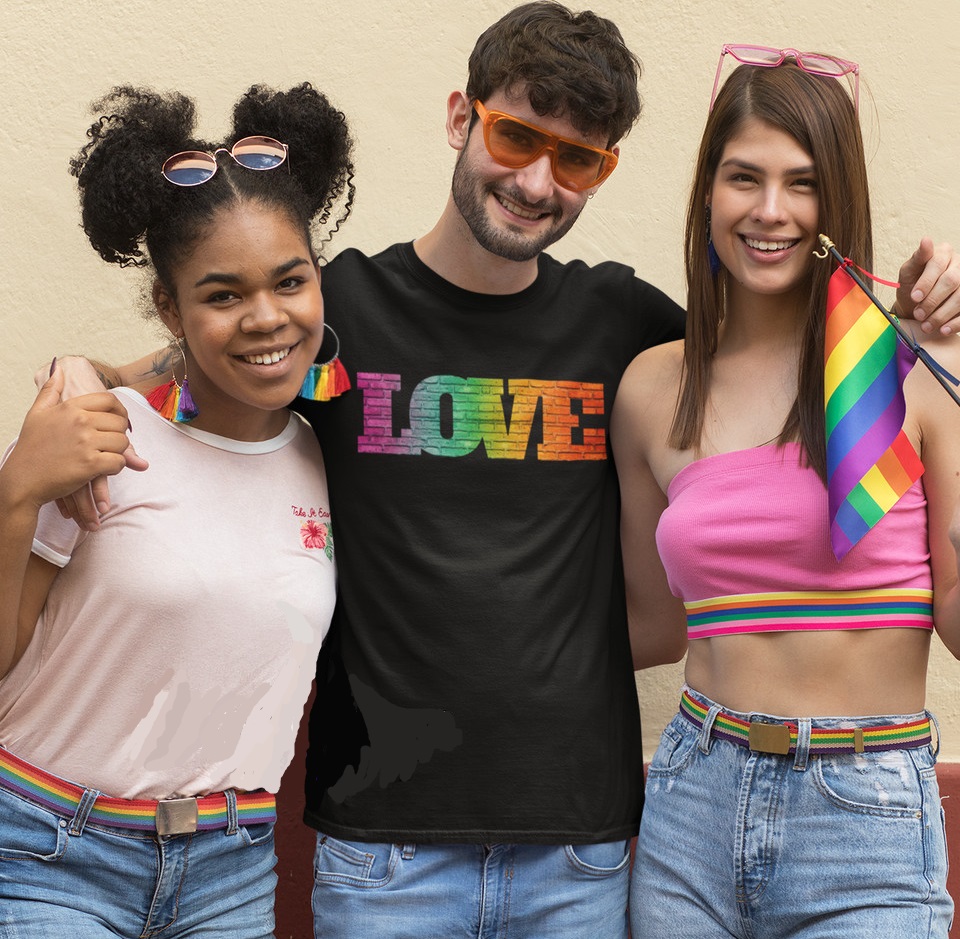
Info: Queer
USA Today: What Does the Q Stand For?
Explaining Queer to Kids
Gay Times: Reclaiming the Word Queer
Info: Sex and Gender
PFLAG:
Definition of Queer
Huff Post: What it Means to be Queer
The use of the word “queer” to refer explicitly to LGBTQ
people has also never been universally accepted by
members of the community. Some activists, for example,
reject its use, while others advocate for a broader use
of the term. In academia, there is an ongoing discussion
of whether to use “queer” solely to refer to LGBTQ
people or to use it more generally to refer to all
people who do not conform to arbitrary norms around sex
and relationships.
In the developed world, much progress has been made on
the front of LGBTQ rights. Same sex marriage,
decriminalization of homosexual sex, and protection from
discrimination on the basis of sexual orientation and
gender identity are becoming the norm in liberal
democracies. In some places, the legal consequences of
stigmas against BDSM or polyamory are more oppressive
than those against the LGBTQ community. It is thus
simply a fact that some straight people experience more
legal discrimination than some LGBTQ people.
In less liberal parts of the world, legal discrimination
against certain sexual or romantic practices is still
not limited to the LGBTQ community. Sex and relationship
practices privately enjoyed by most straight North
Americans or West Europeans are outlawed by many of the
same illiberal countries that continue to outlaw
consensual homosexuality or same sex marriage.
Prohibitions against anal and oral sex, extramarital
sex, and marriage between different religious, ethnic or
socioeconomic groups restrict the freedoms of people of
all sexual orientations and gender identities.
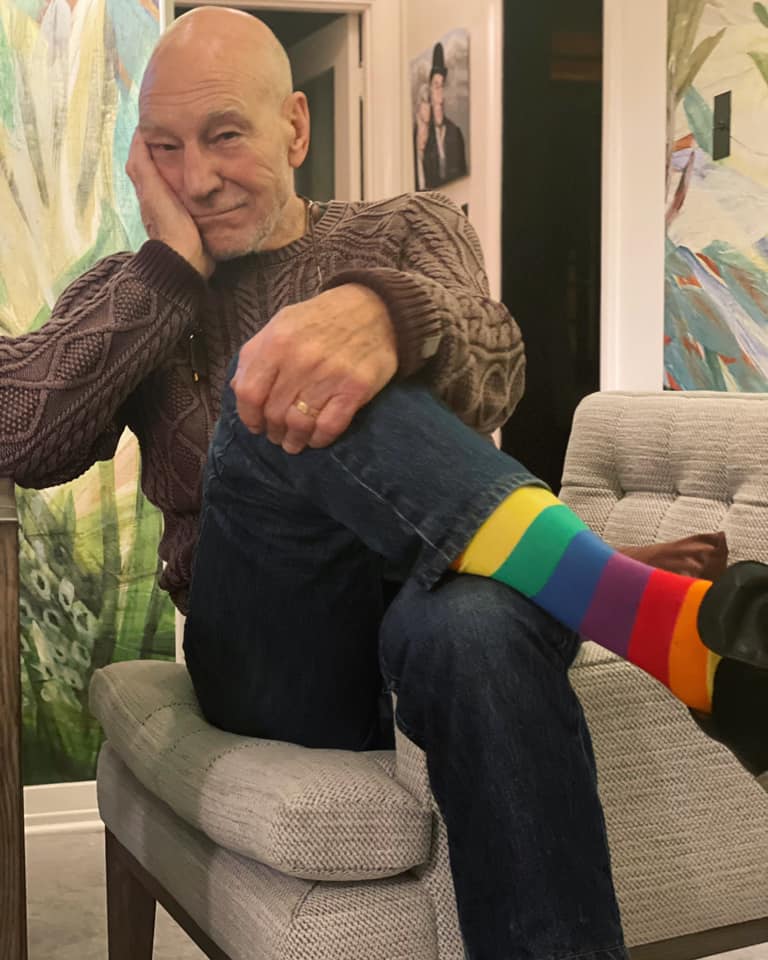
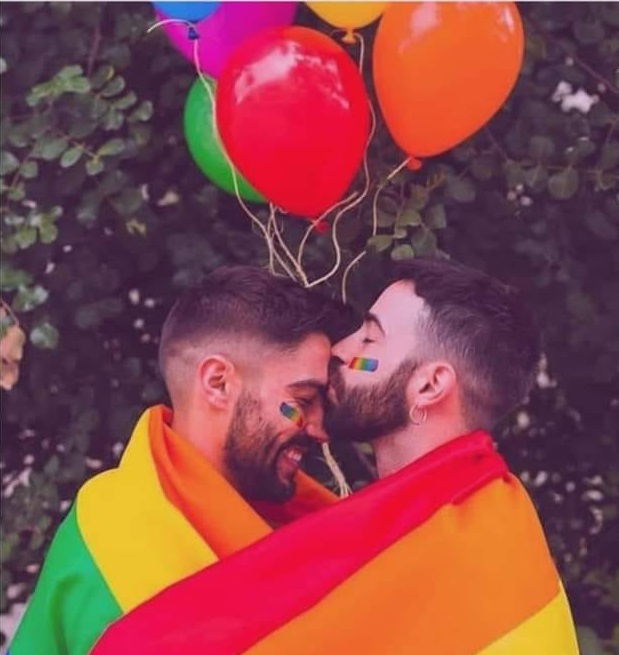
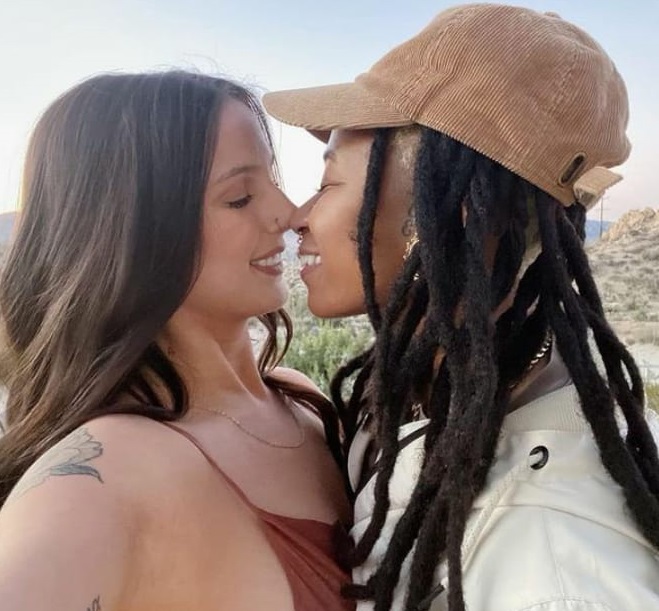
It is therefore both ahistorical and reductive for the
LGBTQ community to claim absolute ownership over the
word “queer.” We are not the only group of people to
whom it has been applied derogatorily, there is no
universal agreement among activists and academics about
to whom the term should be applied today, and we are not
the only people impacted negatively by prohibitions
related to sex and relationships.
Regardless of our location, we all have the moral
imperative to preserve equality under the law. It does
us no favors to alienate cis-straight people with a
divisive narrative. Our hard won freedoms will be better
preserved by telling a story about how everyone,
including cis-straight people, benefits from the
protection of liberties around sex and relationships. In
less liberal parts of the world, too, LGBTQ people have
common cause with cis-straight men and women who are
similarly oppressed by prohibitions around sex and
relationships.
The need to preserve our liberties applies to all
people—not just those belonging to the LGBTQ community.
Our concerns are personal to us but not morally superior
to those of anyone else. Equality under the law is a
universal value of Liberalism upon which no one holds a
monopoly. Even in the specific domain of rights related
to sex and relationships, LGBTQ people aren’t the only
ones who know what it is like to be “queer” in one or
another respect. For these reasons, it is acceptable,
and arguably better rhetorical strategy, to use the word
“queer” in a much broader manner—one that returns to the
original meaning of the term and celebrates the fact
that all people, not just those of the LGBTQ community,
benefit from the tolerance of sexual and romantic
diversity.
[Source: Rio Veradonir | Queer Majority | December 2021]
Wikipedia: Queer
Urban Dictionary: Queer
Bustle: What Does Queer Mean?
Video History of the Word "Queer"
Queer 101: Identity and Inclusion
Info: Sexual
Orientation
Queer: LGBTQ People Explain
Video:
What is Queer?
Info: Queer
USA Today: What Does the Q Stand For?
Explaining Queer to Kids
Gay Times: Reclaiming the Word Queer
Info: Sex and Gender
PFLAG:
Definition of Queer
Huff Post: What it Means to be Queer
Republicans and
Democrats Should Unite to Protect LGBTQ Americans
Full
non-discrimination protections for LGBTQ people are
needed
Many LGBTQ Americans across the country are still facing
discrimination because of who they are and/or who they
love. In 29 US states, LGBTQ individuals must live every
day without any legal protections for their sexual
orientation and gender identity - and this is
unacceptable.
Many
Americans have long been fighting to ensure that all
their compatriots, regardless of race, religion, sex or
any other intrinsic characteristic, have the right to
strive and prosper without discrimination. In our
country’s nearly 250 years of existence we have come a
long way towards achieving this goal, but the fight is
far from over.
Today, many LGBTQ Americans across the country are still
facing discrimination in many areas, such as healthcare,
housing and employment, because of who they are and/or
who they love. Current federal laws do not offer
comprehensive protections from discrimination to LGBTQ
Americans, and only 21 states do so via state laws. As a
Republican, and an American woman who happens to be
transgender, I want all LGBTQ Americans to enjoy all the
rights and protections afforded to other Americans, no
matter which part of the country they choose to live in.
To achieve
this goal, we need protections for LGBTQ Americans,
which clearly prohibit discrimination based on sexual
orientation and gender identity to be enshrined in
federal law. Such protections can only be passed at the
federal level with bipartisan support. While Republicans
and Democrats uniting to protect LGBTQ rights may seem
unlikely, especially in the highly polarized political
environment of today, it is not impossible – or without
precedent.

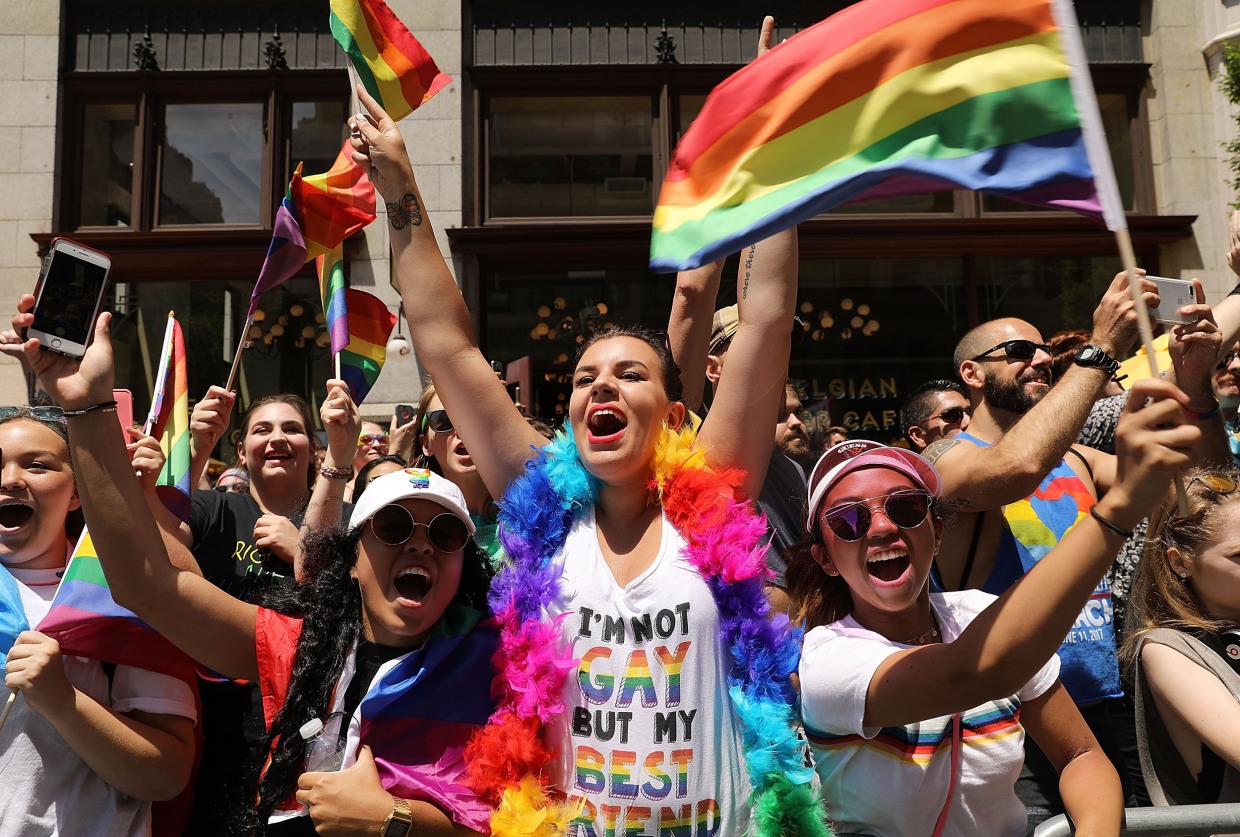
Improving the Lives and Rights of LGBTQ People in
America
Republicans and Democrats Should Unite to Protect LGBTQ
Americans
Protecting the Rights of LGBTQ Individuals
LGBTQ Americans Aren’t Fully Protected From
Discrimination in 29 States
MAP: LGBTQ Non-Discrimination Laws
Three-Quarters of Americans Support LGBTQ
Non-Discrimination Laws
Conservative Coalition Applauds Bipartisan Support for
Federal LGBTQ Nondiscrimination Laws
In 1978, when the Briggs Initiative (California
Proposition 6) sought to ban gays and lesbians from
working in California’s schools through a ballot
referendum, prominent Democrats and Republicans joined
forces to defeat it. Newly elected Democratic San
Francisco city supervisor and LGBTQ activist Harvey
Milk, with support from other prominent Democratic
activists and officials, swiftly started a grassroots,
hard-charging campaign to defeat the initiative, but
without Republican support, victory appeared elusive.
As the referendum day neared, an unlikely force entered
the fight – former California Governor, and rising
Conservative superstar, Ronald Reagan. At the time,
Reagan was already working to win the GOP nomination for
president in the coming 1980 election, and he had much
to lose from joining any “fight for the gays”. However,
he realized removing LGBTQ teachers from the Golden
State’s schools would harm not only the LGBTQ community
and the education system but also the greater society,
and decided to bravely take a stance. He penned an op-ed
for the Los Angeles Tribune encouraging – mostly
Republican – voters to say no to the Briggs initiative.
Just days later, thanks to Milk’s unyielding work, and a
high-profile Republican like Reagan’s support, the
anti-LGBTQ initiative was defeated. Reagan chose to help
people who were unlikely to ever vote for him because he
felt lifting other Americans up, whoever they may be,
was the right thing (the Republican thing) to do.
Back then, Republicans and Democrats came together to
prevent LGBTQ Americans in California from facing
further discrimination. Today, we need them to come
together once again to help end discrimination against
LGBTQ Americans for good. We need new Reagans in our
Senate to step forward and help lift LGBTQ Americans up
so people like me can have equal protections under our
nation’s civil rights laws.


Improving the Lives and Rights of LGBTQ People in
America
Republicans and Democrats Should Unite to Protect LGBTQ
Americans
Protecting the Rights of LGBTQ Individuals
LGBTQ Americans Aren’t Fully Protected From
Discrimination in 29 States
MAP: LGBTQ Non-Discrimination Laws
Three-Quarters of Americans Support LGBTQ
Non-Discrimination Laws
Conservative Coalition Applauds Bipartisan Support for
Federal LGBTQ Nondiscrimination Laws
Currently, for example, there are no federal laws that
prevent medical professionals from denying LGBTQ
individuals care based on who we are or who we love.
Moreover, many of us still face significant barriers
when we try to access public education, life insurance,
nursing homes, car loans, mortgages, rental
accommodations, jobs and promotions. In states without
any LGBTQ non-discrimination measures, LGBTQ individuals
always walk on eggshells, knowing that barbers,
hairdressers, mail carriers, garage mechanics, grocery
cashiers, bank tellers, plumbers and even government
employees can outright deny them services on the basis
of their sexual orientation or gender identity.
After I transitioned, I worried whether my usual doctors
would continue to keep me or my children as their
patient. I worried whether I would be able to hire
tradespeople to do necessary repairs in our family home.
And a few times we had tradespeople not come back after
an estimate because they were “too busy” – though they
had no problem taking on new work from non-LGBTQ
households we knew.
Passed by a bi-partisan majority in the House of
Representatives In February 2021, the Equality Act is a
comprehensive federal bill that aims to protect LGBTQ
people by prohibiting discrimination on the basis of
sex, sexual orientation and gender identity in all areas
of their daily life – including housing, public spaces,
and access to federal funded programs and services.
Currently, the US Senate is considering the bill for a
vote and while almost all Democratic Senators support
the Equality Act, more Republican support is needed for
it to pass the Senate Filibuster threshold of 60 votes.
As an LGBTQ American, I have a vested interest in a
comprehensive Civil Rights bill such as the Equality Act
passing. However, as a conservative person of faith, I
also understand the concerns about the effect such a
bill could have on religious liberties. I believe it is
not in our nation’s best interest to force religious
organizations to choose between following their beliefs
or closing their doors. That said, I know that we as a
nation can find a practical, moral way for such freedoms
to coexist with laws such as the proposed Equality Act.
It is imperative that we find a way to codify federal
LGBTQ non-discrimination measures with bi-partisan
support, because without them many Americans like me
cannot live their lives freely and safely in every
state.
Fortunately, my experiences as an LGBTQ person in the US
have been better than those of many other LGBTQ people
living across America – for the pure reason of
geography. I live in New Jersey, a state that has full
non-discrimination protections for LGBTQ people. This is
great for me as long as I do not leave my home state.
But once I do leave and head westward to Pennsylvania
and beyond, I do not have all the same rights and
liberties that non-LGBTQ Americans in those states have.
Crossing the border into a different state, for example,
may mean that I will have to worry whether a waiter or a
shop clerk would refuse me service based on my gender
identity.
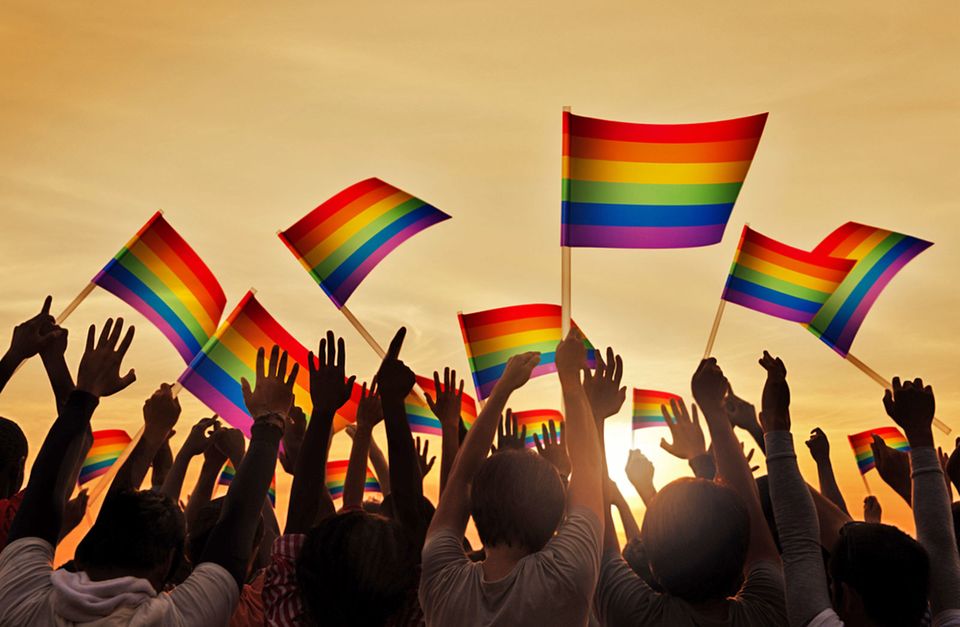

In 29 US states, LGBTQ individuals must live every day
without any legal protections for their sexual
orientation and gender identity – and this is
unacceptable. Our rights should not and cannot remain
dependent on where we happen to be in America. We are
all Americans and we should all be treated the same
anywhere in our country. Such equality will need
bipartisan support and I believe that New Jersey, like
California did long ago, can show us the way.
New Jersey’s existing LGBTQ protections were passed into
law with votes from both Republican and Democratic
legislators and they were signed into law by governors
from both parties. One of the proudest moments of my
life occurred in 2017, when the state’s Republican
governor Chris Christie signed not one, but two bills in
one day to protect transgender New Jerseyans. I and many
other LGBTQ people reached out to him to explain how
these bills would tangibly improve our lives, and
Governor Christie listened. We now need Republicans in
the Senate to also listen to us and help us expand such
protections to every corner of America.
There are some Republican elected officials who are
trying to remove rights and liberties from LGBTQ
Americans. But I do not believe that they represent our
party. I am a lifelong Republican and I have never
personally met any Republican who wants our party to be
known as the party of discrimination. Thus, Senate
Republicans who, like Reagan, truly believe all
Americans deserve liberty and equality should step up
and show what our party really stands for.
As the 18th-century “Father of Conservatism”, Edmund
Burke, said, “Whenever a separation is made between
liberty and justice, neither, in my opinion, is safe.”
Let’s close the remaining separation between liberty and
justice for LGBTQ Americans throughout our nation by
passing the Equality Act. To do so will save lives,
build a stronger citizenry and help millions of our
fellow Americans to achieve their American Dream.
[Source: Jennifer Williams | LGBTQ Advocate in the United
States | Dec 2021]
John Pavlovitz: I'm Really Tired of
Hatred
Being Gay is a Gift From God
Living as an Openly Gay Christian
PBS Interview: Religion and Sexuality
How Can You
be Gay and Jewish?
John Pavlovitz: If God is Love, God is For Same-Sex
Marriage
Tony Campolo: Why I Support Gay Marriage
Bridging the Faith Divide in the LGBTQ Community
Savage and Insensitive
Church Language Must End
John Corvino: What is Morally Wrong With Homosexuality?
Christians Must Stop
Disguising LGBTQ Exclusion as Religious Freedom
John Pavlovitz: Open Letter to a Transgender Young
Person
Spirit Day: Stand Against All That Marginalizes Queer People
Intersectionality and bullying
“Hi, my name is Darid Prom!”
This was the only phrase I knew how to say when I first
immigrated to America. When I was just 10, my family and
I left everything behind in Cambodia and moved to start
a new life in the United States. Upon arriving, it
didn’t take long for me to notice that I was different.
Existing intersectionality as a queer Southeast Asian
immigrant often left me with no choice but to stood out
among my peers. Living authentically unfortunately meant
that I would be the target of bullying.
Four years ago, walking through the hallways of my high
school, I would get constantly teased for being queer.
However, at the time, I didn’t entirely know what it
meant to be “queer.”


Advocate Magazine: On Spirit Day, Stand Against All That
Marginalizes Queer People
Spirit Day 2021: Renewed Importance to Protect LGBTQ
Youths
GLAAD: Spirit
Day
But since I was constantly getting harassed about it, I
figured it must be something bad. That’s when the fear
of being queer became rooted into my mind. In my
homogenous traditional Asian upbringing, queerness was
always such a taboo topic within my family. Not having
any background knowledge about the LGBTQ community led
me to become shameful of myself and my identity. Being
teased, feared, and viewed differently by others caused
a growth in self-hatred. This, combined with the lack of
support I’ve received from educators, created an
atmosphere in school where I was afraid to be
authentically myself and express my true identity.
It’s important to recognize that I entered high school
with the privilege of having been assigned a binary sex
at birth, having passed as a binary gender in school,
and holding some privilege under a white supremacist,
colonial order operating through a logic of colorism and
anti-Blackness. My Asian-American background holds a
substance of privilege that has saved my body from the
many forms of violence imposed on trans and nonbinary
people of color and/or of Indigenous ancestry who live
at the intersection of queerphobia, erasure, and white
supremacy and ongoing (settler) colonial dispossession.
These colonial powers operated through a multifaceted,
complex web continue to be embedded into the structure
of the present, tasked to perpetually hinder queerness
from ever reemerging in the future. This is why it is
important that we adopt an intersectional framework as
we continue to organize for change.


Advocate Magazine: On Spirit Day, Stand Against All That
Marginalizes Queer People
Spirit Day 2021: Renewed Importance to Protect LGBTQ
Youths
GLAAD: Spirit
Day
We need to examine how existing at the intersection of
multiple marginalized identities of race, gender, and
queerness can position individuals in the matrix of the
oppressive layers of discrimination that deleteriously
impact the way people exist in society. Until we include
this framework, we won’t have a full template from which
to build reforms and create an inclusive society that is
devoid of the discrimination and violence of the
colonial present.
LGBTQ issues are built into the tradition of our
society, and as long as we turn a blind eye to the pain
of those suffering under its oppression, we will never
escape those origins.
This year’s Spirit Day will be a critical moment
reflecting our positionality in society as we shine a
light on the resilience and power of the diversity of
the LGBTQ community. To help take a stand against
bullying and show support for LGBTQ youth in schools
across the nation, join the Spirit Day movement by
visiting GLAAD.org/spiritday, where you can take the
Spirit Day pledge and learn more about how you and your
community can support LGBTQ youth.
To any LGBTQ youth who are reading this, know that you
are valid and are loved by a beautiful community. I hope
to shed light on my own intersectional story that is
often erased in classrooms, GSAs, and the overall
mainstream media. Stories are our greatest learning
tool, and through my story, I hope to inspire purposeful
conversations around representation, intersectionality,
and vulnerability during this year’s Spirit Day.
[Source:
Darid
Prom | Queer Immigrant from Cambodia | Philadelphia
Youth Pride | October 2021]
John Pavlovitz: I'm Really Tired of
Hatred
Being Gay is a Gift From God
Living as an Openly Gay Christian
PBS Interview: Religion and Sexuality
How Can You
be Gay and Jewish?
John Pavlovitz: If God is Love, God is For Same-Sex
Marriage
Tony Campolo: Why I Support Gay Marriage
Bridging the Faith Divide in the LGBTQ Community
Savage and Insensitive
Church Language Must End
John Corvino: What is Morally Wrong With Homosexuality?
Christians Must Stop
Disguising LGBTQ Exclusion as Religious Freedom
John Pavlovitz: Open Letter to a Transgender Young
Person
After Pride
Month, Let's Make Resolutions to Support Our Community
Resolutions will extend
our pride past June and make us
see how our queerness enhances
our daily lives
Pride Month is over. The rainbows in store windows and
on garish socks have been cleared. This year, like the
others before it, there was a robust debate about the
commercialization of Pride (whether it’s a parade or
march or both) in fact, each year these tensions are the
perfect kickoff to Pride. But I am interested in the
time after Pride; what happens when our designated month
is over. I am calling for the institution of Pride
resolutions. Each year at the end of June, we should all
make a pledge to our queerness, a pact with our
community, and over the next 12 months in good faith
intend to fulfill it. It may be challenging like all
those things we promise ourselves on New Year’s — How
many new gym memberships go unused by March? How many
cigarettes still lit? — but one way to reclaim Pride
from the commercialization and frivolity is to turn it
toward good for our community and for ourselves.
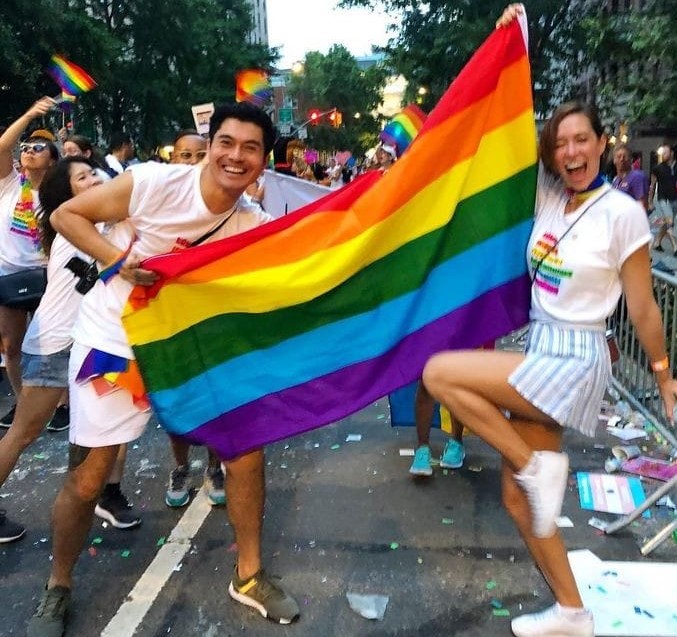
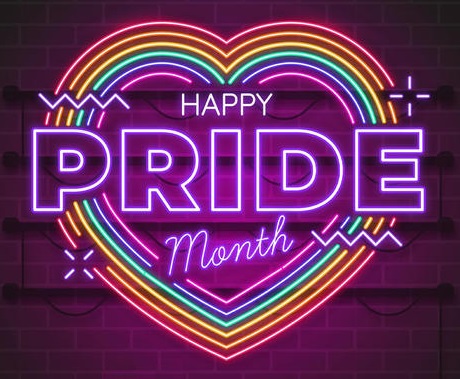
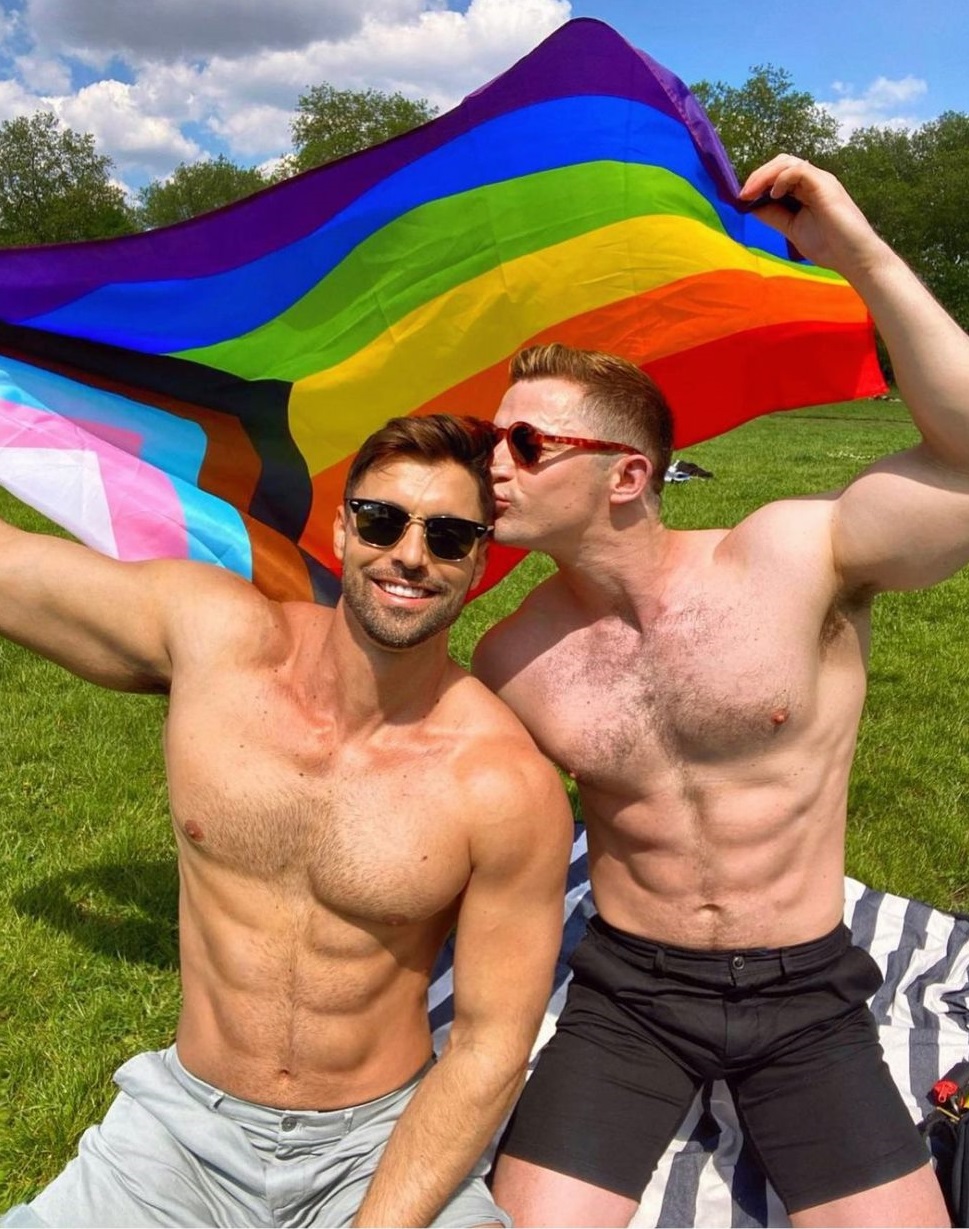
50 Years a Scapegoat:
LGBTQ Community Once Again in GOP Crosshairs
Lessons From
Stonewall for LGBTQ People Today
Tyler Oakley: How to Make 2020 Gayer
For a More Perfect Union:
We Need Education and Understanding
Larry Kramer's Loud and
Proud Activism Remains Necessary
John Corvino: What is Morally Wrong With Homosexuality?
Gay, Straight, Black, White: Love is Love, Right is
Right
By making a Pride resolution, we will be expanding and
expending our pride beyond just the confines of June,
and we will see and feel how much our queerness enhances
our lives daily. Since it is the inauguration of
Pride resolutions, here are some examples to choose from
or to help spark your own.
I resolve to help fight every heinous anti-LGBTQ bill
everywhere (this year over 250 have been introduced in
state legislatures).
I resolve to take the first step toward a 12-step
program.
I resolve to read LGBTQ journalists so I get news about
us from us.
I resolve to shop at LGBTQ-owned and -operated
businesses.
I resolve to socialize in LGBTQ spaces.
I resolve to turn from LGBTQ ally to LGBTQ advocate.
I resolve to make one friend outside my own identity.
I resolve to help start a GSA at my school.
I resolve to take care of myself and my partners.
I resolve to bring my queerness to bear on everything I
do.
I resolve to start therapy and set aside the shame
others have placed upon me.
I resolve to be kind on hookup apps and not treat
everyone like they are expendable.
I resolve to not treat myself as expendable.
I resolve to learn LGBTQ history, not as homework, but
to understand the long line of extraordinary individuals
that I am among.
I resolve to read queer books, watch queer movies, and
expose myself to queer artists so I can see myself in
the entertainment I consume.
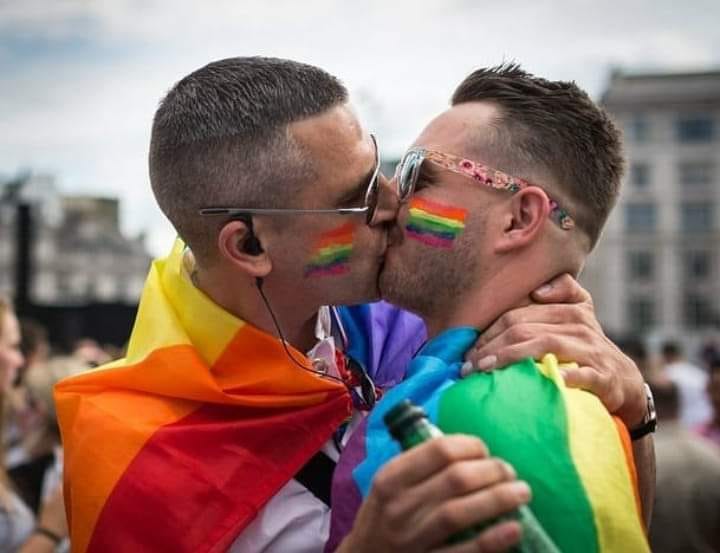
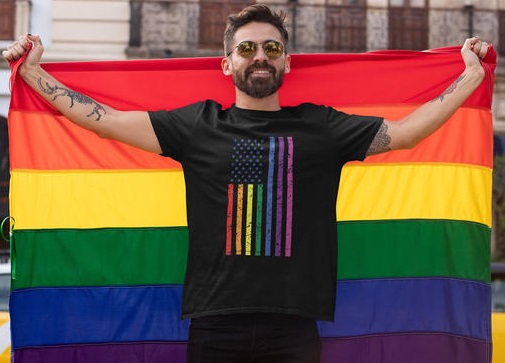
Happy New Year: Anxiety and Hope for LGBTQ Americans in
the 2020s
Hope, Wish and Prayer for 2020: Protection for LGBTQ
Americans
Billy Porter: LGBTQ State of the Union
Pride 2019: Historic, Revelatory, Unforgettable
Anderson Cooper: Being Gay is One of the Greatest
Blessings of My Life
How to Be More Out and
Proud in Your Everyday Life
I resolve to ask for help.
I resolve to come out to at least one person if I’m
ready.
I resolve to join one LGBTQ service organization.
I resolve to work to get my local schools to teach LGBTQ
history.
I resolve to work to get my local schools to teach
inclusive sex ed.
I resolve to ask people their pronouns.
I resolve to help more people to learn about PrEP.
I resolve to not let the government or drug companies
off the hook on finding a vaccine for HIV.
I resolve to listen to and amplify the voices of our
most vulnerable.
I resolve to care for and about our long-term survivors.
I resolve not to minimize or diminish my queerness in
order to go along to get along.
I resolve to make LGBTQ issues central to how I choose a
candidate.
I resolve to run for office.
I resolve to stop my company’s pinkwashing.
I resolve to raise my LGBTQ child to understand that
their queerness is their superpower.
I resolve to understand I am a stakeholder to everything
that happens to all LGBTQ people everywhere.
I resolve not to measure myself against images I see
online.
I resolve to treat myself kindly.
I resolve to treat others kindly.
I resolve to enjoy sex.
I resolve to try to be intimate.
I resolve to risk my heart and love.
I resolve to allow myself to be loved.
[Source:
Richie Jackson | Advocate Magazine | July 2021]
50 Years a Scapegoat:
LGBTQ Community Once Again in GOP Crosshairs
Lessons From
Stonewall for LGBTQ People Today
Tyler Oakley: How to Make 2020 Gayer
For a More Perfect Union:
We Need Education and Understanding
Larry Kramer's Loud and
Proud Activism Remains Necessary
John Corvino: What is Morally Wrong With Homosexuality?
Gay, Straight, Black, White: Love is Love, Right is
Right
Happy New Year: Anxiety and Hope for LGBTQ Americans in
the 2020s
Hope, Wish and Prayer for 2020: Protection for LGBTQ
Americans
Billy Porter: LGBTQ State of the Union
Pride 2019: Historic, Revelatory, Unforgettable
Anderson Cooper: Being Gay is One of the Greatest
Blessings of My Life
How to Be More Out and
Proud in Your Everyday Life
Why I Don't
Celebrate Coming Out Stories
Coming out
is not a “one-and-done” deal
For most
people, coming out is nothing like it appears in the
movies. In the movies, the queer person prepares a
monologue for their parents. Sometimes they get up and
make an unprompted announcement at a family dinner.
Other times they come out by bringing home a date for
prom that’s a different gender than the parents
expected. Then, once the ritual is over, the character
smiles happily and the credits roll. You’re free to
imagine a happy life in which they get to live as their
true selves. But is this narrative accurate? (No.) And
who is this coming out ritual for?
On one hand, it can be extremely liberating to declare
yourself in such a direct way to others. But I know a
lot of people who are only “out” to some of the people
in their life or, despite being out, still must hide
aspects of their life from certain family members so as
not to disturb the fragile peace.

Demi Lovato Comes Out as
Non-Binary
New Survey: 25% of LGBTQ
Youth Use Non-Binary Pronouns
One in Ten Teens Identify
as Gender Diverse
Comic Eddie Izzard Now
Uses She/Her Pronouns
Jesse James Keitel:
Non-Binary Actor Makes TV History
Androgynous: Joan Jett, Miley Cyrus, Laura Jane Grace
Advocate: Half of Gen Z Believes Gender
Binary is Outdated
I am queer and non-binary. So I have to “come out”
almost every day. Every time I meet a new person at work
or have a conversation with anyone in which pronouns
come up, or any time I’m with friends and they introduce
me to a new friend. Coming out is not a “one-and-done”
deal. (Though, it would be much easier if it were.)
Part of the thing that bothers me about “coming out”
stories is that it centers the queer experience on
cisgender and/or heterosexual’s people’s permission for
us to exist. Using this logic, we are only queer once we
have announced to the straight people that we are not
straight. It implies that nothing we did or thought or
said before coming out was queer because we had not
declared ourselves to the majority.
This discourse can lead to a terrifying rabbit hole,
especially for trans people. It puts an unnecessary
burden on queer and gender non-conforming people to be
“overly truthful” or perhaps share more than they might
want to with folks in the majority because there is an
underlying assumption that queer people have been
dishonest about themselves up until the point they came
out. And to some extent yes, queer people must emphasize
different parts of the truth and sometimes flat-out lie
just to exist in peace.
But heterosexual and cisgender people create and
reinforce the system that makes any dishonesty
necessary, through implicit bias, laws, corporate
policies, and religious rules. And frankly, a lot of the
queer experience is inherently traumatic. I think queer
folks have all realized at one point or another that
someone we once trusted was actually homophobic, or that
someone we once called a friend would never use our
pronouns, or that someone we had previously not thought
capable of violence absolutely was. The precariousness
of queer life adds to that trauma, and trauma impacts
memory and the self. It causes you to compartmentalize
yourself to avoid further pain.

Celebrities Who Identify as Gender Fluid
Advocate: Lessons for Parents for Gender Nonconforming
Kids
Demi Lovato, Elliot Page, Sam Smith
Identify as Non-Binary
It Feels Very Positive:
Eddie Izzard Now Using She/Her Pronouns
TED Talk: Parenting a Gender Non-Conforming Child
Don't Give Up by Maggie Szabo
I grew up an only child of Southern Baptist conservative
parents. Now I’m a queer non-binary atheist that leans
left. I knew that I was queer from a young age without
really having the words for it. As I got older, I had to
repress that part of myself to survive growing up with
Christian helicopter parents.
When I was 13, my mom locked me in the car and asked me
if I was – from her tone it was clear that I had better
not say yes. So, I said no.
When I was 19, I came out to her as bisexual. She cried
and said I was a failure and to never tell anyone else
because nobody would love me if I did. We didn’t talk
about it again.
When I was 27, my parents left the church they helped
found over 20 years earlier (that they had been
attending my entire life) because the church decided to
openly welcome LGBTQ people. The church was later kicked
out of the Southern Baptist Convention. (You may have
seen this in the news.)
I came out on social media the next day. I was done.
During all of this I didn’t have any heartfelt
conversations with anyone else in my family. I don’t
really have a good relationship with them anyway, so I
just didn’t see the point. They had never really tried
to get to know me before, so I didn’t believe they would
start now. (They’re also more conservative than my
parents).
I now view my identity as something I share with the
people that I feel will treat me with respect and would
approach the conversation in good faith because they
want to learn more about the human experience. Not
because I feel this conversation is going to prove to
them that queer people exist, that I am one of them, and
that I have as much a right to be here as anyone else
does. But this also means it hurts more when people who
I have told use the wrong pronouns for me and don’t
notice.
And I also know that, while coming out did afford me
some freedom personally and was important for me to do,
it was not “the end” of the conversation. I was queer
before I came out. My life as a queer person would have
been just as valid whether or not I had ever come out.
[Source:
Kiwi
Lanier | Honey Voices | June 2021]
Demi Lovato Comes Out as
Non-Binary
New Survey: 25% of LGBTQ
Youth Use Non-Binary Pronouns
One in Ten Teens Identify
as Gender Diverse
Comic Eddie Izzard Now
Uses She/Her Pronouns
Jesse James Keitel:
Non-Binary Actor Makes TV History
Androgynous: Joan Jett, Miley Cyrus, Laura Jane Grace
Advocate: Half of Gen Z Believes Gender
Binary is Outdated
Celebrities Who Identify as Gender Fluid
Advocate: Lessons for Parents for Gender Nonconforming
Kids
Demi Lovato, Elliot Page, Sam Smith
Identify as Non-Binary
It Feels Very Positive:
Eddie Izzard Now Using She/Her Pronouns
TED Talk: Parenting a Gender Non-Conforming Child
Don't Give Up by Maggie Szabo
Danica Roem to
LGBTQ Youth: You Have to Care About Politics
Inspiring activism
It was a
moment captured for the history books. Danica Roem, on
her knees with her face in her hands, crying. It was
2017 and she had just become the first state lawmaker
who identifies as transgender elected in Virginia. She
will always be the first, but four years later, she is
no longer the only person in the US who identifies as
transgender to be elected and serve in a state
legislative body. It's not a well populated trail, but
one she is proud to have blazed.
"They were
willing to look at me and they go, 'Yeah, we know she's
trans and she'll do a great job,'" Roem said of her
constituents in an interview with CNN earlier this
month. "I never say 'trans but,' always 'trans and.'
Because it's like, no, I don't hide who I am. People
know exactly who I am here." And during this Pride
Month, Roem has a message to the younger people in the
LGBTQ community who say they don't like politics: "When
you are an LGBTQ person, you have to care."


Danica Roem Message to LGBTQ Youth: You Have to Care
About Politics
Danica Roem: First Trans Legislator Re-Elected
Wasington Post: First Trans Person Elected to Public
Office in Virginia
LA Times: Danica Roem Defeats Chief Homophobe
NBC News: Trans Woman Elected to Virginia State
Legislature
LGBTQ Nation: Virginia's New Transgender Legislator
Roem represents Virginia's 13th District in the House of
Delegates -- an area near the home of the first major
battle of the Civil War. Roem jokes that there are still
more things named after Confederate general Stonewall
Jackson in her county than there are Starbucks
locations. She says her success is built on deep
knowledge of local issues since she grew up in the
Manassas area she now represents. "When I was asked on
election night, 'Hey, what does this mean?' It was just
like, well, it means that a trans woman is going to
finally work on fixing Route 28."
Though
Roem is a state legislator, her history-making moment
means her platform is national. She is well aware that
her visibility and representation are changing the
national conversation. "What we learned from the
marriage equality fights," she explained, is that "if
you know a gay person in your life and you see just that
person, just being a person, that you (are) far less
likely to want to restrict their civil rights." Given
that 0.6% of Americans identify as transgender,
according to a Gallup poll on LGBTQ identification
published earlier this year, she recognizes that for
some people, she may be the only trans person they know.
"If you know a trans person, you're much more likely to
support our civil rights. But because there are fewer of
us, it makes it a harder conversation."


Danica Roem Message to LGBTQ Youth: You Have to Care
About Politics
Danica Roem: First Trans Legislator Re-Elected
Wasington Post: First Trans Person Elected to Public
Office in Virginia
LA Times: Danica Roem Defeats Chief Homophobe
NBC News: Trans Woman Elected to Virginia State
Legislature
LGBTQ Nation: Virginia's New Transgender Legislator
Her path to politics
Before her
run for office in 2017, Roem spent nine years as a
journalist in her community, which she says was her
chief qualification for elected office. "What person is
going to be more qualified to represent their community
than a lifelong resident of that community who spent
their career actually covering the public policy issues
of the community?'"
She first got invested in politics in 2003, when
then-President George W. Bush wanted to limit marriage
to heterosexuals. She couldn't ignore what was
happening.
"I would
read the newspaper, I would read USA Today, New York
Times," she says. "I would read those every single day,
and then I would go online and I would read about
politics, two hours a day, seven days a week, every day
for years." Though she hadn't yet come out, Roem said
she sought to understand what legal mechanisms existed
to protect people like her -- and more importantly --
how to fight for them.
Across the
country today, many states permit a legal strategy known
as the gay and trans "panic" defense, which can allow
people who are charged with violent crimes against LGBTQ
victims to argue that it was the victim's gender
identity or sexual orientation that drove them to
violence. Earlier this year, at the behest of a teenage
constituent who told her it was scary growing up knowing
that someone could get away with harming them, Roem
introduced a bill to ban the gay and trans panic defense
for murder or manslaughter in Virginia.
"I
realized that that person was living with the same fear
in 2020 that I had as a closeted high school freshman in
1998."
It passed the legislature in February, making Virginia
the first state in the South and 12th in the country to
ban it as a defense of murder or manslaughter. "We're
simply saying that a person's mere presence and
existence as an LGBTQ person does not constitute a heat
of passion defense that negates malice in an attack. In
layman's terms, you can't just assault and kill someone
just because you feel like it," Roem said.

Danica Roem Message to LGBTQ Youth: You Have to Care
About Politics
Danica Roem: First Trans Legislator Re-Elected
Wasington Post: First Trans Person Elected to Public
Office in Virginia
LA Times: Danica Roem Defeats Chief Homophobe
NBC News: Trans Woman Elected to Virginia State
Legislature
LGBTQ Nation: Virginia's New Transgender Legislator
April Fools' Day
Roem was
14 years old when Matthew Shepard was brutally murdered
in 1998 in Wyoming for being gay. "I knew damn well who
I was at that point, and I was too scared to tell
anyone. And then when you see a young gay man in Wyoming
being pistol-whipped, bound to a fence post, and left to
die in the freezing cold. ... When you see that play
out, it's the late nineties and you're in the South and
you go, what's happening in Wyoming is not far fetched
from what could be happening in Virginia," Roem
recalled.
Fearing
for her own safety and the lack of legal protection, and
worried about how her family and friends would react,
she waited another 14 years before she decided to
transition. "I was at a point at age 28 where I did not
want to go into my thirties living a lie. I had
pretended to be someone else my entire life by this
point. I had known who I was since I was 10 years old."
She was afraid of disappointing people, especially her
mom, she said, and struggled to decide how she wanted to
tell people. She thought Facebook would be a good place
to start, and eventually changed her gender and her name
on the platform -- on April Fools' Day.
"I
figured, okay, if it goes badly, 'April Fools!' If it
goes well, I'll let it ride," she explained. "I thought
it was the safest day of the year for me to do it
because if I just did on like April 2, it would just be
like, 'Um, I have questions. What are you trying to tell
us?'"
Despite her concerns, she said she felt supported by
friends who told her they loved her new look. "And so go
figure, that was like the day of my adult life where I
was being real. April Fools' Day was the day I was being
like, nope. This is actually who I am. And I've let it
roll ever since."
As a
teenager, Roem said she didn't have LGBTQ role models of
her own -- she didn't even know any. She saw trans
people portrayed in the media, but only in a limited,
disheartening, fashion. "Trans representation was
whoever was being ridiculed on Jerry Springer," she
remembered. "Or 'When we come back on Maury, we're going
to have a shocking announcement about this person's
really dating a man,' or, you know, like some stupid
crap like that." She knows now that she wasn't alone.
"Now I know at least five or six people who I went to
school with who are out, including same-sex couples who
are married now. And it's just the oddly comforting
thing about that is like, 'Oh, it wasn't just me who was
suffocating,'" Roem said.

Politics cares about you
This year has already become the worst year for
anti-LGBTQ legislation in recent history, according to
the Human Rights Campaign. As of May, more than 250
anti-LGBTQ bills had been introduced at the state level,
with 17 of them signed into law. "When you are an LGBTQ
person in the United States, regardless of whether you
care about politics, politics cares about you," Roem
said.
Her plea is personal, and she hopes her activism will
inspire the next generation into action as well. "If
you're not involved, if you are not your best advocate,
you're asking someone else to fill that void. Some of
the people who will try to step up to fill that void are
going to be political charlatans who have no interest in
preserving your best interest," Roem said. "You can't
count on other people to be your best advocate. You have
to step up."
[Source:
Dana
Bash and Abbie Sharpe | CNN | June 2021]
I Hope it Isn’t Too Late: Queer Folks
Cling to Hope for a Brighter Future
On the Right Side of History
Current Situation is Scary
James Talarico:
Religious Right Gets It Wrong
What it Means to Love Your Country
Warning From Gov Pritzker
Danielle Kramer: Stochastic Terrorism
Facts vs Fantasy
James Talarico: Ten
Commandments Bill in Texas
No God-Given
Right to Discriminate Against LGBTQ People
Protecting
people from discrimination should not be a partisan
issue
Senate Republicans are standing in the way of Congress
acting according to the will of the majority of
Americans. A recent PRRI poll found that 83 percent of
Americans (which includes strong majorities of
Republicans, Democrats, and independents) support
nondiscrimination laws that protect gay, lesbian,
bisexual, and transgender people from discrimination.
Still, there is an obstacle standing in the way of
Congress acting according to the will of the majority of
Americans and passing a federal law that does just that:
the claim by some Republicans and religious groups that
LGBTQ rights stand in conflict with religious rights.
US Senator Mitt Romney of Utah is among the Republicans
voicing opposition to the House-passed Equality Act,
which would extend the current federal law barring
discrimination on the basis of race, religion, and other
protected categories to also cover sexual orientation
and gender identity. Romney cited the lack of “strong
religious liberty protections” in the bill’s language as
reason for his opposition.
Religious-based groups such as the Southern Baptist
Convention raise more hyperbolic alarms, calling the
legislation “the most significant threat to religious
liberty ever considered in the United States Congress.”
The truth is that few rights in America have more robust
protections under the Constitution, as well as federal,
state, and local laws, than the right to believe,
worship, and express religious views as one wishes.
Protecting sincerely held religious beliefs is a pillar
of American law, as it should be. Nothing about a law
shielding people from bigoted policies and practices
stands in the way of that.
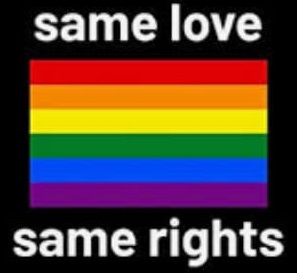
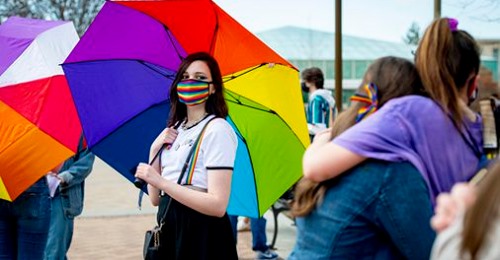 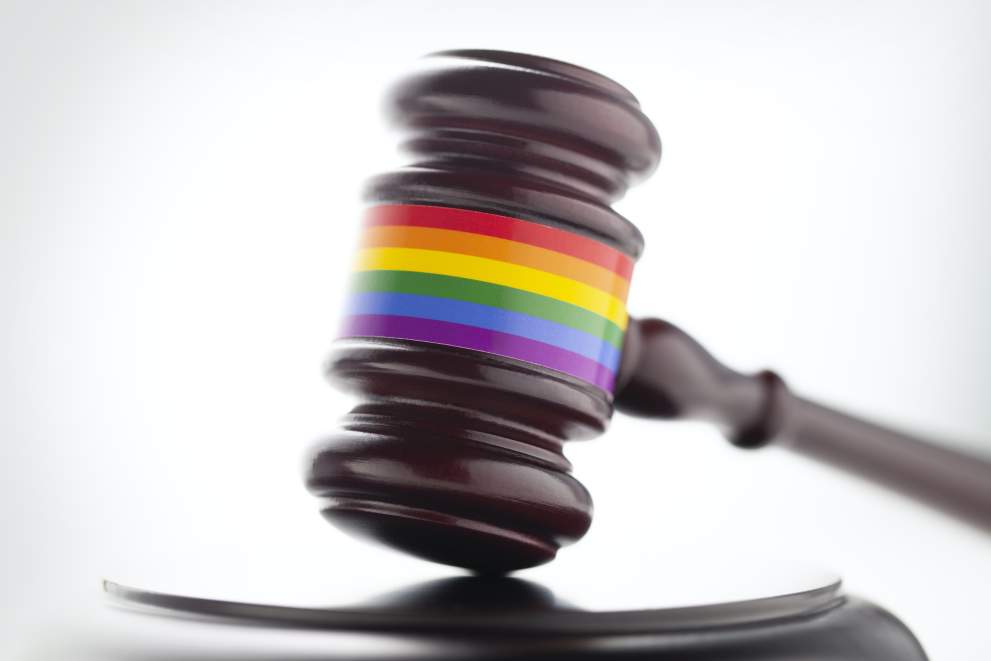
Boston Globe: No God-Given Right to Discriminate Against
LGBTQ People
ACLU: End the Use of Religion to Discriminate
Lambda Legal: The Notion of Religious Exemption
HRW: Religious Exemption and Discrimination Against
LGBTQ People
Natl LGBTQ Task Force: LGBTQ Discrimination Masquerading
as Religious Freedom
In fact, the Equality Act would leave in place an
exemption for religious entities that would allow them
to, for example, give preference to people of their
faith in employment and housing decisions. But it won’t
allow religion to be used as a sword to infringe on the
protected rights of others — especially when such
claims, like the false assertion that the Bible’s story
of the curse of Ham justified slavery and racial
bigotry, are unfounded.
And that is why the Equality Act’s provision barring the
Religious Freedom Restoration Act from being used as a
defense for discriminatory conduct (the very provision
drawing the ire of Republicans) is so crucial. That
statute, passed by Congress and signed into law in 1993
by President Bill Clinton, was meant to protect
religious liberties (particularly the rights of
religious minorities) and enjoyed broad support at the
time of its passage.
But in the nearly two decades since, the law has been
stretched far beyond its intended purpose, serving as a
basis for actions such as private companies denying
spousal benefits to same-sex couples or adoption
agencies refusing to consider gay or transgender people
as potential parents. With the Equality Act, Congress
can make clear it never intended to allow organizations
or individuals to claim a God-given right to
discriminate. “The government has a compelling interest
in enforcing nondiscrimination law, and it’s not
over-broad to say you can’t discriminate if
discrimination is the problem the law is addressing,”
said Jennifer C. Pizer, senior counsel and director of
law and policy at the nonprofit advocacy organization
Lambda Legal.
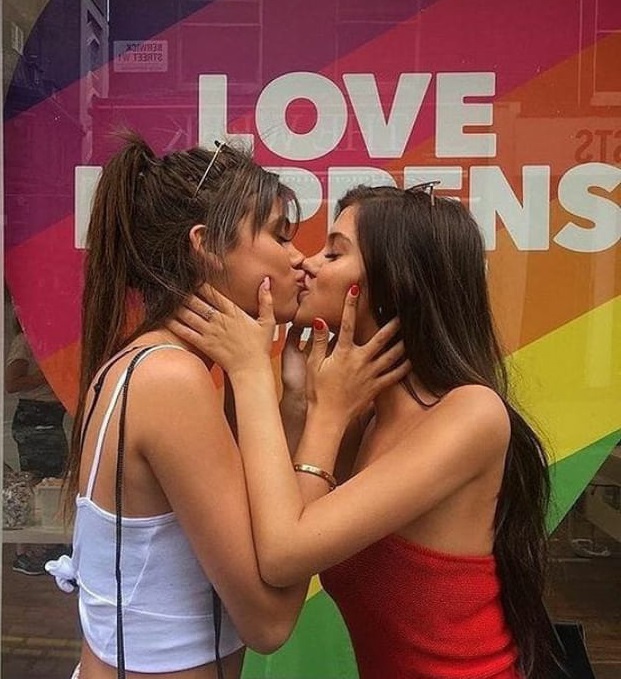
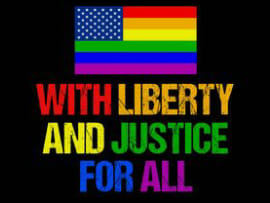
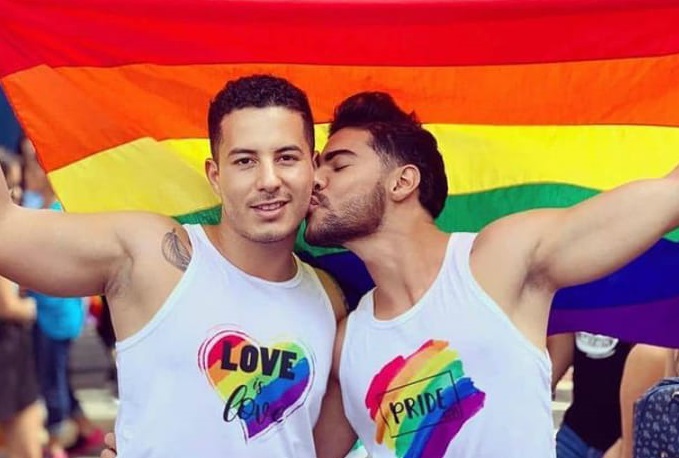
Boston Globe: No God-Given Right to Discriminate Against
LGBTQ People
ACLU: End the Use of Religion to Discriminate
Lambda Legal: The Notion of Religious Exemption
HRW: Religious Exemption and Discrimination Against
LGBTQ People
Natl LGBTQ Task Force: LGBTQ Discrimination Masquerading
as Religious Freedom
Even
Justice Neil Gorsuch (one of the Supreme Court’s most
conservative jurists) noted that there is ample room for
LGBTQ protections and religious rights to coexist, in a
6-3 decision last year extending federal employment
discrimination protections to including sexual
orientation and gender identity. “We are also deeply
concerned with preserving the promise of the free
exercise of religion enshrined in our Constitution; that
guarantee lies at the heart of our pluralistic society,”
Gorsuch wrote for the majority. “But worries about how
Title VII may intersect with religious liberties are
nothing new.” Gorsuch underscored that the existing
federal law religious rights exclusion and the First
Amendment already provide religious protections.
Laws protecting LGBTQ people from discrimination are
already in place in 23 states and the District of
Columbia. But that still leaves an estimated nearly 4
million people in America legally unprotected from
biased treatment because of their sexual orientation or
gender identity. Pizer said a Lambda Legal report
released this week detailing more than 4,000 claims of
discriminatory conduct based on sexual orientation or
gender identity received last year by the organization’s
help line makes clear that the need for protections is
real. “It reflects the real problems people are having,”
Pizer said, from discrimination in the workplace and
difficulty obtaining identification documents to being
targets of harassment and violence.
But Americans are already on board with granting them
protections that they need. As a person of faith, I can
only pray that members of the Senate vote to do right by
them.
[Source:
Kimberly Atkins | Boston Globe | March 2021]
On the Right Side of History
Current Situation is Scary
What it Means to Love Your Country
James Talarico:
Progressive Christian Ideas
I Hope it Isn’t Too Late: Queer Folks
Cling to Hope for a Brighter Future
Warning From Gov Pritzker
Danielle Kramer: Stochastic Terrorism
Rep Meanie Stansbury: Focus on the Real Issues
Barack Obama: Reflections
No Kings Protests Nationwide
South Park: What Would Jesus Say About
Donald Trump?
Oh America
Your Life Sucks?
What Radicalized You?
Transphobic
Tirade Against the Equality Act Masquerading as Feminism
The voice of bigotry and ignorance
They say
ignorance is bliss. But when it comes to Rep. Marjorie
Taylor Greene (R-Ga.), ignorance is hateful and
dangerous. The latest example came on Feb. 24 when she
took to the House floor to decry the Equality Act.
Through a star-spangled mask, the QAnon congresswoman
urged her colleagues to vote against the legislation
that would amend the 1964 Civil Rights Act to prohibit
discrimination based on sexual orientation or gender
identity. It was a five-minute transphobic tirade
masquerading as feminism.


“I rise today in defense of women, girls and children,”
Greene began. After declaring that there shouldn’t be
discrimination in our nation and extolling the rights
achieved by women in various aspects of American life,
Greene got to her bigoted point.
“The Equality Act will change all of that, because it
will put trans rights above women’s rights, above the
rights of our daughters, our sisters, our friends, our
grandmothers, our aunts. It’s too much,” groused Greene.
“You see, as a woman, I have competed in sports and I’m
so thrilled I was able to do that, but I competed
against biological women.” It went downhill from there,
with a lot of folderol about how “biological women
cannot compete against biological men” and how
“biological little girls cannot compete against
biological little boys and they shouldn’t have to.”
The
offensiveness of this is off the charts. Transgender
women are women. Transgender men are men. Period. But
we’re talking about Greene, who has shown herself to be
a bottomless pit of ugliness. But I digress.



NBC News: Marjorie Taylor Greene Mocks Transgender
People
Advocate: Marjorie Taylor Greene Displays Anti-Trans
Poster
BBC: Marjorie Taylor Greene Punished for Incendiary
Remarks
Newsweek: Marjorie Taylor Greene's Anti-Trans Poster
USA Today: Marjorie Taylor Greene Faces Backlash After
Transphobic Attack
Later that day, after Rep. Marie Newman (D-Ill.)
displayed a transgender pride flag outside her office in
support of her transgender daughter. Greene, whose
office is directly across the hall, responded by putting
up a sign with a transphobic message. The next day, the
Georgia congresswoman with nothing else to do because
she was kicked off her committees dubbed the Equality
Act “a completely evil, disgusting, immoral bill.” Talk
about projection.
The Equality Act was made to protect me and other LGBTQ
Americans from people like Greene, people who are always
trying to reduce our lives to bedrooms, bathrooms or
locker rooms rather than deal with the complex lives of
real people who must endure their hatred.
A lot of people thought the fight for LGBTQ equality was
over when the Supreme Court legalized same-sex marriage
in 2015. But it wasn’t. And still isn’t. Marriage is
legal for same-sex couples in all 50 states. But that
couple could lose their respective jobs in 21 states, be
denied housing in 27 states, be denied public
accommodations in 25 states, and if they or their
children are in school or college, their sexual
orientation or gender identity could open them to
discrimination in their educational pursuits in 31
states.
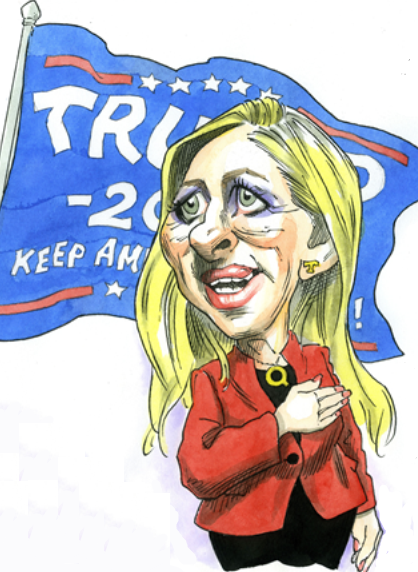 

The
Equality Act passed the House on Thursday. With
Democrats in control in the Senate, its chances of
surviving a filibuster are a tiny bit better. President
Biden has promised to sign the bill if it reaches his
desk.
LGBTQ Americans deserve equal protection under all the
federal laws that secure the safety and dignity of
ourselves and our families. Besides, we pay taxes and
are part of the sturdy fabric of this nation, from your
essential workers to your secretary of transportation.
“There should not be discrimination of anyone in the
United States of America, and I fully believe that,”
Greene declared in her anti-Equality Act speech. If she
really did believe that, she would stop blocking
legislation that would give her hollow words the ring of
truth.
[Source:
Jonathan Capehart | Washington Post | February 2021]
Pete
Buttigieg on Trump
President's Character
Current Situation is
Scary
James Talarico: Focusing
on the Wrong 1%
The Truth About Republicans
Sen Adam Schiff:
Trump's Lies
Trump Insulting Women
Trae Crowder: Trump and
Reiner
I Blame the Republican
Congress
Rep Meanie Stansbury: Focus on the Real Issues
Trump is a Criminal
James Talarico: The Real Welfare Queens
Obama Summarizing Trump's
Agenda
Trump: Incompetent Leader
Dean Withers: Why I Dislike Trump
Rush Limbaugh:
Speaking Ill of the Dead
Perpetuating hatred and falsehoods to score ratings
points
Why Should
I Say Anything Nice About Dead Rush Limbaugh? We
don't recall Limbaugh speaking too kindly of those who
died of AIDS complications. So let us return the favor.
You’re supposed to speak kindly about the dead? That’s
what my grandmother told me. But she hated Rush Limbaugh
as much as I did. So I’m guessing that the rule doesn’t
apply now. How can you speak kindly about the dead when
the deceased didn’t speak kindly about you?
Rush Limbaugh died, and it’s so easy to pile on. There
is probably not one single person, over the course of my
life, who I detested more. He never knew me. But I sure
as hell knew him. Anyone with a shred of decency reviled
the man. I’m not the most decent person in the world. I
can admit to that. However, I knew in my heart I was
gay, and Limbaugh came about during a time when there
was enough humiliation about my sexuality and myself,
and all Limbaugh did was pile on during that confusing
time, and made me wonder, Why does he hate me so much?
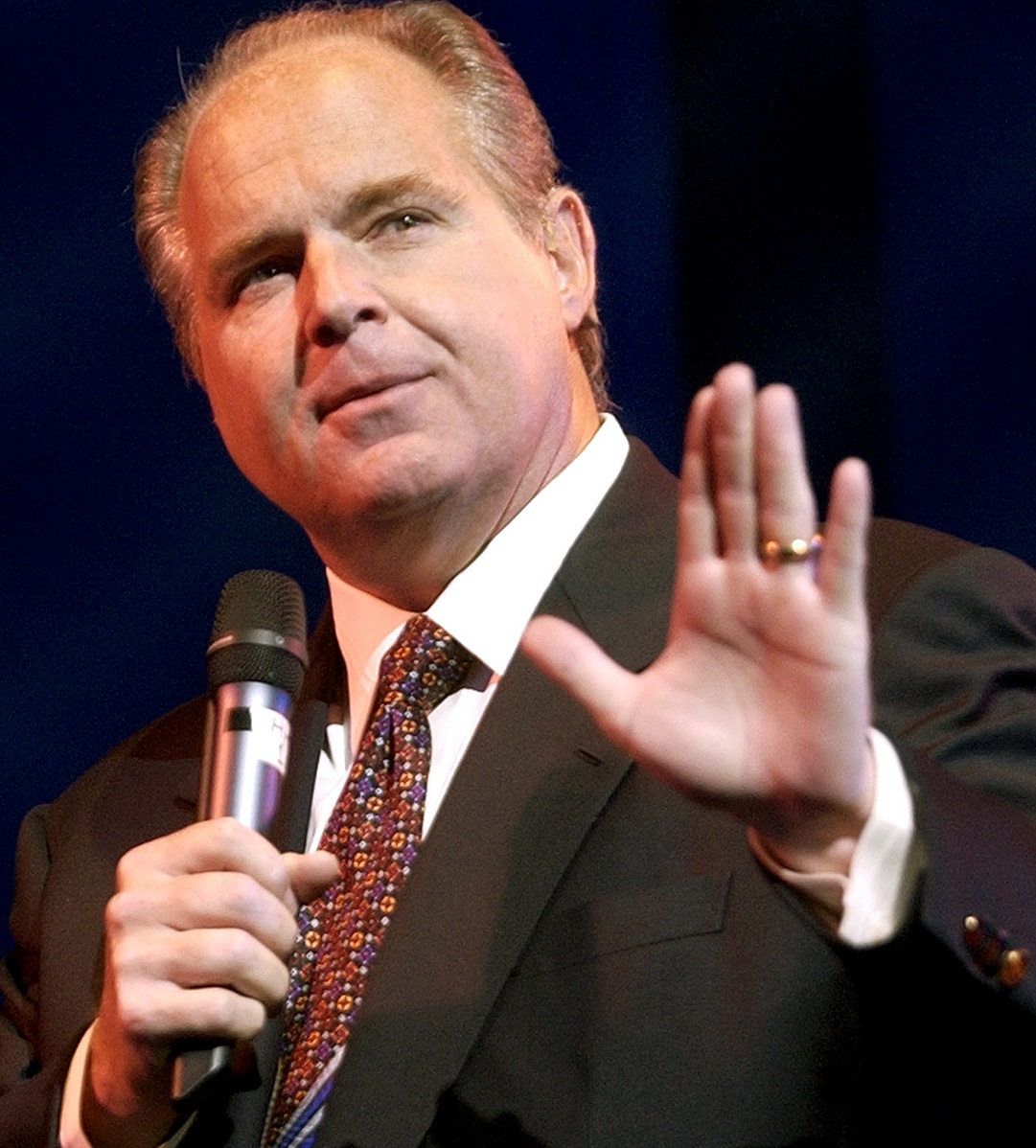

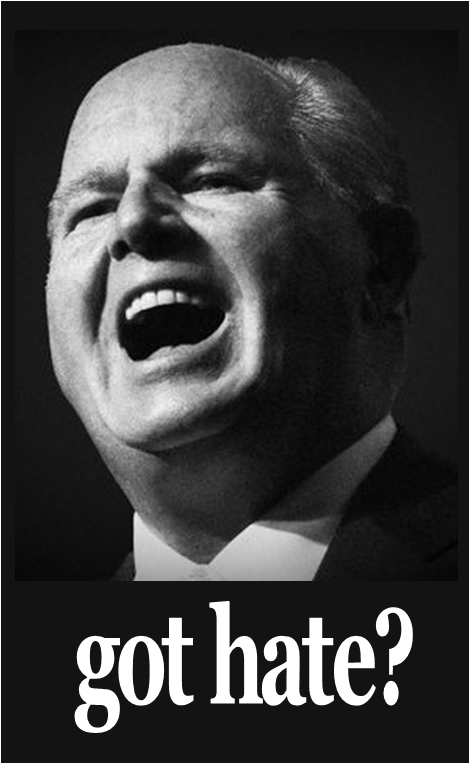
Advocate: Why Should I say Anything Nice About Rush
Limbaugh?
HuffPost: Rush Limbaugh, Bigoted King of Talk Radio,
Dies at 70
Queerty: Homophobic Hypocritical Radio Host, Rush
Limbaugh, Dies
ABC News: Controversial Talk Show Host, Rush Limbaugh
Dies
Advocate: Hateful
Homophobe Rush Limbaugh Dead at 70
Rolling Stone: Rush Limbaugh Did His Best to Ruin
America
Queerty: Rush Limbaugh's AIDS Updates
Limbaugh was the biggest and worst windbag of his
generation, which is to say that of this generation,
Limbaugh was starting to take a backseat to the plethora
of hatemongers who raced in behind him, all attempting
to be the next Limbaugh. Alex Jones, Sean Hannity, Ann
Coulter, Laura Ingraham, the list goes on and on, all
striving to vomit out as much hate as Limbaugh did.
Limbaugh got sick. With lung cancer. It should have been
brain cancer, since his mind was a sieve of slime. And
his mind thought I was out of my mind because I was gay.
All along, he was the one who was sick. It was never me.
Limbaugh hated me. There’s no question about that, and
he’s hated me since he first opened his big mouth to
vomit vile venom about “gays,” “homosexuals,” and every
conceivable and unacceptable descriptor that was me. He
used every word in the vocabulary in his attempt to
diminish me. He was verbose and gross and he used his
disgusting-ness to hammer away at me, and those like me,
as well as women, people of color, even a pre-teen
Chelsea Clinton.
Limbaugh loathed me more than I loathed myself, and he
loathed anyone like me, and he loathed people like me
during the AIDS crisis, when his sickening, repugnant
voice screeched abhorrence to anyone sick with the
disease.


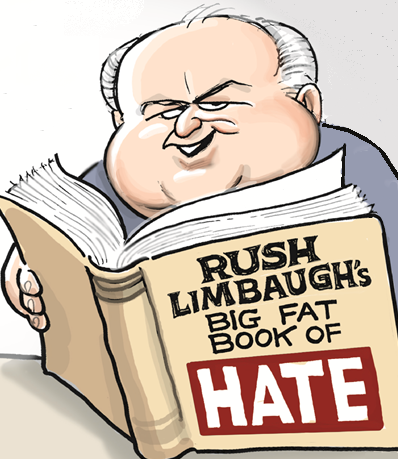
Advocate: Why Should I say Anything Nice About Rush
Limbaugh?
HuffPost: Rush Limbaugh, Bigoted King of Talk Radio,
Dies at 70
Queerty: Homophobic Hypocritical Radio Host, Rush
Limbaugh, Dies
ABC News: Controversial Talk Show Host, Rush Limbaugh
Dies
Advocate: Hateful
Homophobe Rush Limbaugh Dead at 70
Rolling Stone: Rush Limbaugh Did His Best to Ruin
America
Queerty: Rush Limbaugh's AIDS Updates
He did not
speak kindly of the dead during that era. I imagine he
never had a grandmother or anyone with an ounce of
decorum who told him not to speak ill about the
deceased. He was the antithesis of truth and honor. The
anti-Larry Kramer. Limbaugh lied about the disease,
about the supposed decadence, and about the deceased.
Souls and lives didn’t matter to Limbaugh, only
perpetuating falsehoods to score ratings points. And
give him more money to spend on his filthy habits. And
he loved to rile up the emerging Christian right,
gaining fans during the worst days of the AIDS crisis,
like the equally horrific Sen. Jesse Helms and
Congressman William Dannemeyer.
Today, Helms and Dannemeyer’s narrow-mindedness and
evilness would fit in nicely with the current slate of
Senate and House Republicans. That’s why Limbaugh felt
so at home during the Trump administration and with the
new crop of haters in Congress. Limbaugh was free to
push his prejudice, his privilege, and his so-called
manhood.
Limbaugh was married four times, so he was of course the
arbiter about matrimony. He railed against same-sex
marriage. He compared us to pedophiles. Limbaugh said
that the movement for marriage equality was akin to a
movement to normalize pedophilia. How could any of those
four women look at themselves in the mirror every day
while they were married to him when he talked the way he
did? How could they kiss a mouth so full of shit?
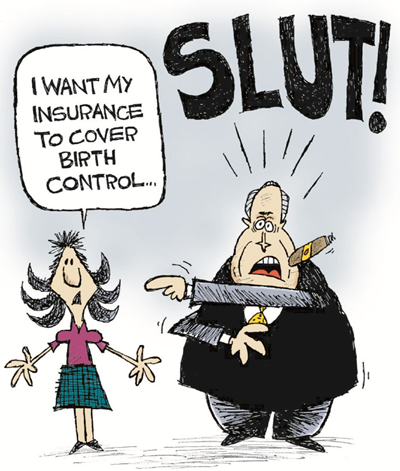
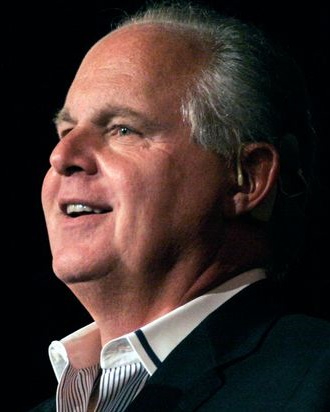
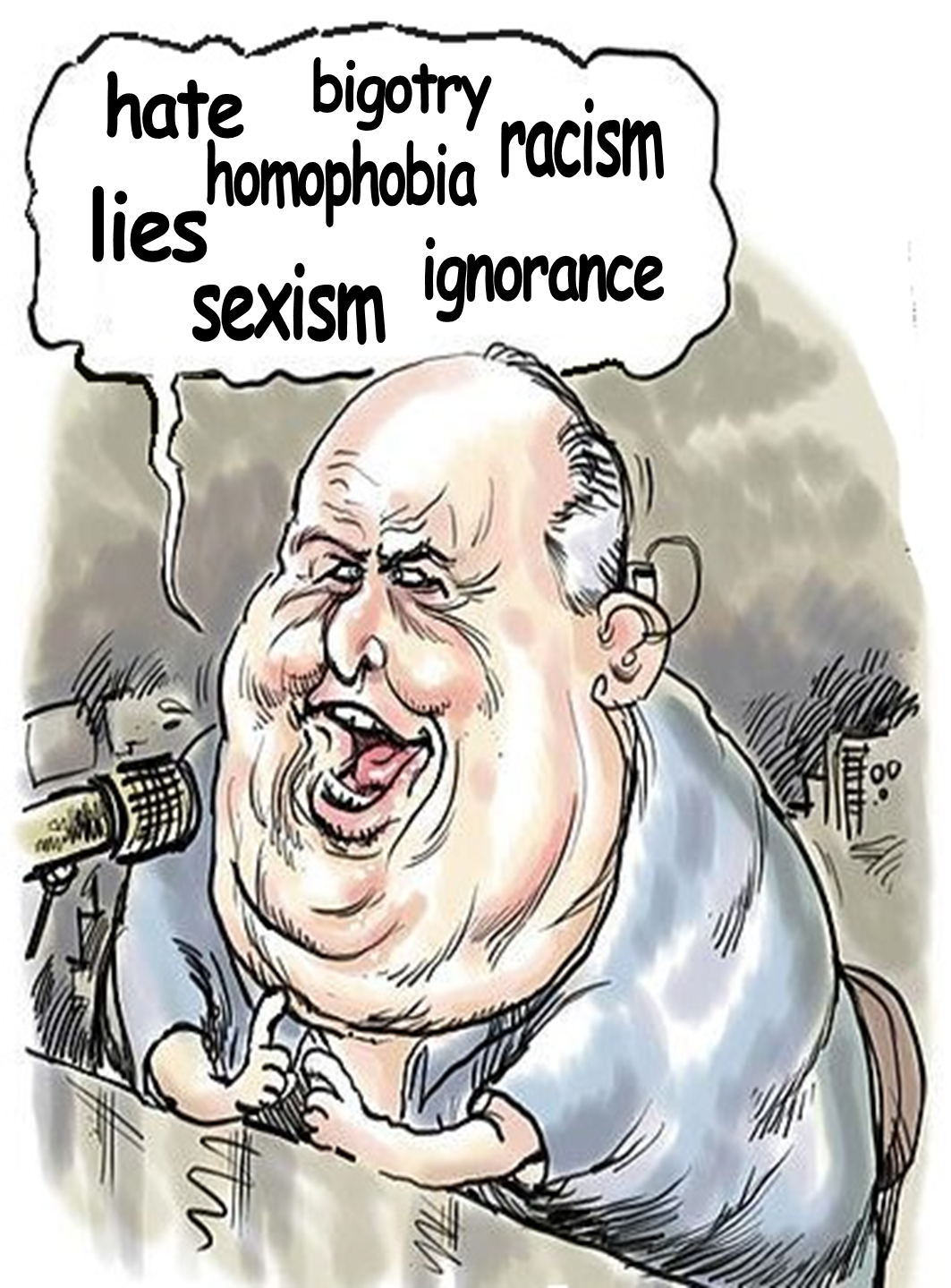
His outer ugliness was only outmatched by his inward
deplorableness and bloated bigotry. Limbaugh was furious
when the Supreme Court affirmed that LGBTQ people were
entitled to protection from employment discrimination.
He who could not be fired, despite all of the
viciousness that emanated from his mouth, despite all
the boycotts of advertisers, despite his utter, open
revulsion for someone like me. Yet he thinks it’s fine
that I can be fired just because of who I love – that’s
a word Limbaugh could never speak He only loved money,
fame, and himself, just like the evil dictator wannabe
he groomed, who now sits in exile in his tacky Florida
mansion.
Sorry, Grandma, I can’t speak kindly about someone who
detested me so much. I can’t say anything nice about
someone whose heart was filled with hate. I can’t think
anything but ugly thoughts for someone who thought I was
disgusting. I can’t recall anything pleasant about
someone who recoiled from decency. I can’t wish the best
for his soul when it was filled with nothing but evil.
Rush Limbaugh, may he not rest in peace.
[Source:
John
Casey | Advocate Magazine | February 2021]
Demi Lovato Comes Out as
Non-Binary
New Survey: 25% of LGBTQ
Youth Use Non-Binary Pronouns
One in Ten Teens Identify
as Gender Diverse
Comic Eddie Izzard Now
Uses She/Her Pronouns
Jesse James Keitel:
Non-Binary Actor Makes TV History
Androgynous: Joan Jett, Miley Cyrus, Laura Jane Grace
Advocate: Half of Gen Z Believes Gender
Binary is Outdated
Celebrities Who Identify as Gender Fluid
Advocate: Lessons for Parents for Gender Nonconforming
Kids
Demi Lovato, Elliot Page, Sam Smith
Identify as Non-Binary
It Feels Very Positive:
Eddie Izzard Now Using She/Her Pronouns
TED Talk: Parenting a Gender Non-Conforming Child
Don't Give Up by Maggie Szabo
The Inauguration
We Can't Enjoy
Celebration tempered with trepidation
This week
we’re inaugurating a president who has received a
historic number of votes, winning by a staggering seven
million. We’re inaugurating a brilliant woman of color
as his Vice President. Together, they have assembled the
most diverse Administration this nation has ever seen,
one that for the first time is beginning to accurately
reflect the nation it will serve and represent.



81 million
Americans should be able to rejoice in these days, but
we cannot. This should be a moment of collective
jubilation, but it isn’t. We should all be exhaling now
but we aren’t able to. We should be celebrating.
But we can’t do that.
We can’t, because the violence generated by an outgoing
president and his complicit party, (who have for the
first time in our history refused a peaceful transition
of power) is so pervasive and threatening, that our
nation’s Capitol is a literal war zone, that state
capitols around the nation are boarded up and closing
down, that there is razor wire around surrounding the
Inauguration, that members of our government are wearing
bullet-proof vests.
We can’t revel in the results of a free and fair
election, in the Democratic process working, in our
shared efforts in this sacred American
experiment—because we’re too busy attending to the PTSD
of watching a less-than-two-week-old mass assassination
attempt by a political party and wondering what horror
is coming next. We’ve endured pre-emptive election
sabotage and post-election recounts and lawsuits and a
failed bloody coup. And still, we aren’t allowed to rest
in those many victories.


The Inauguration We Can’t
Enjoy
Jonathan Capehart's
Commentary: Media's Post Trump Future
The Love: Black Eyed Peas,
Jennifer Hudson, Joe Biden
Evangelicals Made a Bad
Bargain With Trump
CNN: Why Evangelicals
Should Care About Trump's Lies (And Other Sins)
In Gay We Trust: What Do I
Do With This Hate?
All LGBTQ People Should Stand in Solidarity with Black
Athletes
Commencement Address for All Queer College Graduates
Advocate Magazine: Women of the Year
We can’t
enjoy these moments with our friends and our families
and our children, because we’re still trying to process
a group of politicians helping their rabid base plan and
execute a murderous terrorist attack on the Nation’s
Capitol in an effort to kidnap and kill members of
Congress. All because they’re unhappy that their
gerrymandering, voter suppression, and outright
corruption didn’t overcome the votes of the people.
Our arriving joy is tempered by seeing a party still
inexplicably doubling down in the wake of unfathomable
violence, by perpetuating their defeated president’s big
lie; knowing it will surely incite more brutality; that
it is directly placing public servants, law enforcement
officers, and ordinary citizens in harm’s way.



Joe Biden Wins Presidency: LGBTQ Folks Can See the Sun
Again
LGBTQ Leaders: Biden's
Victory and Trump's Defeat
Joe Biden: First President
Entering the White House Supporting Marriage Equality
What Vice President Kamala
Harris Means to Marginalized People
Van Jones on CNN:
Character Matters
Election 2020: Reasons to
be Optimistic
We will not get to have the cathartic, public,
unfettered happiness that his supporters had after the
2016 election and on the day of the 2017 Inauguration,
because they are not able to consent to that; because
they are a people so collectively afflicted with enmity
that they cannot allow it. Denying other people’s joy
and causing them pain is all they understand and all
their president has nurtured in them, and the sole cause
they are truly devoted to.
So, this week we will scrape the BidenHarris2020
stickers off our cars to reduce the chance we will be
assaulted by a stranger, we will hold our collective
breath until the very millisecond the oaths of office
are complete, and we will pray that the violence the
outgoing president and his sycophantic supporters have
trafficked in to this point will not scar this moment
further.

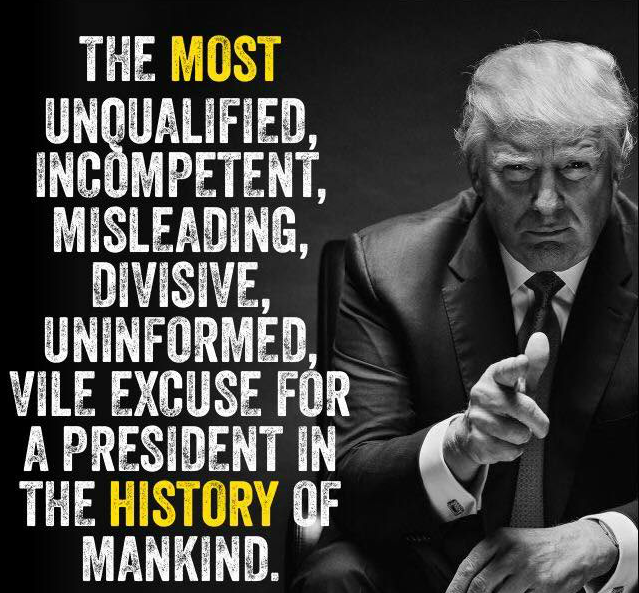

Yes, Joe Biden and Kamala Harris will be sworn in and
they will take office and begin to course-correct this
nation. And yes, in the coming days we will find
ourselves slowly breathing again and gradually welcoming
normalcy and eventually being surprised by the corporate
peace that will come from having human adult leaders
with working empathy again. But we will all have been
robbed of this singular glorious moment to simply feel
lightness again, because the darkness refuses to let us.
This will be a celebration delayed and diluted, and we
will have it. We will see the America that can be rising
up from the America that is. But the fact that more than
81 million of us have to be terrified of our neighbors
right now when we should be simply joyful, is a sad
indictment of the people who voted for this defeated
fraud and of the nation we have become under him.
[Source:
John Pavlovitz | January 2021]
The Inauguration We Can’t
Enjoy
Jonathan Capehart's
Commentary: Media's Post Trump Future
The Love: Black Eyed Peas,
Jennifer Hudson, Joe Biden
Evangelicals Made a Bad
Bargain With Trump
CNN: Why Evangelicals
Should Care About Trump's Lies (And Other Sins)
In Gay We Trust: What Do I
Do With This Hate?
All LGBTQ People Should Stand in Solidarity with Black
Athletes
Commencement Address for All Queer College Graduates
Advocate Magazine: Women of the Year
Good Riddance
Donald Trump
Let's make America kind again
"I feel
like my jaw unclenched after 4 years," somebody posted
on social media. That's how I feel too. I
imagine a collective sigh of relief from decent people
all across the country who are seeing the end of a
nightmare and the dawn of a new day.
While I
was standing in line, a week earlier, at my polling
place, a car drove up. The driver yelled out the window,
"How long have you been waiting?" Someone in line
responded, "Four long years!"
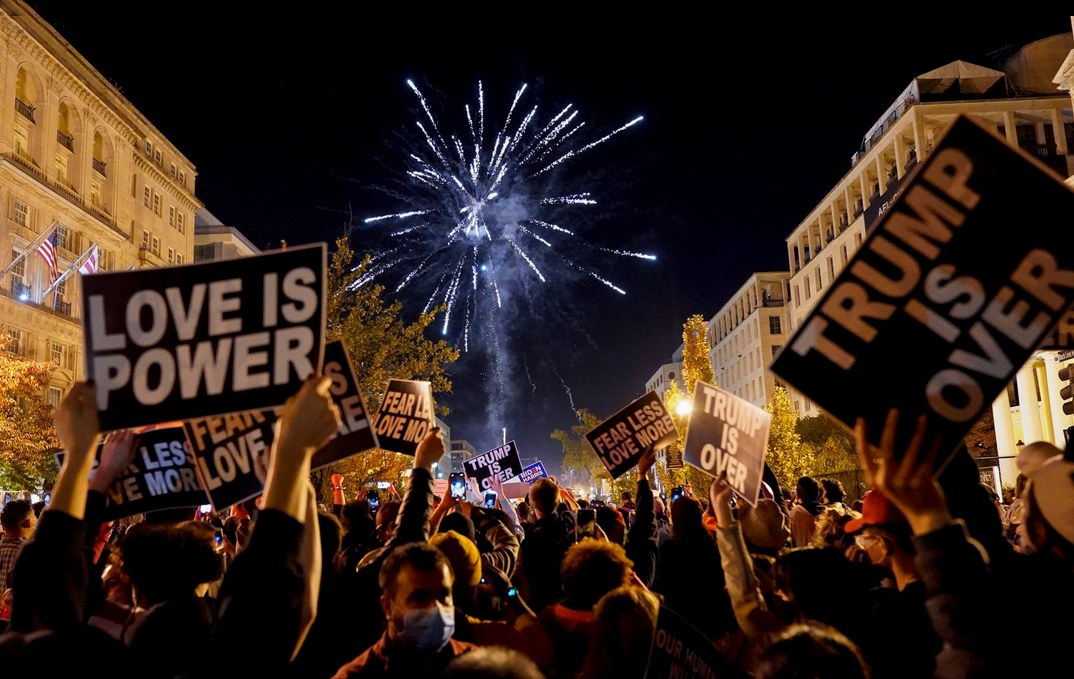


Yes, it
has been four long, miserable, stressful, unbelievable
years! For four years, law-abiding American
citizens were subjected to a daily barrage of lies,
falsehoods, and misinformation. We played host to
the rantings of a mean-spirited, immoral, lawless,
depraved sociopath. We witnessed the shocking
behavior of a narcissistic, self-serving, despotic
madman. He was corrupt and incompetent and totally
lacking in any integrity whatsoever.
For four
years, people have been living on the edge, under the
rule of a president who seemed to know nothing about
governance or leadership, whose poisonous rhetoric sowed
discord and division. His words endorsed hatred
and bigotry and gave comfort to white supremacists and a
range of hate groups. Under the bully-in-chief, bullies
everywhere were empowered to go out and "beat up some
fags." Immigrants, Muslims, Asians, Hispanics, Queers,
and Trans people were routinely harassed.
African-Americans were once again hearing the n-word
tossed about with impunity. The disenfranchised and
marginalized folks in this country have never felt more
fearful, more insecure, more oppressed. Just when
they thought they'd made some progress, and that America
was becoming more accepting and inclusive, suddenly
their rights were being threatened. Again.


Joe Biden Wins Presidency: LGBTQ Folks Can See the Sun
Again
LGBTQ Leaders: Biden's
Victory and Trump's Defeat
Joe Biden: First President
Entering the White House Supporting Marriage Equality
What Vice President Kamala
Harris Means to Marginalized People
Van Jones on CNN:
Character Matters
Election 2020: Reasons to
be Optimistic
And now he's leaving. Good riddance! He has
been fired. He is a loser! One meme that
made its rounds on-line was the phrase, "Live your life
in such a way that the entire planet doesn't dance in
the street when you lose your job." And, yes,
people everywhere are in fact rejoicing! There is
a celebratory feeling in the air! Ding dong, the
witch is dead! Oh happy day! Joe Biden said,
"What we are seeing all over the nation, and in deed
across the world, is an outpouring of joy, of hope, and
renewed faith in tomorrow, to bring a better day."
As one
protest sign exclaimed, "Make America Kind Again!"
After four years, people were getting tired of the
constant incivility, the endless hate speech, the
incessant bullying. Where was the empathy, the
compassion, the kindness? All we were seeing was a
soulless, empty, sad, pathetic, paranoid, petulant man
who did nothing but stir up hate.


The election of Joe Biden, almost as much as the
departure of Donald Trump, signals a restoration of the
confidence we have in the integrity of our leaders. It
gives us hope that decency and honesty will return, that
our country's credibility in the world will be renewed, that the soul
of America will be healed. And perhaps we will
feel safe again.
[Source:
Queernet
| November 2020]
Joe Biden Wins Presidency: LGBTQ Folks Can See the Sun
Again
LGBTQ Leaders: Biden's
Victory and Trump's Defeat
Joe Biden: First President
Entering the White House Supporting Marriage Equality
What Vice President Kamala
Harris Means to Marginalized People
Van Jones on CNN:
Character Matters
Election 2020: Reasons to
be Optimistic
Biden and
Harris: A Vote for Hope and Honor
Kindness and decency returns to the White House
When we
won the freedom to marry for same-sex couples in 2015,
we as legal advocates knew that the fight for true
liberation, equality, and justice was far from over for
the LGBTQ community, especially for our Black, Brown,
and trans brothers and sisters. What we did not imagine
was that five short years later we would see Justices on
the Supreme Court, where we won in Obergefell v. Hodges,
denounce the ruling and openly scheme about how to limit
and undermine this landmark ruling. It is a well-held
principle that once a majority of Justices rule, even if
you were a dissenting judge, you accord that ruling
respect and honor it as settled law.

Joe Biden: First President
Entering the White House Supporting Marriage Equality
What Vice President Kamala
Harris Means to Marginalized People
Election 2020: Reasons to
be Optimistic
Kamala Harris: Why LGBTQ People Should Vote for Biden
Joe Biden's Platform for
LGBTQ Voters
This bedrock norm in a democratic society has been
trashed and abandoned, as have so many of the critical
rules of fair play and free elections in our far too
fragile democracy. The rights we've fought so hard to
win are imperiled and democracy itself is on life
support. The carnage caused and celebrated by the GOP
Senate and the Republican party is disgraceful and we
have a Presidential Administration that despises the
very idea of "Equal Justice Under the Law."
But maybe, just maybe, our long national nightmare is
about to be over. As Americans head to the polls today,
we have a chance to save our democracy and those
fundamental values rights we hold dear by electing Joe
Biden and Kamala Harris. Just writing that sentence
gives me hope and the ability to imagine a policy agenda
marked by humanity, a love for justice, and a belief in
the right of every individual to live with full dignity:
free from harm, cruelty, and suffering.
Can you imagine? In the years and months since the
inauguration of Donald Trump, we have watched with
growing horror and shame as he has embodied the very
worst of the human character. I will not relay the
litany of those characteristics here, there is no need.
We have seen them all every day and the harm done to our
national reputation and psyche is incalculable.
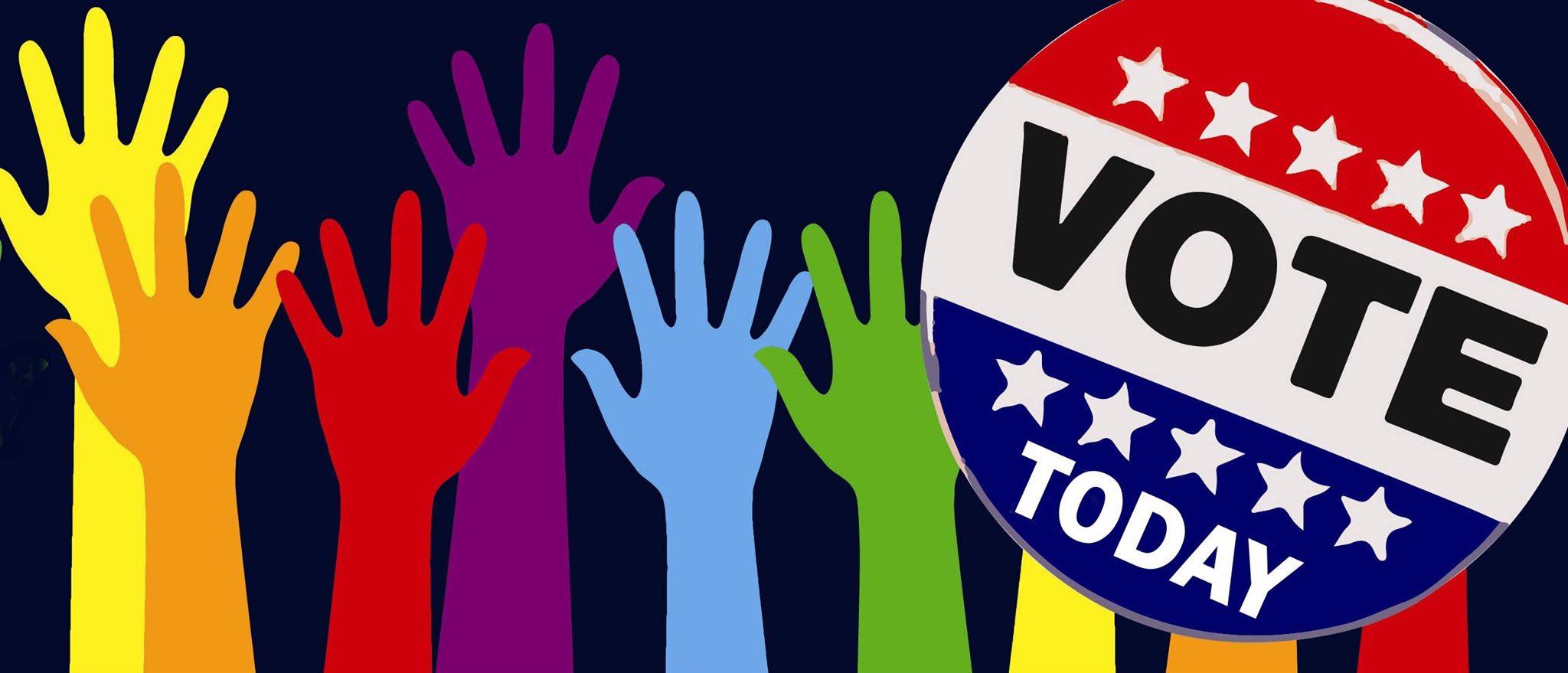

But it doesn't have to be this way. Today, we can chart
a new future and begin the hard work of repairing and
rebuilding. Joe Biden and Kamala Harris are the best of
us. They are honorable, kind, curious, humble,
dedicated, and wicked smart. Together, they embody the
qualities we most want to see in ourselves and love in
others. Of course, it doesn't hurt that they have clear
and doable policy positions on the most urgent needs our
nation and our neighbors face. But to just have kindness
and decency once again emanating from the White House
and to know that we matter to our leaders.
So today, vote. Vote to elect Joe Biden and Kamala
Harris our next President and Vice President of the
United States. Vote like our lives depend on it —
because they do.
[Source:
Kate
Kendall | Legal Director, Southern Poverty Law Center |
November 2020]
50 Years a Scapegoat:
LGBTQ Community Once Again in GOP Crosshairs
Lessons From
Stonewall for LGBTQ People Today
Tyler Oakley: How to Make 2020 Gayer
For a More Perfect Union:
We Need Education and Understanding
Larry Kramer's Loud and
Proud Activism Remains Necessary
John Corvino: What is Morally Wrong With Homosexuality?
Evangelicals
Made a Bad Bargain With Trump
Ring-wing
Christians have not brought anything distinctively
Christian to politics
In public,
Donald Trump has spoken in glowing terms about his
evangelical supporters, calling them “warriors on the
frontiers defending American freedom,” people who are
“incredible” and “faithful,” a bulwark against assorted
moral evils. But behind the scenes, many of Trump’s
comments about religion are marked by cynicism and
contempt, according to people who have worked for him.
Former aides told me they’ve heard Trump ridicule
conservative religious leaders, dismiss various faith
groups with cartoonish stereotypes, and deride certain
rites and doctrines held sacred by many of the Americans
who constitute his base.
Trump “mocks evangelicals behind closed doors,”
Republican Senator Ben Sasse recently told his
constituents. “Can you believe people believe that
bullshit?” Donald Trump said after a 2012 meeting with
pastors who laid hands on him, according to Michael
Cohen, Trump’s former lawyer and confidant. “Those
fucking evangelicals,” the president, smiling and
shaking his head, told GOP lawmakers, according to Tim
Alberta’s book, American Carnage. Trump believed,
Alberta writes, that if he gave them “the policies and
the access to authority that they longed for,” then “in
return they would stand behind him unwaveringly.”
And so they have.

Gay, Straight, Black, White: Love is Love, Right is
Right
Happy New Year: Anxiety and Hope for LGBTQ Americans in
the 2020s
Hope, Wish and Prayer for 2020: Protection for LGBTQ
Americans
Billy Porter: LGBTQ State of the Union
Pride 2019: Historic, Revelatory, Unforgettable
Anderson Cooper: Being Gay is One of the Greatest
Blessings of My Life
How to Be More Out and
Proud in Your Everyday Life
In judging
how each side sees the relationship, let’s start with
the president. A man whose lifestyle is more closely
aligned with hedonism than with Christianity, Trump
clearly sees white evangelicals as a means to an end,
people to be used, suckers to be played. He had
absolutely no interest in evangelicals before his entry
into politics and he will have absolutely no interest in
them after his exit. In fact, it’s hard to imagine a
person who has less affinity for authentic Christianity
(for the teachings of Jesus, from the Sermon on the
Mount to the parable of the Good Samaritan) than Donald
Trump.
But what about evangelicals? How do they view him? Some
have undoubtedly convinced themselves that they have a
faith connection with the president, declaring that
Trump is everything from a “baby Christian” to a
“born-again Christian.” In 2016, James Dobson, a
significant figure in the evangelical political world
for decades, said, “Trump appears to be tender to things
of the Holy Spirit.” Let’s just say Trump has a rather
peculiar way of showing such tenderness.
The less gullible or more cynical evangelicals view
Trump transactionally. Trump may be using evangelicals
to advance his aims, but they are also using Trump to
advance their aims. (Many evangelicals have grown
enamored with Trump’s relentless attacks and aggression,
believing that he is inflicting wounds on those who
deserve to be wounded.) The president might not be a
model Christian in his personal life, they admit, but he
delivers what they want, which is power and influence.


Evangelicals Made a Bad
Bargain With Trump
False Idol: Why the
Christian Right Worships Donald Trump
Why Evangelicals Should
Care About Trump's Lies
Pete Buttigieg Slams
Hypocrisy of Evangelicals Who Support of Trump
In Gay We Trust: What Do I
Do With This Hate?
All LGBTQ People Should Stand in Solidarity with Black
Athletes
Commencement Address for All Queer College Graduates
Advocate Magazine: Women of the Year
The
transaction, from their perspective, is better than they
could have hoped for. Trump has reshaped the federal
judiciary, particularly compared with what would have
happened if Hillary Clinton had been president, and
nothing else Trump has done (no moral line he has
crossed, no offense he has committed) can take away from
his achievements in this area.
But if politically conservative evangelicals have things
they can rightly claim to have won, what has been lost?
For starters, by overlooking and excusing the
president’s staggering array of personal and public
corruptions, Trump’s evangelical supporters have
forfeited the right to ever again argue that character
counts in America’s political leaders. They might try,
but if they do, they will be met with belly laughs. It’s
not that their argument is invalidated; it is that
because of their glaring hypocrisy, they have sabotaged
their credibility in making the argument.
In 1998, during the Bill Clinton–Monica Lewinsky
scandal, the Southern Baptist Convention passed a
“Resolution on Moral Character of Public Officials,”
declaring that it was wrong to “excuse or overlook
immoral or illegal conduct by unrepentant public
officials so long as economic prosperity prevails,”
because “tolerance of serious wrong by leaders sears the
conscience of the culture, spawns unrestrained
immorality and lawlessness in the society, and surely
results in God’s judgment.” It further affirmed that
“moral character matters to God and should matter to all
citizens, especially God’s people, when choosing public
leaders,” and “implored our government leaders to live
by the highest standards of morality both in their
private actions and in their public duties, and thereby
serve as models of moral excellence and character.”
Be it resolved, the document continued, “that we urge
all Americans to embrace and act on the conviction that
character does count in public office, and to elect
those officials and candidates who, although imperfect,
demonstrate consistent honesty, moral purity and the
highest character.”


It turns
out that this resolution, along with the bible verses
that accompanied it, cannot have been based on deep
scriptural convictions, as it was sold to the world. It
has to have been motivated, at least in large part, by
partisanship. It’s quite possible, of course, that many
of its supporters were blind to just how large a role
partisanship and motivated reasoning played in the
position they took. But there is simply no other way to
explain the massive double standard.
The carefully choreographed dance goes like this: Moral
character in public officials matters quite a lot when
the public officials who morally fail are Democrats; it
matters hardly at all when they are Republicans. If it’s
a liberal who has crossed ethical lines, emphasize
righteous conduct; if it’s a conservative, emphasize
forgiveness and verses like “Judge not lest you be
judged.” If it’s Bill Clinton in the dock, savage him;
if it’s Donald Trump, savage his critics.
But the problem goes far beyond an inconsistent
application of a biblical ethic. What the Trump years
have exposed is something more fundamental, which is
that many evangelical Christians have not brought
anything distinctively Christian to politics.


Evangelicals Made a Bad
Bargain With Trump
False Idol: Why the
Christian Right Worships Donald Trump
Why Evangelicals Should
Care About Trump's Lies
Pete Buttigieg Slams
Hypocrisy of Evangelicals Who Support of Trump
In Gay We Trust: What Do I
Do With This Hate?
All LGBTQ People Should Stand in Solidarity with Black
Athletes
Commencement Address for All Queer College Graduates
Advocate Magazine: Women of the Year
One would
hope that people of faith would act differently from
members of political interest groups; that followers of
Jesus would passionately defend human dignity, champion
justice, and create the conditions for human
flourishing, without being co-opted by any political
party or power structure. One might expect that they
would care for the weak and the vulnerable, including
the unborn and those living in the shadows of society;
promote ordered liberty, empathy, and compassion,
especially toward those viewed as social outcasts and
aliens (one of the most striking features of the
ministry of Jesus); and speak out, time and time and
time again, if necessary, against political leaders and
presidents, including those who advance a political
agenda they believe in, if those leaders are cruel,
pathologically dishonest, and lawless, and if they
dehumanize their enemies. To reduce this to a single
sentence: People of faith should embody moral and
intellectual integrity.
I’ve argued that the Trump-evangelical alliance has
inflicted enormous damage on the Christian witness in
America, particularly among Millennials and Gen Z.
Unfortunately, the stories keep pouring in. I was
recently told by a friend that in 2018 he met with a
group of students from a leading evangelical college. He
reported that all of them had turned against the term
evangelical because of the way evangelicals were
engaging in culture and politics during the Trump era.
This account reflects what James Astill, a reporter with
The Economist, told me three years ago. Astill met with
students on the campus of the same school. “Most of them
said they were less willing to be identified, by the
world at large, as evangelicals,” he told me, “because
they were so sickened by the identification of
evangelicals with Trump.”


A few weeks ago, a person in Christian ministry told me
in pained and poignant terms that he’s been counseling
scores of younger evangelicals who are on the edge of
leaving their faith and scores more who actually have
lost their faith because they have been so unsettled by
what they have witnessed during the Trump years.
It’s fine to say to young people that they shouldn’t
judge Christianity based on the actions of flawed
Christians or the reckless statements and misconduct by
those who are in positions of leadership, because the
acid test of Christian faith is who Jesus was. But that
argument, while valid, goes only so far. Because the
truth is that people, certainly outside the faith but
also within it, do judge the merits of Christianity on
the conduct of Christians and Christian leaders. We are
social beings at our core; we find fulfillment and
meaning in associating with others. So it’s a real
problem if people see a narrative unfold—even if it’s an
incomplete narrative, even if it’s one that doesn't
fully represent the diverse and nuanced views of tens of
millions of evangelicals in America—and their reaction
is: Look, I don’t want to be a part of that group. It’s
self-righteous, it’s judgmental and ungracious, it’s
angry and arrogant, and it’s just not something I want
to be a part of.
This doesn’t mean Christians who vote for Donald Trump
are committing a mortal or venial sin. It doesn’t mean
they don’t have a case that deserves to be heard. It
doesn’t mean they don’t have legitimate concerns or that
they haven’t been on the receiving end of condescending
attacks. And it certainly doesn’t mean Trump supporters
can’t be fine people doing wonderful things in different
areas of their lives.
But if evangelical supporters of Trump are honest, they
should admit (at least to themselves, if not to the rest
of the world) that something has gone terribly amiss and
that the power they have achieved is coming at the
expense of the faith they proclaim. Jerushah Duford, the
granddaughter of Billy Graham, said that Trump’s
"attempt to hijack our faith for votes, and the
evangelical leaders’ silence on his actions and
behavior, has presented a picture of what our faith
looks like that’s so erroneous, it’s done significant
damage to the way people view Jesus.”
[Source:
Peter Wehner | The Atlantic Magazine | October 2020]
Evangelicals Made a Bad
Bargain With Trump
False Idol: Why the
Christian Right Worships Donald Trump
Why Evangelicals Should
Care About Trump's Lies
Pete Buttigieg Slams
Hypocrisy of Evangelicals Who Support of Trump
In Gay We Trust: What Do I
Do With This Hate?
All LGBTQ People Should Stand in Solidarity with Black
Athletes
Commencement Address for All Queer College Graduates
Advocate Magazine: Women of the Year
In Gay We Trust: What Do I Do With This Hate?
Hate blocks joy and clouds judgement
The list of things I am furious about is long: over
200,000 Americans dead from COVID-19, the total
disruption of our lives, the ruin of businesses, the
cataclysmic unemployment rate, families separated at the
border, the all-out war on the LGBTQ community,
withdrawal from the Paris Agreement, giving voice and
power to white supremacy, erasing the separation of
church and state, the lying, undermining science, the
consistent reinforcement of the police state, the demise
of our democracy, voter suppression, destabilizing our
institutions and the vilification of the press. But what
I am most furious about is how much hate I find I am
capable of. How much hate has grown inside me since 2016
where it never existed before. The haters were them, not
me, not us.
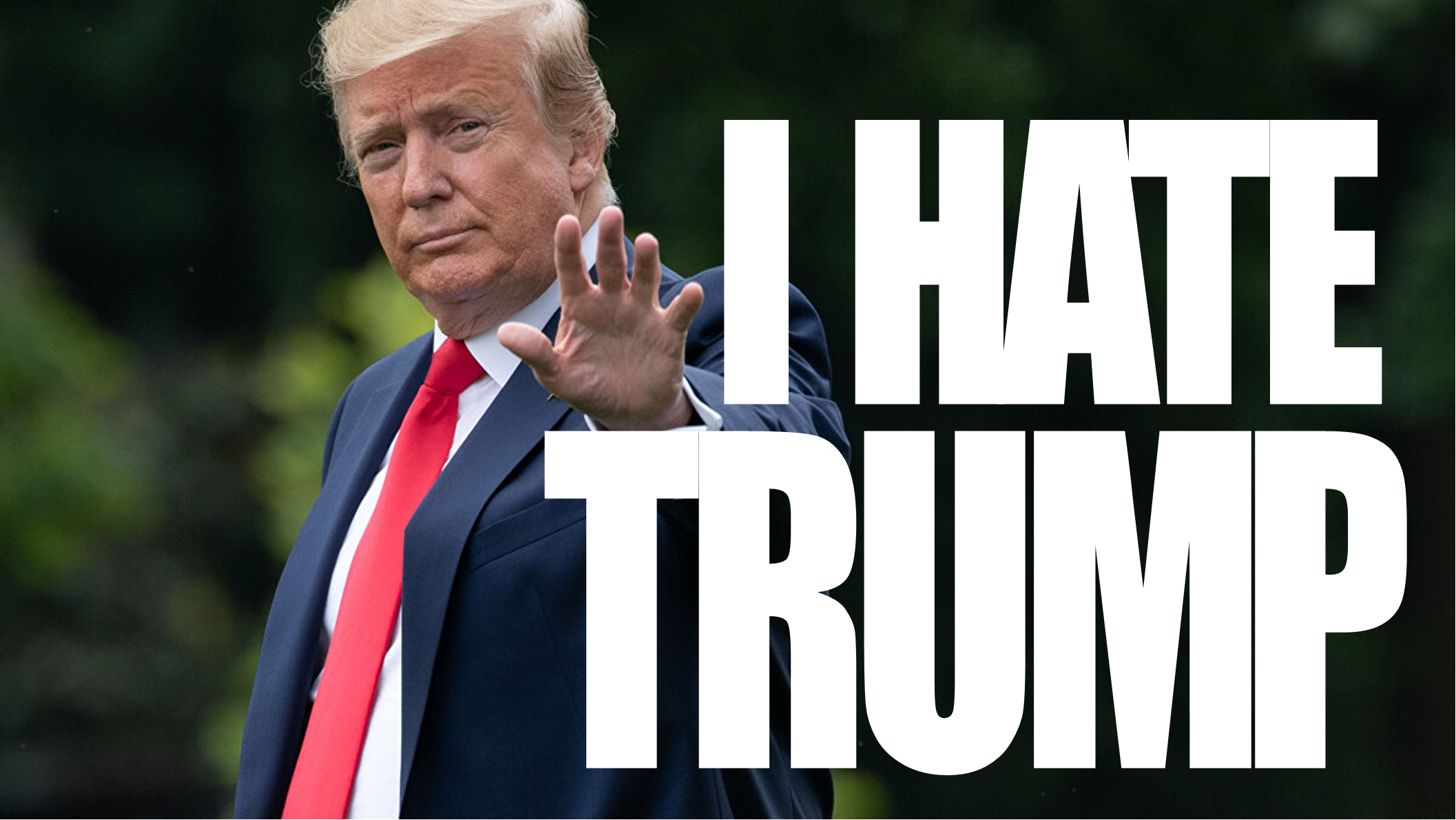
I hate Donald Trump. When I was younger, I wasn’t
allowed to even say the word hate. If I told my mother I
hated a classmate or teacher, she’d always say, “Hate is
a strong word, you don’t hate anyone.” And I really
didn’t. Now she hates too, and I hate that.
I hate Mitch McConnell. I hate Kellyanne Conway. I hate
William Barr. What do I do with all this hate I feel?
Up until now I have always put my anger into action. I
have taken to the streets, marched on Washington, called
my representatives, organized. And I will continue to.
But who do I give all this hate back to? I don’t want
it. It doesn’t serve me. My hate is taking up too much
of my time and energy.
I hate the 63 million people who voted for Donald Trump.
I hate James Comey. I hate undecided voters.
I have been separated from my elderly parents for going
on seven months. I haven’t seen my siblings for that
long as well. My older son’s college classes are remote,
our 4-year-old wears a mask at school all day and gets
his temperature taken before walking into class.




In Gay We Trust: What Do I Do With This Hate?
One Man's Story: Coming Out to Barbara Bush
Bathroom Bully: Punish, Suspend, Expel Trump
Ginsburg and Lewis: Channel Your Devastation Into
Motivation
2020 Election: It's About Survival
I hate Betsy DeVos. I hate Susan Collins. Hate causes
us to be unable to sleep, nor plan for the future. It
curtails curiosity. It spoils our fantasies, replacing
imagined exultation with more sinister desires. Hate is
insidious. It’s a disease that takes over entirely. It
changes how we see, instilling in us a willful
blindness. It’s bitter, it blocks joy, clouds judgment,
and is painful. It literally hurts my body to hate this
much.
I hate cis straight white Southern Republican men. I
can feel hate’s opportunistic infections growing in me
as well – suspicion and mistrust. Now we start with hate
and have to be convinced not to. Even with those with
whom we agree, we mistrust them if they don’t agree as
fervently or ascribe to the same solutions. Hate makes
us constantly loaded for bear.
Our side uses weapons of hate too. We have our own
vigilante justice creepily called canceled. Mistakes are
no longer recoverable. Now they are the trigger to a
public execution. Our hate causes us to be unforgiving.
We’ve become bandits. Robbing people of the chance at
redemption and robbing ourselves of the epic experience
of forgiveness. I don’t want to live in a world devoid
of forgiveness and redemption.

I hate our country. If hope is the antidote to despair,
what is the antidote to hate? Don’t kid yourself, it
isn’t winning an election. Even if hate gets us back
into power, we must not, like them, use it as our
governing ethos. We see the havoc that wreaked.
Hate’s remedy is faith. I see that my own faith has
diminished exponentially to the rise of hate in my
heart. I don’t mean religious faith, which too often is
perverted to justify animus, but the faith that being
good is our purpose in and of itself. I need to restore
my faith that there is right from wrong. That truth and
facts matter. Faith that our collective good is how we
enrich ourselves. Faith that ideas, like currency, are
meant to be exchanged. Faith in each other. Faith in
common purpose.
We have a lot of work to do to right what is wrong, to
fix what’s been broken by a group of people who hate
like it’s a cherished fetish. But after four years of
this, after 2020 when everything seems to have been
ruined, I won’t let them ruin me too. I won’t be left
when this is all over with this much hate in my heart.
Hopefully, by using my time and energy to renew my faith
I will return to believing as Anne Frank remarkably did,
“In spite of everything, I still believe that people are
really good at heart.”
[Source:
Richie Jackson | Advocate Magazine | September 2020]
In Gay We Trust: What Do I Do With This Hate?
One Man's Story: Coming Out to Barbara Bush
Bathroom Bully: Punish, Suspend, Expel Trump
Ginsburg and Lewis: Channel Your Devastation Into
Motivation
2020 Election: It's About Survival
50th Anniversary: Open Letter to Young LGBTQ People
Celebrating a
legacy of survival and strength
Dear LGBTQ young people! Welcome to Pride as it began
this time 50 years ago — a protest driven by our
community speaking out against the impacts of
oppression, inequality, and violence. As LGBTQ and HIV
advocates, it is our responsibility to link arms with
those in Minneapolis and across the country who are
speaking out against structural racism and white
supremacy. The fights in our streets today are the very
spirit and essence of how Pride began.
On June 28, 1970, thousands of LGBTQ people took to the
street to mark the anniversary of the Stonewall riots.
That first Pride parade was born from protest and anger,
a response to violence that disproportionately targeted
Black, Brown, and transgender lives.
And throughout the 1980s and 1990s, LGBTQ people rose
out of grief and despair and demanded what was needed to
save our lives. The strides we have made in fighting the
HIV epidemic would not be possible without HIV advocates
taking to the streets and screaming their truth to those
in power.
Fifty years after the first Christopher Street parade,
the Supreme Court this very month finally recognized
that our people deserve protection from discrimination
at work. We celebrate that ruling.
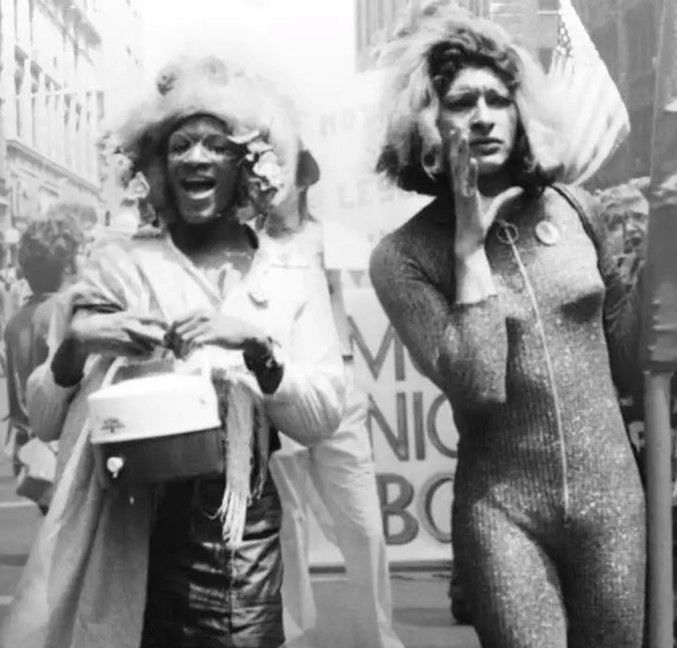
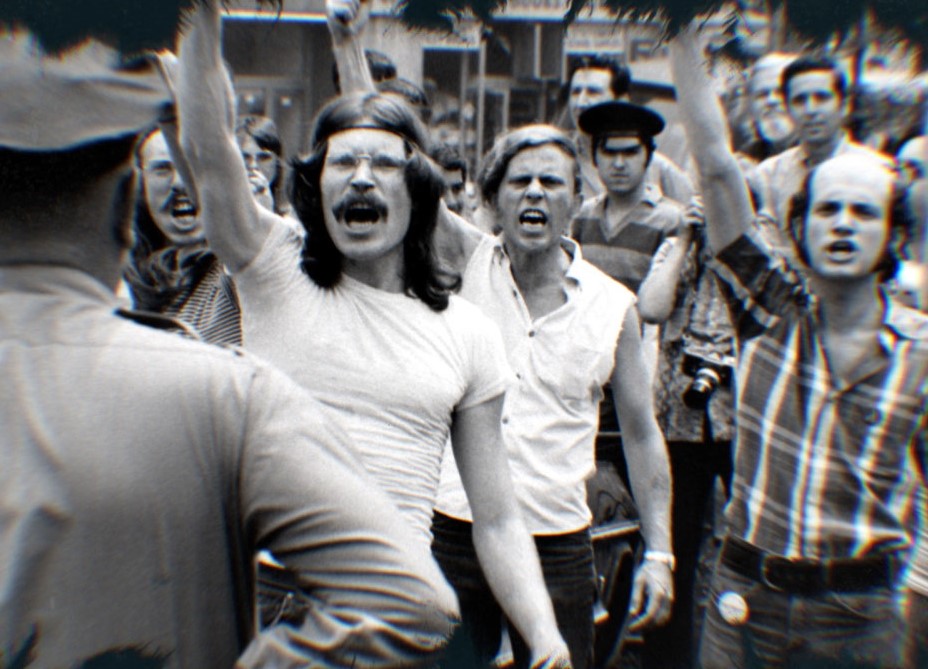
Open Letter to Young LGBTQ People on This Historic
Occasion
LGBTQ People Have Been Marching Every June for 50 Years
In Gay We Trust: How to Have Pride in a Pandemic
50th Anniversary: The Revolution May Have Finally
Arrived
Happy Pride: What Do We Have to Be Proud Of?
Evolution of the Gay Pride Parade
Lessons From Stonewall for LGBTQ People Today
Celebrate Pride With LGBTQ Celebrities
Yet, we have more fighting still to do to assure our
right to survive. Our progress as LGBTQ people and
people living with HIV has always depended upon our
willingness to put our bodies and livelihoods on the
line to stand up to the unjust and discriminatory
systems that neglect us. Like the recent monumental
Supreme Court decision protecting LGBTQ workers from
discrimination, we know that change only comes through
struggle.
The structural inequalities and racist systems that led
to George Floyd’s death by law enforcement are the same
ones that are responsible for the obscenely high death
rates from COVID-19 in Black and Brown communities in
this country. They are the same systems that have
created a disproportionately Black and Brown HIV
epidemic in America.
Pride has always been about speaking out for our right
to live and to thrive. We see Pride in the thousands of
LGBTQ people that have taken to the streets to declare
that Black lives matter. We see Pride in creative and
virtual ways LGBTQ people are making to stay connected
and support each other. We see Pride in every HIV test
and prescription for PrEP that will help stop a new case
of HIV.
Our community’s Pride and your legacy are not just one
of survival but of strength. The Centers for Disease
Control and Prevention’s “Let’s Stop HIV Together”
campaign rightly focuses on how our connectedness builds
the strength we need to survive and thrive. And when one
of us is not surviving or thriving our Pride is not
complete.
Pride not only celebrates who we are, it lifts up all
within our community who are at-risk and that others
shun and ignore. Pride is for LGBTQ people who are
Black, Indigenous, and people of color; those of us who
are neurodivergent, deaf and hard of hearing, blind and
visually impaired or living with a physical disability;
HIV-positive and HIV-negative, those of us who aromantic
and asexual, people of faith, youth and elders
—
and so many more of us who live at the intersection of
multiple identities — and who want so much to live with
Pride. Pride is a celebration of everything that makes
us different but also everything that makes us stronger.
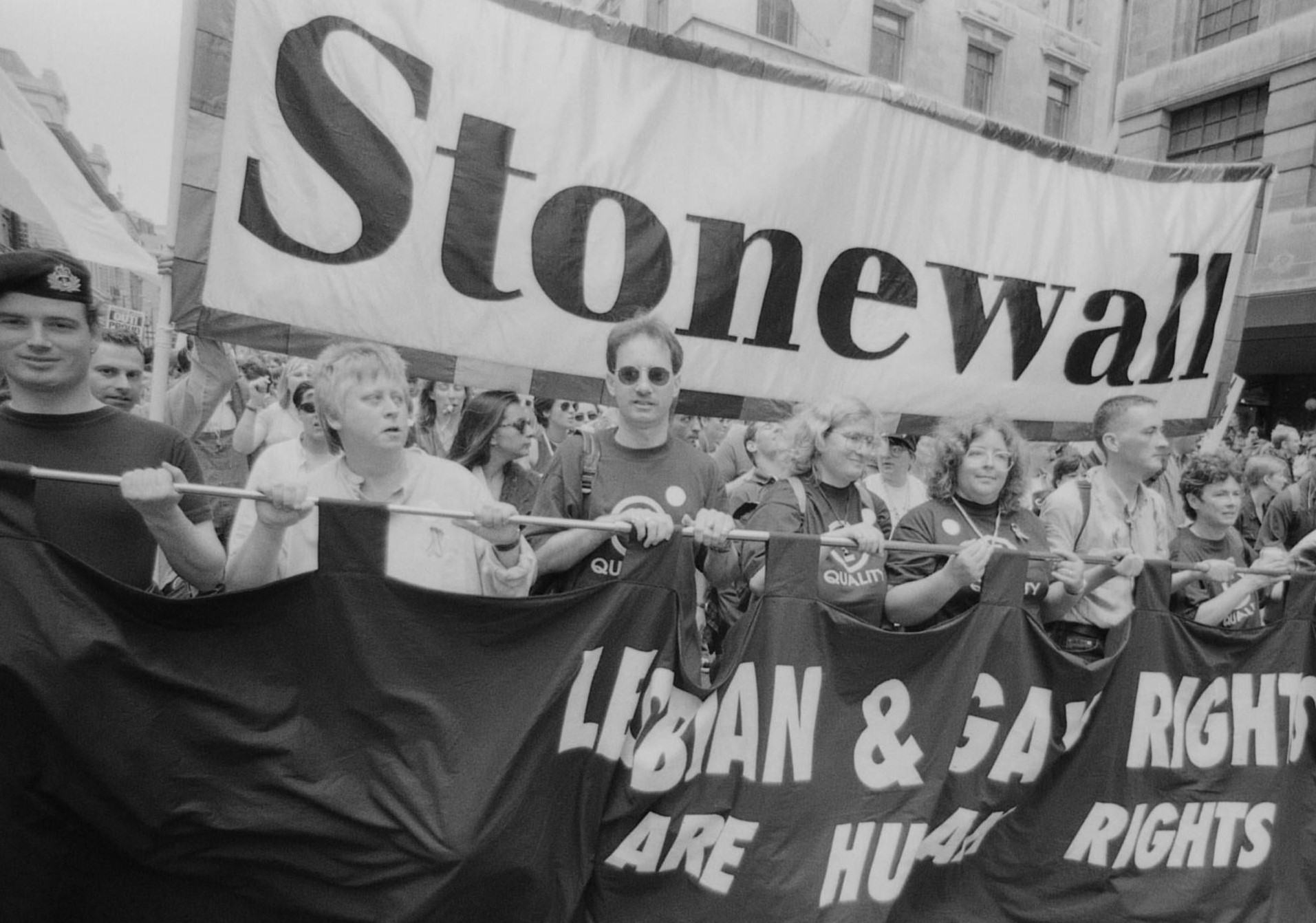

We take Pride in how we’ve survived, and we take Pride
in how we continue to show up and speak out when one of
us is under attack. We take Pride in believing we will
get through this pandemic together too. We hope you find
opportunities to learn from elders and long-term HIV
survivors about how we have fought, but also that you
teach us about your stories and where you see our
future.
Our history is being made by you every day. We see you
leading us with our passion and conviction for a world
that we couldn’t even imagine when we were your age. And
while we set a foundation, you are building a vision of
queer liberation that is truly scraping the skies. Some
of you have only just graduated high school and are
blazing a trail we are humbled and honored to walk with
you.
Together we can lean on the strength of our past and on
the resilience you bring as we continue fighting against
racism, stigma, discrimination, inequality and HIV in
these times of COVID-19. Together we will achieve queer
liberation for all, to be able to live lives that we
deserve, to be our authentic selves with our families of
choice. Because this Pride was the first page of the
next chapter in our story.
[Source:
Rea Carey, Executive Director, National LGBTQ Task
Force | Jesse Milan Jr, President & CEO, AIDS United |
June 2020]
Open Letter to Young LGBTQ People on This Historic
Occasion
LGBTQ People Have Been Marching Every June for 50 Years
In Gay We Trust: How to Have Pride in a Pandemic
50th Anniversary: The Revolution May Have Finally
Arrived
Happy Pride: What Do We Have to Be Proud Of?
Evolution of the Gay Pride Parade
Lessons From Stonewall for LGBTQ People Today
Celebrate Pride With LGBTQ Celebrities
Hope, Wish, and Prayer for 2020
Protections for all
LGBTQ Americans...
Amid all the darkness, our community could get some very
good, and necessary, news
As a previously long-closeted lesbian who has found so
much joy in living openly later in life, I know what it
feels like to live in fear of harassment and
discrimination. As a spiritual person, I’m praying the
Supreme Court does the right thing and affirms that all
LGBTQ people should be able to work hard and support
themselves and their loved ones without fear of
harassment or discrimination at work. If the Supreme
Court issues a positive ruling for the plaintiffs of the
three LGBTQ workplace discrimination cases it heard
recently and is currently deliberating, it will be a
huge relief for people like me.
When I was growing up in the 1950s and 1960s, my family
was not accepting of LGBTQ people. When I heard about
gay people, it was in the context of a mean-spirited
joke. In high school, I began to realize I liked girls
in high school, but I didn’t date at all through
college. After college, I came out to my mother as a
lesbian. She paid for me to see a counselor who
attempted to “fix” me. After two sessions, I refused to
keep going to those meetings. I continued to be engaged
with a Baptist church into the 1980s, though I still
wasn’t out as a lesbian there. Regardless, someone at
church identified me as “possibly gay” and I was asked
to leave the church.


Happy New Year: Anxiety and Hope for LGBTQ Americans in
the 2020s
Hope, Wish and Prayer for 2020: Protection for LGBTQ
Americans
Pride 2019: Historic, Revelatory, Unforgettable
How to Be More Out and Proud in Your Everyday Life
The World's Happiest Countries Protect Their LGBTQ
Citizens
In 1995, I was ordained while serving at an open and
affirming parish in Houston, where I was on staff for 15
years. Finally, this was a spiritual home where I could
flourish enough to come out to my extended family and
marry the love of my life in the church. I was elated to
make our marriage legal in the eyes of the state shortly
after the Supreme Court ruled that marriage equality was
legal in 2015.
But having the right to marry doesn’t alleviate the
overarching injustice that remains. In 30 states across
the nation, an LGBTQ person may marry on Sunday, with
the blessing of the Church and State, and still be fired
on Monday, lose their housing, or be refused services at
public places like a hotel or coffee shop, simply
because of their sexual orientation and who they love.
This more than pains me.
Throughout my life it has been my faith that’s directed
self-acceptance. It’s heartbreaking that many churches
throughout history have used the Bible and the church as
an institution to exclude people of color like me, women
in general, and LGBTQ people, from leadership and full
acceptance. My understanding is that God’s love and the
Golden Rule teach us that we are all equal, and that God
expects us to treat each other with mutual love and
respect.
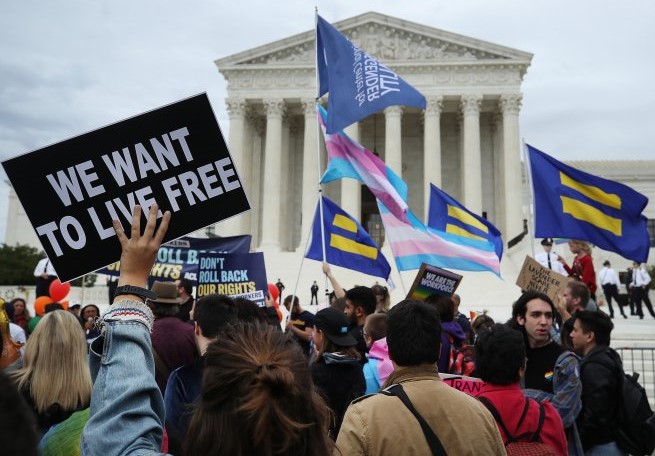

Church Offers Free Mom Hugs at Pride Parade
Why Opinion Changed so Quickly on Gay Marriage
New Kind of Prom Date
Back in the Closet: Hiding My Sexuality After Coming Out
Should US Become a Christian Theocracy?
What I learned When I Came Out as Queer After a Hetero
Breakup
To me, nondiscrimination is a simple matter of fairness
and equal protection under the law. If I’m paying my
taxes, serving my community, and not breaking laws, the
law should protect me. Unfortunately, not only is there
no federal law that provides explicit nondiscrimination
protections, my home state of Michigan like many others
also has no express statewide protections against
discrimination for LGBTQ people either.
If the states cannot do right by LGBTQ people by passing
statewide protections, it becomes paramount that the
federal government step in and ensure that all are
protected in the workplace, in housing, and in other
public places. I fear that if the Supreme Court doesn’t
do the right thing, their ruling will be taken by many
as a license to increase discrimination against LGBTQ
people. We must do all we can to prevent institutional
inequality and secure comprehensive protections as
quickly as possible. Lets commit to the Golden rule in
2020 and support full protections to all, including
LGBTQ people.
[Source:
Rev Carolyn J. Mobley Bowie | Metropolitan Community
Church | Jan 2020]
Happy New Year: Anxiety and Hope for LGBTQ Americans in
the 2020s
Hope, Wish and Prayer for 2020: Protection for LGBTQ
Americans
Pride 2019: Historic, Revelatory, Unforgettable
How to Be More Out and Proud in Your Everyday Life
The World's Happiest Countries Protect Their LGBTQ
Citizens
Church Offers Free Mom Hugs at Pride Parade
Why Opinion Changed so Quickly on Gay Marriage
New Kind of Prom Date
Back in the Closet: Hiding My Sexuality After Coming Out
Should US Become a Christian Theocracy?
What I learned When I Came Out as Queer After a Hetero
Breakup
I Loudly Endorse the Equality Act
I stand for family and fairness, without room for
discrimination of any kind
The conversation about LGBTQ equality is one of the most
important conversations in our country today. Thirty
states still lack explicit, comprehensive protections
for LGBTQ people from discrimination. And federal
protections are at risk of being stripped by the US
Supreme Court. No one should have to live in fear of
discrimination or humiliation simply because of who they
are, and that includes our LGBTQ neighbors.
That’s why I’m proud to join the national Mayors Against
LGBTQ Discrimination coalition alongside more than 350
other mayors from all 50 states who share the same
values as me, reflecting the nearly 69 percent of
Americans from all walks of life who favor LGBTQ
nondiscrimination laws.
As mayors, we’re obliged to do our part to build
understanding within ourselves, among our constituents,
and in solidarity with other elected officials about the
harms of treating people differently for being LGBTQ.
Keeping our communities welcoming is a core part of our
jobs. The motto of my city Norman, Oklahoma, is
“Building an Inclusive Community,” and our attitude as
well as our ordinances should reflect that spirit. We
need to take care of all our residents and ensure that
they can earn a living, provide shelter for their
families, and safely go about their daily lives, with no
exceptions.

Alicia Keys: We Need More Expressions, Less Labels
The Atlantic: Gay Rights Have Already Been Won
LGBTQ Elders Share Their Thoughts About Today's Queer
Youth
TED Talk: Preacher's Kid, Football Player, and Gay
The World's Happiest Countries Protect Their LGBTQ
Citizens
Respectability Politics: Can You Be Too Gay?
As an Oklahoman, I know my state and residents stand for
family and fairness, without room for discrimination of
any kind: the real Oklahoma standard. I’m proud that
this past summer, the Norman city council enacted our
state’s first LGBTQ nondiscrimination ordinance to
update our existing civil rights law and ensure that
none of our residents can be fired, denied housing, or
turned away from a business for being LGBTQ.
That step was a long time coming. Twenty states and more
than 250 cities already have similar laws prohibiting
LGBTQ discrimination, many of which have been in place
for decades without any negative consequence. And nearly
90 percent of Fortune 500 companies have LGBTQ-inclusive
nondiscrimination policies. Being inclusive and treating
LGBTQ people fairly is not only the right thing to do —
it’s essential for our economy’s bottom line and to
build the strongest communities possible.
Standing with LGBTQ people is more important now than
ever. Oral arguments just took place in October in three
cases currently pending before the US Supreme Court that
ask the core question of whether our nation’s civil
rights laws include LGBTQ people. In each case, workers
were fired for being gay or transgender. With a ruling
expected in the next few months, the Supreme Court has
the opportunity for the first time to affirm that all of
us (including LGBTQ workers) should be treated with
dignity and respect. Dozens of lower courts and federal
agencies have already agreed that Title VII of the Civil
Rights Act of 1964, which prohibits sex discrimination,
includes LGBTQ people.


Tim Cook to LGBTQ Youth: You Are a Gift to the World
Music Video: Don't Give Up by Maggie Szabo
TED Talk: Why We Need Another Coming Out Story
Lonely Dudes: Men Are Having a Friendship Crisis
Trump's Military Ban Ignores Science to Inflict Harm
Church Offers Free Mom Hugs at Pride Parade
Why Opinion Changed so Quickly on Gay Marriage
But no matter how the Supreme Court rules, our work
continues. The best way to ensure lasting protections
that cannot be overturned by a court or newly elected
legislature is to pass federal legislation like the
Equality Act, which would prohibit discrimination
against women and LGBTQ people in virtually every area
of life. Until that happens, Norman will lead in
Oklahoma with ordinances and protections of our own.
LGBTQ nondiscrimination laws are fueled by a basic
promise all Americans make to treat each other the way
we want to be treated. We can all agree that anyone who
works hard, meets their responsibilities, and does the
right thing shouldn’t have to worry about
discrimination. Basic fairness shouldn't depend on which
company a person works at or in what zip code they live.
I hope the growing majority of Americans who agree will
urge their lawmakers and local officials to correct this
wrong.
While I might have a bias, I believe local government is
the most important level of government, because it
directly impacts residents in their everyday lives and
can affect change much faster than state or federal
government. I urge you to get engaged. Know your locally
elected officials, visit your City Hall, and apply to
serve on a local board or commission. We don’t have to
wait on higher levels of government to make a difference
in the lives of our family, friends, and neighbors. Join
us in strengthening our nation by participating in the
foundational level of our democracy: the American city.
[Source:
Breea Clark | Mayor of Norman, Oklahoma | Jan 2020]
Alicia Keys: We Need More Expressions, Less Labels
The Atlantic: Gay Rights Have Already Been Won
LGBTQ Elders Share Their Thoughts About Today's Queer
Youth
TED Talk: Preacher's Kid, Football Player, and Gay
The World's Happiest Countries Protect Their LGBTQ
Citizens
Respectability Politics: Can You Be Too Gay?
Tim Cook to LGBTQ Youth: You Are a Gift to the World
Music Video: Don't Give Up by Maggie Szabo
TED Talk: Why We Need Another Coming Out Story
Lonely Dudes: Men Are Having a Friendship Crisis
Trump's Military Ban Ignores Science to Inflict Harm
Church Offers Free Mom Hugs at Pride Parade
Why Opinion Changed so Quickly on Gay Marriage
2020 Election Will Be Most Important to LGBTQ Citizens
There is no greater opportunity to make change
For lesbian, gay, bisexual, transgender and queer
(LGBTQ) people and our allies, the 2020 presidential
election will be the most important election of our
lives. Over the last two years, the Trump administration
has rescinded key protections for transgender students,
appointed two new anti-equality justices to the US
Supreme Court, banned transgender troops from serving
openly in the military, and repeatedly pushed policies
that would open the door to discrimination against LGBTQ
people in healthcare, housing, public accommodations and
other aspects of life under the guise of "religious
liberty."
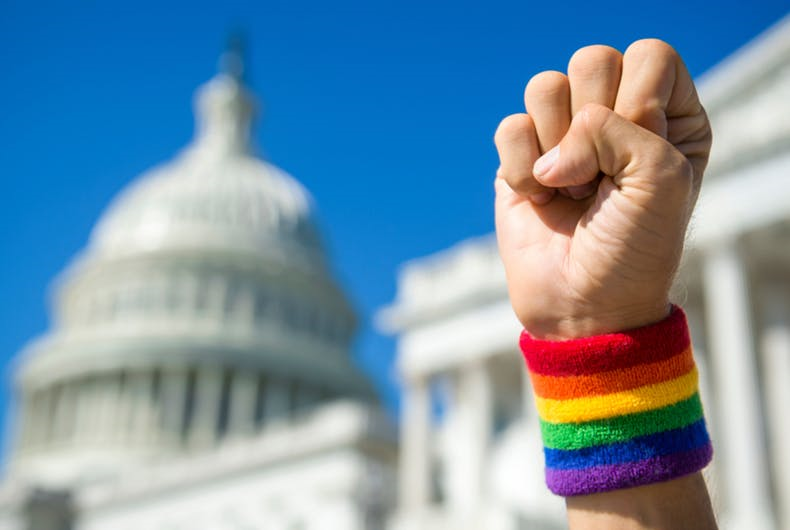
Despite campaigning on a promise to be a "real friend"
to the LGBTQ community, Donald Trump designated Mike
Pence (who has previously called homosexuality "a
choice") as his vice president. And Trump has been
outspoken about his opposition to bipartisan federal
civil rights legislation (the Equality Act) which
overwhelmingly passed through the US House of
Representatives this year and, if signed into law, would
prohibit discrimination on the basis of sexual
orientation or gender identity.
The 2020 presidential election will determine whether
the Trump administration's attacks on LGBTQ rights are
allowed to continue -- or whether we begin the work of
restoring our democracy. And while the stakes couldn't
be higher, for LGBTQ people in particular, there also
could not be a greater opportunity to make change.
Over the past several election cycles, LGBTQ people and
our allies have been exerting more and more political
power -- dramatically altering the political landscape.
Today, there are 11 million LGBTQ voters estimated
nationwide who will play a decisive role in the upcoming
elections. We have also identified 57 million "Equality
Voters" -- friends, family members and other allies who
prioritize LGBTQ-inclusive policies when deciding which
candidates to support.
2020 Presidential Election Critical for LGBTQ People
LGBTQ Issues Get Attention in Democratic Presidential
Debate
Rainbow Wave: 114 LGBTQ Candidates Won Office This Year
Pete Buttigieg: Advocate Magazine Interview
Democratic Candidates Participate in LGBTQ Town Hall
Trump's Relentless Attack on LGBTQ Rights
Queer Like Pete: The Gay Archetype
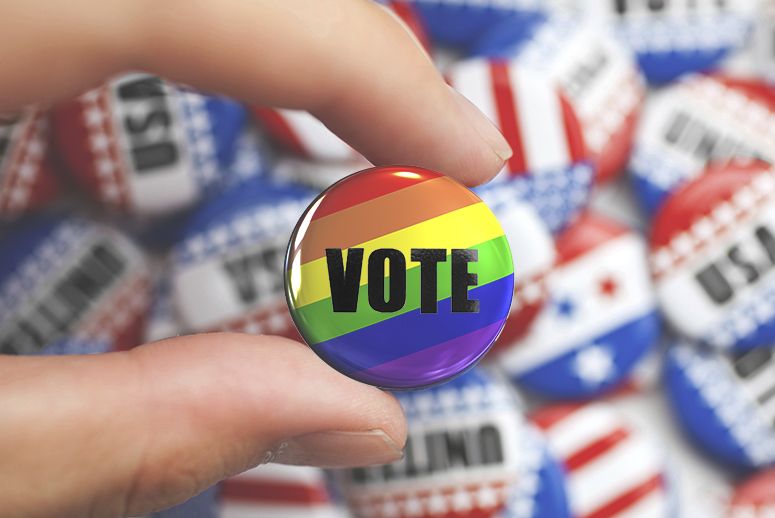
In fact, Equality Voters accounted for 29% of the
electorate in 2018, making it one of the most
substantial voting blocs in the election. Turnout among
Equality Voters increased from 36% in the 2014 midterm
elections to 56 percent in 2018. This trend is only
expected to continue in 2020. LGBTQ people and our
allies played a key role in pushing candidates over the
finish line in dozens of races with groundbreaking
consequences.
Specifically, Equality Voters helped protect the
Senate's first out LGBTQ member, Tammy Baldwin in
Wisconsin, and elect another out member, Senator Kyrsten
Sinema in Arizona. Equality Voters helped elect and
re-elect governors who are working to enact critical
non-discrimination protections, outlawing the dangerous
and abusive practice of so-called "conversion therapy,"
and acting as a powerful backstop against anti-LGBTQ
state legislation. And Equality Voters helped restore a
pro-equality majority in the House of Representatives
that passed the Equality Act.
This is part of a growing trend. In 2016, LGBTQ voters
and our allies helped oust former North Carolina
Governor Pat McCrory after he signed into law a
draconian anti-LGBTQ bill known as HB2. According to a
CNN exit poll, 65% of 2016 North Carolina voters opposed
the law. During Alabama's special election in 2017, the
coalition built by groups like the Human Rights Campaign
and the NAACP played a role in defeating anti-LGBTQ
zealot Roy Moore and electing Doug Jones to the US
Senate.
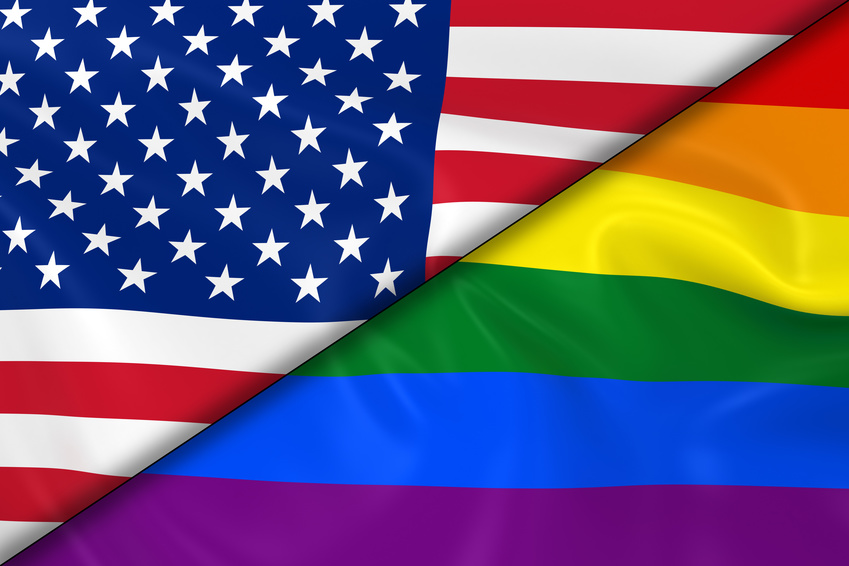
With so much at stake in 2020, we are eager to hear how
these candidates will fight for full federal equality,
defend the fundamental rights of LGBTQ people and
protect the most vulnerable (both here and around the
globe) from stigma, institutional inequality,
discrimination and violence. But at its core, the
participation of these top-tier candidates and the
platform provided by a major cable news network
underscore the importance of LGBTQ issues and the power
of our votes.
Fifty years ago, when the first brick was thrown at
Stonewall and the modern LGBTQ-rights movement was born,
few could have imagined ten candidates for president
competing for the support of the LGBTQ community. But as
recent years have shown, increasing support for equality
means our movement is no longer limited to organizing
and mobilizing self-identified LGBTQ people. The rising
Equality Vote has the potential to put LGBTQ issues at
the center of electoral decision-making and activism --
both in 2020 and beyond.
[Source:
Alphonso David | HRC President | CNN | Oct 2019]
2020 Presidential Election Critical for LGBTQ People
LGBTQ Issues Get Attention in Democratic Presidential
Debate
Rainbow Wave: 114 LGBTQ Candidates Won Office This Year
Pete Buttigieg: Advocate Magazine Interview
Democratic Candidates Participate in LGBTQ Town Hall
Trump's Relentless Attack on LGBTQ Rights
Queer Like Pete: The Gay Archetype
Why Are We Still Failing LGBTQ Students?
Stopping bullying is not enough
This past Pride Month, like most in recent history, saw
a growing number of signs with phrases like “Pride is
still a riot,” and “Black queer lives matter.” A
critical and timely effort to refocus the movement on
its origins and those in the community who are most
marginalized, these signs represent a broader reminder:
Pride isn’t just a party. It’s also a time to call
attention to efforts toward improving queer and trans
lives. While we see many of these efforts displayed
prominently at Pride (efforts around healthcare, legal
support, social and financial services) one area we
still don’t often see addressed is education.
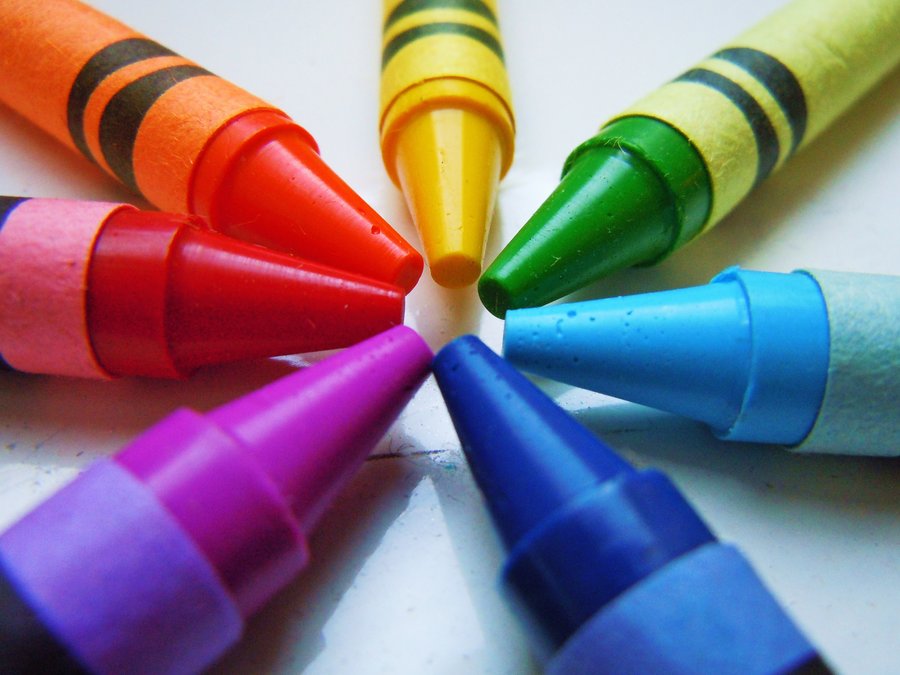
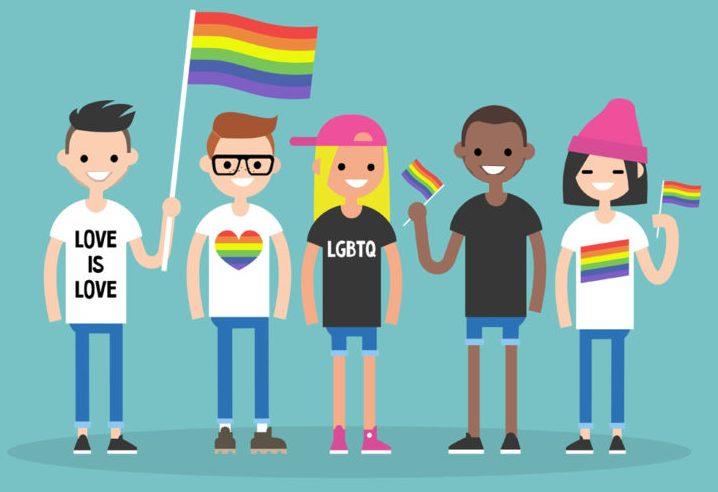
Tim Cook to LGBTQ Youth: You Are a Gift to the World
Music Video: Don't Give Up by Maggie Szabo
TED Talk: Why We Need Another Coming Out Story
Lonely Dudes: Men Are Having a Friendship Crisis
Trump's Military Ban Ignores Science to Inflict Harm
Church Offers Free Mom Hugs at Pride Parade
Why Opinion Changed so Quickly on Gay Marriage
Though more and more schools are implementing
anti-bullying laws and gender neutral bathrooms, there’s
still a long way to go. As Michael Sadowski says in his
book Safety is Not Enough, we need to go beyond making
schools simply safe for queer and trans kids, and start
working to transform them into learning spaces that
validate and engage them, personally and intellectually.
Just last month, a story from Boulder, Colorado told us
about a local public school teacher named Chris Segal
who has seen at least three queer or trans students in
his school who dropped out after being bullied. Chris
realized that safety should not be the endgame when it
comes to supporting queer kids. He includes queer
authors in his curriculum, but even he wants teachers
like himself to be able to do more to create an
inclusive environment for LGBTQ students.
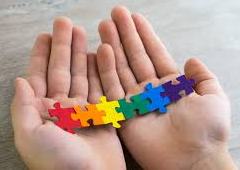
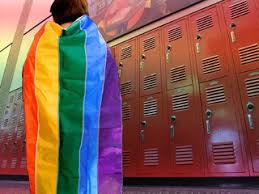
Alicia Keys: We Need More Expressions, Less Labels
The Atlantic: Gay Rights Have Already Been Won
LGBTQ Elders Share Their Thoughts About Today's Queer
Youth
TED Talk: Preacher's Kid, Football Player, and Gay
The World's Happiest Countries Protect Their LGBTQ
Citizens
Respectability Politics: Can You Be Too Gay?
So what exactly does an “inclusive environment” look
like? Quite simply, it’s a learning environment in which
every student is engaged in and relates to the content.
It’s instructional materials, as Rudine Sims Bishop
describes, that both gives students a window into lives
and experiences different from their own, and holds up a
mirror so they can see themselves reflected. It’s an
environment in which the teacher understands the
learning contexts of their students and leverages unique
parts of their identities as tools for learning. We know
that students learn better when they feel validated and
challenged by what they’re learning. And yet, many
preK-12 schools continue to teach about a very narrow
set of lived experiences — one to which fewer and fewer
students can relate.
Like Chris, many teachers have the will, but not the
way, to teach queer-inclusive content. With so many
teaching standards to meet, little time or funding, and
no inclusive teacher professional development, most
educators don’t know where to start. Even with great
teaching resources from GLSEN, Teaching Tolerance, and
others, the real problem is that many educators don’t
know where to find them, how to implement them, or how
and when to share them.
Particularly for teachers who are not queer themselves
or have not before engaged with topics of sexual and
gender minorities, talking about these topics with
students can be a formidable challenge, even with a
how-to guide. What’s worse is that many districts
including those in the handful of states in which it is
still illegal to mention LGBTQ identities in the
classroom, are far from the point of even attempting to
prioritize queer students.
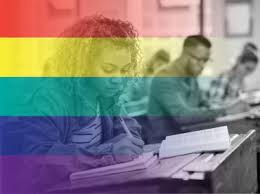

So what do we do? In states and districts like this and
beyond, it will take difficult, ongoing conversations
between schools and those advocating for inclusion to
frame inclusive curricula as a feasible goal. It will
take careful articulation of what anti-racist queer
inclusivity is, why it matters for all students, and
what the ramifications are of not creating inclusive
classrooms. It may even take more robust data on the
outcomes of these types of materials on student
social-emotional learning, engagement, and test scores.
This type of data, particularly on queer K-12 students,
is as severely lacking as it is desperately needed.
Though storytelling has historically been and remains a
cornerstone of the queer community, it may not be enough
to sell this idea to those resisting it.
At the same time, intentional LGBTQ inclusion will
require tearing down the misconceptions around what it
means to support queer students. It requires empowering
teachers to approach their lessons with language
awareness and self-respect, not inappropriate
conversation and indoctrination as some believe. There
is much that can be done in classrooms to support queer
students outside teaching about the gay civil rights
movement. School leaders, educators, and students can be
intentionally inclusive in everyday interactions, and
promoting this in the classroom benefits all students.
To get existing resources into the hands of teachers who
are willing and prepared to use them, we ought to talk
to districts and school leaders, and promote
collaboration between students and experts in the
community.
Pride month or not, inclusive learning environments
should be a priority among the community and our allies.
There is both a will and a way for supporting queer
students, and connecting them is our challenge.
[Source:
Sabia Prescott | Education Activist | Advocate
Magazine | Sept 2019]
Advocate: Why Are We Still Failing LGBTQ Students?
Fifth Grader Responds to Homophobic Teacher Who Insulted
His Family
Indya Moore Offers Delightful Daily Affirmations
Religious Undercurrent Ripples in Anti-Gay Bullying
Love Bravely: Mini LGBTQ Documentary
Congresswoman Talks About Her Gender Non-Conforming
Child
Alicia Keys: We Need More Expressions, Less Labels
Will & Grace Celebrate Pride Month
The Future Is Not In Front of Us, It's Inside of Us
Cameron Hawthorn: Gay Country Music Star
BBC Big Question: Has Britain Become Less Tolerant?
More Than Sexuality
Attraction versus affection
Do you have an "affectional preference" for female
companionship? Hey, world, big news! Gay people are
more than our sexuality. It can be downright annoying to
be defined by one part of our humanity.
I may live in rural America, but I am not a walking,
talking letter “Q” for queer. Not an advertisement for a
lifestyle. Not a representation of what-dykes-look-like.
Not an object of study or fascination. Not a target of
foul words, flung mud, or physical violence.
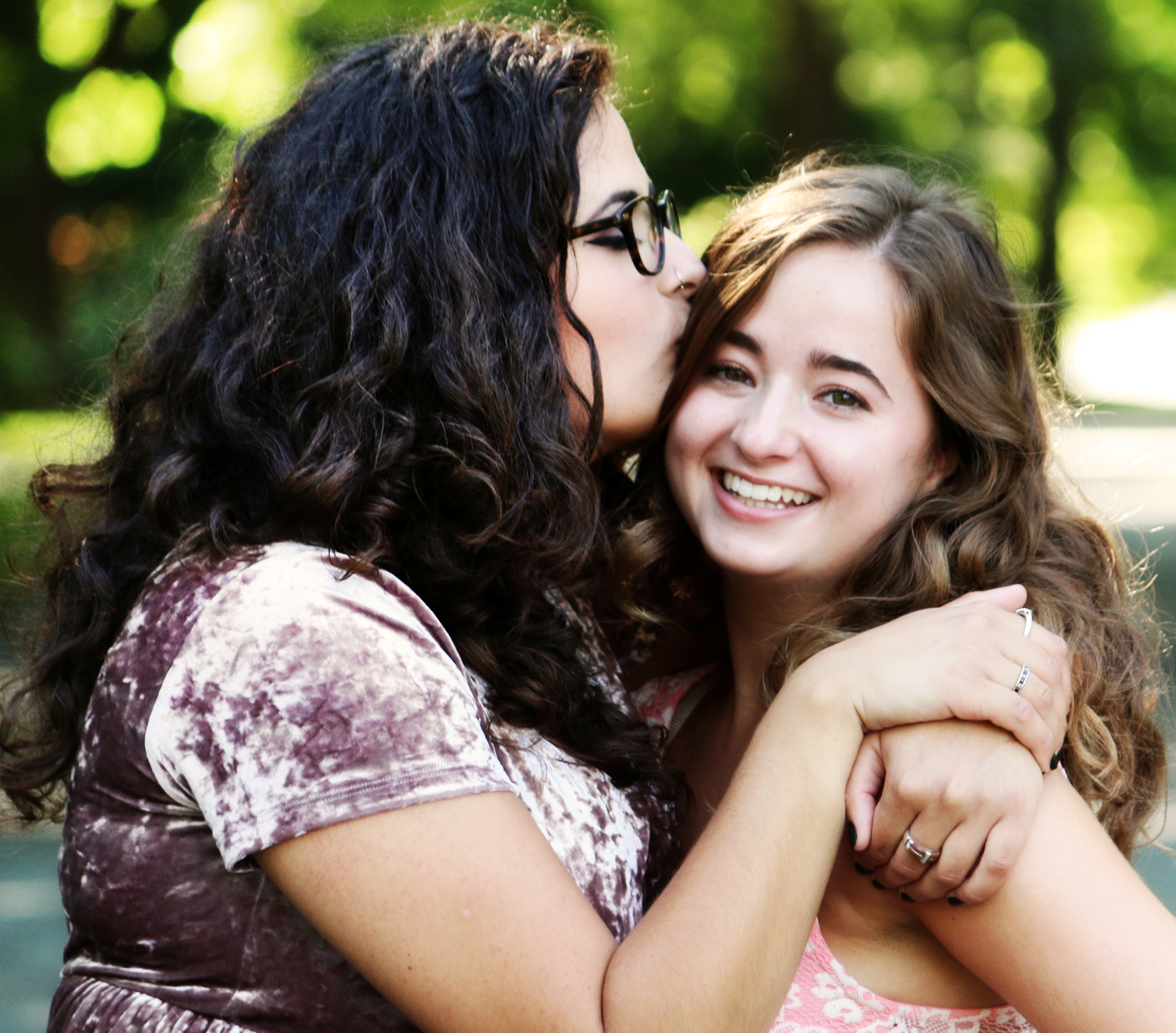
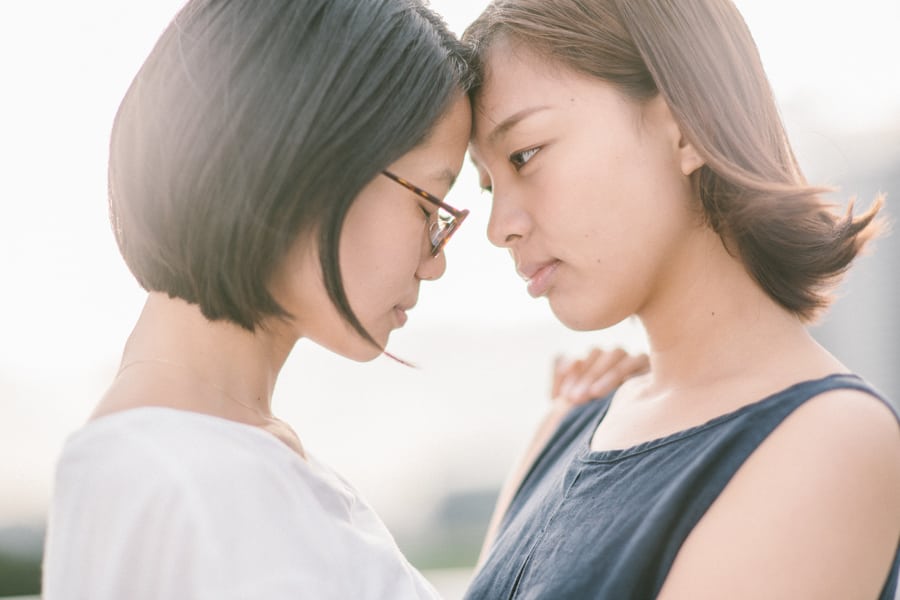
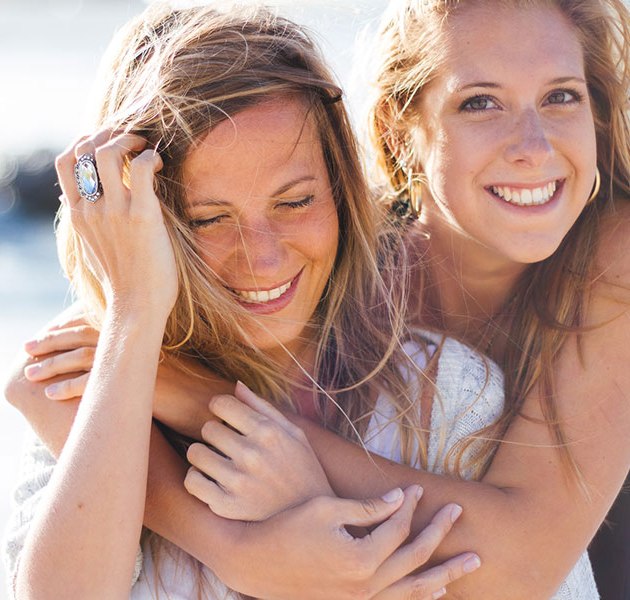
I am a lover of women, but that encompasses a heck of a
lot more than sexual expression. When I was younger even
I didn’t know that was true. I didn’t know I could love
a woman friend without intimate touch. I believed the
homo-hating hype that coming out made me
one-dimensional.
Today, we can see photos of people like us who are
unencumbered by stereotypes. We watch gay people become
champion athletes, TV and film and theater stars, heads
of corporations, politicians. I like to think all our
efforts have helped to provide solid groundwork for gay
lives to be fulfilling.
It is time to look at how language continues to be one
of our stumbling blocks. Change is already happening.
Little by little a majority of Americans are becoming
respectful of gay people, are realizing they need not
focus conversation on gay matters. They are finding out
that we are not threats and that we have more in common
with them than not.
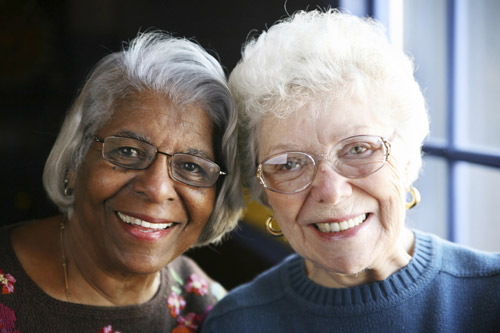
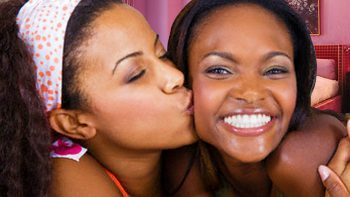
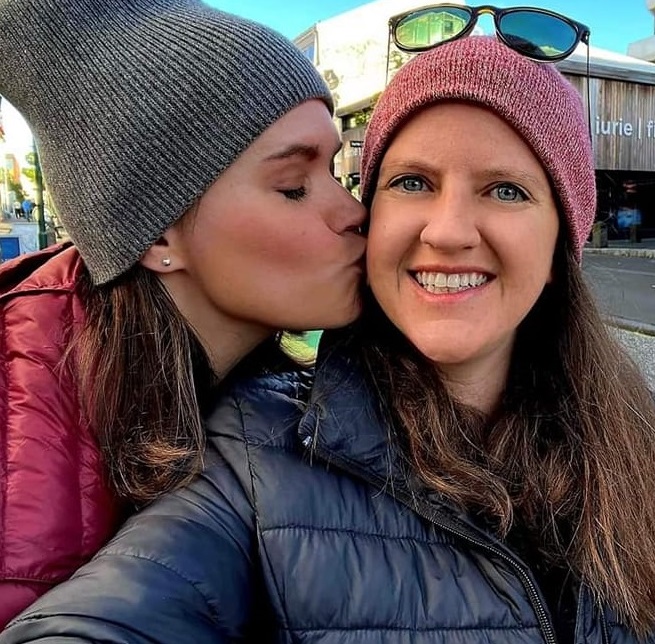
Both gays and non-gays need new language for the concept
that we are the family next door, the gal who pumps gas,
the transgender head of the corporation. We need to move
beyond words that mark us in a solely sexual way.
I’ve been using the phrase affectional preference. While
I enjoy the company of some men, mostly gay men, my
closest friends and family are women. If I’m going out
somewhere, I go with women. If I join an organization,
it’s more likely to be woman-centered than co-ed. If I
exercise or swim, I like to do so in the company of
women. I do business with women, preferably gay. There
is no sexual component in any of those activities. Why
am I the only one with a sexual label in a room full of
non-gay women who’ve gathered for lunch? I have
affection for these women, not attraction to them.
In my marriage, of course there is the kind of intimacy
that scares straight boys. Or just sitting in our living
room discussing our day and reading. Or cooking dinner
and doing the dishes. We might even be doing the
laundry, cleaning the toilets, filling the bird feeders.
So call us bird lovers, cooks, readers. Our passion for
birds and books have nothing to do with sexual
preferences. We simply like to share everyday life
together as two loving women.
Let’s stop sexualizing ourselves and come up with words
that reflect the greater percentage of our days and
ourselves—if we have to be labeled at all. Please note,
it’s not the sex itself I want to eliminate, it’s the
restrictive branding.
[Source:
Lee Lynch | Epochalips | Sept 2019]
Am I Really Proud to Be a Lesbian?
Ten Things Lesbians Hate to Hear
You Tube: Notable Lesbians
Music Video: I Wish You Were Gay
Video List: Most Famous Lesbians in History
Epochalips: Smart Lesbian Commentary
Old Lesbians Give Advice to Young Lesbians
Slate: Some Young Women Don't Like Lesbian Label
Mental Health Issues Lesbian Women Cope With
Why Being a Lesbian is Amazing
Video Montage: Best Lesbian Kisses
Pride 2019 Was Historic, Revelatory, Unforgettable
Resoundingly reassuring
Pride 2019 saw the confluence of three significant
signposts that placed sensational snapshots of the LGBTQ
community at the epicenter of pop-culture and headline
news. Culturally, trendy Mashable posted a roaring
review for season two of Pose calling it a “joyful
celebration of life.” Politically, The Washington Post
cited Pete Buttigieg as a winner of the first Democratic
presidential debate because of his “humility” and the
fact he offered “bold ideas that emphasize realism.”
Societally, ABC became the first US network to broadcast
World Pride. A wonderous, consequential month of three
vignettes that flaunted, flashed and floated gratitude
and hope.

Photos From World Pride 2019
Pride 2019: Historic, Revelatory, Unforgettable
How to Be More Out and Proud in Your Everyday Life
Indya Moore Offers Delightful Daily Affirmations
PBS News: 50th Anniversary of Stonewall Riots
I came of age during the era of Pose, graduating from
college in the late ‘80s, psychologically and medically
petrified of my sexuality, making a secret pact to kill
myself if an AIDS diagnosis occurred. How downright
cowardly. To watch Pose is to see the beauty and
frailties of life, and how to push through it, to be
yourself, to survive, to fathom a future, to be
honorably happy and live loud. It’s astonishingly
heroic. And to have this revolutionary television show
come of age in late June of 2019, during the 50-year
anniversary of Stonewall, and to critical and cultural
acclaim? Monumental!
Politically, two other powerhouses The New York Times
and USA Today also pronounced Buttigieg a winner of the
Democratic debates. That is not an easy feat, by any
measure, regardless of who you are. To be in politics is
to be judged. Rarely glowingly. Sometimes harshly.
Occasionally offensively. Surprisingly revealingly. All
by your constituency of critics.

Pete Buttigieg: Unlikely Unprecedented Presidential
Campaign
NYC Lights Up 12 Iconic Buildings in Support of LGBTQ
Pride
Advocate Mag: Champions of Pride 2019
Pete Buttigieg to be First Gay Candidate in Presidential
Debates
Pride Month 2019
We Stand United: World Pride Song
It takes an enormity of courage for anyone, be it a
congressman or otherwise, to gather the steel and stand
before a crowd. The audience may clap and agree with
your policies and prose, but they are looking at and
through you. Mayor Pete must feel this continually. He
must be constantly reminded of the fact that to many, he
is an anomaly, a first, a curiosity, a revelation, and
to some, unfortunately, a revulsion. Watching the flash
of Mayor Pete brilliantly perform in front of a primary
debate record audience of 18 million television viewers
last week (a record!), and be declared a winner by major
media outlets, was a seminal moment for the LGBTQ
community.
Which brings us to the ultimate LGBTQ watershed societal
breakpoint, the Stonewall Riots of 1969, and the
unforgettable 50th anniversary celebration this past
month. In 1994, my first year in New York, Mayor
Giuliani participated in what was known as the NYC pride
march, and I didn’t. It was one of his better days, and
certainly one of my worst. I was still desperately
fearful of AIDS, still scared beyond pale to come out,
and frightened I’d see someone who knew me. But I was
paying attention, because any validation of gay
acceptance was quietly reassuring. Thus, I don’t
remember any corporate sponsors, any rainbow flags
(outside of the West Village), and certainly wasn’t
aware of any major celebrities attending. I still felt
like an outlier.

Well, 25 years later, it’s a divergently different
world. Last week preceding the main event, you couldn’t
walk one block in Manhattan without seeing gay flags
blossoming. Times Square, and corporate buildings, bars,
banks, bodegas, boutiques, bistros, and billboards, all
were lit up in radiantly brilliant rainbows. Add to that
the luster of luminaries lending their love. It was
resoundingly reassuring.
Then, there was the record crowd of millions who showed
up for the gallantry gorgeous, colossally colorful World
Pride Parade, with floats and flamboyance that stretched
endlessly through Manhattan for hours. And the Grand
Marshals? Arguably the hottest A-listers of the moment,
the cast of Pose. Proof of the pageantry’s platitudes?
Scores of headline news stories. Just do a Google
search! 152 million results and counting. The day truly
capped, and put a begotten bow, on a week that was
nothing short of historic and revelatory.
And maybe the revelation derived from each of the
reported events is that we need to be ever so grateful
for all the lessons of the past and confident in all
that is to come. During coverage of the parade, ABC’s
Sam Champion remarked that to a person, everyone he
encountered talked about gratitude. Mindful, thankful
and hopeful to all those who fought and who fight, who
marched and who pride, who hid and who advance, who
changed and who shift, who joyed and who delight, who
endured and who sustain, who died and who live, who
couldn’t and who do, who fell and who rise, who suffered
and who flourish, who tried and who triumph, who existed
and who continue to be.
[Source:
John Casey | Advocate | July 2019]
Photos From World Pride 2019
Pride 2019: Historic, Revelatory, Unforgettable
How to Be More Out and Proud in Your Everyday Life
Indya Moore Offers Delightful Daily Affirmations
PBS News: 50th Anniversary of Stonewall Riots
Pete Buttigieg: Unlikely Unprecedented Presidential
Campaign
NYC Lights Up 12 Iconic Buildings in Support of LGBTQ
Pride
Advocate Mag: Champions of Pride 2019
Pete Buttigieg to be First Gay Candidate in Presidential
Debates
Pride Month 2019
We Stand United: World Pride Song
Tolerance Survey by GLAAD
Amid
a rise in inflammatory rhetoric and dozens of policy
setbacks
The young are regarded as the most tolerant generation.
That's why results of this LGBTQ survey are "alarming."
Young people are growing less tolerant of LGBTQ
individuals, a jarring turn for a generation
traditionally considered embracing and open, a recent
survey shows. The number of Americans 18 to 34 who are
comfortable interacting with LGBTQ people slipped from
53% in 2017 to 45% in 2018 – the only age group to show
a decline, according to the annual Accelerating
Acceptance report. And that is down from 63% in 2016.
Driving the dilution of acceptance are young women whose
overall comfort levels plunged from 64% in 2017 to 52%
in 2018, says the survey conducted by The Harris Poll on
behalf of LGBTQ advocacy group GLAAD.
“We count on the narrative that young people are more
progressive and tolerant,” John Gerzema, CEO of The
Harris Poll, told USA Today. “These numbers are very
alarming and signal a looming social crisis in
discrimination.”
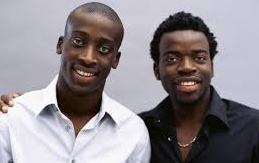
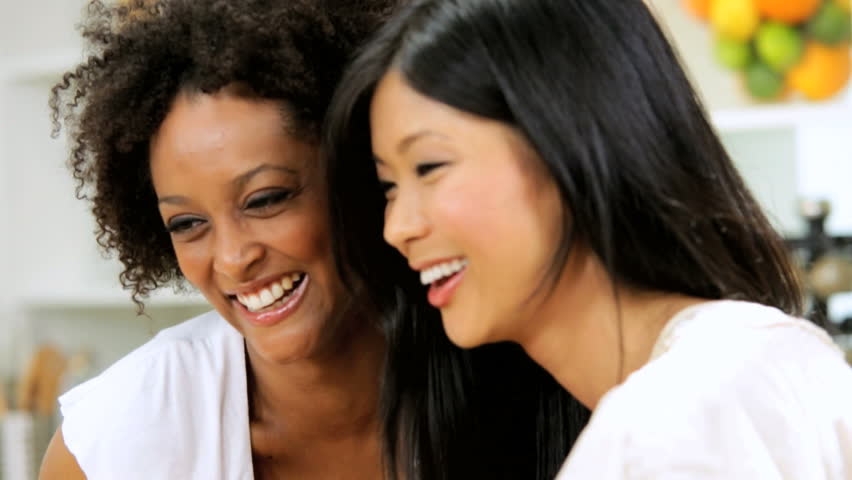
Among the findings:
--36% of young people said they were uncomfortable
learning a family member was LGBTQ, compared with 29% in
2017
--34% were uncomfortable learning their doctor was LGBTQ
vs. 27% a year earlier
--39% were uncomfortable learning their child had a
school lesson on LGBTQ history vs. 30% in 2017
The negative shift for the young is surprising, said
Sarah Kate Ellis, GLAAD president and CEO. When GLAAD
delved into the numbers, the group found that the
younger generation was coming in contact with more LBGTQ
people, particularly individuals who are non-binary and
don’t identify simply as lesbian or gay. “This newness
they are experiencing could be leading to this erosion.
It’s a newness that takes time for people to understand.
Our job is to educate about non-conformity,” she said.
The survey results come during Pride 2019 and on the eve
of the 50th anniversary of the Stonewall riots, which
sparked the LGBTQ rights movement. They also land at a
dark hour politically and culturally for the LGBTQ
community amid a rise in inflammatory rhetoric and
dozens of policy setbacks, such as a ban on transgender
people in the military and religious exemption laws that
can lead to discrimination, Ellis and Gerzema said. Both
are a likely force behind the young's pushback on
tolerance, they said.
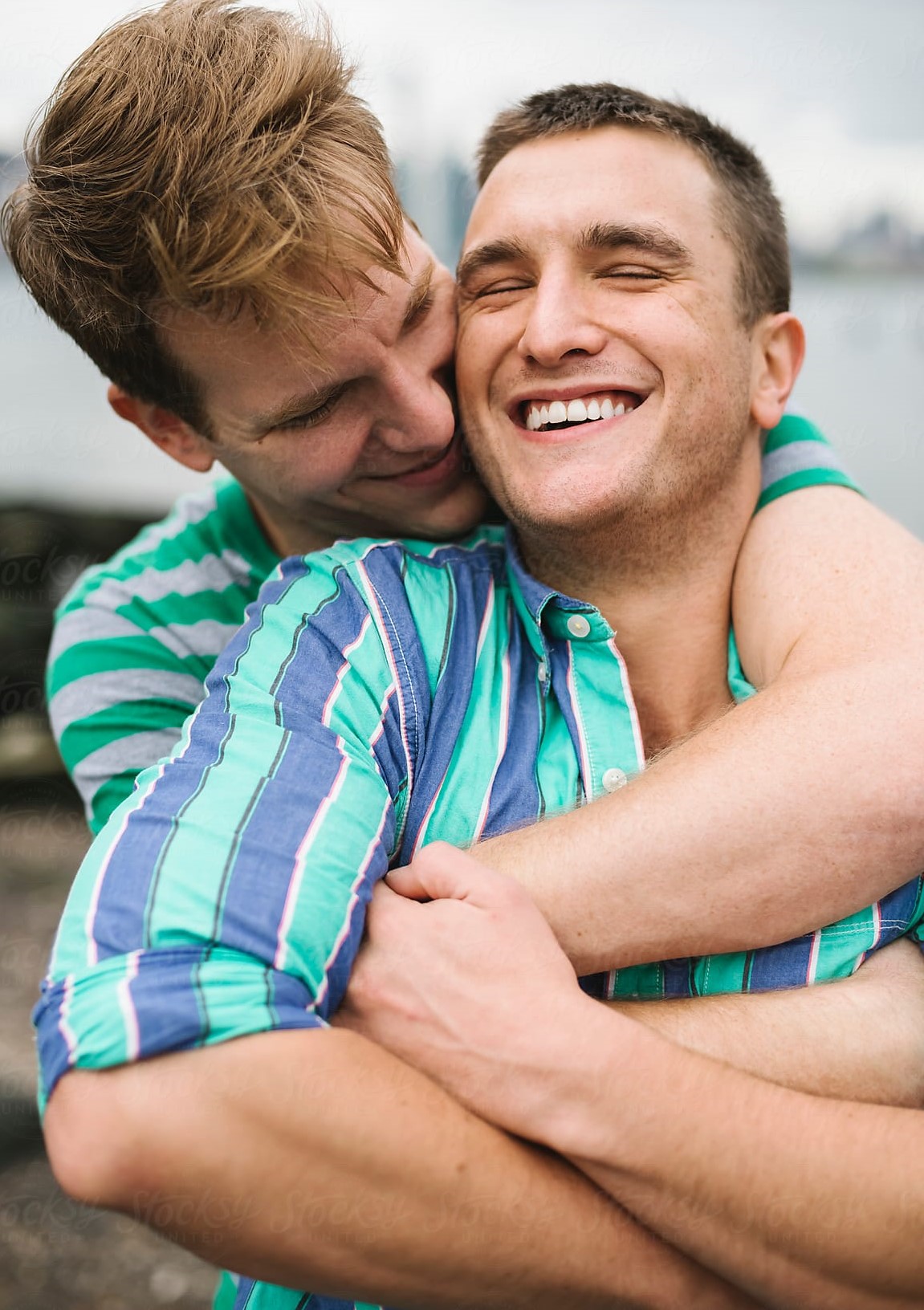
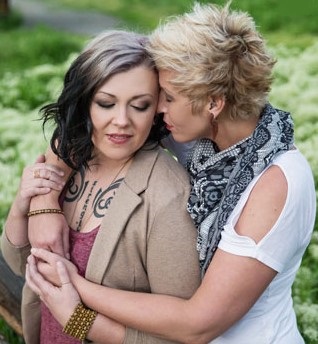
USA Today: LGBTQ Tolerance Survey by GLAAD
Graph: GLAAD Tolerance Survey
Center for American Progress: Widespread LGBTQ
Discrimination
USA Today: Review of LGBTQ Equality Over the Past Decade
Battles the LGBTQ Community is Still Fighting
Human Rights Watch: Anti-LGBTQ Laws Around the World
A new survey out during Pride 2019 shows young people
have grown less accepting of LGBTQ individuals. The
young are bombarded by hate speech on social platforms
from viral videos to “mean tweets,” Gerzema said. “Our
toxic culture is enveloping young people. It instills
fear, alienation, but also permissibility” that could
sway “impressionable" young minds on what is acceptable.
And there is a more menacing side, Ellis said. “We are
seeing a stark increase in violence in the community.”
GLAAD has documented more than 40 incidents of LGBTQ
hate violence since January 1.
Two recent high-profile incidents: In June 2019, a young
gay couple were assaulted outside a popular strip of
bars in Washington, DC, in what police are investigating
as a hate crime. A few weeks earlier, a Detroit man was
charged in a triple homicide in which two gay men and
one transgender woman were deliberately targeted, police
say. The FBI released statistics in November showing a
17% increase in overall hate crimes in 2017. Of 7,175
reported crimes, more than 1,200 were based on sexual
orientation or gender identity bias.
The transgender community has been especially hard hit.
In 2018, there were at least 26 deaths of transgender
individuals in the US because of violence, mostly black
transgender women, according to the Human Rights
Campaign, which has tracked 10 deaths so far this year.
The situation is so grim that the American Medical
Association warned this month of “an epidemic of
violence” against transgender people, particularly those
of color.
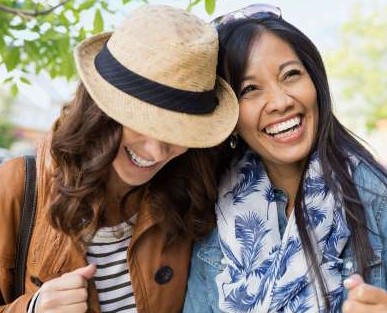
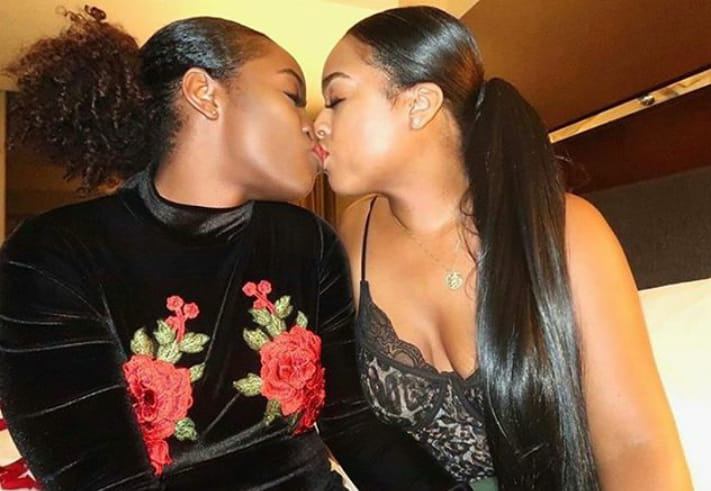
The increase in violence and discrimination mirrors the
trajectory of the acceptance survey. The report, first
commissioned in 2014, reflected positive momentum from
historic gains for LGBTQ rights (such as the same-sex
marriage ruling) in its first three years. But that
shifted in 2017 with fallout from the presidential
election, advocates say.
Still, there is cause for optimism this year, Ellis
said. Nearly half of all non-LGBTQ adults, or 49%, are
classified in the survey as “allies” with high levels of
tolerance. That is the same number as 2017, and “that is
a big deal,” she said. Support for equal rights is also
stable, with eight out of 10 backing equality for LGBTQ
people for the third consecutive year.
Ellis is confident the younger generation can rise again
as beacons of unbiased values. When numbers dipped a
year ago for young males, GLAAD went to where male
audiences consume content: video games. The advocacy
group worked with the industry to introduce diverse
characters and help shape attitudes. The group has
similar outreach plans for targeting young women in a
popular female venue, country music concerts, she said.
It’s crucial LGBTQ advocates stay vigilant, Gerzema
said. “In this toxic age, tolerance (even among youths)
now seems to be parsed out. Nothing today should be
taken for granted.”
[Source:
Susan Miller | USA Today | June 2019]
USA Today: LGBTQ Tolerance Survey by GLAAD
Graph: GLAAD Tolerance Survey
Center for American Progress: Widespread LGBTQ
Discrimination
USA Today: Review of LGBTQ Equality Over the Past Decade
Battles the LGBTQ Community is Still Fighting
Human Rights Watch: Anti-LGBTQ Laws Around the World
Trans Deaths Are Real Deaths
Transgender Day of
Remembrance
Trans deaths are real deaths. It's time America
realized that simple truth. God works through other
people. Maybe you can be those other people.
In a suburb just outside of Dallas, a transgender mural
is being painted on the side of a tattoo and piercing
shop. The mural commemorates the 50th anniversary of
Stonewall, displaying an image of our foresisters Marsha
P. Johnson and Sylvia Rivera. They are the catalysts of
our 1969-to-present day LGBTQ movement. Their images are
against the backdrop of the colors of the transgender
pride flag.
Brian Kenny, the muralist behind the painting,
explained, “This mural represents the trans women of
color who were key figures in that riot and also key
figures in the start of the queer liberation movement.
This mural is to honor them and to give more visibility,
love, and attention to the transgender community. I
wanted this mural to be a positive reinforcement that we
are all a human family. We have a lot more in common
than our differences. I’m hoping the mural can be a
bridge.”

Trans Deaths Are Real Deaths
HRC: Epidemic of Violence Against Trans People
CNN: Killings of Trans People in US Increasing
World Health Organization: Transgender Not a Disorder
Indya Moore: First Trans Cover Model for Elle Magazine
Feminism and Equality: What Trans Women Want You to Know
My Trans Life: I'm That Scary Transgender Person
Kentucky Mom Honors Transgender Son
Video: Trans Youth Share Struggles and Hopes
For the 50th anniversary of Stonewall I hope more images
of Johnson and Rivera will be on display. I hope as they
will be honored in LGBTQ communities across the country
this Pride season and Americans learn of the difficult
day-to-day struggle it took them to stay alive. I hope
we all will do more to stem the violence faced by our
transgender community – especially our black and Latinx
sisters of color.
In one week, during May 2019, three transgender women of
African descent were murdered – Michelle Washington, 40,
Claire Legato, 21, and Muhlaysia Booker, 23. As I draw
attention to these sisters, several others have been
murdered have also been killed this year, and, sadly,
many more will be murdered after. Washington was found
dead with gunshot wounds to her head, body, and
buttocks.
“It’s time that we say this is happening to transwomen;
it’s happening to black transwomen, it’s happening to
transwomen of color.” Deja Lynn Alvarez, a candidate for
Philadelphia City Council, told Philly Gay News.
Legato was shot in the head after an argument erupted
between her mother and the shooter. Her community in
Cleveland took to social media to express their grief
and outrage. “Love you, cousin,” wrote a friend on
Facebook. “I’m hurt, sad, angry all in one. Fly high.”
Booker was found shot dead on a quiet street in Dallas.
In April 2019, Booker was beaten by a crowd that shouted
“ That’s what your faggot ass gets,” “Get that faggot
out of our hood,” and “Shoot that punk ass.” The mob
scene was caught on cell phone footage that went viral
on social media.

Trans Deaths Are Real Deaths
HRC: Epidemic of Violence Against Trans People
CNN: Killings of Trans People in US Increasing
World Health Organization: Transgender Not a Disorder
Indya Moore: First Trans Cover Model for Elle Magazine
Feminism and Equality: What Trans Women Want You to Know
My Trans Life: I'm That Scary Transgender Person
Kentucky Mom Honors Transgender Son
Video: Trans Youth Share Struggles and Hopes
Texas’s black trans female community has been subject to
a steady stream of assaults since gentrification evicted
them out of city’s once LGBTQ neighborhood. Like Booker,
they congregate on a strip on the outskirts of town, and
many engage in transactional sex work to survive.
Texas’s hate crime laws include sexual orientation but
not gender identity, which makes Kenny’s mural a protest
statement, and an act of healing.
I’ll always remember Rita Hester’s vigil because the
words of Hester’s mother haunts me. Rita Hester, 34, an
African American trans woman from Allston,
Massachusetts. was found dead inside her first-floor
apartment with multiple stab wounds to her chest in
1998. Her death kicked off the “Remembering Our Dead”
web project and was the catalyst for what’s now our
annual Trans Day of Remembrance.
When Hester’s mother came up to the microphone during
the Speak Out portion of the vigil at the Model Cafe
where Rita was known, she repeatedly said in a
heartbroken voice that brought most of us to tears, “I
would have gladly died for you, Rita. I would have taken
the stabs and told you to run. I loved you!” As the
vigil processed from the Model Cafe to where Rita lived
and died, Hester’s mother again brought me to tears as
she and her surviving children kneeled in front of the
doorway of Rita’s apartment building and recited the
Lord’s Prayer. Many of us joined in unison.

In a report titled “Violence Against the Transgender
Community in 2018” the Human Rights Campaign highlights
what ties all of these murders – throughout the years –
together. “While the details of these cases differ, it
is clear that fatal violence disproportionately affects
transgender women of color, and that the intersections
of racism, sexism, homophobia, and transphobia conspire
to deprive them of employment, housing, healthcare and
other necessities, barriers that make them vulnerable.”
During the “Trans Catholic Voices” breakout season at
the DignityUSA conference in Boston in 2017, I heard the
vulnerability of an African-American transwoman who
pointed out that Pope Francis’ statements about trans
people deny them of basic human dignity and perpetuates
violence against them. In her closing remarks, she
asked for help from advocates and allies in the room in
words that brought me to tears. “Trans lives are real
lives. Trans deaths are real deaths. God works through
other people. Maybe you can be those other people.”
We are those other people. It’s time we realized that.
[Source:
Reverend Irene Monroe | LGBTQ Nation | May 2019]
Trans Deaths Are Real Deaths
HRC: Epidemic of Violence Against Trans People
CNN: Killings of Trans People in US Increasing
World Health Organization: Transgender Not a Disorder
Indya Moore: First Trans Cover Model for Elle Magazine
Feminism and Equality: What Trans Women Want You to Know
My Trans Life: I'm That Scary Transgender Person
Kentucky Mom Honors Transgender Son
Video: Trans Youth Share Struggles and Hopes
Let's Hear it for the Gay White Boy
Three cheers for Pete
Buttigieg
Remember when the big measuring stick of a candidate's
electability was how much you wanted to have a beer with
them? Boy those were much better times. Nowadays, we
have to weigh absurd criteria like their stances on
race, gender, health care, and such. These are
absolutely insane metrics to judge a politician on.
Never in our history have we cared about their defense
policy or financial history; we’ve always judged
candidates on the meaningless things that appeal to us
personally, no matter how petty and shallow. That is why
I am so glad that people have decided that Pete
Buttigieg is the candidate we don't like because he just
isn’t gay or diverse enough.
Oh, I mean sure the sexism that Harris, Warren, and
others are being subjected to is terrible, but let’s
just be perfectly honest here; have you met our country?
The reason that ICE is confining undocumented immigrants
in hastily built cages under highway underpasses,
reproductive rights are being eroded, and our democracy
is dying from cancer is because too many people thought
that voting for a woman who didn’t shut up when the men
were talking was a bridge too far. However, I’m talking
about Pete “Gay Isn’t Diversity” Buttigieg here, and by
God, I love the fact that it’s not the conservatives
acting horrified at voting for a gay white man, but the
insane-from-sleep-deprivation-woke people out there.
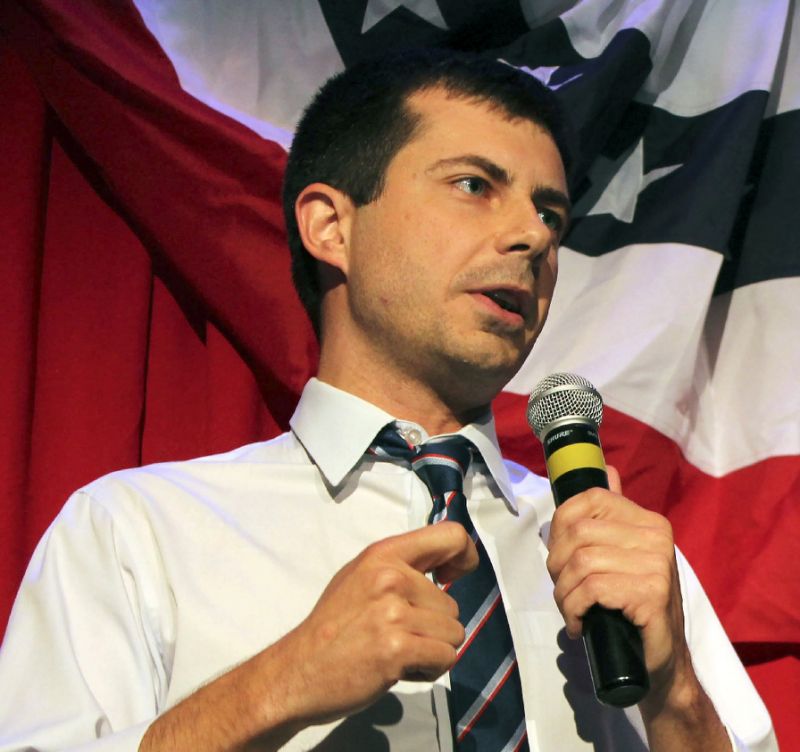
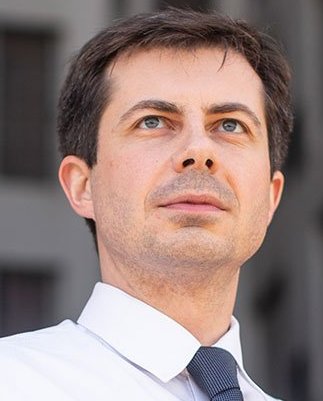
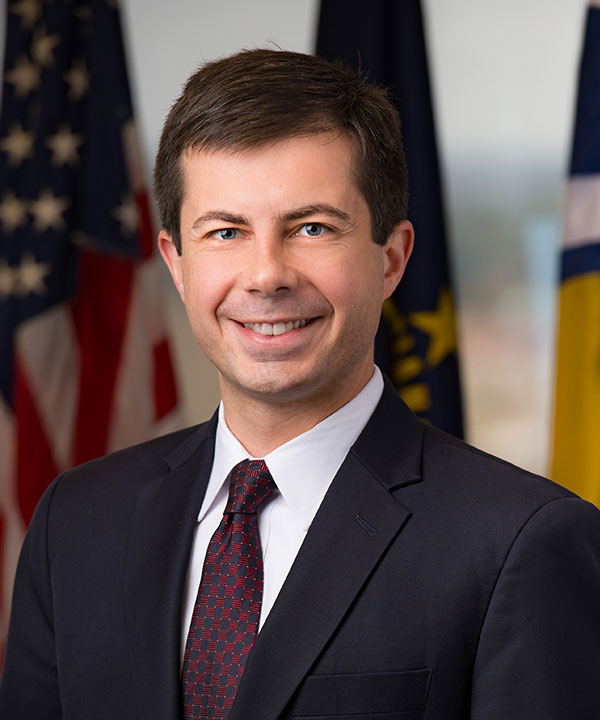
Mayor Pete Announces Prez Campaign and Kisses Husband
NY Times: Pete Buttigieg Might be President
CNN: Pete Buttigieg Doing Well in the Polls
Washington Post: Is Pete Buttigieg Gay Enough?
Queer Like Pete: The Gay Archetype
South Bend Tribune: Mayor Buttigieg Marries Partner
LGBTQ Nation: Why Pete Buttigieg is Good for Gays
God bless you folks. Instead of focusing on his
policies, so many of you have decided that being gay is
just not good enough to not merely vote for, but to even
give the basest levels of respect to. I appreciate the
fact that your impression of gay men is entirely based
off of the stereotypes of the ones in your immediate
personal circle and the queens on Drag Race — in this
world gays fart rainbows and glitter while giving queer
studies lectures in Emma Goldman drag. While so many of
you have tweeted your thumbs raw with calls for
diversity, inclusion, and pointing out when
discrimination occurs, one has to simply marvel at the
moment that a gay man doesn’t fit into your preconceived
ideas of what a gay man should act like or think about
himself.
While it’s easy to understand why so many folks are
eager to see a woman (possibly a Black woman!) obtain
the highest position in our country outside of The Voice
judge, to decide that a white gay man is just not
diverse enough takes an amazing amount of cognitive
dissonance. One has to assume these folks dissing Pete
as same old-same old consume lots of LGBTQ media, since
they're so interested in diverse voices; so certainly
they're aware gay white men still suffer discrimination
in this country. I mean, yes, gay white men have white
privilege and all that entails (like uttering "All Lives
Matter," yikes), but they’re still gay men, which means
they can be legally denied a job, insurance, housing,
and other protections in half of this country. They are
still physically attacked, denied medical care, and
suffer abuse to the point they would rather kill
themselves than suffer another day of it. Even if they
grow up in wealthy households in safe neighborhoods and
attend great schools, they are still subjected to the
pressures of heteronormativity and toxic masculinity,
which cause lifelong emotional trauma and pain many turn
to substance abuse to cope with.
In no way am I comparing the suffering of gay white men
to those of queer women, especially POC and trans women.
I know very well that white privilege exists, and it
holds many benefits, but that does not ever negate the
other disadvantages they have, just that their whiteness
will not be one of them. In fact, some of wokest folks
hating on Pete are the people who taught me that.
Strange how once that becomes an inconvenience to a
candidate before the first primaries even begin. The
calls for diversity stop the minute that it’s not the
right diversity.
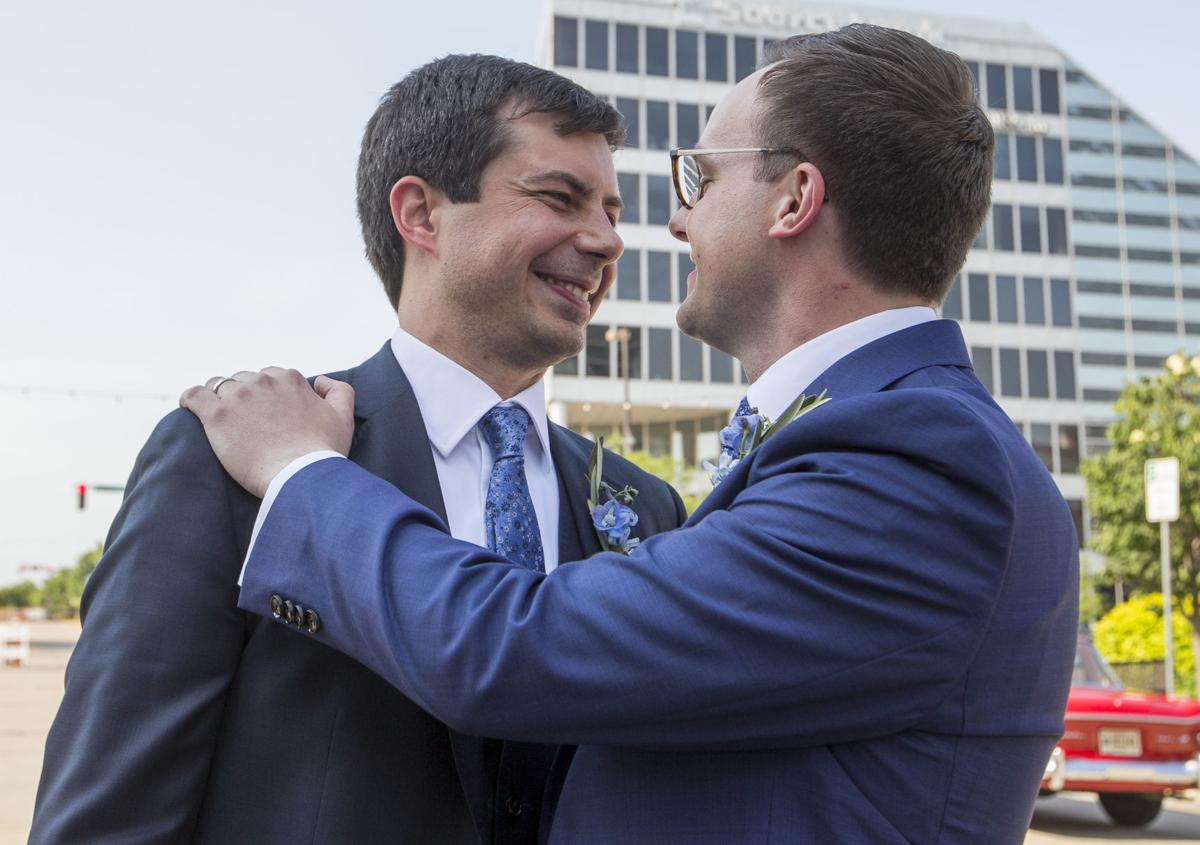

Mayor Pete Announces Prez Campaign and Kisses Husband
NY Times: Pete Buttigieg Might be President
CNN: Pete Buttigieg Doing Well in the Polls
Washington Post: Is Pete Buttigieg Gay Enough?
Queer Like Pete: The Gay Archetype
South Bend Tribune: Mayor Buttigieg Marries Partner
LGBTQ Nation: Why Pete Buttigieg is Good for Gays
It also is a marvel that this critique of Buttigieg is
based around how he expresses himself as a gay man.
People have critiqued that he came out for the wrong
reasons, that he isn’t as in tune with the latest in
queer theory, state his politics as a gay man are wrong,
and posit that he hasn’t self-reflected enough. Being
gay, lesbian, trans, bi, or any other thing is not done
to a damn syllabus with assigned projects and reading.
Diversity isn’t just showing up with a skin color,
gender, or sexuality; it’s experiences too.
The LGBTQ experience and expression isn’t stamped out on
a factory line in a third world country and sold at a
huge mark up at a Pride booth like a rainbow flag with a
socialist rose on it. LGBTQ identity is the only thing
that unites us, other than that everything is fair game.
We don’t all follow celebrities and fashion, nor do we
know all know who Harvey Milk or Sylvia Rivera are, much
less graduated with a degree in a minority studies.
We’re not all socialists or Democrats; some of us are
actually kind of conservative.
If your beef with Buttigieg is that he is the wrong kind
of gay, then take a hike and your fetishized idea of
what a gay man should be like with you. This is not some
closeted conservative passing anti-LGBTQ legislation, or
some gay man siding with Trump to grift some money and
power out of him (Peter Thiel, cough, Richard Grenell,
cough). Pete Buttigieg is a Democrat from Indiana with
the ideas and opinions that come with that. Yes, he is
diverse enough because, if you forget, he lived in a
state run by Mike Pence, which you know, makes him an
additional oppressed minority (LGBTQ Indianan is a
double whammy).
He is the “right type of gay” because there really is no
right type of gay to be. Now go find some other petty
reason to hate the guy that doesn’t make you sound so
shallow.
[Source:
Amanda Kerri | Advocate Magazine | April 2019]
Mayor Pete Announces Prez Campaign and Kisses Husband
NY Times: Pete Buttigieg Might be President
CNN: Pete Buttigieg Doing Well in the Polls
Washington Post: Is Pete Buttigieg Gay Enough?
Queer Like Pete: The Gay Archetype
South Bend Tribune: Mayor Buttigieg Marries Partner
LGBTQ Nation: Why Pete Buttigieg is Good for Gays
Gay Youth and Affirming Educators
Being gay has never been
easy... but counselors and teachers helped
As a child, I never really understood what it meant to
be gay. I never understood the strict borders between
pink and blue, between dolls and race cars, between
pretty dresses and sports-related t-shirts. I never
understood why these boundaries existed, and why I was
on the “wrong” side of the wall. Nonetheless, I kept
going, and I became who I am now, someone strong, both
mentally and emotionally, and someone who loves himself
and who is willing to help others love themselves too.
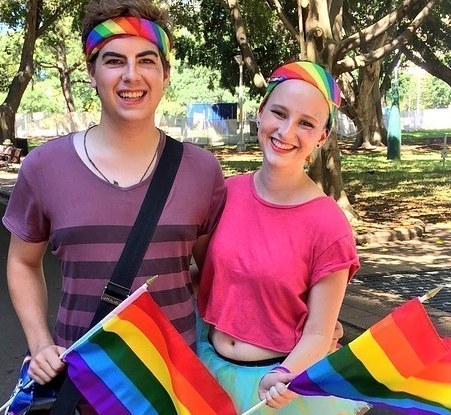
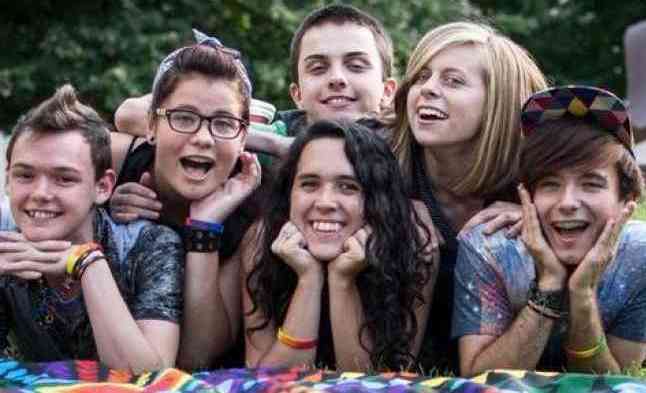
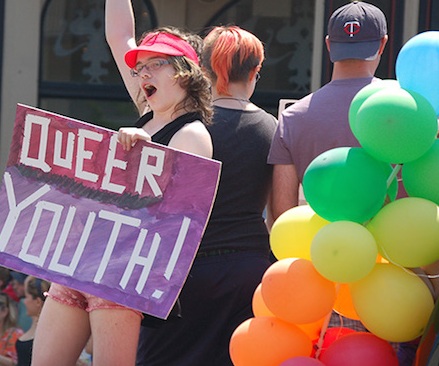
Blog: San Diego LGBTQ Pride
Tim Cook to LGBTQ Youth: You Are a Gift to the World
Music Video: Don't Give Up by Maggie Szabo
HRC: LGBTQ Youth Report
Students Have the Right to Form LGBTQ Clubs
Info: LGBTQ Youth
Teaching Tolerance: Creating an LGBTQ-Inclusive School
Climate
My name is Daniel. I am fifteen years old and a
sophomore at Point Loma High. It’s been two years that
I’ve been out of the closet, and eight years knowing I
like boys. Though I face challenges at school, I’m still
largely accepted in school, which makes me very
grateful. The largest challenges I’ve faced are
stereotypical judgements like “All gay guys are insanely
flamboyant and overly dramatic,” and the occasional peer
who uses homosexuality to make jokes. As irritating as
these problems are, I know not to take them seriously.
Being gay has never been easy, but my experience has
been facilitated thanks to some of my current and
previous teachers and counselors who point out anything
they believe can help me, like clubs, groups, and books.
Without them, I wouldn’t be who I am today, and I
wouldn’t be writing this essay. My counselors have
helped me through problems, from dealing with emotions
to finding places where I can be myself. I truly am
fortunate to have them.
As open as our school is, it is far from being perfect.
Point Loma High is really great, but I believe there are
more ways it could support our LGBTQ youth. One way is
by having more clubs or groups that support the LGBTQ
youth and community in the school. Another way I think
the school could support us is by having an all school
Pride Day, or Pride Week, allowing the students to wear
their sexual orientations’ colors and expressing
themselves. The last way I think the school could
support us is by having assemblies talking about our
community, sexual orientations, and to speak out when
there is bullying and hate present. This would encourage
the students to take us seriously, stop making jokes,
and allow us to show not only our own, but the school’s
support and dedication to the LGBTQ youth of today and
the years to come.
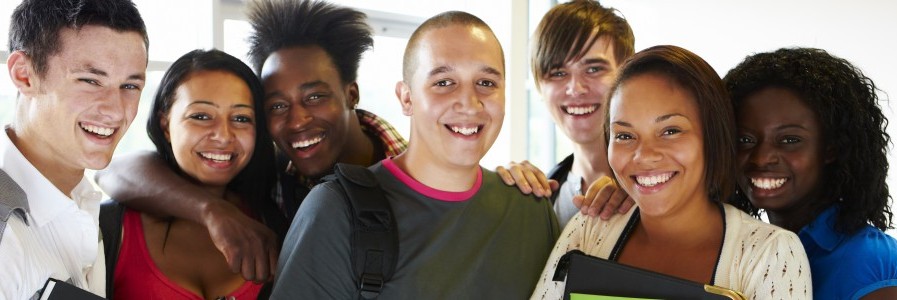
At this point, I know that the determination and
ambition of others along with my own can change the way
schools see the youth of a different sexual orientation,
and how that goal isn’t far from becoming a reality. I
know that I share this wish with others, and I am eager
to find out how high we can go in making this dream take
shape. I know that together, we can bring the wall down,
I know that together we can speak out. With pride. For
pride.
[Source:
Daniel | San Diego LGBTQ Pride | November 2018]
TED Talk: Problems Facing LGBTQ Youth
AAMFT: Gay and Lesbian Youth
Video: Interview with LGBTQ High Schoolers
Students Succeed When Diversity is Valued
Love Bravely: Mini LGBTQ Documentary
Info: Educational Considerations
TED Talk: Why We Need LGBTQ Education
Message From Tyler Clementi's Mom
Church teachings are used as
social and political weapons to exclude, degrade and
dismiss LGBTQ people
Eight years ago, my son, Tyler Clementi, died by suicide
after vicious cyberbullying at Rutgers University
because of his sexual orientation. He was 18 years old.
Tyler was not the first gay youth to die after cruel
attacks by peers, and sadly, he wasn’t the last. Study
after study continues to find that LGBTQ youth are at a
higher risk for suicide than their heterosexual peers.
And those raised in religious communities, many of which
teach that being LGBTQ is a sin, are even more likely to
attempt suicide.


Think about that. Religious communities are supposed to
be a source of strength and love, as my church family
was, providing comfort when my son died. But the fact
remains that being a part of a religious community
increases the risk of an early, tragic death for LGBTQ
youth.
In sharp contrast, participation in a religious
community decreases the risk of suicide for heterosexual
people. What is different about the treatment of LGBTQ
people in religious communities that creates such
tragedies? My family once belonged to a church that
taught being LGBTQ was a sin. Like so many other LGBTQ
youth, Tyler must have felt rejected, unwanted and
shamed. My son did not believe he could be both
Christian and gay.
When theology is used to inflict harm and exert power
over vulnerable people like my son, it becomes religious
bullying. Church teachings are used as social and
political weapons to exclude, degrade and dismiss LGBTQ
people. The irony is that religious communities are
uniquely positioned not only to end bullying in their
houses of worship, but also to support LGBTQ youth who
face isolation and cruelty in other aspects of their
lives. By acknowledging religious bullying and working
to rectify it, religious communities can support some of
their most marginalized members while adhering to their
own teaching to love their neighbors.
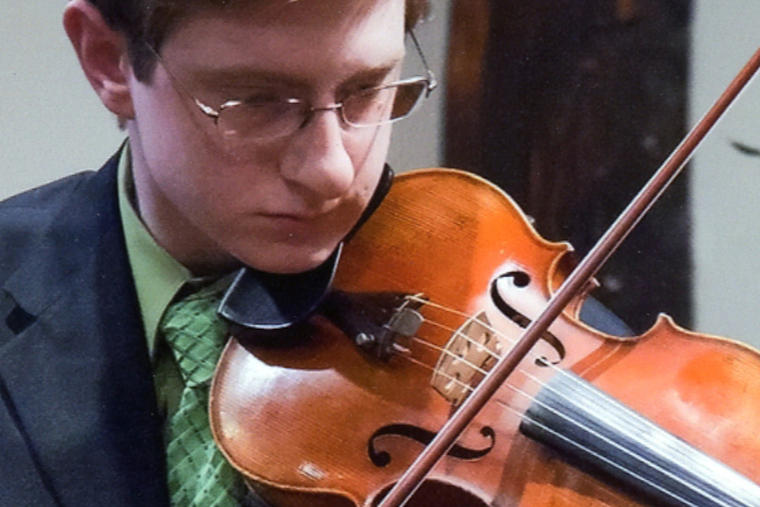
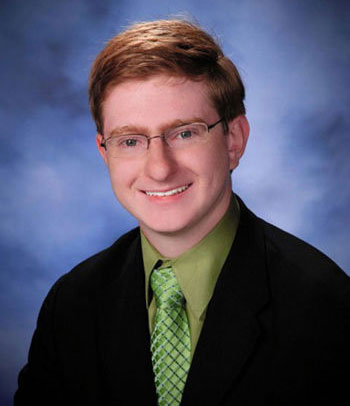
It should not take yet another LGBTQ youth suicide to
end religious bullying.
When he came out to me, I had to begin reconciling the
teachings of my church with my unconditional love for my
son. I am grateful to worship now at a church that
affirms the lives of LGBTQ people. It is a church that
welcomes and accepts everyone as perfectly created in
the image of God, adhering to the teachings of Jesus to
love and be kind to all, where no one is excluded,
marginalized or treated cruelly because of who they are
or whom they love.
My husband and I founded the Tyler Clementi Foundation
to prevent bullying, including what happened to my son
before he died. We hope to see a world where youth like
Tyler are respected and treated with kindness – not only
by their peers but by their churches.
I want parents to think about how our religious
communities treat people who are different. Regardless
of sexual orientation or gender identity, our children
deserve to be taught about love and acceptance, not
shame and rejection. The choices we make about where
our families worship can save lives. Don’t make those
decisions lightly.
[Source:
Jane Clementi | LGBTQ Nation | September 2018]
LGBTQ Nation: Tyler Clementi's Mom Has Something to
Share With You
CBS News: Tyler Clementi Suicide
NPR News: Student's Suicide is Deadly Reminder of
Intolerance
NY Times: Private Moment Made Public, Then a Fatal Jump
Huffington Post: Rutgers Student Commits Suicide
Info: Critical Incidents
Church Offers Free Mom Hugs at Pride Parade
Please just one more hug
A church in Texas gave away free “mom hugs” and “dad
hugs” at a recent Pride parade. Jen Hatmaker, a
conservative blogger who was unceremoniously kicked out
of the Christian media world because she opposed Donald
Trump’s election and supports LGBTQ equality, posted on
Instagram about what her “beloved little church” was
doing to spread the love at Austin Pride.
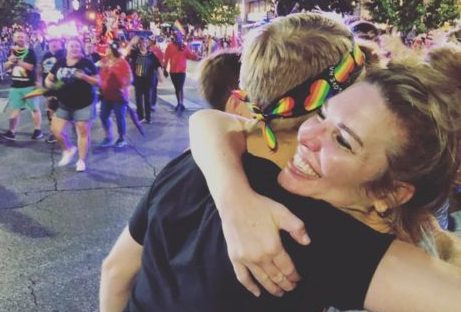
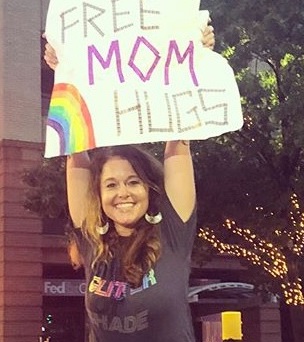
"My beloved little church went downtown to the Austin
Pride Parade and gave out Free Mom Hugs, Free Dad Hugs,
Free Grana Hugs, and Free Pastor Hugs like it was our
paying jobs. And when I say hugs, I mean the kind a
mama gives her beloved son. Our arms were never
empty. We happy hugged a ton of folks, but dozens
of times. I’d spot someone in the parade look our way,
squint at our shirts and posters, and race into
our arms. These were the dear hearts who said: I miss
this... My mom doesn’t love me anymore... My Dad
hasn’t spoken to me in three years... Please just one
more hug. You can only imagine what Pastor Hugs did to
folks. So we told them over and over that they were
impossibly loved and needed and precious. And we hugged
until our arms fell off."
And just like anyone who goes to an LGBTQ space and
offers unconditional love, the members of the Austin New
Church heard terrible stories. It’s too common for
LGBTQ people to have not-so-great relationships with
their parents, and too many churches spend time hating
LGBTQ people instead of loving them. An open heart and
some love can go a long way to healing old wounds.
[Source:
Alex Bollinger | LGBTQ Nation | August 2018]
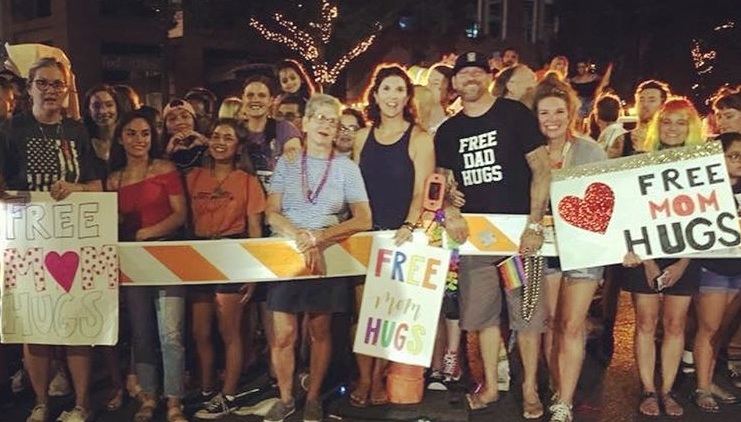
Selma, Stonewall and Beyond
Matt Fishel: Radio Friendly Pop Song
People Guess the Sexual Orientation of Strangers
Courts Advancing LGBTQ Rights Worldwide
Rainbow Riots: LGBTQ Voices From Uganda
Changing: Trans Teen Music Video
Open Letter to the Queer Community
Worst Question People Ask About Being Gay
Helping the hets understand
I’ve never been comfortable basing our rights on a ‘we
can’t help it’ rationale. It suggests that we’re somehow
pitiful things, that non-exclusively heterosexual sexual
orientation is a defect instead of every other point on
the infinite-points line that is normal human sexual
orientation.
It also begs the denial of rights to those who do
exercise any level of control over their attractions
(the stuff of sexual orientation at the combined sexual,
affectional, and emotional levels) if such a thing is
possible or to make conditional of those rights the
exercising of abstinence or other-directional control of
behavior related to those attractions.
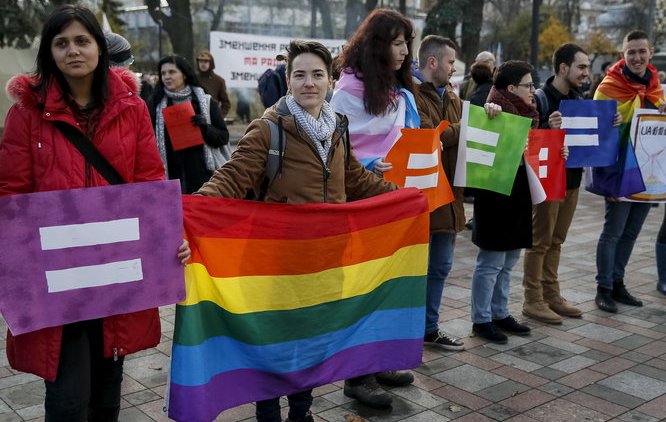
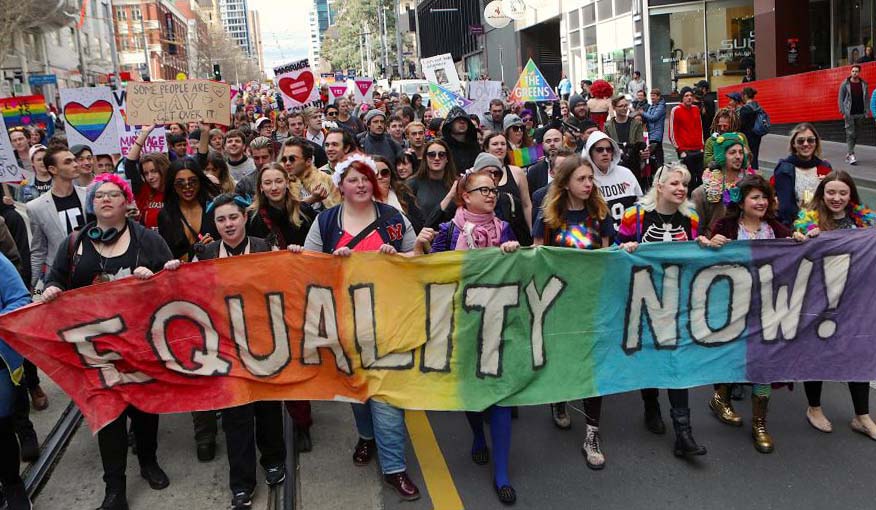
What Could a Gay Utopia Teach Urban America?
It Takes a Lot of Courage to Be Your True Self
TED Talk: Why We Need LGBTQ Education
Info: Frequently Asked Questions
Will & Grace Celebrate Pride Month
Rights are rights. They are not meant to be conditional
on accidents of birth or behavior one wouldn’t expect of
others. They are meant to just be, as we are meant to
just be.
I’m always suspicious when someone even wants to know
why we’re other than exclusively heterosexual without
wanting to equally understand why people are exclusively
heterosexual. I mean, when was the last time you heard
such a balanced inquiry outside of a university sexology
department anyway?
Worse, this
be-nice-to-the-queers-because-they-can’t-help-it
strategy sends a message of brokenness to our people
when we should be instilling pride and strength in who
we are.
The Kinsey researchers, as if they were precursors to
The Matrix’s Morpheus, used to ask a question of their
gay-identified subjects, “If you could take a pill that
would make you not homosexual, would you?” Most in those
dark days near the dawn of our fight answered that they
would.
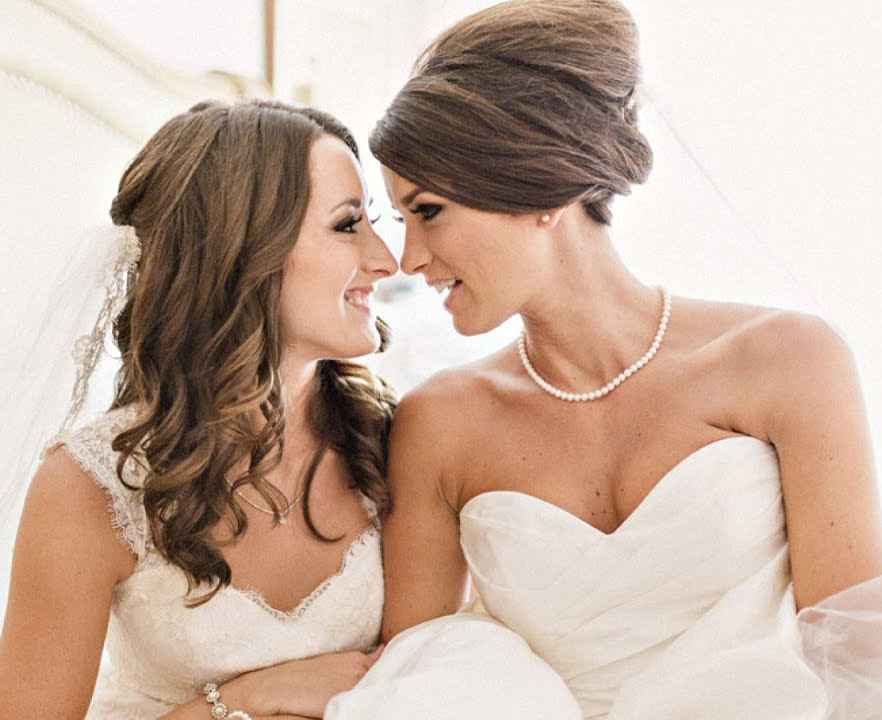
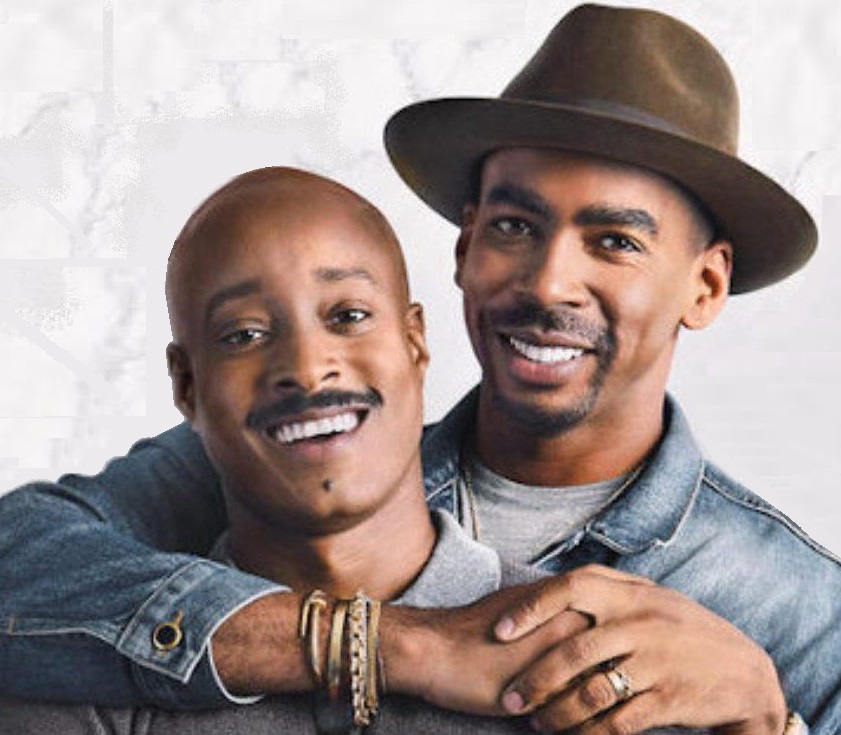
Introduction to the LGBTQ Community
What Has and Has Not Changed
Info: Myths and Misconceptions
Courts Advancing LGBTQ Rights Worldwide
We're Living LGBTQ History: Will We Remember It?
TED Talk: LGBTQ Life Around the World
How often today do we hear the question, “Who in their
right mind would choose to be gay?” Can you imagine
anyone asking who in their right mind would choose to be
black or Jewish or any number of other non-majority
members of protected classes just because they’re
oppressed?
‘Neo’-queer that I am, I would not take that pill. I
prefer to live an authentic life, unplugged from the
matrix of het convention, demanding in body, soul, word,
and deed to be exactly the queer I am blessed to be.
If truth be known, I’m a gay supremacist, firm in the
knowledge that we’re better than hets in many ways that
matter to me (and were proven superior by researchers
acting on behalf of the US Army, no less, trying to
figure out if they could more easily tell who the queers
were so they could more efficiently keep us out of the
service).
Even if I wasn’t a queer supremacist and despite having
suffered loss of family, jobs, and other opportunities,
as well as having been subjected to anti-gay violence,
including rape, due to my sexual orientation – enough of
the standard reasons given for why people in their right
minds wouldn’t choose to be queer to count and then some
– I’d still choose to be a lesbian and it doesn’t define
me as crazy.
How else, after all, would I have the spousal love of my
wife that grows fuller and deeper with every day of our
lives? Where would I find such a delightful subculture
so rich with beauty and humor and the sort of strength
forged in adversity that so fits my soul?
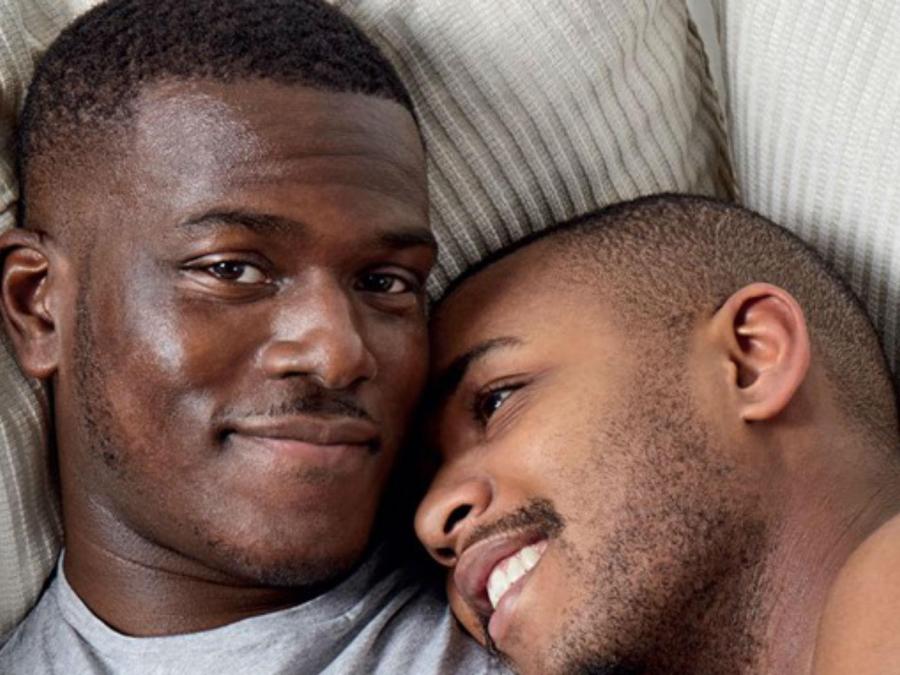
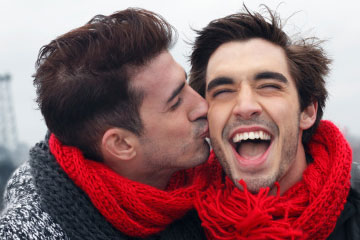
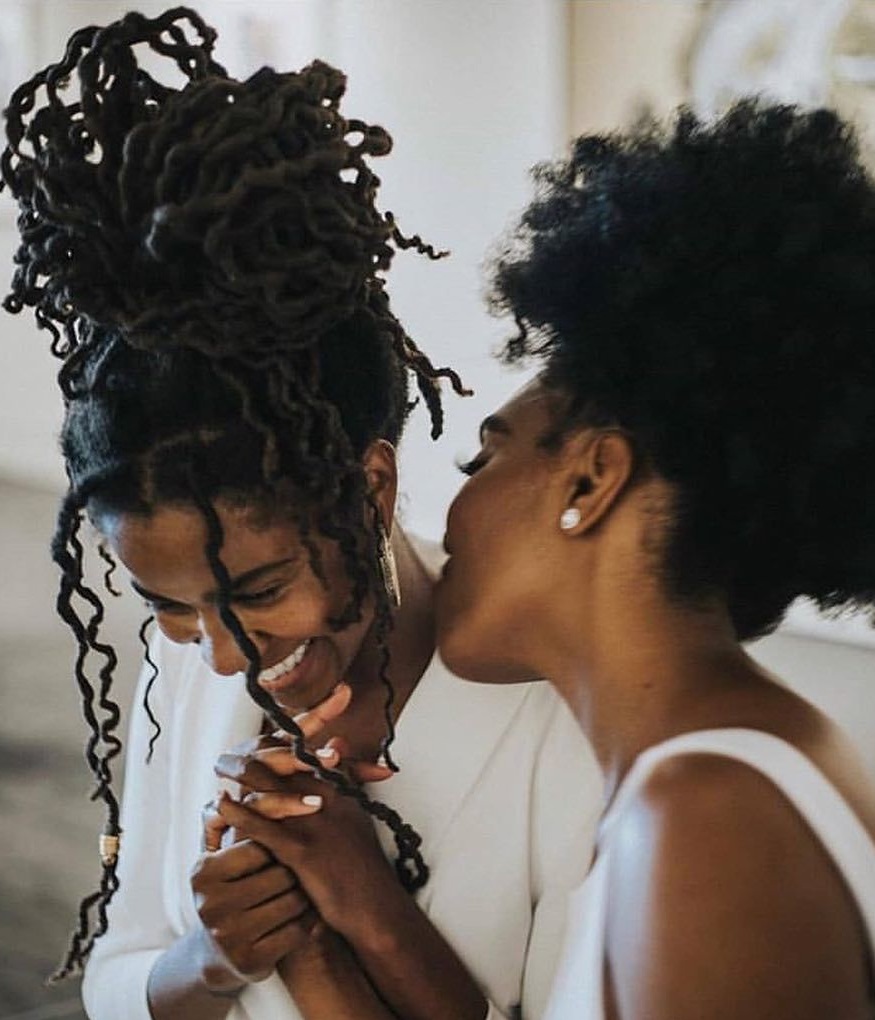
I love our freedom to define ourselves as we see fit and
the creative diversity with which we’ve done so. If I
were exclusively heterosexual, I’d be denied the depth
of intimacy that comes from sharing love with someone
whose body and mind responds so like mine and would be
relegated to the state of never really fully grasping
what the object of my affection really felt (that same
feeling of always reaching, never quite there, no matter
how hard they try, that hets suffer).
They may say "vive l’difference." Although I’ll admit
to feeling compassion for their loss, I say, "horsepucky!
vive l’homogeneite!" Now, don’t get me wrong, I don’t
support any sort of anti-het oppression. After all, some
or all of them might not be able to help it.
[Source:
Marla Stevens | Bilerico Report, LGBTQ Nation |
January 2018]
What Could a Gay Utopia Teach Urban America?
It Takes a Lot of Courage to Be Your True Self
TED Talk: Why We Need LGBTQ Education
Info: Frequently Asked Questions
Will & Grace Celebrate Pride Month
Introduction to the LGBTQ Community
What Has and Has Not Changed
Info: Myths and Misconceptions
Courts Advancing LGBTQ Rights Worldwide
We're Living LGBTQ History: Will We Remember It?
TED Talk: LGBTQ Life Around the World
Scientific Perspective on Sex and Gender
Science lesson for bigots
I just saw a transphobic post that was like, "In a
sexual species, females have two X chromosomes and males
have an X and a Y chromosome. I'm not a bigot. It's just
science." Well, I am a science teacher, so I posted the
following comment.
First of all, in a sexual species, females can be XX and
males can be X, as in insects. Females can be ZW and
males can be ZZ, as in birds. And females can be
females because they developed in a warm environment and
males can be males because they developed in a cool
environment, as in reptiles. Females can be females
because they lost a penis in a sword fighting contest,
as in some flatworms. Males can be males because they
were born female but changed sexes because the only male
in their group died, as in parrotfish and clownfish.
Males can look and act like females because they are
trying to get close enough to actual females so they can
mate with them, as in cuttlefish and bluegills. Or you
can be one of thousands of sexes, as in slime molds and
some mushrooms.
Oh, did you mean humans? Okay then. You can be male
because you were born female, but you have
5-alphareductase deficiency and so you grew a penis at
the age of 12. You can be female because you have an X
and a Y chromosome, but you are insensitive to
androgens, and so you have a female body. You can be
female because you have an X and a Y chromosome, but
your Y is missing the SRY gene, and so you have a female
body. You can be a male because you have two X
chromosomes, but one of your X's has a SRY gene, and so
you have a male body. You can be male because you have
two X chromosomes, but also a Y chromosome. You can be a
female because you have only one X chromosome at all.
And you can be a male because you have two X
chromosomes, but your heart and brain are male. And
vice versa.
Don't use science to justify your bigotry. The world is
way too weird for that shit.
[Source:
Science Teacher | Facebook | September 2017]


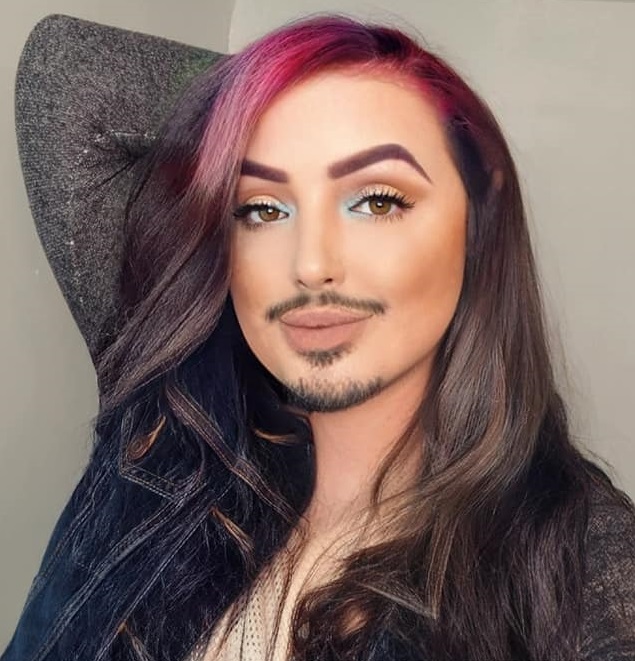
TED Talk: The Gift of Living Gay
People Guess the Sexual Orientation of Strangers
TED Talk: Why We Need LGBTQ Education
I Refuse to be Scared Back Into the Closet
TED Talk: What the Bible Says About Homosexuality
Gender Neutral Pronouns: My Personal Pep Talk
Why Pride? An Explanation for Straight People
"Remember, straight people flaunt their straightness all
day, every day, in every part of this country."
-Brandan Robertson
"When all Americans are treated as equal, no matter who
they are or whom they love, we are all more free."
-President Barack Obama
June is national pride month, a month set aside to
remember, celebrate, and empower queer people and our
contributions to the flourishing of humanity. All across
the country, LGBTQ people and our allies will be
gathering for festivals, parades, parties,
demonstrations, and marches that boldly proclaim that we
are not ashamed of our queerness and that we will not be
silent until we have achieved full freedom and equality
in our society and every society around the world.
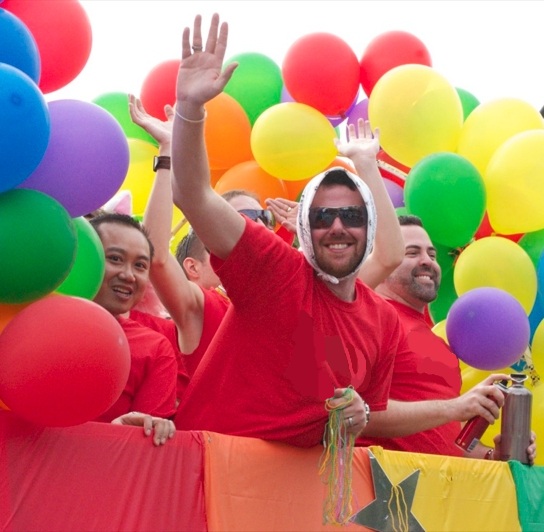
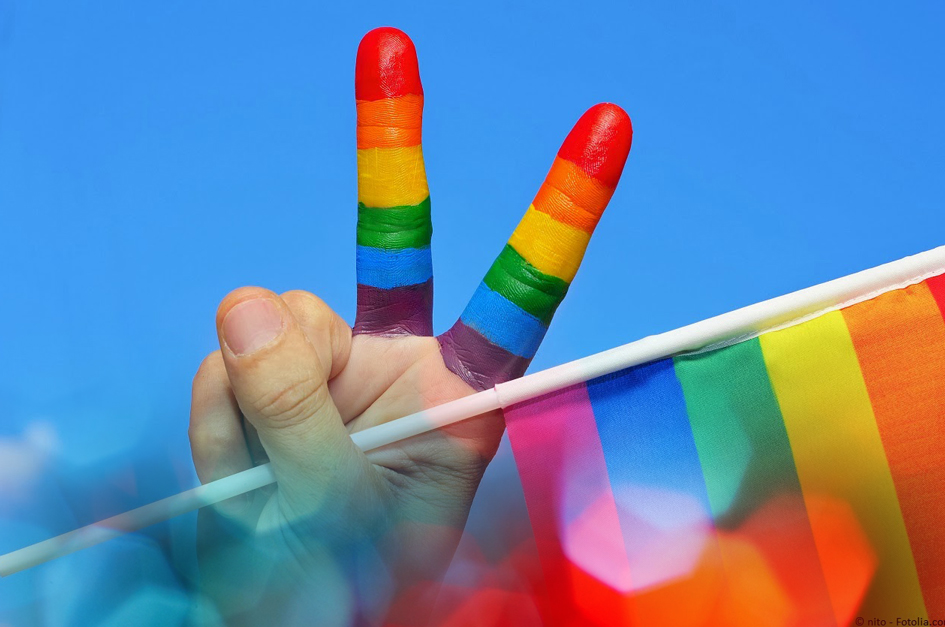
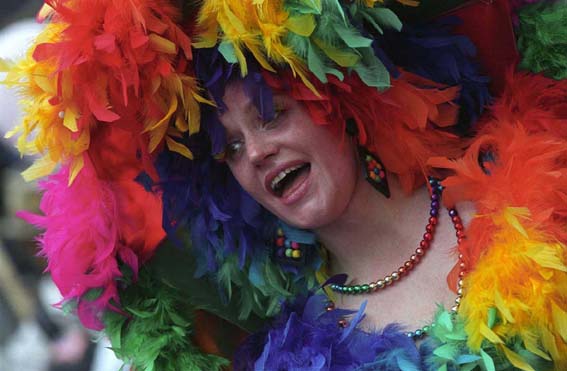
Yet during this month, there will also l be a lot of
pushback from the heterosexual communities and
individuals who just don’t understand what this whole
pride thing is about. I cant tell you the number of
times I have been cornered by straight people who look
me in the eyes and say, “I’m okay with you all being
gay, but why do you have to flaunt it in the streets?
You don’t see straight people doing that!” To which I
respond, “bullshit”.
I mean that in the kindest, most sincere way possible.
But straight and cisgender people are the most visible
people on planet earth, not just because of their sheer
numbers, but because their relationships, sexuality, and
gender expressions are seen as the “normative”
expressions, and therefore, uplifted and repeated in
every community around the country. Straight, cisgender
people hold hands as they walk down the street without
fear of getting accosted. They watch television shows
and movies, listen to music, and read books that center
on their relationships and gender expression. The
majority of advertisements on billboards, websites, and
television center on heterosexual and cisgender people.
And our government is set up to privilege and favor
heterosexual relationships above all others.
The Year to Be Queer
Why I Am Coming Out Now
Why We Won't Go Back
Why I Must Come Out
Why Am I So Gay?
In short, straight people flaunt their straightness all
day, every day, in every part of this country. And
despite the far-right narrative that the “gays” are
taking over our country, for a majority of LGBTQ people
in America, it is still incredibly uncomfortable at
best, dangerous at worst to express ourselves in our
communities. In a majority of states across our country,
our rights and dignity are not fully protected by the
law, and, in fact, there are fierce movements that seek
to oppress and marginalize us and our relationships.
So, while we have seen tremendous progress in the fight
for LGBTQ equality, inclusion, and rights in the United
States, the reality is that we are incredibly far from
being fully equal in every realm of society. And that is
why pride is so important.
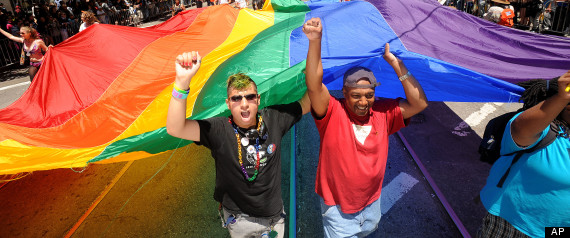
Info: Being an Effective Ally or Advocate
Pride: Tickle Me Pink
Still I Rise: A Look at the LGBTQ Struggle
Sage Advice to Young Queers From a Gay Elder
We're Living LGBTQ History: Will We Remember It?
TED Talk: LGBTQ Life Around the World
The Power of Inclusive Sex Education
James Corden's Tribute to Transgender Troops
Changing: Trans Teen Music Video
Open Letter to the Queer Community
Trans People Are Not a Threat to You
92 Year Old Woman Holds Same Sign for 30 Years
For many LGBTQ people, pride is the one time of the year
that they can be out and proud of who they are and who
they love. It’s the one time of year that they can stand
boldly in the streets with droves of other queer
individuals, proclaiming that we are fully human and
deserve to be celebrated and uplifted just like everyone
else. Even in cities that are seen as LGBTQ friendly, it
is still an incredibly healing experience to get to
march in parades or attend festivals where thousands
upon thousands of LGBTQ people are letting their lights
shine before all people without fear. Pride is often the
beginning of the process of healing from the trauma
inflicted on us by our heterosexist, patriarchal
society. Pride is a time where we step out of the
shadows and declare that we will no longer forced to
suppress our truest selves because of heterosexual
fragility and fear.
Now, of course, in the midst of all of the deeper causes
and meanings behind pride, it is also, most importantly,
a time of celebration. It’s a time to party, to relax,
and to let loose in public, which is something that
heterosexual and cisgender people get to do every single
day of the year, but something that LGBTQ people simply
don’t get to do. So yes, people of all shapes, sizes,
religions, ethnicities, races, and cultures will be
marching through the streets shirtless, and perhaps even
pantless (hello speedos!) but this has a lot less to do
with LGBTQ being hyper-sexual or promiscuous. Instead,
it’s a radical display of liberation and safety, a time
to let our bodies and lives be seen as the beautiful
displays of creativity and majesty that they are-
something, again, that straight people get to see and do
every single day.
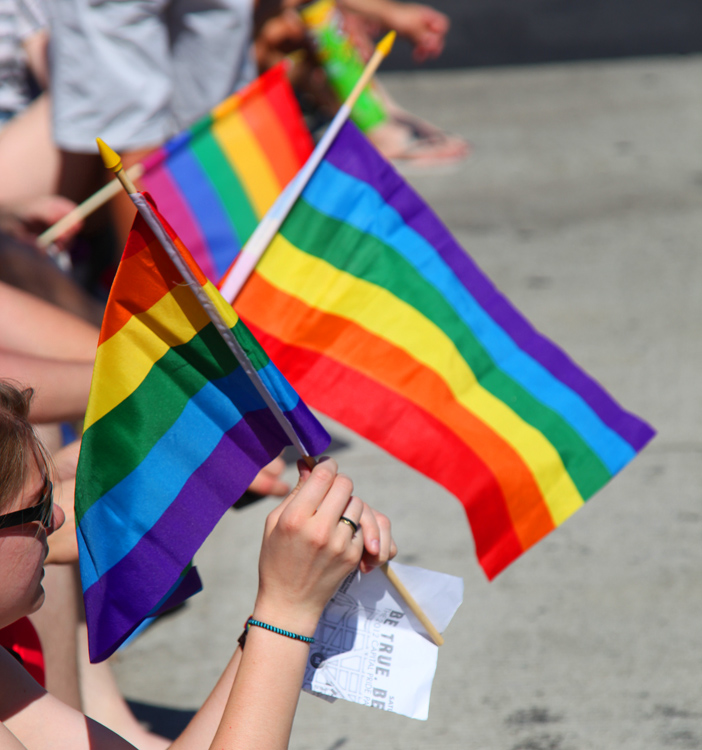
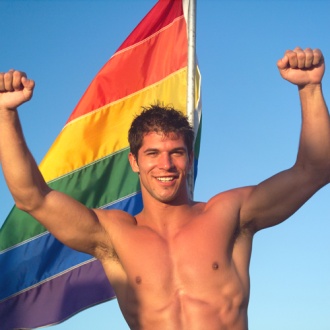
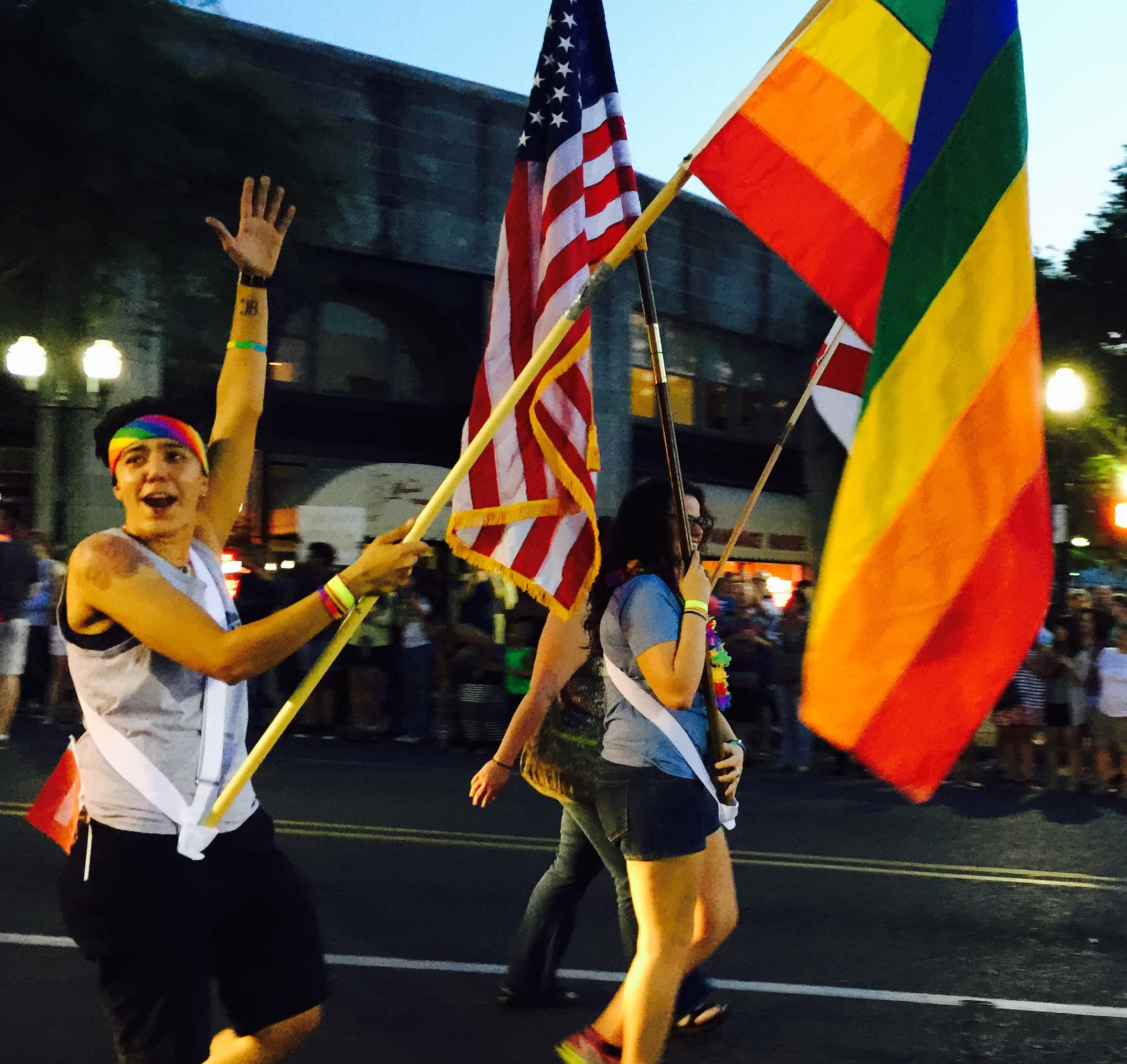
TED Talk: The Gift of Living Gay People
Guess the Sexual Orientation of Strangers
I Refuse to be Scared Back Into the Closet
TED Talk: What the Bible Says About Homosexuality
Info: LGBTQ Kids
Gender Neutral Pronouns: My Personal Pep Talk
If You Think Trans Bathroom Access Doesn't Matter...
The Power of Inclusive Sex Education
TED Talk: Why Am I So Gay?
James Corden's Tribute to Transgender Troops
Changing: Trans Teen Music Video
Pride marches and festivals were started as subversive
displays of light in the midst of the darkness of
heternormitivity and hatred, and today, for many, if not
most LGBTQ people, they still retain this important
meaning and power. Though they may look like giant
parties in the street, take a second and think about
what it feels like to march through a city, freely
expressing who you are, whom you love, and what you
desire for the first time without fearing that you’ll be
accosted, abused, or mocked. Think about all of the
children and teenagers who know they are LGBTQ but
cannot even begin to fathom taking a step out of the
closet for fear of abuse from their families, churches,
or peers, who look out at those celebrating pride and
see a glimpse of hope that things can get better, and
that they can be free, safe, and celebrated for who they
are. That is the power of pride, and that’s why pride
month is so damn important.
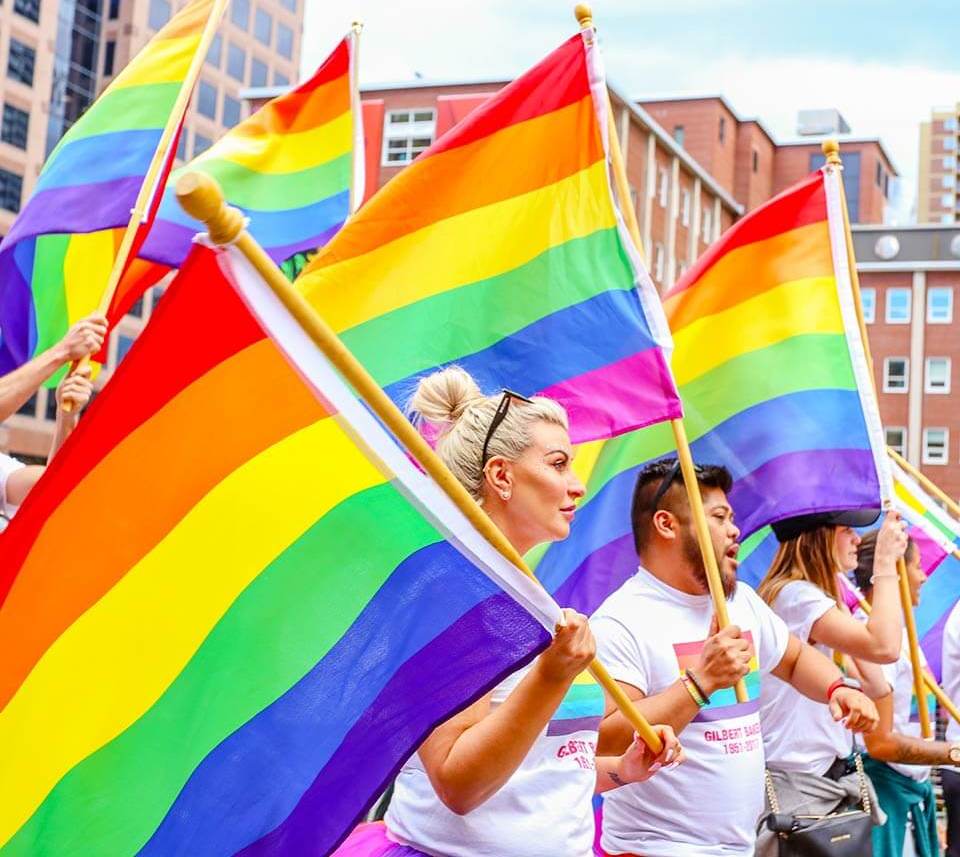
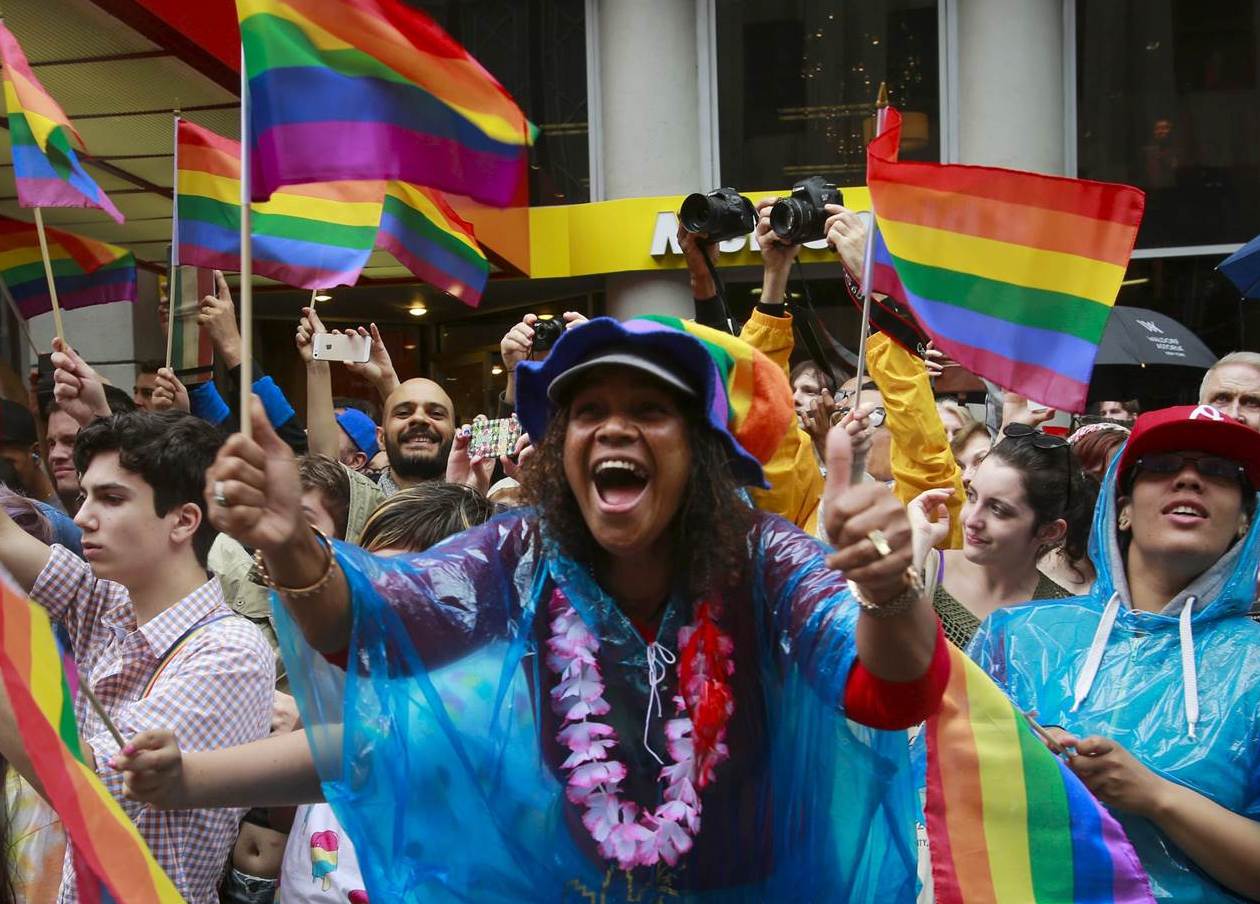
So, if you’re a straight person and you’re finding
yourself perplexed by the pride celebrations taking
place in your city this year, stop and remember that you
get to live out and proud every single day without fear,
without oppression, and without even thinking about it.
That is a unique gift that majority of LGBTQ people have
never gotten to experience. Think about all of the
hurdles to equality that still exist in our nation, and
the trauma that so many LGBTQ people have faced simply
because of who they are or who they love. And as you
reflect on the reality of LGBTQ people, I hope you begin
to realize the importance and power of pride, and
perhaps will even decide to pick up a rainbow flag and
stand on the sidelines cheering on your local LGBTQ
community as they fearlessly express their beauty in
your community.
[Source:
Brandan Robertson | Huffington Post | June 2017]
Info: Being an Effective Ally or Advocate
Pride: Tickle Me Pink
Still I Rise: A Look at the LGBTQ Struggle
Sage Advice to Young Queers From a Gay Elder
We're Living LGBTQ History: Will We Remember It?
TED Talk: LGBTQ Life Around the World
The Power of Inclusive Sex Education
James Corden's Tribute to Transgender Troops
Changing: Trans Teen Music Video
Open Letter to the Queer Community
Trans People Are Not a Threat to You
92 Year Old Woman Holds Same Sign for 30 Years
Message to the Little Boy Playing with Barbies
I wish I could go back, knowing what I know now
When I was a little boy I loved to play with Barbies and
dolls. Though my parents were supportive and loving,
they could not shield me from the world. It didn’t take
long for me to realize these toys weren’t meant for me,
whatever that means. It didn’t take long for me to
realize I risked verbal lashings or physical violence
from other kids if I didn’t learn the role I was meant
to play.

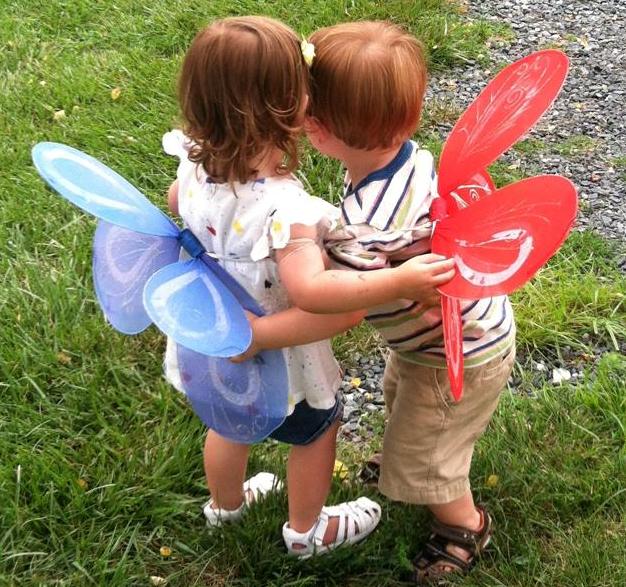
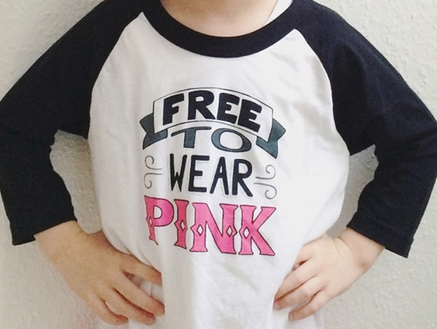
TED Talk: The Gift of Living Gay People
Guess the Sexual Orientation of Strangers
I Refuse to be Scared Back Into the Closet
TED Talk: What the Bible Says About Homosexuality
Info: LGBTQ Kids
Gender Neutral Pronouns: My Personal Pep Talk
If You Think Trans Bathroom Access Doesn't Matter...
The Power of Inclusive Sex Education
TED Talk: Why Am I So Gay?
James Corden's Tribute to Transgender Troops
Changing: Trans Teen Music Video
So, I played with Barbies and dolls in secret, behind
locked doors and under covers, always scared that I
would get caught. I was terrified of what it meant that
I liked “girl toys” instead of those that were meant for
boys, and confused about how my childlike inclinations
could make grown adults so ill at ease.
I wish I could go back, knowing what I know now, and
tell that little boy a few things. I wish I could tell
him that he need not feel shame for doing what makes him
happy, and that people being uncomfortable about what
toys he plays with only speaks volumes about them, and
reflects nothing about him. I wish I could tell him all
of the times life was going to try to tell him to be one
way, and how he always had the option to be himself. I
wish I could tell him not to waste his time pretending
to have crushes on girls, or forcing himself to walk
with what he thought was the gait of a man, or feeling
angry that these things did not come naturally to him. I
wish I could tell him that while the threats of violence
he feared are real, and that he would be called a
‘faggot’ more than once (lots more than once) or made to
feel ‘less than’ based on something he could not
control, that he would one day create a life where he
felt comfortable being who he was.
I wish I could tell him that he wasn’t alone, and that
he’d never been alone. I wish I could tell him there
were people at that moment who were fighting and risking
their lives to make things better for him, and that one
day it would be his job to do the same thing for the
other people who needed it.
I wish I could tell him that the world was big, and not
always so scary, and it would one day open like an
oyster, despite the times he tried to close it, and that
he deserves love from other people, yes, but most
importantly, from himself.
[Source:
Seamus Kirst | Journalist, Essayist, Author |
September 2017]
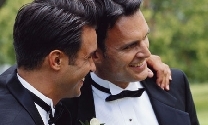
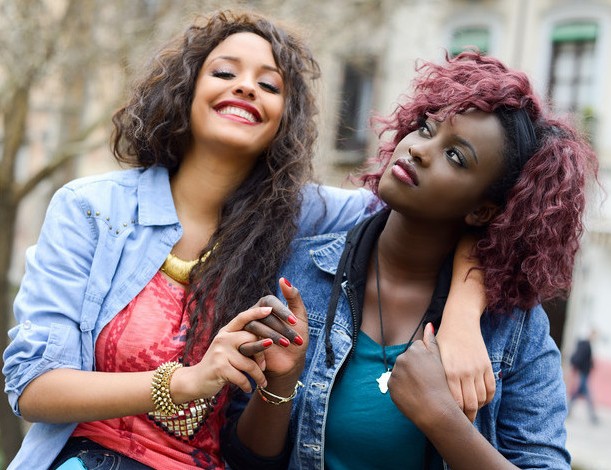

Gay Men's Chorus of Washington DC Sings to Drown Out
Protesters at Knoxville Pride
Why Pride: Explanation for Straight People
Info: LGBTQ Stereotypes
Boy George Covers YMCA
TED Talk: This is What LGBTQ Life is Like Around the
World
Why
Pride: Explanation for Straight People
Changing: Trans Teen Music Video
Why We Won't Go Back
The progress that I felt in
my own life seemed to be reversed
The last decade was a time of historic progress for our
country. Now, as 2016 comes to a close, we have come
upon an uncertain crossroads: whether to return to a
time of even greater discrimination and inequality, or
to declare with one clear voice that We Won’t Go Back.
Late in the night of November 8, as I stood beneath the
Jacob Javits Center’s towering glass ceiling in
Manhattan alongside my husband, Nate, that crossroads
came into clear view. A few steps away, a little girl
was sobbing on the floor. She had spent hours coloring a
map of the United States, atop which large, colorful
crayon print read, “Hillary for President.” By then, the
map had more red than blue, and we realized that little
girl’s wishes (and more than half of the country’s) were
not to be. As we exited the building amid fallen
American flags and discarded “Clinton/Kaine” buttons, I
unconsciously whispered, “It feels like we’re in an
alternate universe.”
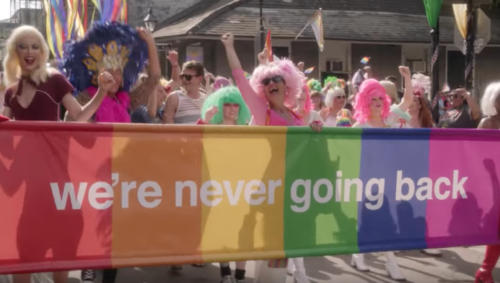

TED Talk: The Gift of Living Gay
Advocate Mag: The Acronym Struggle is Real
My Dad Says You're a Fag
People Guess the Sexual Orientation of Strangers
I Refuse to be Scared Back Into the Closet
TED Talk: What the Bible Says About Homosexuality
Gender Neutral Pronouns: My Personal Pep Talk
If You Think Trans Bathroom Access Doesn't Matter...
That sentiment was certainly shared by millions of my
fellow citizens November 8. But for me, the outcome of
the electoral vote soon felt both very personal and
real, that somehow the collective decision of more than
62 million strangers was a recalibration of everything I
thought true about my country. Perhaps this was because,
like many other young people, I had volunteered and
worked for Barack Obama even before he decided to run
for president, holding a “Draft Obama” sign on the
frozen streets of Manchester, NH, working for his
campaign in 2008 and 2012, and later in the White House.
Then, on New Year's Eve in 2012, I had asked my fiancé
to marry me inside the historic Stonewall Inn, the site
of the origin story for the modern LGBTQ movement. And
just over a year before walking inside the Javits
Center, I married my husband in front of our friends and
family, equal in their eyes, but also equal in the eyes
of the country I love.
Suddenly, on November 8, 2016, the progress that I felt
in my own life seemed to be reversed by 46 percent of
the electorate, and many of the reasons why are well
documented.

Donald Trump is assembling one of the most anti-LGBTQ
Administrations in modern American history. Jeff
Sessions, Betsy DeVos, Ben Carson, James Mattis, and
many others filling his Cabinet (without even mentioning
the abysmal record of Vice President-elect Mike Pence)
have categorically opposed equality for years. And then
there’s the troubling rise of hate crimes since the
election; the disconcerting spike of calls to suicide
hotlines, many of them LGBTQ; and the elevation of a
candidate who has personally promoted bigotry, misogyny,
and division throughout his entire pursuit of elective
office. Surely, these developments were more than enough
to keep millions of my peers and me curled up in a fetal
position for a few days in early November.
Yet in the thick of my vow never to leave my house
again, I was reminded of the words of the legendary
LGBTQ activist Sylvia Rivera: “Hell hath no fury like a
drag queen scorned.” Said differently: We Won’t Go Back.
Surely, those four words must have motivated great
Americans like Sylvia, when she rioted for justice in
front of Stonewall; they must have inspired Harvey Milk
when he confronted likely death to tell us that we must
“never be silent”; and they surely gave James Baldwin
solace when he said, bravely, “Love him and let him love
you. Do you think anything else under heaven really
matters?”

For me, We Won’t Go Back not only summed up the LGBTQ
struggle to come, but also the African-American, Latino,
immigrant, American, and human struggle as well. As soon
as I said those four words out loud at the end of that
long week in November, I again found hope. So I created
a campaign with the same name to give Americans of all
backgrounds the opportunity to fight for the highest
ideals of the country they love.
We Won’t Go Back is now a place to contact our elected
officials; to support the causes we believe in; to
organize, volunteer, and get registered to vote; and to
build an inclusive, hopeful future. Most importantly, I
hope We Won’t Go Back enables new voices to be heard and
stories to be told. Using #WeWontGoBack, you can tweet,
write, or record a video telling the world why you won’t
go back, what you’re fighting for, and what’s at stake
for you, your family, and your community.
As one of our supporters said, “I won’t go back because
I’ve fought so long to be here.” Indeed, we all have.
And we’ve come too far to turn back now.
[Source:
Jared Milrad | Actor, Writer, Lawyer, Entrepreneur |
December 2016]
TED Talk: The Gift of Living Gay
Advocate Mag: The Acronym Struggle is Real
My Dad Says You're a Fag
People Guess the Sexual Orientation of Strangers
I Refuse to be Scared Back Into the Closet
TED Talk: What the Bible Says About Homosexuality
Gender Neutral Pronouns: My Personal Pep Talk
If You Think Trans Bathroom Access Doesn't Matter...
Here’s Why We Grieve Today
We ratified hatred, fear,
racism, bigotry, and intolerance
I don’t think you understand us right now. I think you
think this is about politics. I think you believe this
is all just sour grapes; the crocodile tears of the
losing locker room with the scoreboard going against us
at the buzzer. I can only tell you that you’re wrong.
This is not about losing an election. This isn’t about
not winning a contest. This is about two very different
ways of seeing the world.
Hillary supporters believe in a diverse America; one
where religion or skin color or sexual orientation or
place of birth aren’t liabilities or deficiencies or
moral defects. Her campaign was one of inclusion and
connection and interdependency. It was about building
bridges and breaking ceilings. It was about going high.
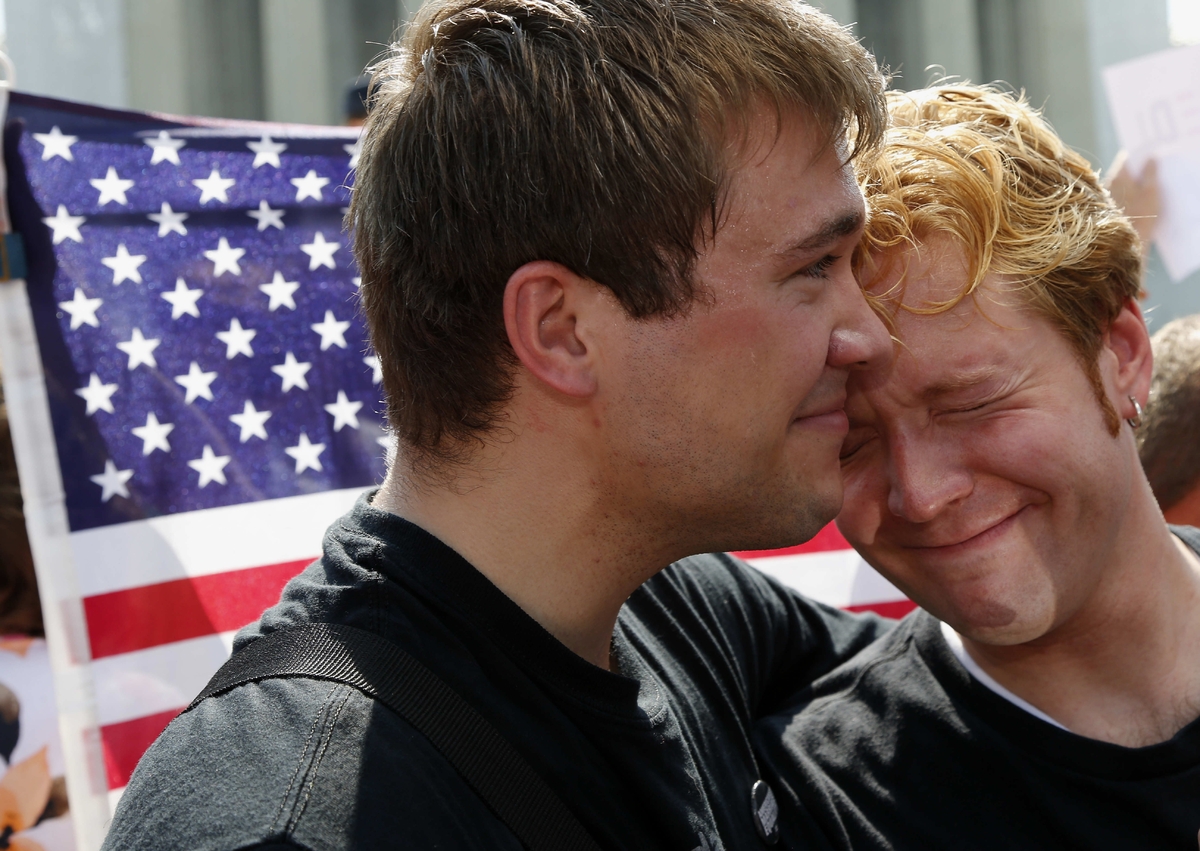
Trump supporters believe in a very selective America;
one that is largely white and straight and Christian,
and the voting verified this. Donald Trump has never
made any assertions otherwise. He ran a campaign of fear
and exclusion and isolation, and that’s the vision of
the world those who voted for him have endorsed.
They have aligned with the wall-builder and the
professed pussy-grabber, and they have co-signed his
body of work, regardless of the reasons they give for
their vote:
Every horrible thing Donald Trump ever said about women
or Muslims or people of color has now been validated.
Every profanity-laced press conference and every call to
bully protestors and every ignorant diatribe has been
endorsed. Every piece of anti-LGBTQ legislation Mike
Pence has championed has been signed-off on. Half of our
country has declared these things acceptable, noble,
American.
This is the disconnect and the source of our grief
today. It isn’t a political defeat that we’re lamenting,
it’s a defeat for Humanity. We’re not angry that our
candidate lost. We’re angry because our candidate’s
losing means this country will be less safe, less kind,
and less available to a huge segment of its population,
and that’s just the truth.
Those who have always felt vulnerable are now left more
so. Those whose voices have been silenced will be
further quieted. Those who always felt marginalized will
be pushed further to the periphery. Those who feared
they were seen as inferior now have confirmation in
actual percentages. Those things have essentially been
campaign promises of Donald Trump, and so many of our
fellow citizens have said this is what they want too.
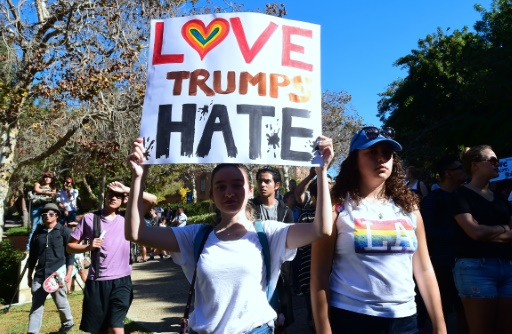
This has never been about politics.
This is not about one candidate over the other.
It’s not about one’s ideas over another’s.
It is not blue vs. red.
It’s not her emails vs. his bad language.
It’s not her dishonesty vs. his indecency.
It’s about overt racism and hostility toward minorities.
It’s about religion being weaponized.
It’s about crassness and vulgarity and disregard for
women.
It’s about a barricaded, militarized, bully nation.
It’s about an unapologetic, open-faced ugliness.
And it is not only that these things have been ratified
by our nation that grieve us; all this hatred, fear,
racism, bigotry, and intolerance, it’s knowing that
these things have been amen-ed by our neighbors, our
families, our friends, those we work with and worship
alongside. That is the most horrific thing of all. We
now know how close this.
It feels like living in enemy territory being here now,
and there’s no way around that. We wake up today in a
home we no longer recognize. We are grieving the loss of
a place we used to love but no longer do. This may be
America today but it is not the America we believe in or
recognize or want.
This is not about a difference of political opinion, as
that’s far too small to mourn over. It’s about a
fundamental difference in how we view the worth of all
people, not just those who look or talk or think or vote
the way we do.
Grief always laments what might have been, the future we
were robbed of, the tomorrow that we won’t get to see,
and that is what we walk through today. As a nation we
had an opportunity to affirm the beauty of our diversity
this day, to choose ideas over sound bytes, to let
everyone know they had a place at the table, to be the
beacon of goodness and decency we imagine that we are,
and we said no.
The Scriptures say that weeping endures for a night but
joy comes in the morning. We can’t see that dawn coming
any time soon. And this is why we grieve.
[Source:
John Pavlovitz | Pastor of North Raleigh Community
Church | November 2016]
The LGBTQ Movement is Not Just About Sexuality
Thank God I'm Gay
TED Talk: Accepting My Transgender Daughter
The People for Whom Human Rights Have No Meaning
Celebrating Marriage Equality
Deciding Who We Are
TED Talk: Danger of Hiding Who You Are
The Frozen Conflict of LGBTQ Rights
If Loving You is Wrong
Letter to My Partner
On our first date, you may have thought it was oddly
endearing that I explained the Stonewall riots in detail
and railed against anti-gay Texan politicians. Over
romantic candlelight, you held my hand gently as I
criticized the Pope and quoted homophobic lines from his
last three speeches. To my surprise, you stayed for
dessert, looked into my eyes and simply listened. I
can’t remember what I ranted about during the peach
cobbler.
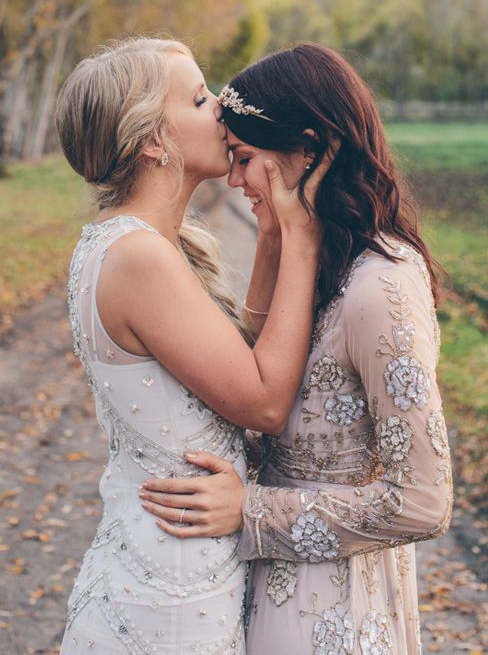

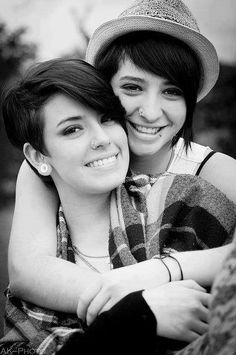
The Year to Be Queer
Why I Am Coming Out Now
Why We Won't Go Back
Why I Must Come Out
What Could a Gay Utopia Teach Urban America?
What Has and Has Not Changed
Miraculously, hundreds of dinners later, you still
listen to me. Sometimes softly nodding and sometimes
screaming in unison against the realities of injustice.
I love you for this but I can’t help but wonder — what
would we have time to talk about if being ourselves was
universally accepted? If we didn’t have to fight? If we
didn’t hold our breath every time “Christians” debated
what we’re allowed to do and where we’re allowed to go
to the bathroom? What would we do with all the extra
time? Would we take up gardening? Probably not. But we
could. We’d have the option.
Remember that time when we were walking in the mall and
a guy yelled right in our faces because we were holding
hands? For months after that, whenever we held hands, I
felt this tug on my heart, a twinge of anger, a surge of
adrenalin, bracing myself for it to happen again. It was
such a small thing in comparison to what other people
have gone through, and even that broke my heart. It’s
horrific that something as simple and sacred as holding
your hand would make me worry about our safety. I can’t
help but wonder — what would holding your hand feel like
if I never had to wonder?
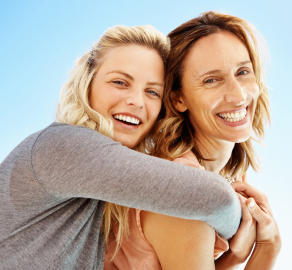
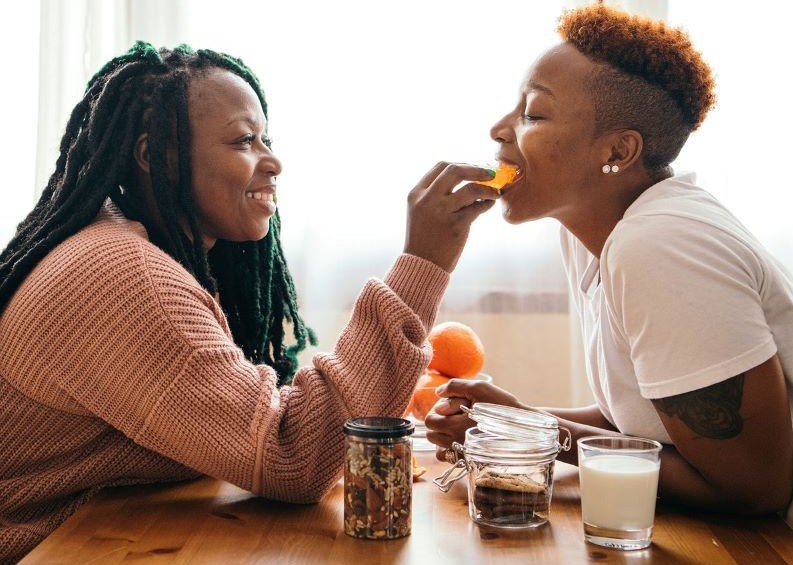
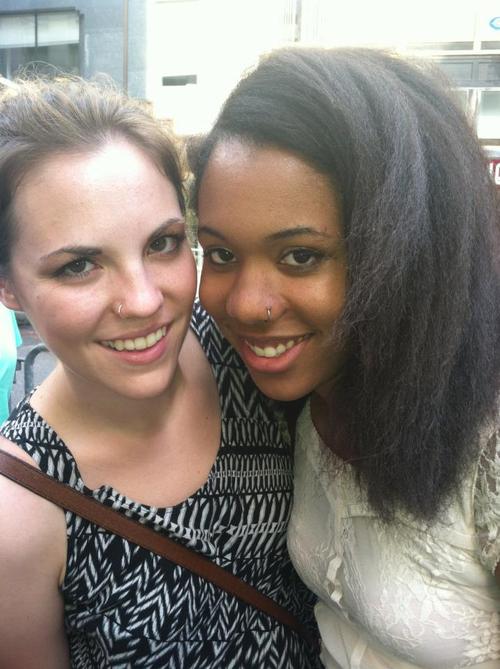
Don’t get me wrong, I love being gay. Especially with
you. If I wasn’t gay when I met you, I would choose to
be gay in a second. There’s just no way around it. And I
know I am privileged in many ways. I am/we are lucky.
Still, pieces of our lives are stolen without our
consent, because we are forced to pause. To stop and
read article after article after article, poring over
legislation and resolutions about how our love may put
us in danger.
We sign petitions and come out over and over again and
worry about our LGBTQ friends in other countries and ask
and ask and ask people to not get tired of caring
because we are tired as hell. It’s not that I don’t want
to care. I just don’t want to care about THIS.
Our love story should be about celebration, not
avoidance of tragedy. Because we are far more than that.
I just want to know what it’s like to not have our
relationship be the target of political or religious
ammunition. I want to stop defending our existence. We
could use that extra time to do whatever we wanted. How
glorious it would be to eat Kraft dinner at midnight
with nothing interesting to talk about! How wonderful to
open our newsfeed and be bored by the lack of
controversy then watch Netflix together! How beautiful
it would be to hold your hand and never wonder.
But until then... thank you. For being next to me for
the desperate sighs and the 2am tap-tap-tap typing of
letters to editors. For being next to me for all of the
victories and rainbow colored picket signs and lesbian
activist potlucks. Maybe one day we’ll get all of that
time back, but in the meantime, I’ll take whatever time
I can have with you.
[Source:
Pam Rocker | Huffington Post | May 2016]
The LGBTQ Movement is Not Just About Sexuality
Thank God I'm Gay
TED Talk: Accepting My Transgender Daughter
The People for Whom Human Rights Have No Meaning
Celebrating Marriage Equality
Deciding Who We Are
TED Talk: Danger of Hiding Who You Are
The Frozen Conflict of LGBTQ Rights
If Loving You is Wrong: A Letter to My Partner
Message to the Orlando Shooter
We’ve never been more
defiant than we are today
You tried but you foolishly came after the wrong
community. You forgot we wake up every day to face a
world that is against us. You failed to consider that
living our lives takes much more than just bravery. It
takes blistering defiance.
You may come into our sanctuaries of safety and shoot
103 of us, but you forgot; we’ve been tortured,
tormented, thrown off buildings, gassed, stripped of our
rights, tied to fences and beaten.
You underestimated our defiance. And every time one of
us dies, suffers or gets marginalized, we get that much
more defiant. This weekend we got 103 times more
defiant.
We sob for the loss, but our wounds will heal. And we
will continue to defy you with grace, compassion,
inclusion, celebration, joy, humor, creativity, peaceful
assembly and protest in the way only our community can.
That’s how we defy. We defy every day by
unapologetically living our lives in a world that’s
against us.
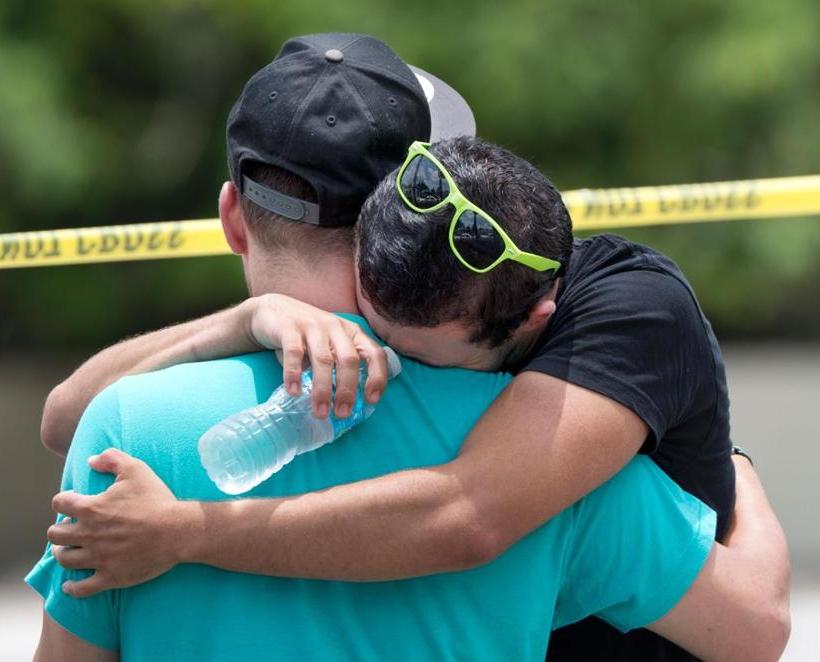
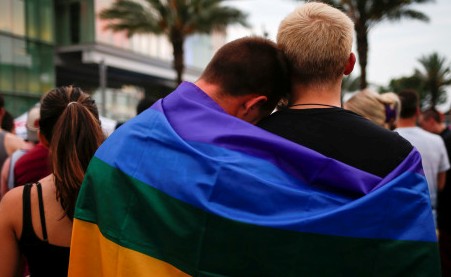
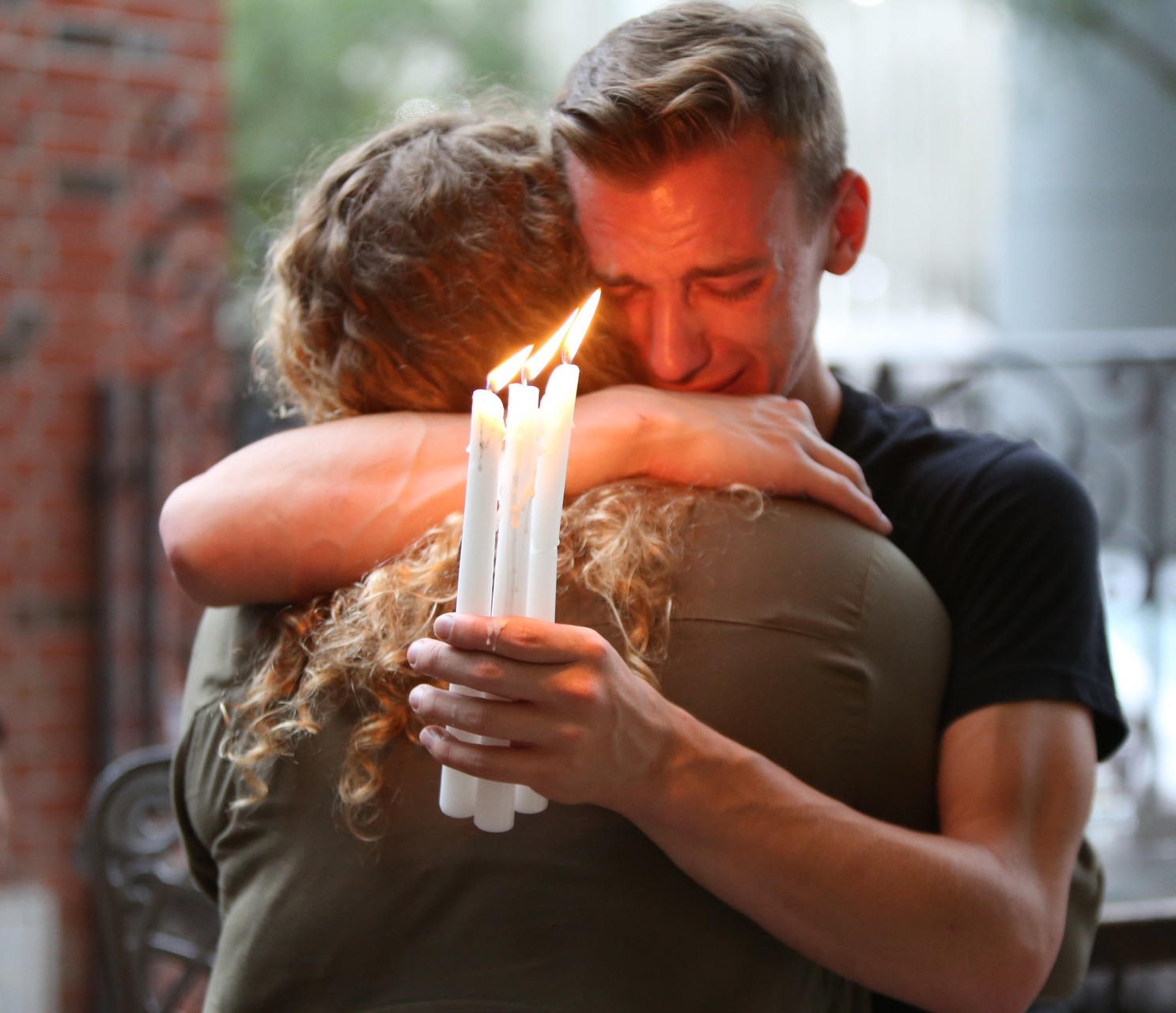
We don’t kill. We don’t terrorize. It’s pure weakness.
You forgot where we came from. You failed to see where
we are now.
You forgot that no one will ever stifle our defiance. No
terrorist. No legislator. No presidential candidate. No
bully. No zealot. No one.
We’ve never been more defiant than we are today. Your
plan failed. Now we will stand taller. We will be
prouder. We will dance freely in our clubs. We will get
loud. We will hold hands in public, even if we don’t
feel safe. We will spit in the face of bigotry.
This weekend we got 103 times more defiant. You failed.
[Source:
Kevin Chorlins | June 2016]
Is a Kinder More Loving World Possible?
Defying Hate with Love
TED Talk: Fifty Shades of Gay
US News: American Culture War
Millennials Support Full LGBTQ Rights
Rolling Stone: Worst States for LGBTQ People
TED Talk: Why Am I So Gay?
The LGBTQ Movement is Not Just About Sexuality
Discussing sex and romance
For a great number of people their sexual orientation
does match their romantic orientation -- but not always.
The LGBTQ movement has managed to conflate sexual and
romantic orientation through the decades and yet this
risks leaving many people confused about where exactly
they fit.
The narrow definitions and conflation of identities have
been so clearly shown by the treatment of aromantic and
asexual people within the LGBTQ community. Aro and ace
communities have been far better at recognizing
different nuances of identities than the wider LGBTQ
movement. The grey scale is a term in itself which
clearly shows the wonderful world of complicated and
personal identities. It is an acceptance that there are
not just 'on' or 'off' switches with sexuality and
romantic experiences. Yet ace and aro people face
erasure regularly within the LGBTQ community.
Conversations are designed around sexuality, the right
to always have sex but excluding those who do not have
the same desires. It is all about sex with members of
the same gender. Queer spaces are so often simply
pulling spaces, particularly when centered around
alcohol.
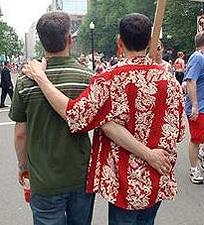
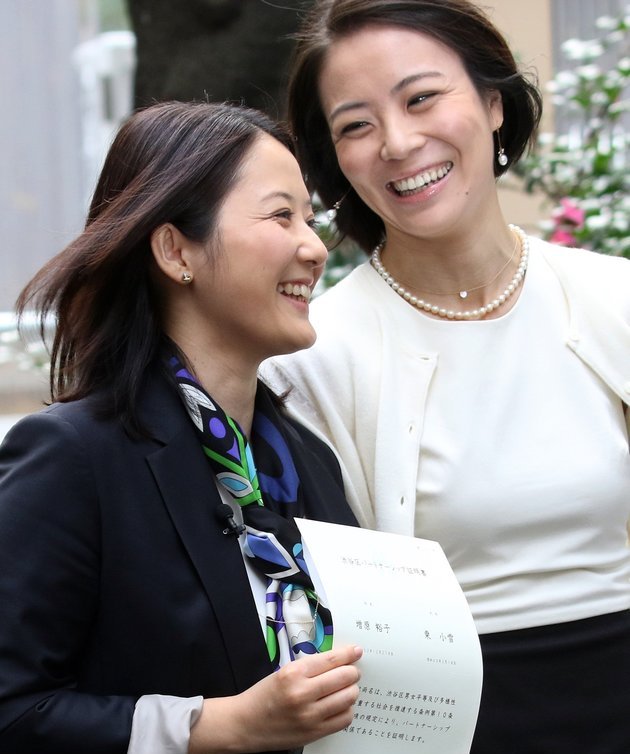
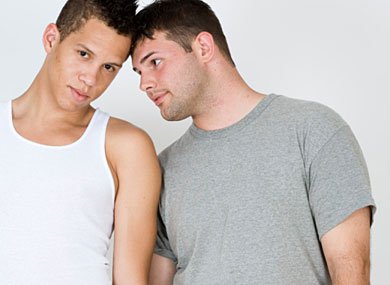
The Year to Be Queer
Why I Am Coming Out Now
Why We Won't Go Back
Why I Must Come Out
What Could a Gay Utopia Teach Urban America?
What Has and Has Not Changed
LGBTQ people do need places to fulfill sexual and
romantic desires free from harassment but that shouldn't
be the sole focus of spaces claiming to be for all
identities. We also need to address our terms, not only
is crying that we're for 'the freedom of love' incorrect
as it erases trans people, but it also erases aromantic
people which immediately says that this movement is not
for them.
The shift to make LGBTQ politics respectable has risked
abandoning many people who should be embraced into the
community. The constant focus on presenting LGBTQ people
as always in stable, loving, same gender relationships
(especially marriages) and with children presents a very
one dimensional idea of who belongs in this community.
If you don't want a romantic relationship but just want
sexual partners then there is the implication that
you're doing harm to the reputation of the community. If
you don't want sexual relationships with someone of the
same gender then the implication is you don't fit in at
all. Everything is designed around making LGBTQ people's
presentation as acceptable as possible to cisgender
heterosexual people.
This is also an issue for many who do not identify as
asexual or aromantic. For instance: it is entirely
possible to experience sexual attraction to one gender
but romantic attraction to another gender. One may be
heterosexual but that doesn't mean that are
automatically heteroromantic. I myself am bisexual yet
homoromantic (although because I experience romantic
attraction exclusively to women then that means I often
find far more acceptance in the LGBTQ community than
other bisexual women I know because they are
heteroromantic).
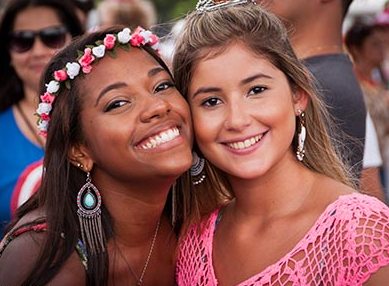
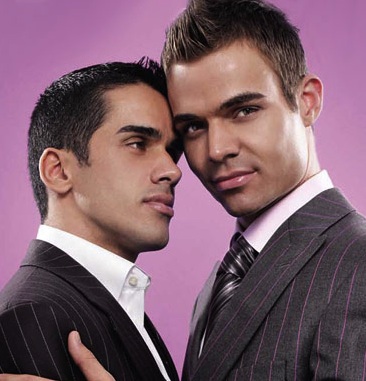
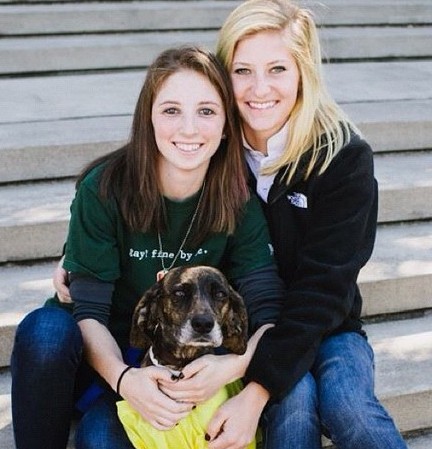
The LGBTQ world has become a marketing machine. Our
images and PR campaigns whether it comes to marriage
equality or floats at Pride have become carefully
crafted over the years. Gone are the radical political
elements that wanted to smash binaries and capitalism
and in its place is the LGBTQ happy family presented in
a very narrow and manipulated way.
LGBTQ organizations have become solely focused on
selling the Disney story: where two white, middle class
cis guys or two cis girls fall in love, get married and
have wonderful children. We've forgotten why we started
this fight. It was not for cis, straight, white, middle
class people to finally be able to tolerate us but for
the complete liberation from narrow binaries and
prejudices that dominate society. It was not just for
'gay love' but for people to be treated and recognized
as human beings who deserve nothing more or less than
total respect for their identities. It was for all those
outside of the norms society tried to force upon us and
that includes all of the variations of sexual and
romantic attractions that are not solely heterosexual or
heteroromantic.
[Source:
Stephanie Farnsworth | Charity Worker, LGBTQ Rights
Activist | January 2016]
The Year to Be Queer
Why I Am Coming Out Now
Why We Won't Go Back
Why I Must Come Out
What Could a Gay Utopia Teach Urban America?
What Has and Has Not Changed
Witness to Extraordinary History
Thousands had fought so hard
for this moment
We have few occasions in life to be witness to
extraordinary history. This is one of those days. Today
same-sex couples in Washington are getting married under
a law approved by the voters. For the first time in the
United States, their marriage is legal not because of
actions by legislatures or courts but because their
equal rights were affirmed by their peers across the
state at the ballot box. That shift is momentous and one
of which I am incredibly proud.
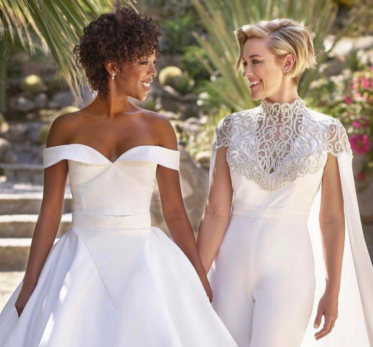

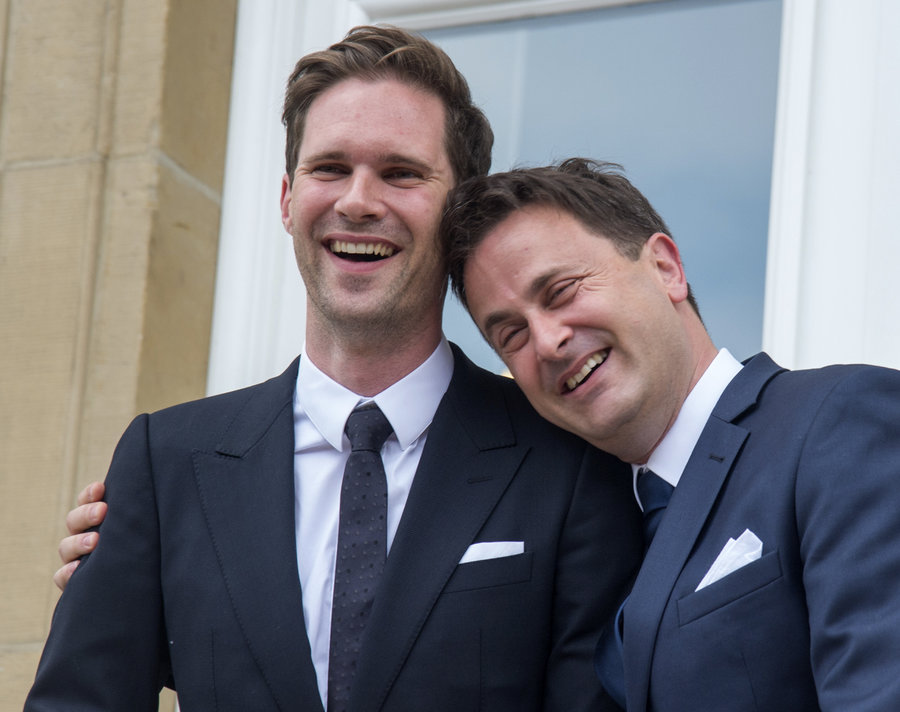
On election night I was overcome by emotion as I took
the stage for a celebration of our state's same-sex
marriage efforts. I looked out over a crowd of several
thousand who had fought so hard for this moment. They
were young and old, families and couples, military
members past and present, businesspeople and public
servants, of all races and all backgrounds, and for the
first time marriage equality was within their reach. It
was the most memorable moments in my 20 years in elected
office.
Like any journey, ours was one of a million steps by
thousands of everyday people. Nearly 25 years ago
Washington elected the first openly gay member of our
legislature, Cal Anderson. Today, 17 years after his
death, Cal's dream has been realized. We stand on his
shoulders and the shoulders of so many who brought us to
this point.


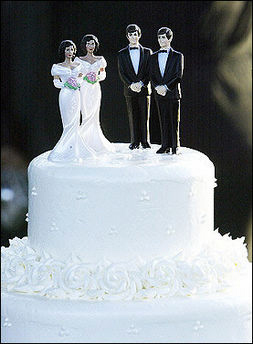
In Seattle the first couple to receive their marriage
license had been together for 35 years. Today, after a
very long engagement, they are getting married. Across
Washington similar stories abound. Hundreds stood in
line overnight so that they would not have to wait a
moment longer for the rights they deserve. Within the
first 24 hours more than 800 same-sex couples applied
for marriage licenses.
Just as importantly, the voters have told all our
families that they are equal under the law. They told
the children of same-sex families that their parents'
love is not different. To the parents who have fought so
fiercely for the rights of their much-loved gay and
lesbian children, Washington said they, too, will
someday witness their son's or daughter's wedding. And
we told the young people out there who are wondering
about their future that it does in fact get better, that
they will have the chance to grow up in a state that
loves and values them for who they are, not for whom
they love.
As my own daughters taught me, this is indeed the civil
rights issue of our time. There will come a time when,
across our country, the ability to marry the person you
love will not be an issue. Future generations will look
back and wonder why we ever denied this basic human
right. We can't rest until that moment. I will be with
you every step of the way.
[Source:
Chris Gregoire | Governor of Washington | December
2012]
TED Talk: LGBTQ Pastor's Journey
NY Times: Corrosive Politics That Threaten LGBTQ
Americans
The LGBTQ Movement is in Chaos
Info: Marriage Equality
NY Times: The Big Sway
TED Talk: Coming Out of the Closet
Coming out as a Christian
Where Would MLK Have Stood on Marriage Equality?
TED Talk: Some Boys Are Born Girls
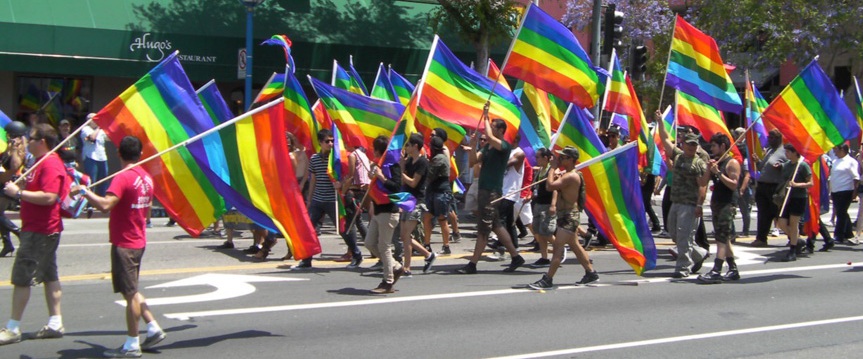
Congress Needs to Pass Employment Non-Discrimination Act
Message from President Obama
Here in the United States, we're united by a fundamental
principle: we're all created equal and every single
American deserves to be treated equally in the eyes of
the law. We believe that no matter who you are, if you
work hard and play by the rules, you deserve the chance
to follow your dreams and pursue your happiness. That's
America's promise.
That's why, for instance, Americans can't be fired from
their jobs just because of the color of their skin or
for being Christian or Jewish or a woman or an
individual with a disability. That kind of
discrimination has no place in our nation. And yet,
right now, in 2013, in many states a person can be fired
simply for being lesbian, gay, bisexual, or transgender.
As a result, millions of LGBTQ Americans go to work
every day fearing that, without any warning, they could
lose their jobs -- not because of anything they've done,
but simply because of who they are. It's offensive. It's
wrong. And it needs to stop, because in the United
States of America, who you are and who you love should
never be a fireable offense.
That's why Congress needs to pass the Employment
Non-Discrimination Act, also known as ENDA, which would
provide strong federal protections against
discrimination, making it explicitly illegal to fire
someone because of their sexual orientation or gender
identity. Americans ought to be judged by one thing only
in their workplaces: their ability to get their jobs
done. Does it make a difference if the firefighter who
rescues you is gay -- or the accountant who does your
taxes, or the mechanic who fixes your car? If someone
works hard every day, does everything he or she is
asked, is responsible and trustworthy and a good
colleague, that's all that should matter.
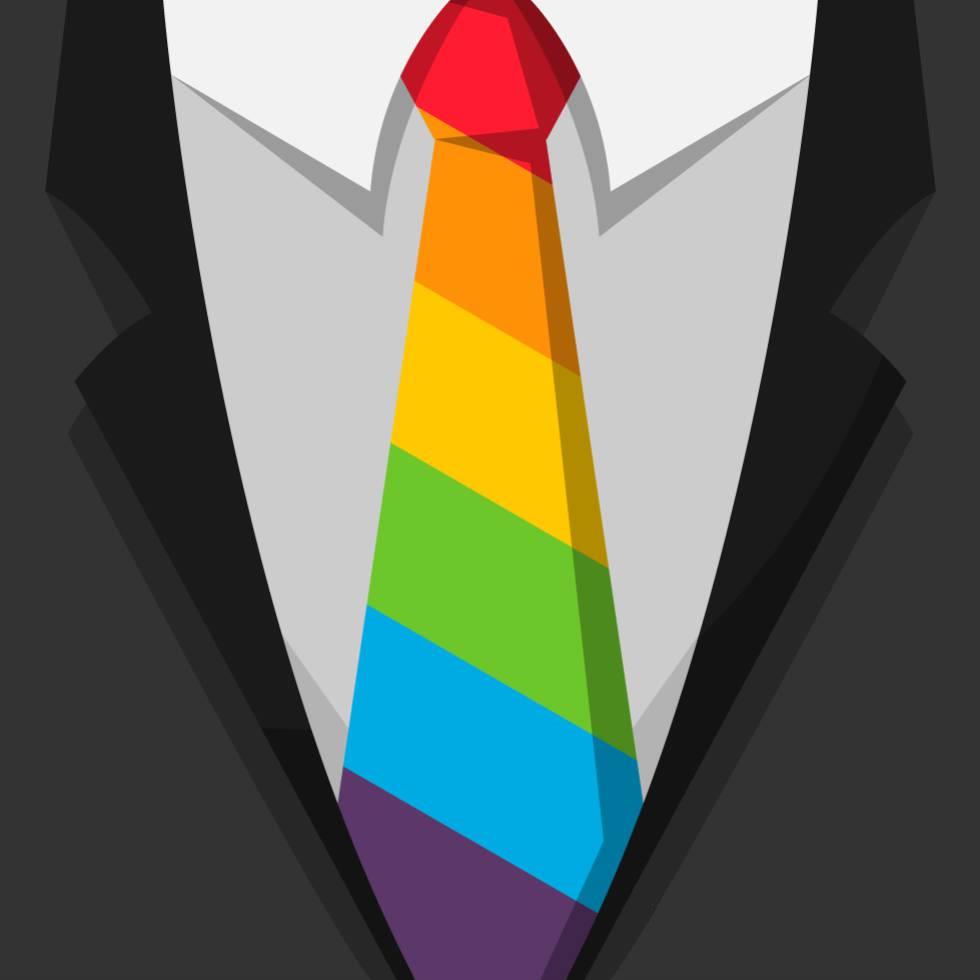
Business agrees. The majority of Fortune 500 companies
and small businesses already have nondiscrimination
policies that protect LGBTQ employees. These companies
know that it's both the right thing to do and makes good
economic sense. They want to attract and retain the best
workers, and discrimination makes it harder to do that.
So too with our nation. If we want to create more jobs
and economic growth and keep our country competitive in
the global economy, we need everyone working hard,
contributing their ideas, and putting their abilities to
use doing what they do best. We need to harness the
creativity and talents of every American.
So I urge the Senate to vote yes on ENDA and the House
of Representatives to do the same. America is at a
turning point. We're not only becoming more accepting
and loving as a people, we're becoming more just as a
nation. But we still have a way to go before our laws
are equal to our Founding ideals. As I said in my second
inaugural address, our nation's journey toward equality
isn't complete until our gay brothers and sisters are
treated like anyone else under the law, for if we are
truly created equal, then surely the love we commit to
one another must be equal as well.
In America of all places, people should be judged on the
merits: on the contributions they make in their
workplaces and communities, and on what Martin Luther
King Jr. called "the content of their character." That's
what ENDA helps us do. When Congress passes it, I will
sign it into law, and our nation will be fairer and
stronger for generations to come.
[Source:
President Barack Obama | November 2013]
TED Talk: Problems Facing LGBTQ Youth Today
CNN: We Have a Role in Fight Against LGBTQ
Discrimination
Info: LGBTQ Martketplace
Teen Ink: LGBTQ Equality Rights
TED Talk: Why Am I So Gay?
People Guess the Sexual Orientation of Strangers
Info: LGBTQ Workplace
Voice of America: The LGBTQ Debate
TED Talk: Myths of Gay Adoption
NY Times: Challenges That Remain for LGBTQ People
Gay is Good for America
Rejuvenating rather than
destroying the institution
At their convention, Democrats finally say it loud and
clear. More than a dozen speakers mentioned LGBTQ
equality on the first two nights of the Democratic
convention, including Michelle Obama, who positioned
marriage equality as a new ingredient of American
greatness: “If proud Americans can be who they are and
boldly stand at the altar with who they love, then
surely, surely we can give everyone in this country a
fair chance at that great American Dream.” Openly gay
speakers are getting primetime billing. A record-setting
8 percent of delegates are LGBTQ. The party’s
unprecedented embrace of gay equality comes a week after
Joe Biden thanked gay rights advocates in Provincetown
for “freeing the soul of the American people.” The gay
rights movement, said the vice president, was advancing
the “civil rights of every straight American.” For gay
people’s “courage,” he said, “We owe you.”
There you have it: For the first time ever, Democrats at
their most public, high-profile moment are treating gay
rights as a political winner. They’re moving along with
public opinion: In the latest Harris Interactive poll,
52 percent of likely voters favored same-sex marriage,
including 70 percent of Democrats and 55 percent of
independents.

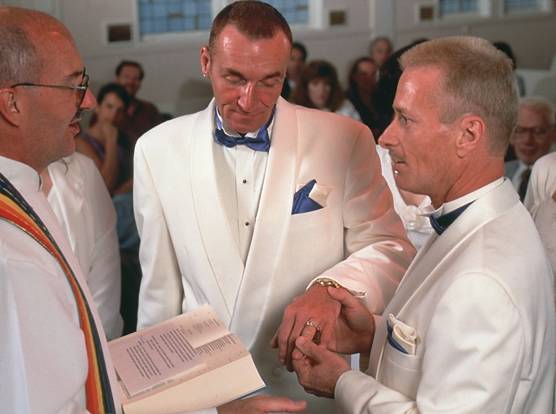
If the gay love affair is part political calculation, it
also reflects a lesson from both American history and
queer theory: minorities need not always conform to the
majority, and their advances can actually make things
better for everyone. This message helps rewrite the
false script conservatives have created (with too much
help from liberals) that representing the needs of
minorities is mere interest-group politics, the doling
out of goodies in exchange for votes.
Instead, equality is increasingly (and correctly) cast
as a means of improving not only the lot of minorities,
but the country for us all. New York magazine recently
reported the trend of a growing number of straight
couples quoting gay marriage court decisions in their
own wedding ceremonies. Expanding access appears to be
rejuvenating rather than destroying the institution. As
Slate reported earlier this year, statistics bear this
out. The marriage rate in Massachusetts, the first state
to allow gay couples to wed, actually went up in the
years same-sex marriage became legal, even adjusting for
the initial 16 percent increase caused by pent-up demand
by gay couples waiting to wed. What’s more, in each of
the five states that legalized same-sex marriage
starting in 2004, divorce rates dropped even while the
average rate across the country rose. These figures give
the lie to breathless warnings that same-sex marriage
will harm marriage. Also, an estimated 2 million kids
have a parent who is LGBTQ, and a subset of them have
two gay parents who are raising them together—for all
the reasons conservatives praise marriage, these kids
benefit when their parents can make their commitments
legal, another benefit to LGBTQ equality that goes
beyond the rights of gays themselves.
Is a Kinder More Loving World Possible?
Defying Hate with Love
TED Talk: Fifty Shades of Gay
US News: American Culture War
People Guess the Sexual Orientation of Strangers
Info: LGBTQ Community
Millennials Support Full LGBTQ Rights
Rolling Stone: Worst States for LGBT People
TED Talk: Why Am I So Gay?
Add to the list the end of “don’t ask, don’t tell.” The
policy deprived the nation of thousands of capable
service members across its 17 years (on average, two
were kicked out every day, at a taxpayer cost of
hundreds of millions of dollars). Many were
mission-critical specialists with skills like Arabic
translation and counterterrorism expertise. Today our
military can harness that talent. And now that the
controversy has been resolved, elite colleges that used
to supply our military with top talent are again
welcoming recruiters whom they’d moved off campus due to
their discriminatory policy.
Equal rights fosters openness, which has positive
fallout of its own. There are no doubt fewer sham
marriages than there were in the 1950s. Gay-straight
friendships are more authentic without a lifelong secret
blocking discussion about love and intimacy. Straight
men are likely more forgiving of their own nonconformist
impulses (perhaps including passing same-sex desires).
Parents have fewer estranged relations with sons and
daughters whose deepest secrets and fears they once
could never know, and whose struggles with depression
and loneliness they sought in vain to understand. And
the nation has embarked on an important discussion about
bullying and youth suicide that stands to have real
benefits for all young people, not just LGBTQ ones, who
feel despair because they sense they are different or
alone.
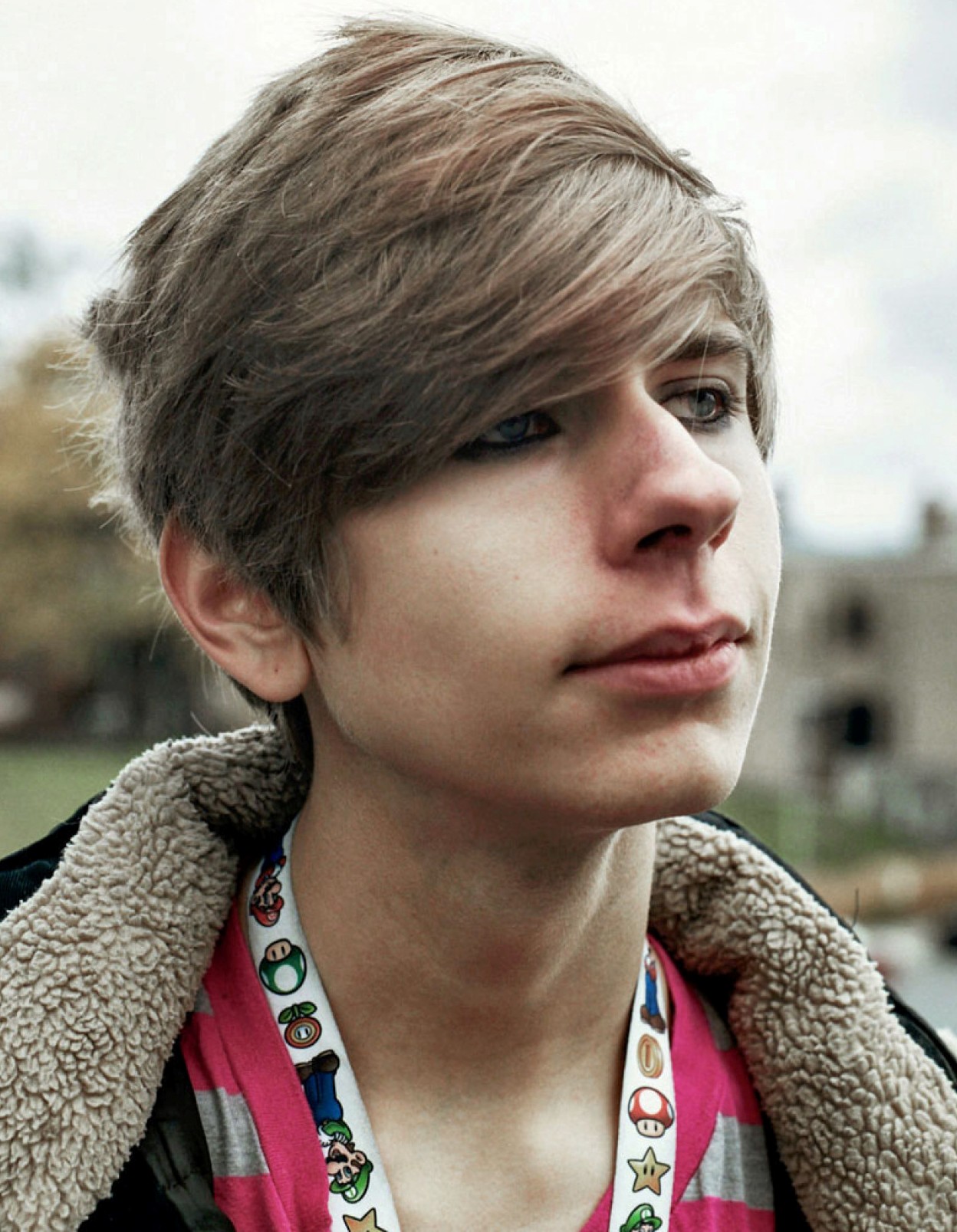
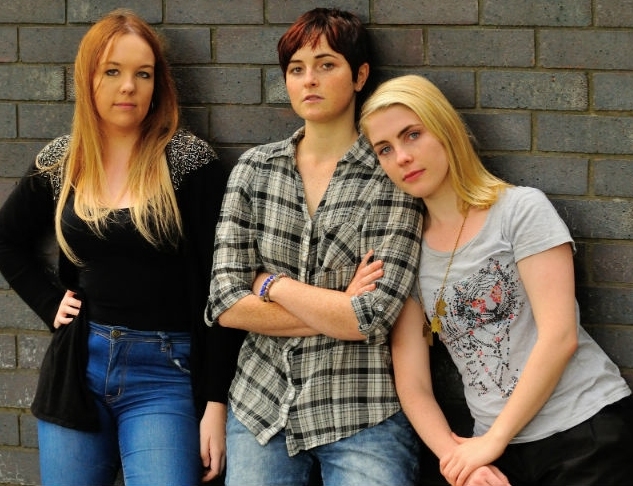
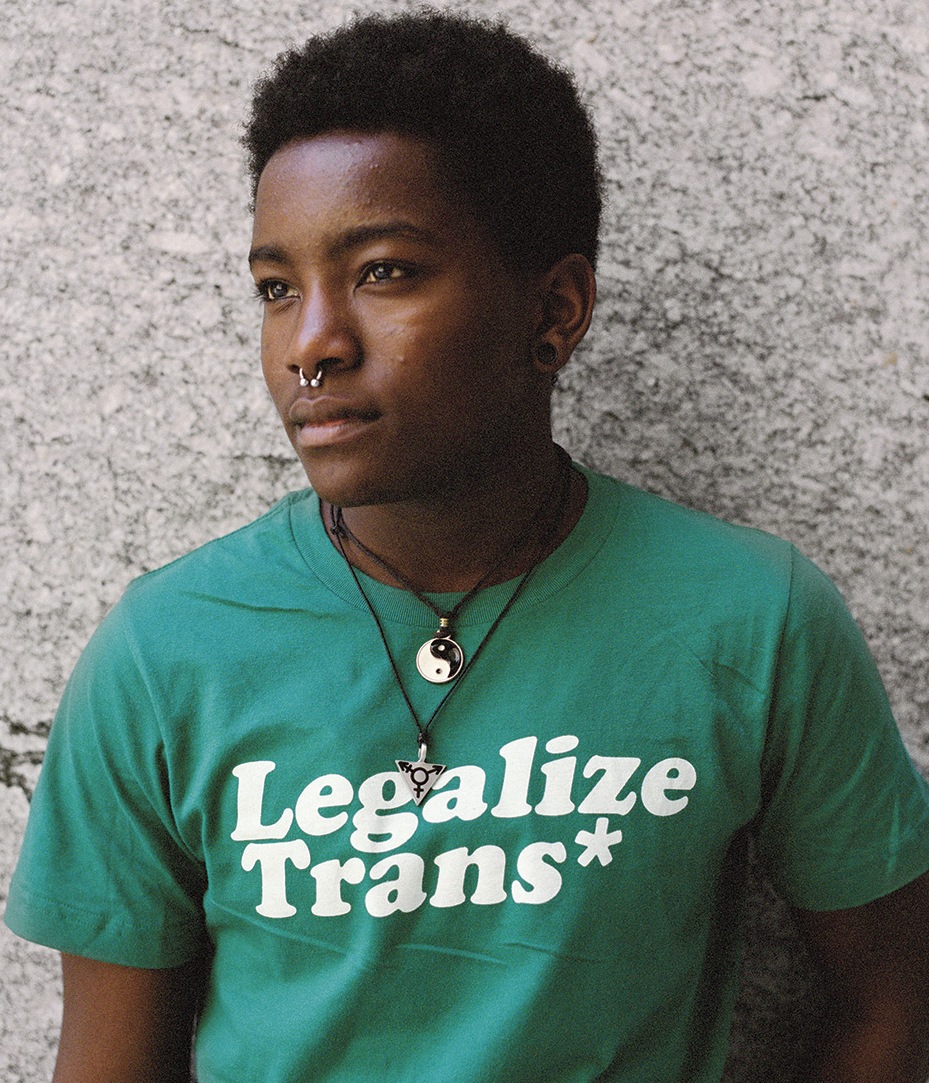
The principle that minority equality helps the majority
was one of Martin Luther King Jr.’s most important
insights during the black civil rights movement. “The
stirring lesson of this age,” King declared, “is that
mass nonviolent direct action is not a peculiar device
for Negro agitation,” but a “method for defending
freedom and democracy, and for enlarging these values
for the benefit of the whole society.” As the historian,
Taylor Branch has explained, “The civil rights movement
liberated segregationists themselves,” just as King had
theorized. Racial terrorism dropped and integration led
to business growth and a decline in poverty.
Enfranchised black voters helped revive a genuine
two-party political system in the South as the politics
of white supremacy faded. Meritocracy replaced arbitrary
exclusion.
In 2009, Brent Childers, a Southern Baptist and onetime
anti-gay bigot, wrote movingly in Newsweek of the kind
of personal liberation that both King and Biden
described: “Once I walked away from the Church’s
teachings of rejection and condemnation of gay people,
my relationship with God transcended to a higher
spiritual plateau.” Childers’ religious transformation
is a secular experience for many others. But the point
is the same. Americans suffer for holding prejudices
that we know enough to shed. The souls of Americans
really do need freeing. And the battle for gay rights is
helping. It’s good for the Democrats that they’ve
figured this out. More importantly, it's good for the
country.
[Source:
Nathaniel Frank | Slate Magazine | September 2012]
Is a Kinder More Loving World Possible?
Defying Hate with Love
TED Talk: Fifty Shades of Gay
US News: American Culture War
People Guess the Sexual Orientation of Strangers
Info: LGBTQ Community
Millennials Support Full LGBTQ Rights
Rolling Stone: Worst States for LGBT People
TED Talk: Why Am I So Gay?
The Places I Have Come Out
Coming out is not a one-time
deal
--In the school library. My father is away at a
conference for a distant summer in Germany. He will be
the hardest to tell, I reason, for the missed linguistic
cues, the generational gap as precarious as a lion's
hinging jaw, or, rather, because he just doesn't get it.
It's a safe bet. I write him a 10-page email, glancing
at the other computer carrels. Due to competing time
zones, I receive his response the next morning:
"Surprised, but not shocked. Love, Dad."
--In a vestibular instant messenger window, to the girl
who will become my first girlfriend. We will break up
eight months later, over a girl from Connecticut whom
she meets in an online forum. Like other lesbians I
know, we remain close friends to this day.
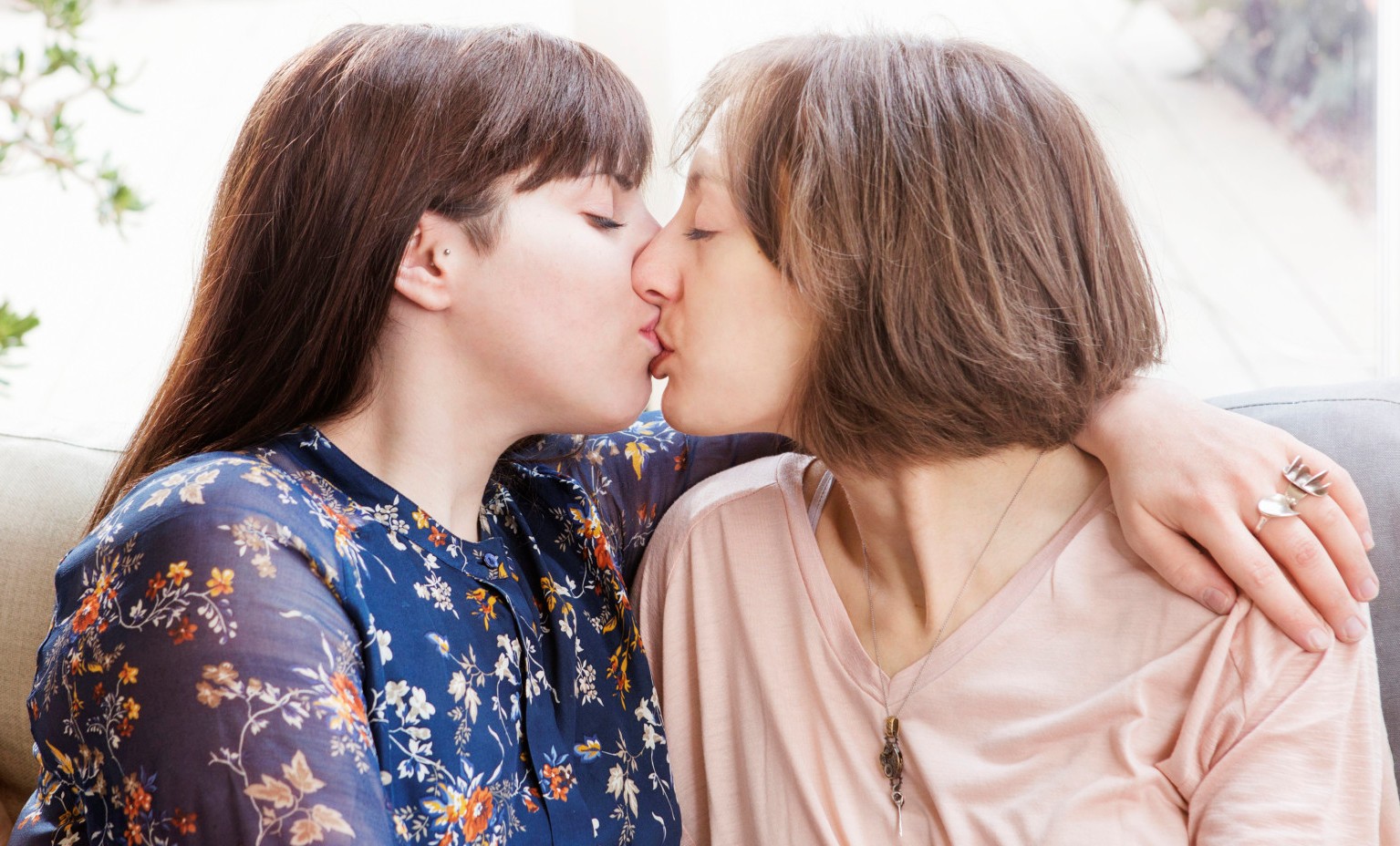 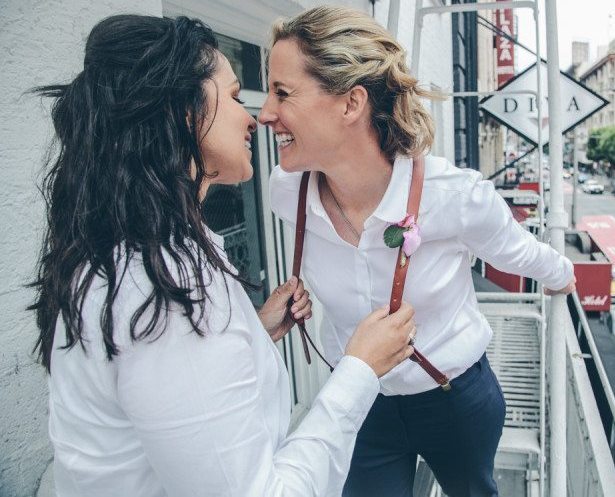
Still I Rise: A Look at the LGBTQ Struggle
Sage Advice to Young Queers From a Gay Elder
We're Living LGBTQ History: Will We Remember It?
Info: Coming Out
Open Letter to the Queer Community
Trans People Are Not a Threat to You
92 Year Old Woman Holds Same Sign for 30 Years
TED Talk: LGBTQ Life Around the World
--On the front porch of my mother's house, coiled on a
swing. Rosh Hashanah, the Jewish new year. In the spirit
of the high holidays, in the spirit of atonement, I
confess my predilections to her. These things weren't
supposed to happen to her, she says. This isn't what she
envisioned for me. "You're not gay." She repeats it
until the words are kite tassels fluting upwards beyond
our heads.
--Sitting at my desk in Dr. F's AP European History
course. My friend E is sick of my whining. "You need to
get laid" is the underlying sentiment of her diagnosis.
The solution becomes a coming-out party. There will be
wine, pilfered from the cabinets of a St. Patrick's Day
house party, where D snowboarded down the stairs and I
accidentally broke a futon bed, and where it turned out
that the host was actually the house sitter and got sent
to a juvenile detention center the next morning, after
she was discovered cradling a jar of peanut butter
amidst broken bottles. So wine from that party, and a
chocolate fondue fountain. E turns to a classmate of
ours, asks if she knows that I'm gay. The classmate is
baffled. "We're having a party," says E, "and you're on
the guest list." By the end of the day, we have the
venue at H's dad's house (he'll be out of town) but in
the end the party does not occur, and now everyone
knows.
--At my mother's book club. People talk.
--On the back couch in Harrison's Cafe, after hours in
the vacant, locked-up shop. I reassure her that it's not
an experiment. Afterwards, we cruise around in her
father's pickup, drinking beers named after rocks and
ice with a tannic aftertaste. I come home to find that I
have missed a loop in my refastened belt.
--In my first college classroom. I fill up my schedule
with prerequisites. In my public speaking course we are
asked to bring in three objects and identify what they
mean to us. The only rainbow article of clothing I own
is striped underwear. In retrospect, I wonder how many
times the professor had witnessed similar antics.
--Around my uncle's dining room table during Passover
seder. My aunt asks when my younger sister, a sophomore
in college, will marry her boyfriend. "She'll probably
wait until after graduation," I say. She replies,
"Besides your other sister, she's our only hope."
--On my ex-girlfriend's graduation day. Her mother knew
that her daughter would bring her boyfriend, the one
that her sisters always mentioned, that person with the
apartment in Allston. If her daughter was seeing someone
so often (as her daughter had never done) then it had to
be serious.
--On the pavilion by the Boston Harbor, we meet for the
first time. I'm the best friend she's never heard of.
During the celebratory luncheon in Cambridge, she sneaks
looks, furtive and observatory, as I push my tuna
niçoise around with a fork. So, this is it.
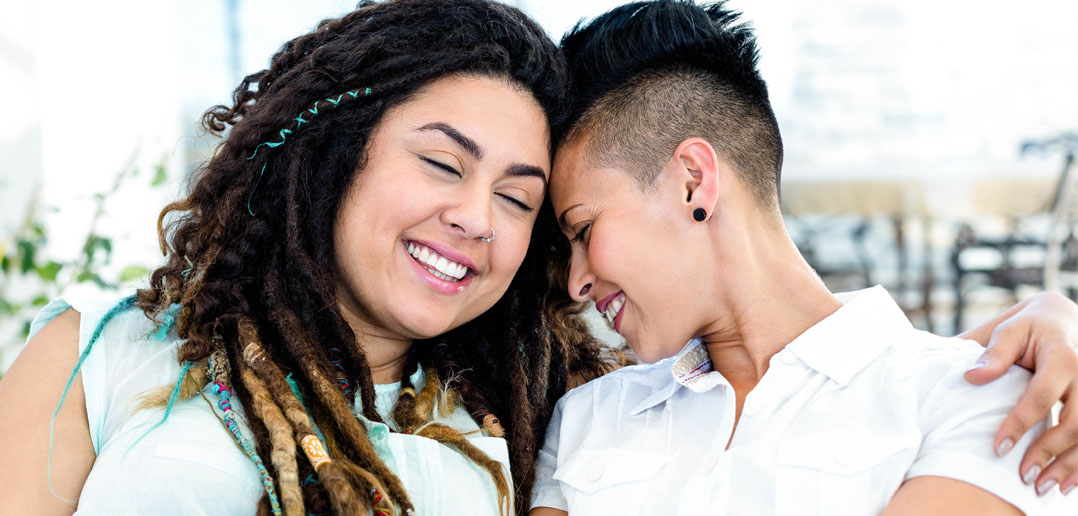
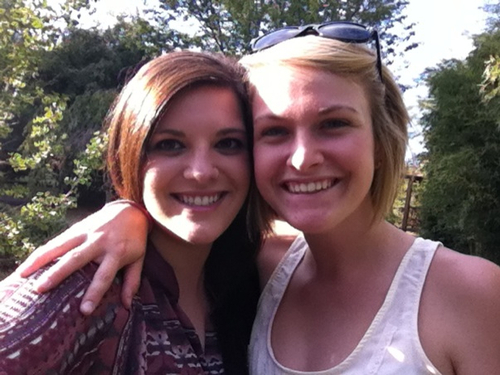
--On Franklin Avenue, holding hands. We are lucky. The
previous Fourth of July in Boston, my then-girlfriend
and I had our arms around each other while a man with a
shaved head made catcalls. I told him to be quiet: "Shut
your mouth." It was only after she had me in her arms
again, pulling me away, that I realized I had punched
someone for the first time.
--In the police precinct. I sit with the officer to file
a report as the victim of (as the officer decides) lewd
conduct. The man in my apartment building came toward
me, pants down, but intent can only go so far. My
then-girlfriend is next to me as the officer asks me
about discernible scars, piercings, tattoos. The officer
has seen our apartment bedroom, our connubial bed with
the crumpled blue duvet. Still, he calls her my
roommate.
--In the dark. In the light.
[Source:
JE Reich | Huffington Post | October 2013]
Still I Rise: A Look at the LGBTQ Struggle
Sage Advice to Young Queers From a Gay Elder
We're Living LGBTQ History: Will We Remember It?
Info: Coming Out
Open Letter to the Queer Community
Trans People Are Not a Threat to You
92 Year Old Woman Holds Same Sign for 30 Years
TED Talk: LGBTQ Life Around the World
Gay Mega History in the Making
Being pro-gay means
supporting full equality
“No longer will politicians (or anyone) be able to
credibly claim to be supportive of gays, and to love and
honor their supposed gay friends and family, while still
being opposed to basic and fundamental rights like
marriage.”
The re-election of Barack Obama, as well as the wins in
states wherever gay marriage was on ballot (in Maine,
Minnesota, Maryland and Washington) is a massive
watershed for LGBTQ rights. No longer will politicians
(or anyone) be able to credibly claim to be supportive
of gays, and to love and honor their supposed gay
friends and family, while still being opposed to basic
and fundamental rights like marriage. The very ads
pushed by the enemies of gay rights, like the mastermind
behind the antigay ballot measures, Frank Schubert,
which claim you can support gay equality but be against
gay marriage, no longer hold water.

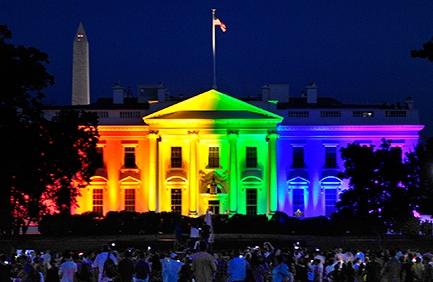

From now on, you're no friend to gays if you don't
support full equality, and you're a bigot if you try to
defend that position, as Mitt Romney did. Many people
previously hid behind the idea that since the president,
prior to May of this year, didn't support marriage
equality, but could still be considered "pro-gay," they
could be considered pro-gay too.
But President Obama not only evolved; he set a new
standard: being pro-gay means supporting full equality.
This is a president who ended "don't ask, don't tell,"
signed a gay-inclusive hate crimes law, urged voters in
the states to vote for marriage equality and wrote a
letter to a 10-year-old last week offering her support
against bullies who might stigmatize her for having two
dads. He's a president whose administration helped
transgender Americans get full protections in employment
under existing laws banning discrimination based on
gender and made sure his health care law fosters full
access and equality for gay and transgender people. And
he was re-elected. That re-election happened, make no
mistake, because the president energized his based,
including LGBTQ activists who pushed him hard and made
it clear that they wouldn't be energized if he didn't
stop dancing with the right and stood up for full
equality. He learned how that could work for him, and
his re-election proves that it can done. No longer will
there be an excuse for politicians who claim to be
pro-gay but who drag their feet for fear of
repercussions.
The wins on marriage in Maine, Maryland, Minnesota and
probably Washington (votes are still being counted but
activists are almost certain they won) are
groundbreaking, and it's only the beginning. The tide
has turned after losses on marriage at the ballot in
over 30 states. It's a direct result of the shift in
public opinion and the president both capitalized on
that and helped change public opinion further. The
enemies of gay equality are now on the run.
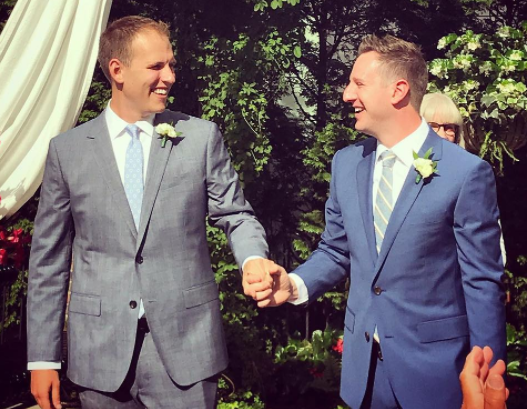

Those enemies, however, still have a hold on the
Republican Party, and the GOP will have to reckon with
that. Certainly it will be front and center in the GOP's
own coming civil war over the fallout of this election.
The Human Rights Campaign rightly said in a press
release that last night's victories, which included the
election of Wisconsin's Tammy Baldwin, the first openly
gay or lesbian person to win a U.S. Senate seat, and
other pro-equality big wins, were a landslide for LGBTQ
rights. Opponents of LGBTQ rights were stomped, and the
pressure will be on the GOP to oust them for good. As
the Rick Santorum wing claims the 2012 losses mean the
party needs to double down on cultural issues like gay
marriage, there will hopefully be those who make the
correct point that, in fact, the party needs to drop
gay-bashing and move into 21st century if it wants to
survive.
[Source:
Michaelangelo Signorile | Huffington Post | November
2012]
TED Talk: LGBTQ Pastor's Journey
NY Times: Corrosive Politics That Threaten LGBTQ
Americans
The LGBTQ Movement is in Chaos
Info: Marriage Equality
People Guess the Sexual Orientation of Strangers
NY Times: The Big Sway
TED Talk: Coming Out of the Closet
Info: LGBTQ Discrimination
Coming out as a Christian
Where Would MLK Have Stood on Marriage Equality?
TED Talk: Some Boys Are Born Girls
Discrimination is Immoral
Unacceptable and shameful
I'm hearing both gay and straight people say that the
long string of losses we've faced at the polls around
marriage equality are really our own fault. Our
community pushed too hard and too fast, they argue. The
prominent theme being generated is that we have failed
to "educate" the public about who we really are and get
beyond the stereotypes of leather people, butch dykes,
circuit boys and drag queens. And that it is now our
obligation to reintroduce ourselves to the American
people. I also repeatedly hear that it's up to us to
reframe the terms of the debate away from "moral values"
to simpler concepts, such as fairness, which polls
indicate resonate most with the public.
I disagree. This is nothing more than the
blame-the-victim mentality afflicting our nation
generally and the lesbian, gay, bisexual, transgender,
and queer (LGBTQ) movement specifically. Rather than
reframing the debate away from moral values, we must
embrace them. Or more precisely, the utter immorality of
the escalating attacks against LGBTQ people. And,
equally, the utter immorality in the failure of so many
people of good will to stand with us. It is time for us
to seize the moral high ground and state unambiguously
that anti-gay discrimination in any form is immoral.
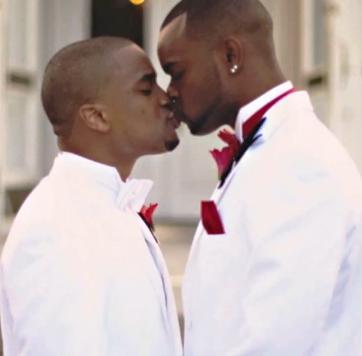
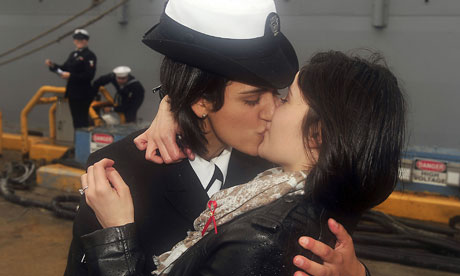
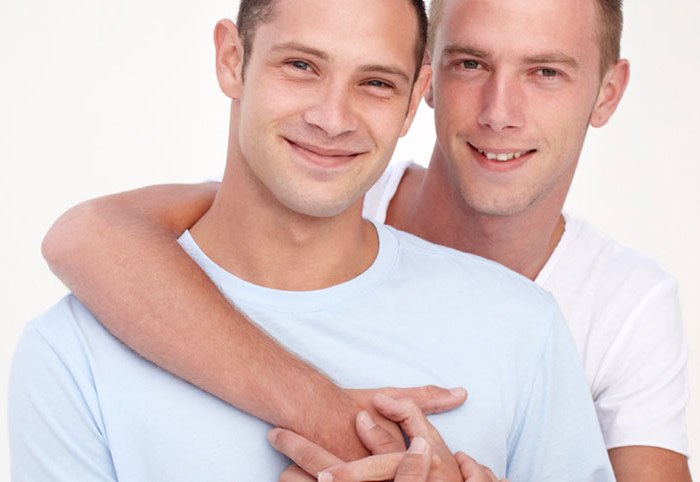
Webster's defines discrimination as "unfair treatment of
a person or group on the basis of prejudice." By any
measure, LGBTQ people are targets of discrimination in
employment, housing, and public accommodations. FBI
statistics show that more people are being murdered
because of their sexual orientation than for any other
bias reason. Our young people are still routinely
bullied in schools. The examples of injustices in the
area of partner and family recognition are too many to
list. No thinking or feeling person can deny these
realities, which, as always, fall hardest on LGBTQ
people of color and those who are poor.
But, alarmingly, rather than seeing a groundswell of
support for measures to combat these injustices, the
opposite is occurring. In Congress and in statehouses
nationwide, it's rhetorical and legislative open season
on LGBTQ people. For example, over the last nine months,
anti-marriage state constitutional amendments were put
on the ballot in 14 states, 10 of which also prohibit
the recognition of any form of relationship between
people of the same gender. It's likely another 12 states
will have similar measures on the ballot within 3 years.
Nothing like this has happened since the Constitution
was ratified in 1791 – essentially a national referendum
inviting the public to vote to deprive a small minority
of Americans of rights the majority takes for granted
and sees as fundamental.
And who's been there to fight these amendments?
Basically us, the very minority under attack. Mainstream
media and churches are largely silent to our opponents'
lies. Most progressive organizations and political
campaigns, meanwhile, steer clear. There have been
sterling exceptions, but they have been few and far
between.


TED Talk: LGBTQ Pastor's Journey
NY Times: Corrosive Politics That Threaten LGBTQ
Americans
The LGBTQ Movement is in Chaos
Info: Marriage Equality
People Guess the Sexual Orientation of Strangers
NY Times: The Big Sway
TED Talk: Coming Out of the Closet
Info: LGBTQ Discrimination
Coming out as a Christian
Where Would MLK Have Stood on Marriage Equality?
TED Talk: Some Boys Are Born Girls
Many people who see themselves as supporters of equal
rights for all tolerate this because they believe
prejudice on the basis of sexual orientation is
profoundly different than that based on race or religion
(that it comes from an understandable disapproval of our
behavior) not on some "immutable characteristic."
Homosexual behavior, they feel, is "unnatural" (doesn't
the Bible say so?). Pundits say there is an "ick"
factor, that the thought of gay sex revolts non-gay
people, and that this seemingly innate reaction is proof
there is something wrong with homosexuality.
This rationale is hardly unique to gay people. Scholars
point to comparable "ick" sentiments about Irish
immigrants in the 1880s, and describe how in preceding
generations sexual ideology was used to strengthen
control over slaves and to justify the taking of Native
American lands, and that for centuries Jews were
associated with disease and urban degeneration. Fact is,
there is no justification for anti-gay prejudice; the
"justifications" for it are as unfounded as those used
to support the second-class treatment of other
minorities in past generations. So, what needs to be
done?
First, everyone must realize that when straight people
say gay people should not have the freedom to marry,
they are saying we are not as good or deserving as they
are. It's that simple, no matter how one attempts to
sugarcoat it. This is unacceptable. And it is immoral.
Second, while we should talk to straight people honestly
about our lives, we must flatly reject the notion that
we are somehow to blame for all of this because we have
not effectively communicated our "stories" to others.
Fundamentally, it is not our job to prove to others that
we can be good neighbors, good parents, and that gee
whiz, we're actually people too.

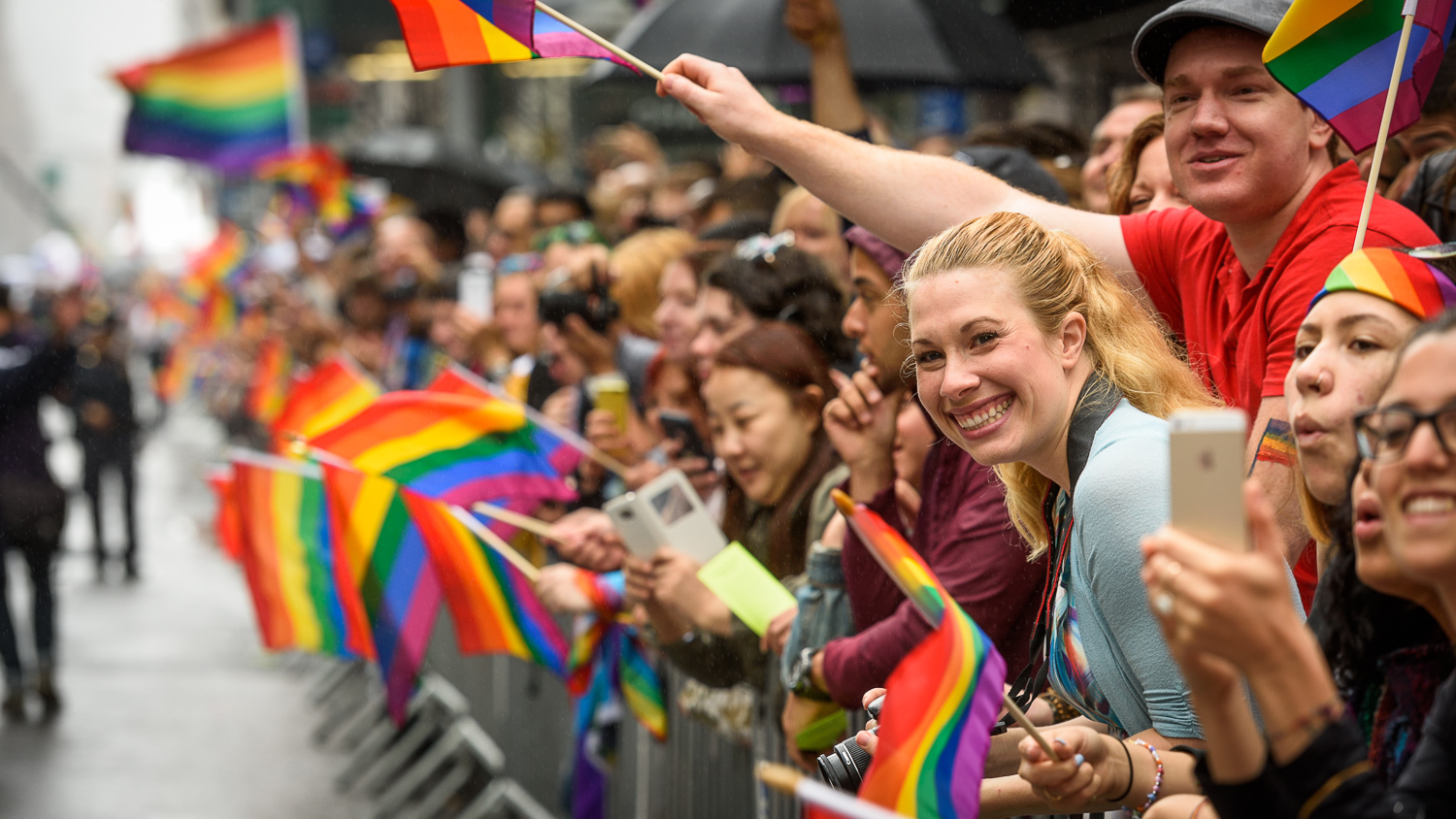
Third, equality will remain elusive if we keep relying
on intellectualized arguments or by dryly cataloguing,
for example, each of the 1,138 federal rights and
responsibilities we are forced to forgo due to marriage
inequality.
The other side goes for the gut. It's now our turn. In
this vein, we must put others on the spot to stand up
and fight for us. As the cascade of lies pours forth
from the Anti-Gay Industry, morality demands that
non-gay people speak out with the same vehemence as they
would if it was another minority under attack. Ministers
and rabbis must be challenged with the question, "Where
is your voice?" Elected officials who meet with and
attend events of the Anti-Gay Industry, must be met with
the challenge, "How can you do that!? How is that public
service?"
The orchestrated campaign to deny us jobs, family
recognition, children, and housing is immoral. Silently
bearing witness to this discrimination is immoral.
America is in the midst of another ugly chapter in its
struggle with the forces of bigotry. People of good will
can either rise up to speak for lesbian, gay bisexual
and transgender Americans, or look back upon themselves
20 years from now with deserved shame.
[Source:
Matt Foreman | Executive Director | National Gay And
Lesbian Task Force]
Terminology|Definitions
Frequently Asked Questions
Myths|Misconceptions
Tropes|Stereotypes
Famous LGBTQ People
Pride Parades
Historical Perspective
Quotations
Profile|Culture|Community
Heroes|Champions
Pride Symbols

HOME
QUEER CAFE
│ LGBTQ Information Network │ Established 2017
|